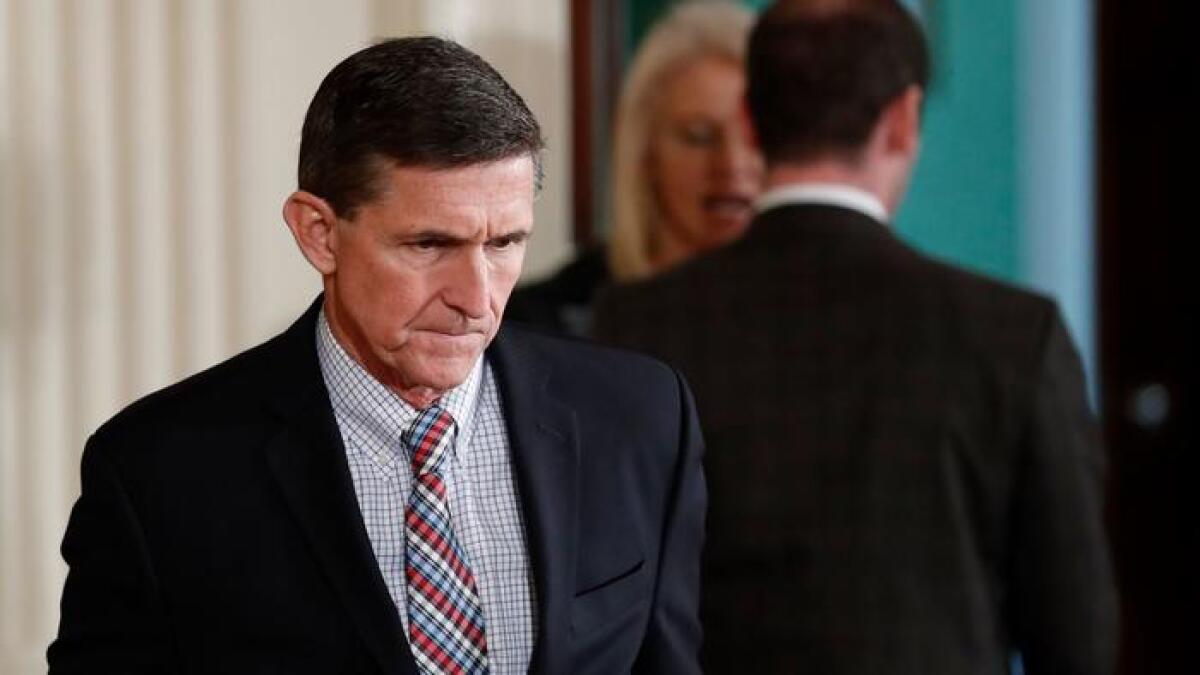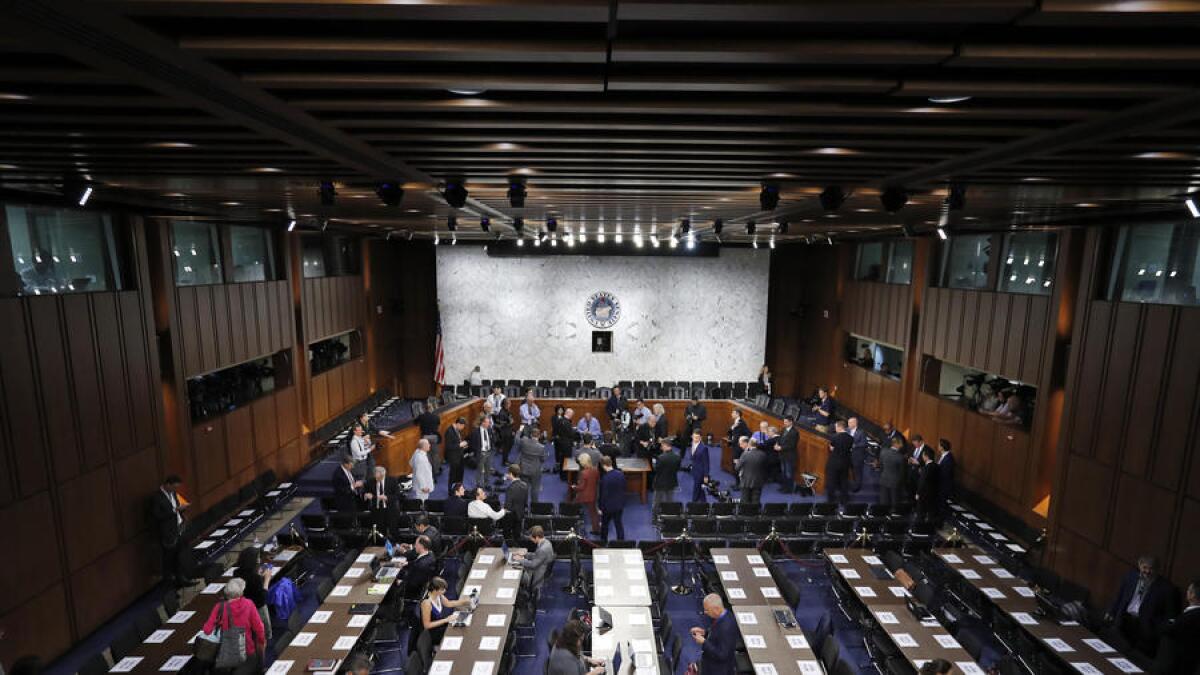Here’s our look at the Trump administration and the rest of Washington
- President Trump tweets new attack on “Morning Joe,” which quickly fires back
- White House defends Trump’s coarse tweets, saying he “fights fire with fire”
- Trump will meet Russia’s president in Germany. But will they discuss Russian meddling in the election?
- White House will fill FCC with crucial vote on net neutrality rules
- Justice Neil M. Gorsuch is pushing the Supreme Court to the right on guns, gays and religion
Meet some of the governors leading the charge against the Senate healthcare plan
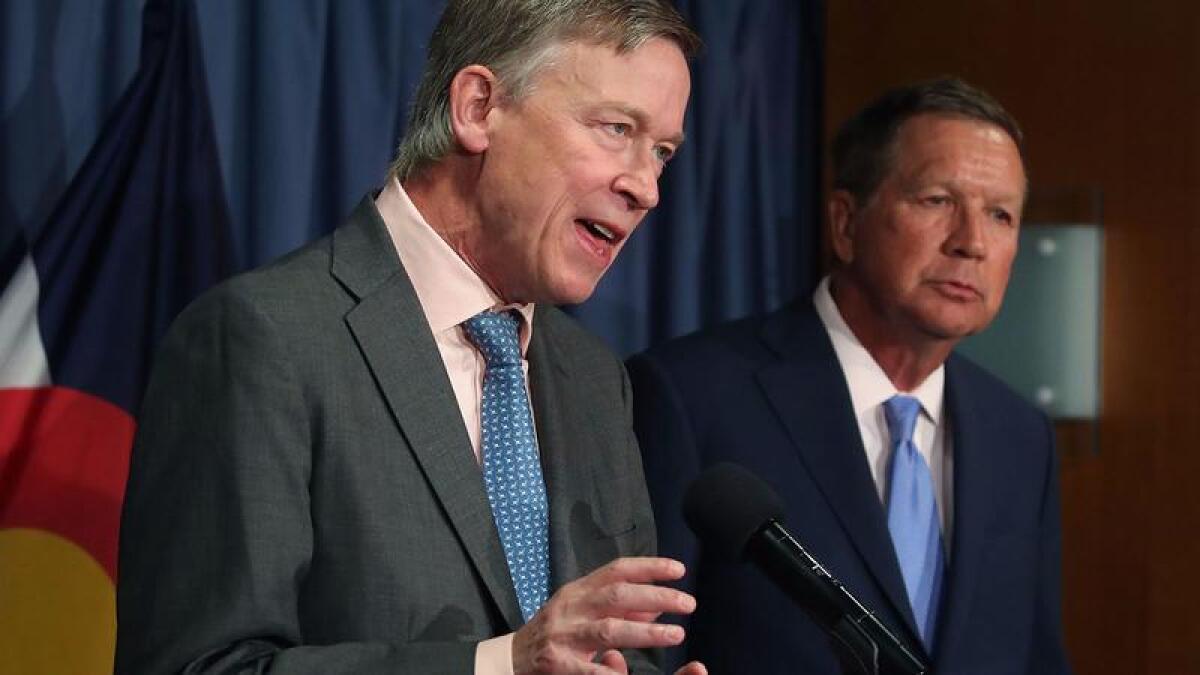
In today’s political climate, it’s rare to find bipartisanship. But as President Trump calls on Senate Republicans to pass a bill in the coming weeks that would overhaul the Affordable Care Act, governors from both sides of the aisle are unified in opposition.
The Senate GOP healthcare bill would cut Medicaid spending by $772 billion over the next decade, leaving millions of low-income people uninsured in states where Medicaid was expanded under the Affordable Care Act, commonly known as Obamacare.
The governors from states that took advantage of the Medicaid expansion have worked together in crafting letters, holding teleconferences with reporters and hosting private meetings with members of Congress. Some have called for no repeal, others a more measured approach. Who are they? Here’s a look:
Trump’s latest tweet in media war is a literal show of mock pugilism
President Trump on Sunday circulated a doctored video clip on Twitter that showed him physically attacking a crudely rendered stand-in for CNN, a post that drew rebukes from critics as an incitement to violence, but prompted renewed expressions of support from backers.
In doing so, Trump also ignored pleas to stop tweeting or at least take a more presidential tone -- from lawmakers in his own party -- after he took his war against news media to new heights last week with a coarse post on the appearance and intellect of cable television host Mika Brzezinski. On Saturday he also posted several anti-media messages as Americans began their Fourth of July celebration.
Sunday’s tweet, which used an edited version of a years-old promotional video for professional wrestling, showed Trump, clad in a business suit and tie, administering a choreographed beat-down to a figure whose face was obscured by CNN’s logo.
CNN, which has been a particular target of the president since the network was forced to retract a story relating to an element of the sprawling investigation into possible collusion with Russia by the Trump campaign, quickly condemned the tweet.
“It is a sad day when the President of the United States encourages violence against reporters,” the network said in statement. It also tweeted a recent assertion by White House spokeswoman Sarah Huckabee Sanders that Trump had never engaged in such incitement.
As is often the case, the president’s surrogates were left scrambling to explain or justify an inflammatory Twitter outburst. Homeland security advisor Thomas Bossert, who was shown the clip while appearing on ABC’s “This Week,” watched it stone-faced and then declared: “No one would perceive that as a threat. I hope they don’t.”
The night before, Trump had used a celebration of veterans at Washington’s Kennedy Center to again denounce the news media. The president, who had briefly broken a weekend golf getaway to appear at the rally, pounded away at the theme that he is being treated unfairly.
“The fake media tried to stop us from going to the White House,” he told the raucous crowd. “But I’m president, and they’re not.”
Increasing number of states reject request for personal information on voters from Trump commission
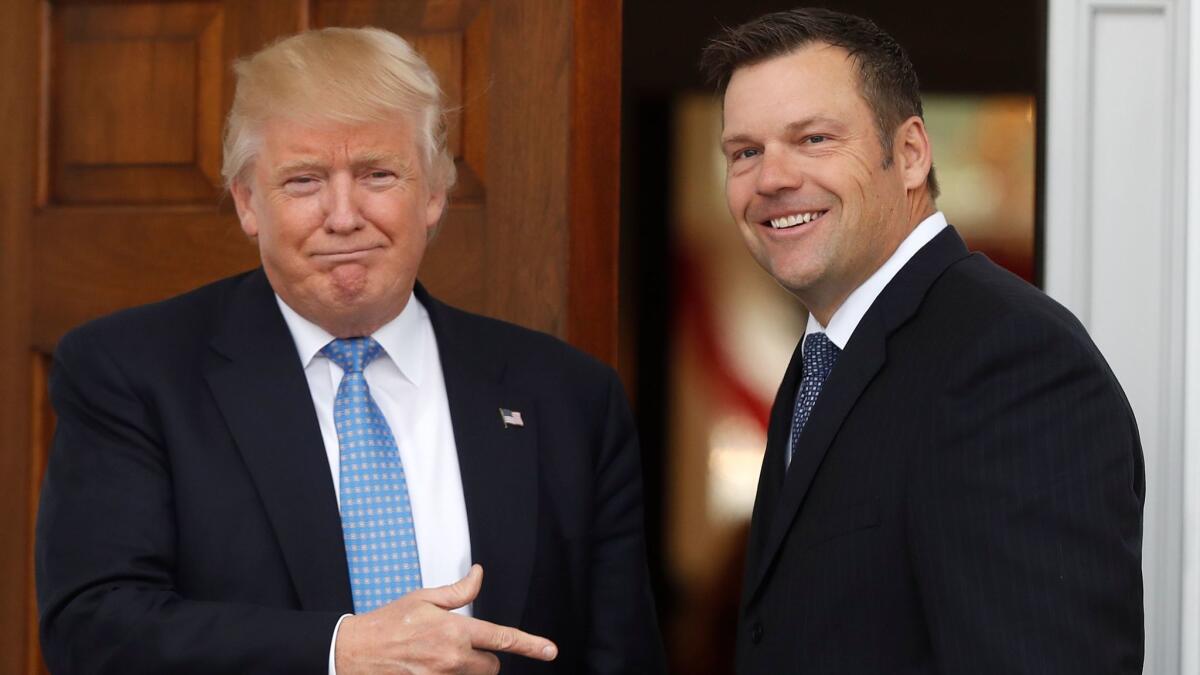
A growing number of states have rejected a request for personal information about voters from a presidential commission on vote fraud led by Kansas’ controversial Secretary of State Kris Kobach.
Kobach, the vice chairman of the commission, sent letters to each state and Washington, D.C., asking for voters’ personal information. The request asked for names, addresses, voting history and the last four digits of voters’ Social Security numbers.
The commission was set up to look into voter fraud after President Trump alleged that he lost the popular vote in 2016 only because millions of people voted illegally -- a claim that numerous states’ election officials from both parties and outside experts have dismissed as groundless.
As of Friday afternoon, at least 13 states had outright rejected the request from the Presidential Advisory Committee on Election Integrity. Officials in several other states either said they would not supply all the information or needed more information before making a decision.
Some officials did not mince words in their “no’s.”
“They can go jump in the Gulf of Mexico, and Mississippi is a great State to launch from,” Mississippi Secretary of State Delbert Hosemann wrote in a statement.
California Secretary of State Alex Padilla said in a statement that strongly criticized Kobach that he would “continue to defend the rights of all eligible voters to cast their ballots free from discrimination, intimidation or unnecessary roadblocks.”
As a Kansas official, Kobach has been a leading backer of immigration restrictions and of measures to put new requirements on who is allowed to vote. His opponents note that he was fined last week for misleading a federal court in a voting rights case.
Democratic elected officials in several states criticized the commission, itself, not just the information request.
“The president created his election commission based on the false notion that ‘voter fraud’ is a widespread issue – it is not,” Kentucky Secretary of State Allison Grimes wrote.
In an odd contradiction, Kobach said that Kansas, like some other states, will partially reject at least one aspect of the request.
“In Kansas, the Social Security number is not publicly available. … Every state receives the same letter, but we’re not asking for it if it’s not publicly available,” he told the Kansas City Star.
The states that have fully rejected the request include California, Indiana, Kentucky, Massachusetts, North Dakota, New York, Pennsylvania, Rhode Island, South Dakota, Tennessee, Virginia, Mississippi and Minnesota.
Others, including Nevada, Ohio, Oklahoma, Connecticut, Missouri, Kansas, Utah and Texas will turn over some of the requested information. Vermont has requested an affidavit from the commission. And Wisconsin has suggested that the commission could purchase the publicly available information, just as political campaigns do. Officials in Washington state said they were reviewing the request.
Look at possible conflicts of interest in Trump team’s OneWest Bank probes, 2 Democrats urge

Two House Democrats want Congress to look into possible conflicts of interest in the Trump administration’s handling of investigations into Pasadena’s OneWest Bank — a bank formerly headed by now-Treasury Secretary Steven T. Mnuchin.
Reps. Maxine Waters (D-Los Angeles) and Al Green (D-Texas) said Friday that there was “room for considerable doubt as to the impartiality and the adequacy of this administration’s investigations into OneWest” and a subsidiary, Financial Freedom.
Mnuchin was the bank’s chairman from 2009 to 2015. President Trump has nominated Joseph Otting, the former chief executive of OneWest, to be comptroller of the currency, a key bank regulator who is part of the Treasury Department.
And Brian Brooks, who was OneWest’s vice chairman, reportedly will be tapped to be deputy Treasury secretary.
Healthcare issue delivers nothing but pain for Nevada’s embattled Sen. Dean Heller
Dean Heller is Stephanie Diaz-Gonzalez’s problem now.
She’s never met Nevada’s Republican senator and hadn’t had much time to familiarize herself. How could she? The 25-year-old is holding down a full-time job and ra+ising a 7-year-old son, who keeps her busy with soccer games, math homework and those too-often terrifying moments when he can’t breathe.
When President Trump was elected and congressional Republicans moved on their top priority to dismantle Obamacare, Diaz-Gonzalez got to know Heller a whole lot better.
Given his back-and-forth on the issue, she came to distrust him.
“I don’t know if I could vote for him or support him,” the Democrat said. “He seems very contradictory.”
Which is why Heller is also Karen Steelmon’s problem.
Steelmon, a 48-year-old Republican who grew up in northern Nevada, isn’t happy with the lawmaker, who is considered the most vulnerable GOP senator in the country when he comes up for reelection next year.
Obamacare has always been an abomination to Steelmon, an ardent supporter of repeal. To her, deeply held principles are at stake.
“Heller has never acted in favor of what I would consider conservative, constitutional principles as a general rule,” said Steelmon, who would like to see the incumbent taken out in a GOP primary. “And on the very few times he has, it’s always come as a surprise.”
This is Heller’s dilemma.
Morning Joe hosts pen op-ed in response to Trump’s tweets, while the president tweets a new attack

The co-hosts of MSNBC’s “Morning Joe” program hit back at President Trump after his Twitter attack on them.
In an op-ed in Friday’s Washington Post, co-anchors Mika Brzezinski and Joe Scarborough wrote that they had criticized Trump, but that “our concerns about his unmoored behavior go far beyond the personal.”
“America’s leaders and allies are asking themselves yet again whether this man is fit to be president,” they wrote.
“We have out doubts,” they added, “but we are both certain that the man is not mentally equipped to continue watching our show.”
Trump soon retaliated with yet another tweet.
To which Scarborough responded.
The president’s Twitter wars have exasperated Republican lawmakers and discouraged even many of his supporters, but he shows no sign of changing his long-set ways.
Trump will meet face-to-face with Putin in Germany next week
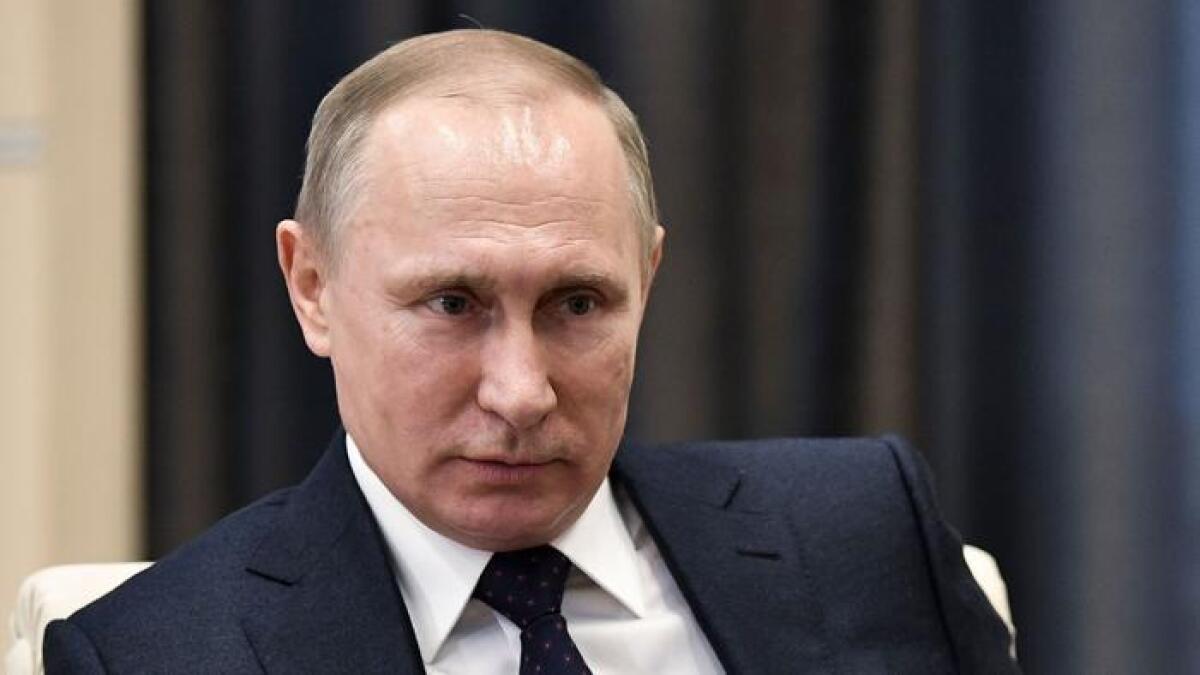
President Trump has governed five months under a cloud of questions about his relationship with Russian President Vladimir Putin, yet the two men will meet next week for the first time, on the sidelines of the G20 summit of world leaders in Hamburg, Germany.
White House officials on Thursday confirmed plans for the private meeting but said no decisions had been made about the topics Trump will raise. So it’s unclear whether the men will discuss Russia’s election-year cyberattacks that are the focus of criminal and congressional investigations.
“Our relationship with Russia is not different from any other country in terms of us communicating with them, really, what our concerns are, where we see problems in the relationship but also opportunities,” said Trump’s national security advisor, H.R. McMaster.
McMaster said he expected the two men to have “a broad, wide-ranging discussion” about problems in the relationship but also about where the U.S. and Russia have “common interests.”
“There’s no specific agenda,” McMaster said. “It’s really going to be whatever the president wants to talk about,” he added.
The White House has refused to say whether Trump would sign legislation with new sanctions on Russia for meddling in the elections by hacking, including into some states’ voting systems, and by spreading false news stories.
But Treasury Secretary Steven Mnuchin indicated the existing restrictions against Russia were sufficient. “We’ve got plenty of those as well,” Mnuchin said.
Trump will also meet with the leaders of China, Germany, Japan, South Korea, Mexico, Indonesia, Singapore and other countries during the summit of 20 major world economies.
Trump’s director of the White House National Economic Council, Gary Cohn, said the meeting would fall short of a typical “bilateral” discussion between the American president and the head of another country, but would be more than what’s known in diplomacy-speak as a “pull aside” — a quick, informal get-together on the edge of a conference.
Trump’s scheduled meeting with Putin in Hamburg places added significance on his stop in Poland next Wednesday.
In Warsaw, McMaster said, Trump intends to bolster U.S. relationships with Poland and other central European and Baltic states that were once in Moscow’s orbit under the Soviet Union, but now rely on the North Atlantic Treaty Organization and the U.S. to counter pressure from Russia. Trump’s meetings there seem designed to strengthen his hand with Putin.
McMaster called Poland “a front-line NATO nation with regards to the eastern flank,” noting that it sent troops to fight alongside the U.S. in Afghanistan and Iraq and has exceeded its pledge on NATO defense spending. As a candidate and president, Trump has criticized other NATO countries that have not yet met those pledges for military spending equal to at least 2% of the size of their respective economies.
Travel ban seen a win by at least one conservative; Breitbart focuses on upcoming votes in Congress
After it stalled for several months in federal courts, a portion of President Trump’s travel ban is set to take effect Thursday evening and will bar individuals from six majority-Muslim countries. Some in conservative media are viewing it as a much-needed political victory for Trump.
Here are some of Thursday’s headlines:
Two wins for Trump (Washington Times)
Trump has seen setbacks in his fledgling administration – probes into possible collusion with Russia, infighting among his party over a healthcare overhaul, federal courts halting his travel ban. But now, the president gets a W.
“The Supreme Court’s decision to allow portions of President Trump’s travel ban to proceed is a much-needed victory for the administration,” Cal Thompson writes. “In doing so the unanimous court affirmed — at least temporarily, pending a full hearing on the case in the fall — a president’s constitutional authority to determine whether people seeking admittance to the U.S. pose a threat to our safety and security.”
Thompson also highlights the Supreme Court decision this week that churches have the same right as other charitable groups to seek state money for new playground surfaces and other non-religious needs. Thompson called the ruling in the case, Trinity Lutheran Church of Columbia Inc. v. Comer, a victory for religious institutions and Trump, who at times has touched on the issue of religious freedom.
Breitbart prods GOP leaders to pass ‘pro-American’ immigration reforms (Breitbart)
For Trump, Breitbart hasn’t always delivered the most approving headlines for his administration – particularly on immigration. Some right-wing bloggers and pundits don’t think Trump has done enough on immigration, a key pillar of his campaign platform.
This piece turns the attention to members of Congress, where two bills – focused primarily on detaining people in the country illegally – could come up for a vote .
“The GOP-run House is expected to vote for two modest immigration-reform bills as soon as this week, but pro-American reformers are using the two votes to build loud and energetic public pressure for major reform legislation,” notes the right-wing website.
Trump attacks ‘Psycho’ Joe Scarborough, ‘Crazy’ Mika Brzezinski in Twitter tear (Fox News)
At first, they were friends; now, perhaps, enemies?
Trump used Twitter early Thursday to jab “Morning Joe” hosts Joe Scarborough and Mika Brzezinski, who the president in past has said he admires.
The tweets have drawn the ire of Republicans. Here’s what the president wrote:
And the response?
Trump plans to nominate Brendan Carr to fill final FCC seat and provide crucial vote on net neutrality rules
President Trump intends to nominate Brendan Carr, a former aide to Federal Communications Commission Chairman Ajit Pai, to fill the final open seat at the agency and provide a crucial vote on the future of tough net neutrality rules.
Carr, the FCC’s general counsel, would fill a Republican slot on the commission and would be expected to support Pai’s push to roll back the regulations for online traffic.
Carr’s intended nomination was announced by the White House on Wednesday night. It comes after Trump nominated Jessica Rosenworcel, a former FCC commissioner, on June 14 to fill a Democratic seat.
If the Senate confirms both nominees, as expected, the FCC would have its full complement of five commissioners and a 3-2 Republican majority.
Gorsuch is already pushing Supreme Court to the right on religion, guns and gays
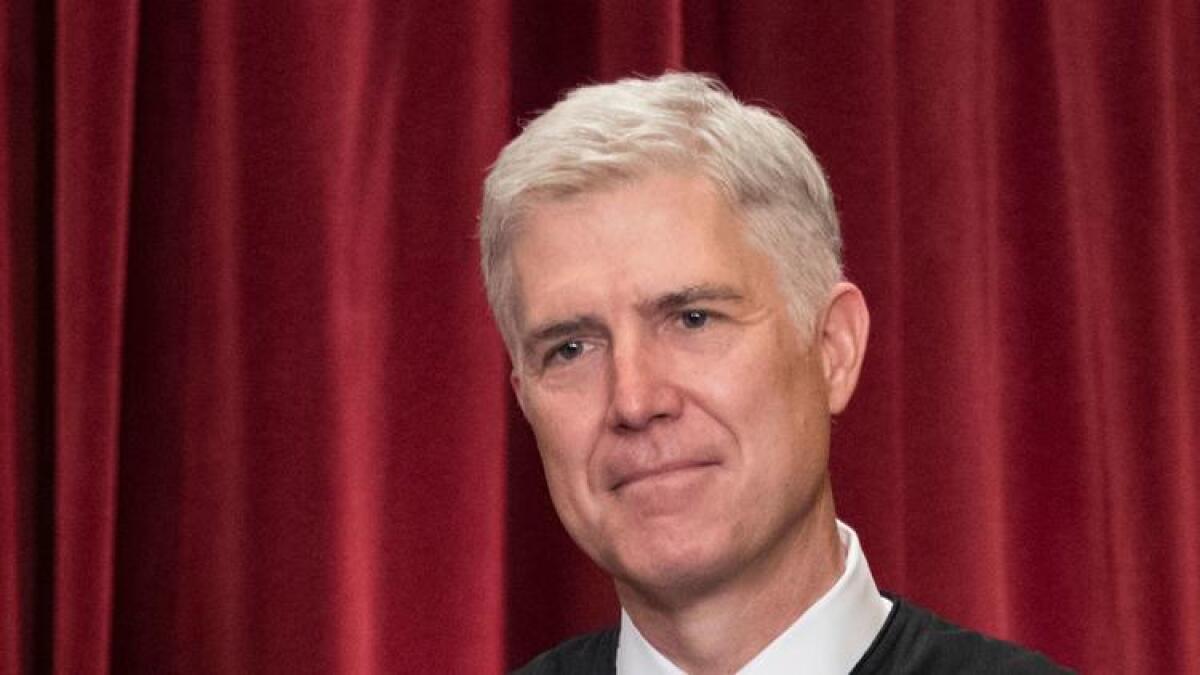
When Judge Neil M. Gorsuch went before the Senate in March as President Trump’s first nominee to the Supreme Court, he sought to assure senators he would be independent and above the political fray.
“There is no such thing as a Republican judge or Democratic judge,” he said more than once. “We just have judges.”
But in just his first few weeks on the high court, Justice Gorsuch has shown himself to be a confident conservative activist, urging his colleagues to move the law to the right on religion, gun rights, gay rights and campaign funding.
He dissented along with Justice Clarence Thomas when the court rejected a gun-rights challenge to California’s law that strictly regulates who may carry a concealed weapon. “The 2nd Amendment’s core purpose,” they said, shows “the right to bear arms extends to public carry.”
He wrote a dissent, joined by Thomas and Justice Samuel A. Alito Jr., when the court struck down part of an Arkansas law that gave opposite sex-couples, but not same-sex couples, the right to have both spouses listed on a child’s birth certificate. The court said it had already decided that same-sex couples deserve fully equal rights under state law.
And when Trump’s travel ban came before the court this week, Gorsuch dissented from the majority’s middle-ground approach, which allowed the ban to take effect except for foreign travelers who had a relationship with this country, such as a close relative or a student enrolled in a university.
When he meets South Korea’s president, Trump will be asking for trade concessions and help confronting North Korea
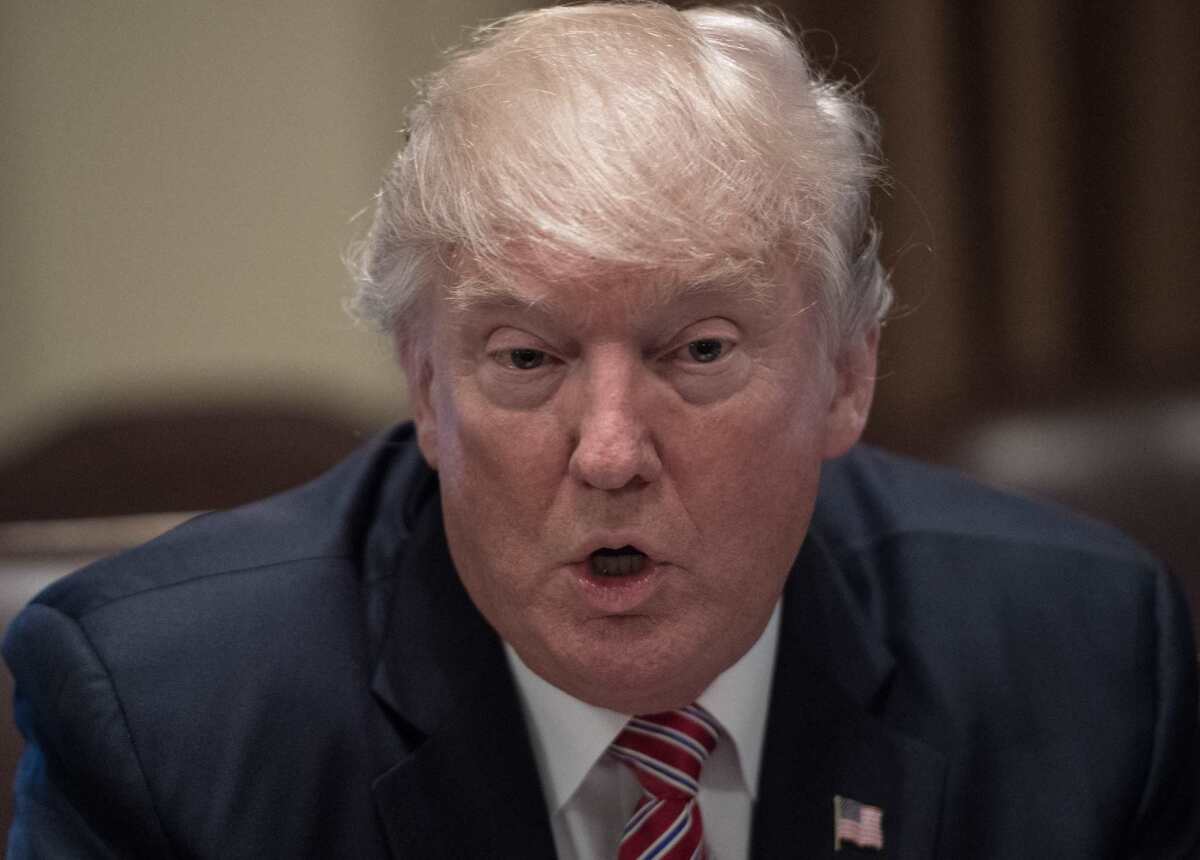
President Trump plans to pressure South Korean President Moon Jae-in to make trade concessions when they meet Friday, while at the same time seeking closer cooperation against North Korea’s accelerating nuclear program.
Both aims, outlined Wednesday by a senior administration official, could make for some difficult discussions, especially since the newly elected Moon campaigned for a softer approach to the government in Pyongyang.
Moon, who arrived Wednesday in Washington, began his four-day visit by laying a wreath at a memorial at Marine Corps Base Quantico in northern Virginia to the U.S. Marines who died during the Korean War in the battle at Chosin Reservoir.
Trump will host Moon and his wife, Kim Joon-suk, for dinner at the White House on Thursday before the two leaders meet one-on-one in the Oval Office on Friday morning.
Having criticized the two countries’ trade agreement when he was running for president, Trump will argue for a more balanced trade relationship, the administration official said in a background briefing. In particular, Trump will cite the large amount of Chinese steel that is sometimes processed in South Korea before being sold cheaply in the U.S. market.
The two leaders will have a “friendly, frank discussion about the trade imbalance between South Korea and the United States,” said the official, who spoke on condition of anonymity. Seoul’s trade surplus is “shrinking,” the official added, but “there is still a large gap.”
The visit will mark the first time the two leaders have met since the liberal Moon took office last month after the ouster of President Park Geun-hye, a scandal-tarred conservative who had taken a hard line against North Korea.
Trump and Moon share “precisely the same goal,” the Trump aide said -- “the complete dismantlement of North Korea’s nuclear program.”
But the approach of the two leaders is starkly different. Trump has called for “maximum pressure” against North Korea, seeking additional economic sanctions and demanding that China, North Korea’s main ally and patron, do more to shut off assistance to Pyongyang.
Moon has risen through the ranks of his country’s politics advocating for closer ties between the Koreas, which technically are still at war. Already he has taken steps to delay the deployment of the U.S. Terminal High Altitude Area Defense system, known as THAAD, an anti-missile system intended to counter any North Korean strikes.
The anti-missile system is a divisive issue in South Korea; it prompted protests last weekend at the U.S. Embassy in Seoul. China has objected to installation of the powerful radar defense as well, but the White House believes the U.S. system will ultimately be fully operative.
The delay “should not be equated as a reversal of the decision to deploy THAAD,” the official said, and suggested that the topic would not be central to the two presidents’ discussions.
“As important as anything [will be] building a rapport and getting to know each other,” the official said.
Senate Republicans aim for new healthcare bill by Friday, but skeptics remain
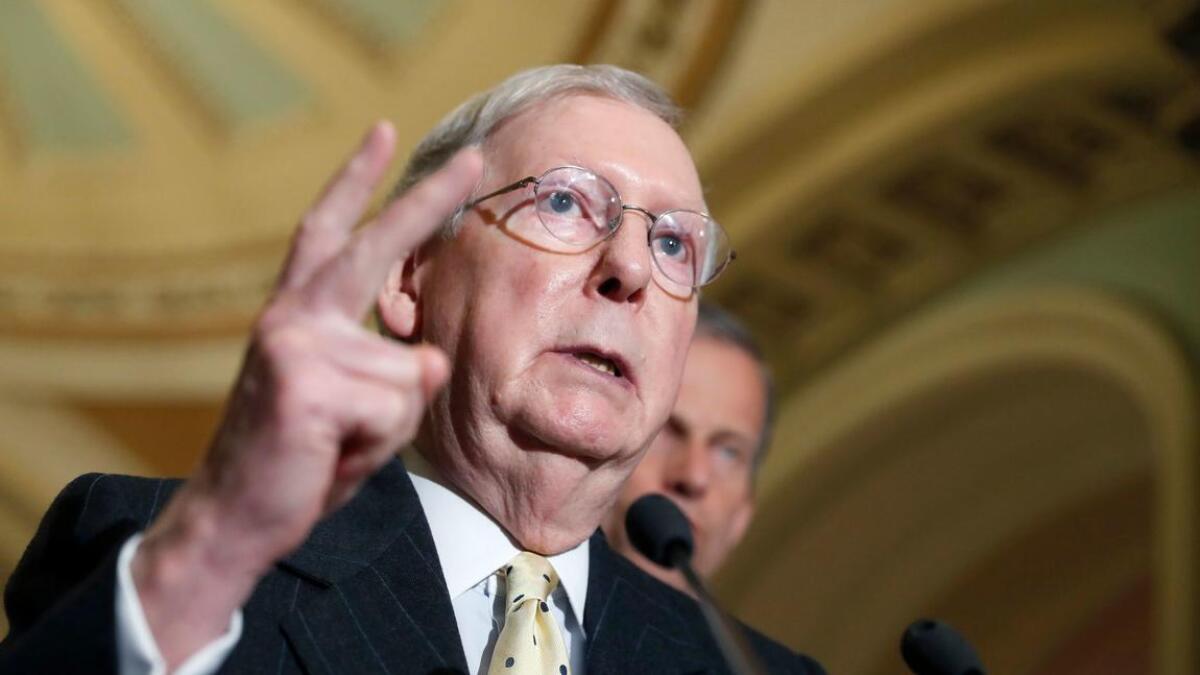
Senate Republicans reconvened behind closed doors Wednesday trying to break the impasse on their healthcare overhaul but emerged with no apparent strategy for resolving differences by an end-of-week deadline.
Senate Majority Leader Mitch McConnell of Kentucky vowed to try again for a vote after the Fourth of July recess, despite having abruptly delayed action this week.
Senators were aiming for a revised bill by Friday, the Republican whip, Sen. John Cornyn of Texas, told reporters, so it could be assessed by the Congressional Budget Office during the break.
But senators remained skeptical after the lengthy lunchtime huddle that appeared to run long on ideas but short on consensus.
“I think it’s going to be very difficult,” said Sen. Susan Collins (R-Maine).
McConnell surprised senators by delaying this week’s expected votes once it became clear he did not have a majority for passage – or possibly to even open the debate.
As many as 10 Republican senators now publicly oppose the bill, the Better Care Reconciliation Act, and leaders are scrambling to win them over with an estimated $200 billion in savings from the bill that can be applied to their particular state’s needs.
But even with that fund of resources, it is not clear McConnell will be able to satisfactorily improve the legislation, which now threatens to cut 22 million Americans off health insurance. He can only afford to lose two Republican votes in the face of Democratic opposition.
“It’s going to be very difficult to get me to a yes... have to make us an offer we can’t refuse,” Sen. Dean Heller (R-Nev.) said on a telephone town hall late Tuesday, according to journalist Jon Ralston, who monitored the call.
Fresh polling Wednesday showed paltry support for the Republican approach to overhauling the Affordable Care Act, known as Obamacare, which has enjoyed a surge in popularity now that Republicans are closer than ever to repealing it. A USA Today poll put approval of the Senate GOP bill at 12%.
Republicans, though, are under enormous pressure from their most conservative supporters – and big dollar donors, including the powerful Koch network – to deliver on their promised to end Obamacare.
Senate Democrats, meanwhile, suggested that President Trump convene all 100 senators – much the way then-President Obama did during his first days in office for a session at Blair House – to see how they might be able to work together to improve, rather than repeal, the Affordable Care Act.
“I’d make my friends on the Republican side and President Trump an offer: Let’s turn over a new leaf. Let’s start over,” said Senate Minority Leader Charles E. Schumer (D-N.Y.).
“President Trump, I challenge you to invite us – all 100 of us, Republican and Democrat – to Blair House to discuss a new bipartisan way forward on healthcare in front of all the American people.”
No such invitation, however, seemed forthcoming. Trump dismissed Schumer’s proposal – “he just doesn’t seem like a serious person,” the president said – and instead promised his own “big surprise” on healthcare.
“Healthcare is working along very well,” Trump told reporters at the White House. “We could have a big surprise, with a great healthcare package.”
Asked what he meant by a big surprise, Trump simply repeated: “A great, great surprise.”
The Republican bill, like its counterpart passed by House Republicans, does not fully gut Obamacare, but rescinds the new taxes imposed on high-income individuals and healthcare companies to pay for expanding coverage through Medicaid and subsidies for private insurance on the ACA marketplace.
Senators said the private talks Wednesday focused mainly on changes to the Obamacare marketplace that could bring down the cost of insurance premiums.
One idea from Sen. Ted Cruz (R-Texas) to allow insurers to offer policies that do not meet the Obamacare benchmarks for what insurance needs to cover met with mixed reaction, senators said.
Sen. Bill Cassidy (R-La.), a physician, warned that such changes would alter the risk pool, keeping insurance costs high.
“You end up with policies that, for example, don’t cover maternity,” Cassidy said. “Do you want a policy that doesn’t have maternity, which would be principally appealing to young men, when obviously typically men have had a role in that pregnancy?”
Other senators were floating new ideas, but McConnell gave no indication whether those proposals would be included in the final revised product.
Michael A. Memoli contributed to this report.
No new laptop bans, but air travelers to the U.S. will face tighter screening all over the globe
Homeland Security officials said Wednesday they will order stricter passenger screening and other new security measures for all flights entering the United States but will not bar laptop computers in carry-on luggage as airlines and passenger groups had feared.
The new order will cover about 2,000 flights a day from 280 airports in 105 countries, a move that could make international flying even more onerous just as the busy summer travel season starts.
Security officials would not detail the new measures but said passengers headed to the United States will face more intensive screening at airports, and probably more security dogs. They gave no date for when the new procedures will start.
If carriers don’t implement the measures effectively, Homeland Security still may ban laptops, e-readers and other electronic devices larger than cell phones from cargo holds as well as passenger cabins.
The decision follows intelligence, reportedly gathered from Islamic State in Syria by Israeli spy services, suggesting a lethal new threat from bombs that could be concealed in digital devices and that could evade detection by airport screening devices.
In March, U.S. and British authorities banned laptops in cabins on flights from eight Muslim-majority countries in North Africa and the Middle East, saying terrorists were seeking “innovative methods” to bring down commercial jetliners.
Secretary of Homeland Security John Kelly told a security conference in Washington on Wednesday that the new security measures will be “both seen and unseen” and will be phased in over time.
He said they will include tougher screening, particularly of electronic devices, plus new technology and procedures to protect planes from so--called insider attacks by airline employees.
“It is time that we raise the global baseline of aviation security,” Kelly said. “We cannot play international whack-a-mole with every new threat.”
He said terrorists still see commercial aircraft as “the crown jewel target” for attacks, and that intelligence has shown renewed interest by terrorists to attack airlines.
Kelly told a House committee several weeks ago that the department was considering extending the laptop ban to 71 more airports overseas.
But Kelly ultimately decided to tighten screening across the board, instead of focusing on laptops or “chasing after each item” that might be used to bring down a jetliner, senior Homeland Security officials said Wednesday in a conference call with reporters.
The officials, who spoke on condition of anonymity to brief reporters, said Kelly worked with airlines to find ways to improve screening without unduly inconveniencing passengers.
“Intensive doesn’t always mean slower,” said one official. “In some cases, airlines have been doing these things at international airports for some time.”
The officials said more security dogs, which sniff for explosives, may be used. And they said airlines and airports may institute pre-check programs like those approved by the Transportation Security Administration for use in U.S. airports.
The officials said restrictions on the first 10 airports will be lifted once airlines in those countries satisfy the new security protocols, officials said.
Airport authorities in the eight countries affected by that ban – Jordan, Egypt, Qatar, Kuwait, Saudi Arabia, Turkey, Morocco and the United Arab Emirates – have been told about the new security measures and will put them in place so the ban is lifted, the officials said.
In recent weeks, Kelly and his aides have huddled with their counterparts overseas, as well as with representatives of major airlines, to discuss whether to expand the ban around the globe.
Airlines protested that a laptop ban would inconvenience passengers and not remove the threat. Aviation experts and European security officials warned that putting laptops in cargo holds would pose other dangers because the lithium batteries could start fires.
In 1988, a bomb hidden in a radio cassette player exploded aboard a Pan Am jet flying over Lockerbie, Scotland, killing all 259 passengers and crew. The plot was blamed on then-Libyan strongman Moammar Kadafi.
In 2010, powerful bombs hidden in printer ink cartridges were found aboard two cargo jets headed from Yemen to Chicago. Al Qaeda in the Arabian Peninsula later claimed responsibility for the plot.
It’s crunch time for McConnell after Senate GOP is forced to delay vote on healthcare bill

The abrupt decision Tuesday by Senate Majority Leader Mitch McConnell to temporarily shelve a vote on the Republican Obamacare overhaul gives him a few extra weeks to build support for a revised bill before it risks becoming hopelessly stalled by the opposition.
The seasoned GOP leader will be aided by what amounts to a $200-billion piggy bank to push Republican holdouts into line. That’s the bill’s extra cost savings, compared with the House version, that McConnell can tap to provide perks to individual senators, from more opioid assistance to expanded tax-free health savings accounts.
A similar strategy — delay and enticements — worked well in the House, where Republicans last month passed their healthcare bill on the third try.
But prolonging the debate also gives Democrats and other critics time to mobilize, and ensures that senators will be exposed to an onslaught of opposition as they head home for the weeklong holiday break to defend a bill that has estimated would leave tens of millions of Americans without insurance.
After the delay was announced, President Trump hosted a White House gathering of all GOP senators. But rather than rally them around the bill with the power of the presidential bully pulpit, he struck a surprisingly detached tone.
“This will be great if we get it done,” Trump told senators in the East Room. “And if we don’t get it done, it’s just going to be something that we’re not going to like. And that’s OK.”
As vote looms, concerns over Medicaid cuts rise from some in conservative media
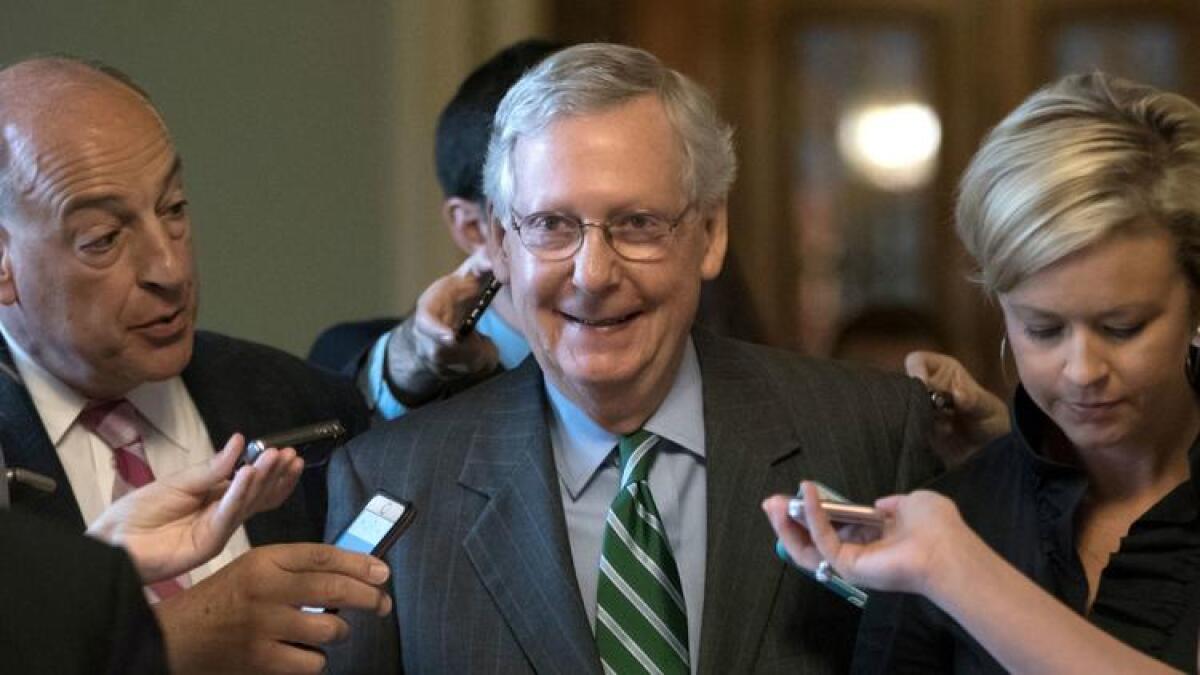
The vote – for now – is delayed.
As President Trump has urged Senate Republicans to pass a bill that would overhaul the Affordable Care Act, some, including Sens. Dean Heller of Nevada and Rob Portman of Ohio, have expressed concerns over cuts to Medicaid. Both represent states that, under Obamacare, expanded Medicaid coverage to low-income adults. The current Senate healthcare bill would deliver deep cuts to Medicaid, leaving millions uninsured.
While Trump awaits a vote in the coming weeks – originally scheduled for this week, but pushed back until after the July 4 recess – it’s on Senate Majority Leader Mitch McConnell to gather enough support from within his GOP caucus to secure the bill’s passage.
Some in the conservative media are questioning the current bill. Here is an overview of today’s headlines on this and other issues:
Republicans have a Medicaid problem (Weekly Standard)
The Republican healthcare bill would cut Medicaid spending by $772 billion over the next decade.
Chris Deaton writes that “Republicans aim to offset the consequences of these Medicaid changes by offering tax credits for private insurance to people under the poverty line.”
In this piece, Deaton raises the question of whether low-income earners would be better off with Medicaid coverage or obtaining insurance through a GOP tax credit? He answers by noting, “It’s long been a contention of conservative thinkers that healthcare outcomes improve with private insurance rather than Medicaid.”
Paul Manafort, former Trump campaign chairman, registers as foreign agent (Associated Press)
He’s among those facing scrutiny in an FBI investigation into Russian meddling in last year’s election.
Now, Paul Manafort, who at one time served as Trump’s campaign chairman, has registered with the Department of Justice as a foreign agent.
In a filing with the department, Manafort notes that his consulting firm received nearly $17 million between 2012 and 2014 from a Ukrainian political party with links to Russia, according to the Associated Press.
Last spring, former national security advisor Michael T. Flynn, who resigned from his position in February after misleading administration officials about contacts with Russians, also registered as a foreign agent, for consulting work he did for a Turkish businessman.
A Democratic road to recovery (American Spectator)
The party is attempting a reboot.
After Hillary Clinton’s 2016 loss and defeats in several special elections this year, Democrats are in search of a new face for the party. Even so, liberals are in lock-step in their opposition to Trump.
This piece offers Democrats some advice – from the right – on how to recover.
“Leftists: You have been lied to and taken advantage of. When you eventually come out of this haze you are in, you will realize that it was done not by the president, but by the snake oil salesmen and charlatans, who took advantage of your sickness and weakness, simply for money and power,” writes Judah Friedman. “Ask yourselves this: What is the Democratic Party, right now, without this rage, and hate, with which it is fueling your addictions? The answer is nothing.”
Sarah Palin sues the New York Times for tying her PAC ad to mass shooting
Former vice presidential nominee and Alaska Gov. Sarah Palin is accusing the New York Times of defamation over an editorial that linked one of her political action committee ads to the mass shooting that severely wounded then-Arizona Congresswoman Gabby Giffords.
In the lawsuit filed in Manhattan federal court Tuesday, Palin’s lawyers say the Times “violated the law and its own policies” when it accused her of inciting the 2011 attack that killed six people.
The lawsuit refers to a June editorial in the Times on the recent shooting of Louisiana Congressman Steve Scalise. The editorial later was corrected.
Palin is seeking damages to be determined by a jury.
A spokeswoman for the Times, Danielle Rhoades Ha, says the company hasn’t seen the lawsuit but will defend against any claim vigorously.
Trump succeeds where Obama failed – spawning a new wave of liberal activism

The night Hillary Clinton lost the White House, Amanda Litman cried so hard she threw up.
In Atlanta, as the returns rolled in, Traci Feit Love faced a question from her anguished 8-year-old daughter: “Now what do we do?”
Across the country, in the heart of Silicon Valley, Rita Bosworth wondered the same thing.
The three never met, never spoke, never communicated in any fashion. But in the days and weeks that followed, they became common threads in a sprawling patchwork: the angry and politically aggrieved who — with no help from politicians, political parties or any formal campaign structure — have joined to fight President Trump and his policies.
Trump on healthcare bill: ‘If we don’t get it done ... that’s OK’
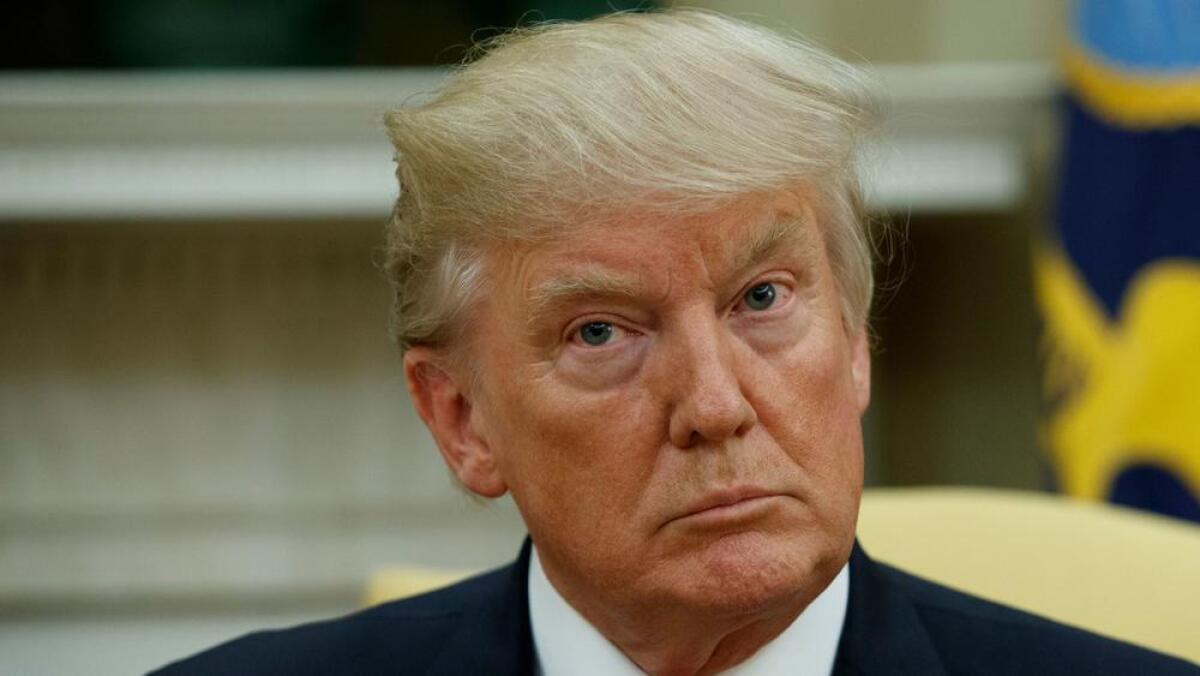
President Trump said that if the healthcare bill fails to pass in the Senate, he won’t like it — but “that’s OK.”
Trump spoke Tuesday at a gathering of Senate Republicans after their leaders delayed a vote on their healthcare bill until at least next month.
Trump said, “This will be great if we get it done and if we don’t get it done it’s going to be something that we’re not going to like and that’s OK and I can understand that.”
He added, “I think we have a chance to do something very, very important for the public, very, very important for the people of our country.”
Watch live: Press briefing with Deputy Press Secretary Sarah Sanders and Energy Secretary Rick Perry
Senate GOP leaders abruptly delay vote on healthcare bill until after July 4th recess
Facing resistance from their own party, Senate Republican leaders said Tuesday they would postpone a vote on their healthcare bill until after the July 4th recess.
Senate Majority Leader Mitch McConnell wants to provide more time to make changes to the bill to try to convince reluctant GOP senators to vote for the measure.
“We’re going to press on,’’ McConnell said, adding he remains optimistic. “We’re continuing to talk.”
Since the nonpartisan Congressional Budget Office said the bill would leave 22 million more Americans without insurance after 10 years, several Republicans senators had said they would not even support allowing the bill to be brought to the Senate floor for a vote.
Meanwhile, President Trump invited all GOP senators to the White House for a meeting Tuesday afternoon.
But Sen. Susan Collins (R-Maine), a moderate who has expressed serious doubts about the bill, questioned whether revisions would make a difference.
“I have so many fundamental problems with the bill, that have been confirmed by the CBO report, that it’s difficult to see how any tinkering is going to satisfy my fundamental and deep concerns about the bill,’’ Collins said on CNN.
McConnell is struggling to appease two factions in his party. Centrists like Collins want to lessen the impact of proposed cuts to Medicaid, while conservatives want to go further in repealing benefits provided under Obamacare.
Senate leaders hope to continue talks this week, with an eye toward moving quickly when Congress returns after the holiday. McConnell plans to wait for the CBO to review any changes and reissue a score.
He can only afford to lose two Republicans given the party’s 52-seat majority in the Senate.
“There’s more work that needs to be done, it’s pretty obvious,” said Republican Sen. Jim Risch of Idaho as he was leaving a Senate lunch with Vice President Mike Pence. Pence ignored reporters questions about the decision. “If more work needs to be done, you shouldn’t try to light the fire.”
But the delay in a vote will give Democrats and other opponents of the repeal bill more time to mobilize, particularly as Republicans return to their home districts during the holiday.
“We know the fight is not over,’’ said Senate Minority Leader Charles E. Schumer of New York.
Trump administration warns of Syrian chemical attack, but with damaged credibility
The Trump administration Monday night sent the kind of dire warning -- of the Syrian regime’s apparent preparation for another chemical weapons attack, and a threat of U.S. retaliation -- that requires credibility to have a receptive national and foreign audience.
Yet the initial bafflement about the warning among U.S. defense officials, and the simultaneous distraction of President Trump’s unrelated tweets, seemed to undercut the seriousness of the moment. More broadly, the episode is testing the damage Trump has done to his and his administration’s trustworthiness by his assaults on the intelligence community as well as other perceived enemies.
Trump has spent months attacking the credibility of the intelligence community, at one point comparing their tactics to Nazis’ and repeatedly calling its findings of Russian meddling in the election a “hoax” and “witch hunt,” even as foreign policy experts cautioned that he was diminishing the reputation of a community he would need in times of crisis to rally public support.
“At a moment of crisis when U.S. decisions and actions rest upon information coming from the intelligence community, [Trump] may have diminished the credibility of that information in the eyes of the public and the eyes of the international community,” said Daryl G. Kimball, the executive director of the Arms Control Assn.
Kimball called the White House statement “unusual” and said such messages would normally be sent through private diplomatic channels. He added that the public allegation should be followed by a formal presentation of the evidence to the United Nations Security Council, to build international support against suspected Syrian violations of the chemical weapons ban.
The four-line statement on Syria from the White House Press Secretary came just after 9:44 p.m. EDT Monday.
“The United States has identified potential preparations for another chemical weapons attack by the Assad regime that would likely result in the mass murder of civilians, including innocent children,” the statement read. “The activities are similar to preparations the regime made before its April 4, 2017 chemical weapons attack.”
If Syrian President Bashar Assad “conducts another mass murder attack using chemical weapons, he and his military will pay a heavy price,” it concluded, citing a U.S. missile strike after the previous chemical attack to reinforce the new threat.
A Pentagon spokesman confirmed Tuesday that preparations for a chemical attack were observed at the same base in Syria from which its military launched a sarin nerve gas attack that killed 86 people, including children, in April.
“We have observed activities at Shayrat Air Base that suggest possible intent by the Syrian regime to use chemical weapons again,” Pentagon spokesman Maj. Adrian J.T. Rankine-Galloway said in a statement. “These activities are similar to what we observed prior to the regime chemical weapons attack against Khan Sheikhoun in April.”
But some senior U.S. defense and intelligence officials reached late Monday and early Tuesday were caught off guard by the White House statement. “Some knew, some didn’t,” said a U.S. official who sought anonymity to discuss the intelligence matter.
The official described the release of the nighttime statement as “ungraceful,” but said the assessment that Syria was preparing for an attack is “sound.”
Such official statements are typically distributed widely across an administration for internal vetting before they’re publicly released. The White House said the relevant agencies were informed before the statement was published.
Yet Trump lent further confusion about the urgency of the matter and his own level of concern by sending out a tweet about domestic politics only minutes later. He cited a Fox news report about the FBI’s Russia investigation, writing as he often does about the probe, “Witch Hunt!”
Indeed, Trump continued through the next morning to demonstrate his frustration with the Russia investigation and what he calls the American media’s “fake news” with posts on his Twitter feed.
Many tweets quoted supportive conservative commentators and Fox News reports. Trump was eager to go after CNN, one of his top media targets, after it retracted a Russia-related story and three journalists involved resigned.
Trump’s willingness to mix politics and his administration’s ominous red line to Syria opened him up to criticism that he was trying to divert attention from other unfavorable news Monday. The nonpartisan Congressional Budget Office had found that the Republican plan to replace Obamacare would strip 22 million people of health insurance coverage over the next decade.
The Syria statement also prompted a sharp backlash from the Kremlin, which is Assad’s military ally in his nation’s civil war. Russian officials denied there is evidence of an imminent chemical attack and called the White House threat “unacceptable.”
The tensions have heightened as Trump is expected to meet Russian President Vladimir Putin next week at the G20 Summit of industrialized nations in Germany. Monday’s statement may be seen as a warning not just to Syria but to Russia, which is widely seen as enabling Assad’s harsh tactics by bolstering his military as he has tried to retain power.
Fifth GOP senator opposes debate on the healthcare bill
Mike Lee of Utah has become the fifth Republican senator to oppose starting debate on the GOP healthcare bill. That deals another blow to party leaders hoping to push the top-priority measure through the Senate this week.
Lee was among four conservative senators who announced last week they oppose the bill’s current version. Lee spokesman Conn Carroll said Tuesday that the lawmaker will not vote for a crucial procedural motion allowing the Senate to begin debate on the legislation, unless it’s changed.
Senate Majority Leader Mitch McConnell (R-Ky.) can lose the votes of only two of the 52 Republican senators to begin debate and ultimately pass the bill. All Democrats oppose it.
Lee has favored a fuller repeal of President Obama’s healthcare law than the current GOP bill.
Watch live: Tillerson unveils the Trafficking in Persons report
Kremlin calls White House warning to Syria ‘unacceptable,’ denies any Assad chemical attack in the works
The Kremlin is calling “unacceptable” a White House warning to Syria’s government that it would pay a “heavy price” if it carries out another poison gas attack against its own people.
Dmitry Peskov, spokesman for Russian President Vladimir Putin, also declared Tuesday that there is no indication that a chemical weapons strike is in the works.
The White House said late Monday night that activity had been detected similar to that preceding a nerve gas attack on April 4 that killed dozens of civilians, including children, in rebel-held Idlib province.
President Trump responded by launching nearly 60 Tomahawk cruise missiles at a Syrian military airfield that U.S. officials said was used for the chemical attack. It was the first U.S. attack on Syrian forces in the six-year civil war.
Russia continues to deny that Assad’s forces carried out the April 4 gas attack and Peskov criticized the White House for saying there were signs of preparation for “another” such strike.
Peskov said the Kremlin does not “think it is possible to lay the blame on the Syrian armed forces” for the April strike on the village of Khan Sheikhoun, which the U.S. and its allies said involved sarin, a banned nerve agent.
“Despite all the demands from the Russian side, an impartial international inquiry into a previous tragedy using chemical agents has not been carried out,” the spokesman told Russian news agencies.
Peskov criticized the White House warning to Assad, saying “such threats to Syria’s legitimate leaders are unacceptable.”
Senate healthcare overhaul hits trouble as Republicans hesitant to proceed to vote
The Senate Republican healthcare bill ran into serious trouble late Monday when key GOP senators indicated they may block the Obamacare overhaul from proceeding to a vote this week.
Political turmoil has been building over the bill for days. But GOP tension burst open after the nonpartisan Congressional Budget Office reported that 22 million more Americans would lose insurance coverage under the plan and that out-of-pocket costs for many of those buying policies on the Affordable Care Act marketplace would rise.
Senate Majority Leader Mitch McConnell hoped to start procedural votes by Wednesday, and President Trump called key senators over the weekend as support splintered.
It’s the same political dynamic that stalled the House Republican bill last month, as conservative and centrist factions wrestle for dominance. Conservatives want a more complete repeal of the Affordable Care Act, which they hope will lower premium costs, while centrists are trying to avoid leaving millions of Americans without health coverage.
“Senate bill doesn’t fix ACA problems for rural Maine,” tweeted Sen. Susan Collins (R-Maine). “I will vote no on mtp,” she said, referring to the “motion to proceed” to the bill.
Conservative Sen. Mike Lee of Utah is also working to change the bill so that he can vote yes on the procedural motion.
“We are not there yet,” Lee’s spokesman said.
Senators have bristled at what they viewed as McConnell’s secretive and rushed process, and several other senators said they wanted more time before voting.
Sen. Ted Cruz of Texas was among those Republicans who shared concerns in weekend calls with Trump.
“We continue to make progress,” Cruz told reporters Monday, as Democrats, who oppose the bill, planned an almost-all-night protest session.
Cruz is part of the gang of four conservatives -- including Sen. Ron Johnson of Wisconsin, Sen. Mike Lee of Utah and Sen. Rand Paul of Kentucky -- who have said they cannot vote for the bill as is. Among the changes being pursued is one provision that would allow insurers to offer cheaper policies that do not meet ACA’s requirements and another to let consumers sock more money into health savings accounts
“We can get there and I’m hopeful we will get there,” Cruz said. However, he declined to say whether he would agree to Wednesday’s procedural vote.
Also hesitant to proceed was Nevada Sen. Dean Heller, who has strongly criticized undoing Obamacare’s Medicaid expansion that has enabled about 200,000 people to gain coverage in his state.
Alaska Sen. Lisa Murkowski, for example, wanted changes to help residents in her geographically far-flung state where healthcare costs are particularly high.
Some senators, though, dismissed the budget analysis and said keeping the ACA would be worse.
“It’s clear the CBO cannot predict the purchasing patterns for millions of Americans,” said Georgia Sen. David Perdue, a Trump ally, in a statement. “This bureaucratic analysis will do nothing to prevent Obamacare from failing.”
Others are weighing their votes.
Republican Sen. Bob Corker, whose office is receiving thousands of daily calls, spent part of Monday on the phone with health officials in Tennessee as he assesses the fallout in his state of 22 million more people in the country without healthcare.
“I kind of figured it was going to be a pretty big number,” said Corker, who remains undecided. “There’s a lot of incoming.”
Supreme Court puts off decision in three pending cases about borders and immigration
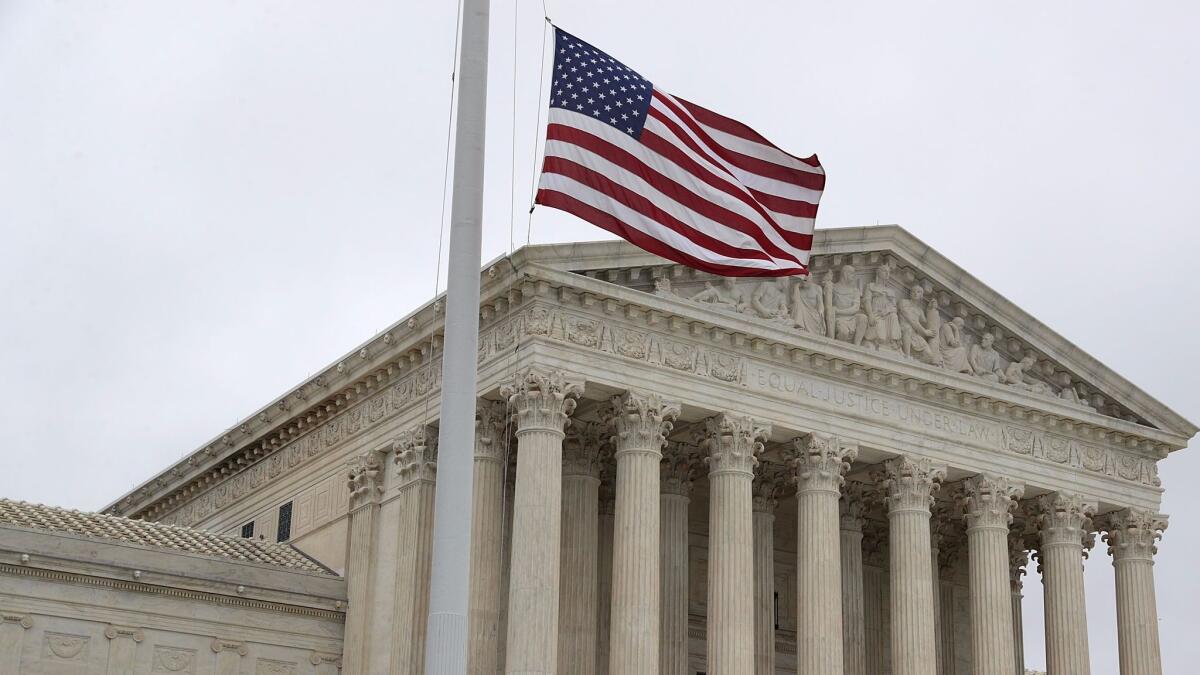
Amid its flurry of decisions Monday about Trump’s travel ban and cases involving religious liberties and guns, the Supreme Court put off final rulings on three pending cases involving immigration and the U.S. border.
In Hernandez vs. Mesa, the court in an unsigned opinion told the U.S. appeals court in New Orleans to take a second look at a border shooting case. The parents of a 15-year-old Mexican boy sued a U.S. border patrol agent who shot and killed the teenager when he was standing a few feet from the border on the Mexican side. The 5th Circuit had thrown out the parents’ suit.
“The facts alleged in the complaint depict a disturbing incident resulting in a heartbreaking loss of life,” the court said in sending the case back for a further hearing.
The court said it would rehear in the fall a Los Angeles case involving whether immigrants awaiting deportation can be jailed indefinitely, or instead have a right to a bond hearing after six months. The court’s action suggests the eight justices were evenly split in Jennings vs. Rodriguez.
The court also said it will rehear the case of Sessions vs. Dimaya to decide whether non-citizens can be deported for an offense like breaking into an empty home because it may be deemed a “crime of violence.”
Refugee advocates says even partial reinstatement of travel ban will cause hardship
Immigration and refugee advocates expressed disappointment Monday with the Supreme Court’s partial reinstatement of President Trump’s travel ban, saying even limited implementation could cause hardship to refugees and others seeking to travel to the United States from six affected Muslim-majority countries.
However, organizations taking part in the months-long legal fight against the revised travel ban expressed hopes that the high court ultimately will reject the restrictions after arguments are heard in October.
And they welcomed what they described as an implicit rebuke of the White House’s assertion that Trump has unfettered powers to exclude arrivals based on purported national security concerns.
The initial rollout of the ban, days after Trump took office in January, caused pandemonium at airports across the United States and overseas as tens of thousands of visa-holders arriving from seven affected countries were turned away without warning or detained.
After courts blocked that order, Trump issued a revised travel ban that took Iraq off the list.
A replay of January’s travel chaos was unlikely Monday because the court’s action will allow visa-holders with “bona fide” ties to people or entities in the U.S. to enter, meaning students, employees and family members can still get in.
But refugee advocates said the court’s limited ruling, which the administration can move to implement on Thursday, could leave many would-be arrivals in limbo pending the finalizing of new vetting procedures.
The administration had originally said a three-month travel ban was needed in part to review the checks to which would-be entrants are subjected.
David Miliband, president of the International Rescue Committee, said the partial reinstatement of the ban particularly threatens “vulnerable people waiting to come to the U.S.,” including those with urgent medical conditions.
“We urge the administration to begin its long-delayed review of the vetting process and restart a program which changes lives for the better,” said Miliband.
The National Immigration Law Center, one of the groups that challenged the ban, said that as of this week, approximately 50,500 refugees from the six affected countries had been approved for travel and resettlement in the United States — all having already undergone intensive checks.
The Middle East Studies Assn., one the groups contesting the ban in the lower courts, said many students and academics were ensnared by the original order.
Even though Monday’s court move should allow entry to those studying or working at American academic institutions, many from the affected countries remained wary of leaving and then attempting to re-enter the United States, the group said.
Iran — along with Somalia, Sudan, Yemen, Syria and Libya — is one of the affected countries, and Southern California is home to a large Iranian American community that was hit hard by the original ban.
Some advocates said even with Monday’s limited action, there has already been a chilling effect on movement.
“Today’s Supreme Court decision immediately places the status of many Americans’ families into question again,” said Shayan Modarres, legal counsel for the National Iranian American Council.
The group said that visas issued to Iranian passport-holders had fallen by nearly half since the legal battle over the ban began, and that obtaining a U.S. visa was becoming so onerous that many would not even try to get one.
“The Trump administration’s new idea is to make it so hard on Iranians and Muslims to get a visa that visa officers will have the unrestricted discretion to reject visa applications,” Modarres said.
He added that grounds for rejection could be social media postings critical of Trump or not being able to produce airline boarding passes that could have been issued and used more than a decade ago.
Advocacy groups reiterated their position — which was argued in a number of the lower court cases that propelled the issue to the high court — that the travel restrictions run counter to core American traditions and values.
Mark Hetfield, president of the refugee resettlement agency HIAS, said the group considered the court’s move “an affirmation that the president does not have unfettered, unchecked authority to bar refugees from the U.S. without evidence to justify such action.”
But he added that the executive order’s partial resurrection would “once again cause irreparable damage to refugees, immigrants, and America’s reputation as a welcoming country.”
The initial ban prompted large nationwide protests, and advocates suggested they would again seek to marshal popular opposition to the restrictions.
“When the first order went into effect, tens of thousands of Americans showed the world that this is not who we are and not what we want,” said Becca Heller, director of the International Refugee Assistance Project, another of the groups involved in the legal challenge. “We will never give up defending the rights of those who are affected by this discriminatory executive order.”
Trump says Supreme Court action on travel ban gives him ‘important tool’
President Trump celebrated the Supreme Court’s decision Monday to allow a curtailed version of his travel ban to take effect, calling it a “clear victory for our national security.”
In an official White House statement, the president said he was “particularly gratified” that at least part of the ruling was 9-0; three conservative justices said they would have let the president’s revised executive order take effect completely.
“My number one responsibility as Commander in Chief is to keep the American people safe. Today’s ruling allows me to use an important tool for protecting our Nation’s homeland,” he said.
The White House has long maintained that the president was acting within his authority in seeking to temporarily restrict travel to the United States. They most often point to a provision of the Immigration and Nationality Act that states a president can suspend or limit entry of individuals “whenever the president finds that the entry ... would be detrimental to the interests of the United States.”
Rival Senate factions push competing agendas as healthcare bill hangs in balance
Heading into a week of intense jockeying and arm-twisting over the Senate’s polarizing healthcare plan, the rift appeared to widen Sunday between moderates who consider the measure too punitive and conservatives who want to see the sweeping bill toughened up before agreeing to back it.
President Trump, who made the repeal of his predecessor’s signature Affordable Care Act a campaign centerpiece, expressed optimism about chances for Senate passage, but declared again that he wanted to see a plan with “heart” — suggesting he might undercut Republican efforts to bring recalcitrant conservatives on board.
With Senate Majority Leader Mitch McConnell (R-Ky.) seeking to push ahead with a vote this week, the bill’s prospects hung in the balance. Five GOP senators have said publicly they oppose the measure as written; the defection of only three Republicans would be enough to sink it.
Politically, Trump and Modi have much in common, but sticking points loom
When President Trump hosts Indian Prime Minister Narendra Modi at the White House on Monday, the two leaders will share much in common.
Both are political outsiders who champion a muscular, country-first nationalism. They enjoy feverish support from their voter bases while their governments assail critics and ignore — or encourage — hostility toward minority groups.
A senior White House official briefing reporters ahead of the visit on Friday said that Trump has visited Mumbai, India, in his business career and noted that the two men have more social media followers than any other world leaders, making sure to point out that Trump is slightly ahead of Modi.
But beyond the personalities, there are signs that the U.S.-India partnership — which grew closer under the Obama administration on issues such as climate change — could be headed for rougher waters.
When Trump withdrew from the Paris climate change agreement, he lashed out at India directly, accusing it of exploiting the deal to secure “billions and billions of dollars of foreign aid.”
Trump has vowed to curb trade deficits, a direct threat to India’s $150-billion outsourcing industry. And he has railed against the visa program that brings tens of thousands of Indian workers to the U.S. every year, saying companies should hire more Americans.
“On the major priorities on the Trump agenda, the things that he assumes his voters put him in office for, there’s not a lot of overlap with what India considers its tier-one interests,” said Richard Rossow, the Wadhwani chair in U.S.-India Policy Studies at the Center for Strategic and International Studies in Washington.
All this could make for a tepid first encounter between the two leaders during a visit that includes an afternoon meeting, a cocktail hour and a working dinner at the White House.
Support for same-sex marriage has grown steadily since Supreme Court ruling
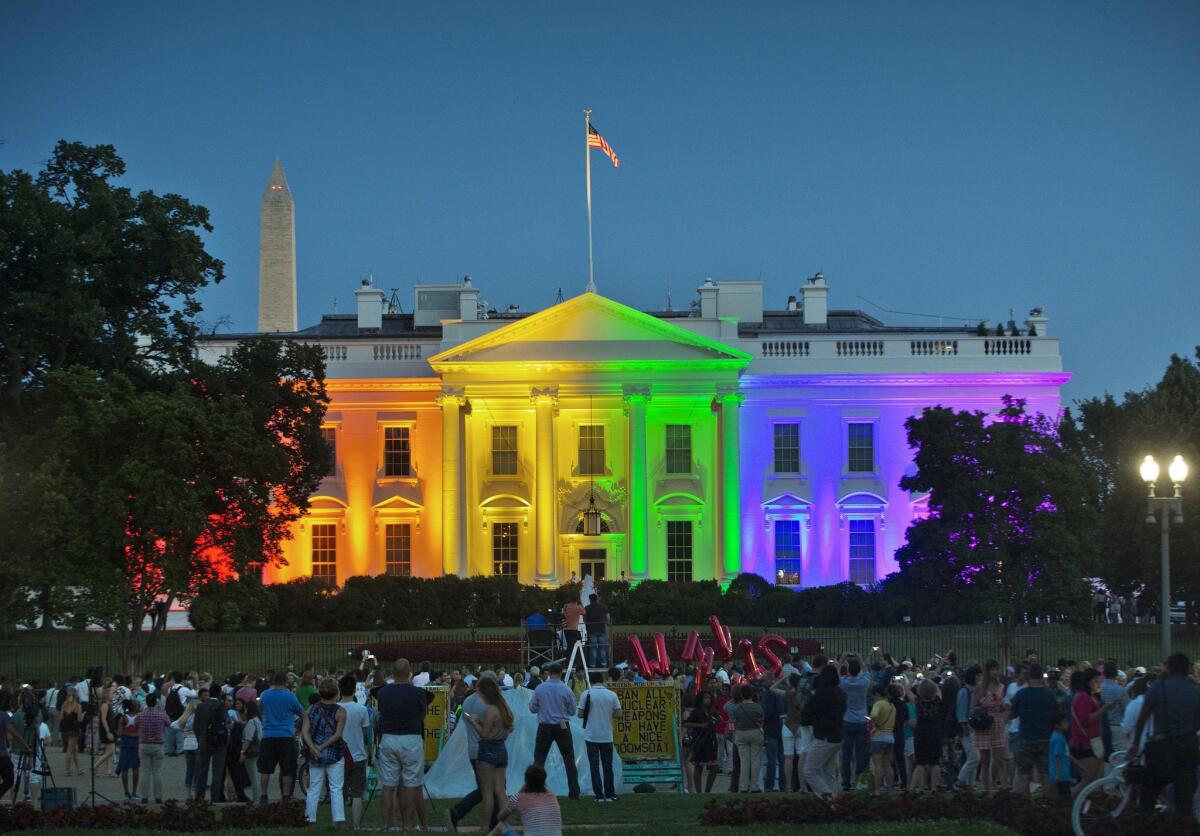
The Supreme Court agreed Monday to consider a case next fall about the rights of people who oppose same-sex marriage — a group that has steadily shrunk in recent years.
Public opinion on same-sex marriage appears to be following the same pattern as views of marriage between people of different races — something that was illegal in many states, controversial when the Supreme Court ruled in its favor in 1967 and now accepted by all but a fairly small minority.
As recently as a decade ago, more than half of Americans said they opposed allowing gay and lesbian couples to marry legally. Today, two years after the Supreme Court ruled that the Constitution requires states to allow same-sex marriages, opposition has fallen to about one-third of the population, according to a new survey released Monday by the nonpartisan Pew Research Center.
Nearly two-thirds now support equal marriage rights for same-sex couples, the survey showed. Other recent surveys have shown similar trends.
Opposition to same-sex marriage remains strongest among white, conservative evangelical Protestants, like the Colorado baker, Jack Phillips, who has brought his challenge to his state’s civil rights law to the Supreme Court. He argues that his cakes are an artistic expression protected by the 1st Amendment and that requiring him to produce them for couples he disapproves of violates his rights.
Among white evangelicals, 35% support same-sex marriage rights, and 59% are opposed. Even among that group, however, support for same-sex marriage rights has grown, the survey showed. The numbers suggest that trend likely will continue.
Among white evangelicals born after 1964 — millennials and members of Generation X — 47% support same-sex marriage. By contrast, among white evangelicals in the baby boom generation and older, just over 25% support same-sex marriage.
That’s in keeping with the trend in society as a whole, in which large majorities among the younger generations support equal marriage rights.
With support growing among evangelicals, who make up a large share of Republicans, the party’s followers are now evenly divided on the marriage issue. Democrats, who were closely divided a decade ago, now overwhelmingly support same-sex marriage.
By contrast, the public is almost equally divided on the issue coming before the high court -- pitting equal rights for same-sex couples against the assertion of religious rights by those who oppose them. A Pew survey nine months ago found 49% of Americans felt that people who offer wedding-related services should be required to treat same-sex couple equally, while 48% said that those with religious objections should exempt.
The latest Pew survey was conducted June 8 to 18 among a national sample of 2,504 adults, it has a margin of error of 2.3 percentage points in either direction for the full sample.
Top GOP leader says Senate on track for healthcare vote, but ‘it’s going to be close’
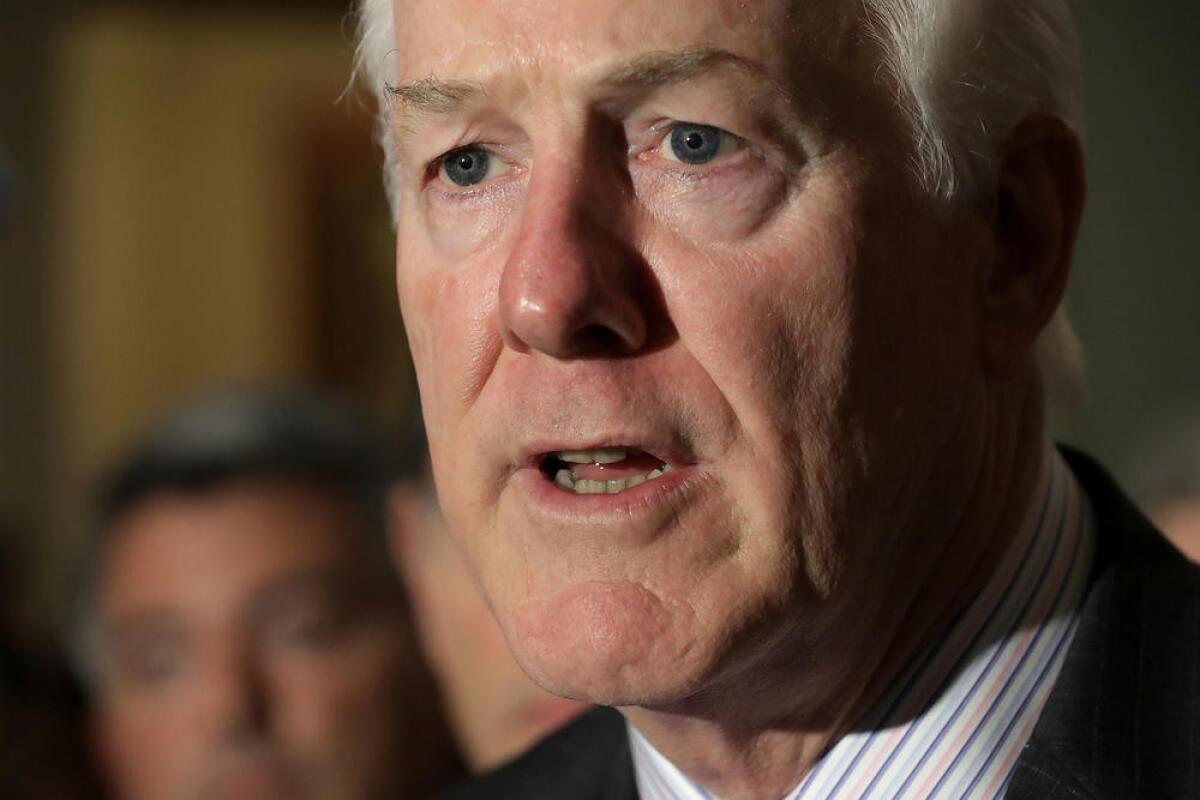
Senate GOP Whip John Cornyn said leaders are working over weekend to bring five Republican senators who oppose the healthcare overhaul on board.
The Senate remains on track to start Wednesday’s procedural votes in hopes of passing the bill next week.
“But it’s going to be close,” the No. 2 Republican told reporters Sunday at the wealthy Koch network’s donor summit.
Cornyn said Trump is “important in the process” but acknowledged hopes for a Fourth of July bill signing expressed by one Republican lawmaker were “optimistic.”
The Texas senator also downplayed criticism from fellow Republicans of a rushed process, saying consumers need relief from spiking premiums.
“It’s not going to get any easier,” he told reporters. “We don’t have the luxury of waiting around.”
Analysis: Atop 2017 losses, a sobering challenge for Democrats aiming at Trump next year
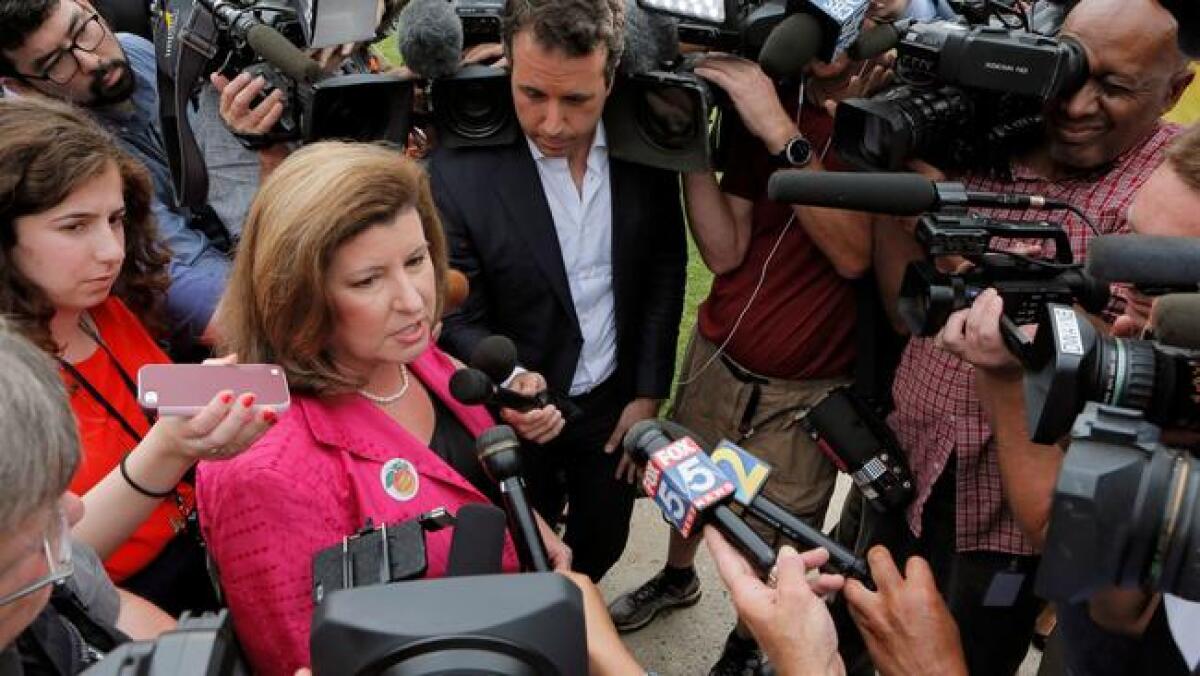
Democrats have hoped that President Trump’s deep unpopularity would propel them to gains in next year’s midterm election as they fight to take control of the House and improve their position in the Senate.
But last year’s contests and this year’s special elections suggest a complication: Trump is so distinctive a politician that it’s hard to persuade voters that other Republican candidates are carbon copies of the president. Trump’s outsized persona makes even those Republicans who share his views seem more moderate, an important attribute to swing voters.
That presents a problem for the party out of power.
Midterm elections traditionally serve as referendums on the president, but voters’ complicated views of Trump may give Republicans more running room than his popularity figures suggest. The votes cast by individual Republican incumbents may be more important to their survival than any linkage with the president.
Conservatives at Koch summit outline changes to Senate healthcare bill to win their support
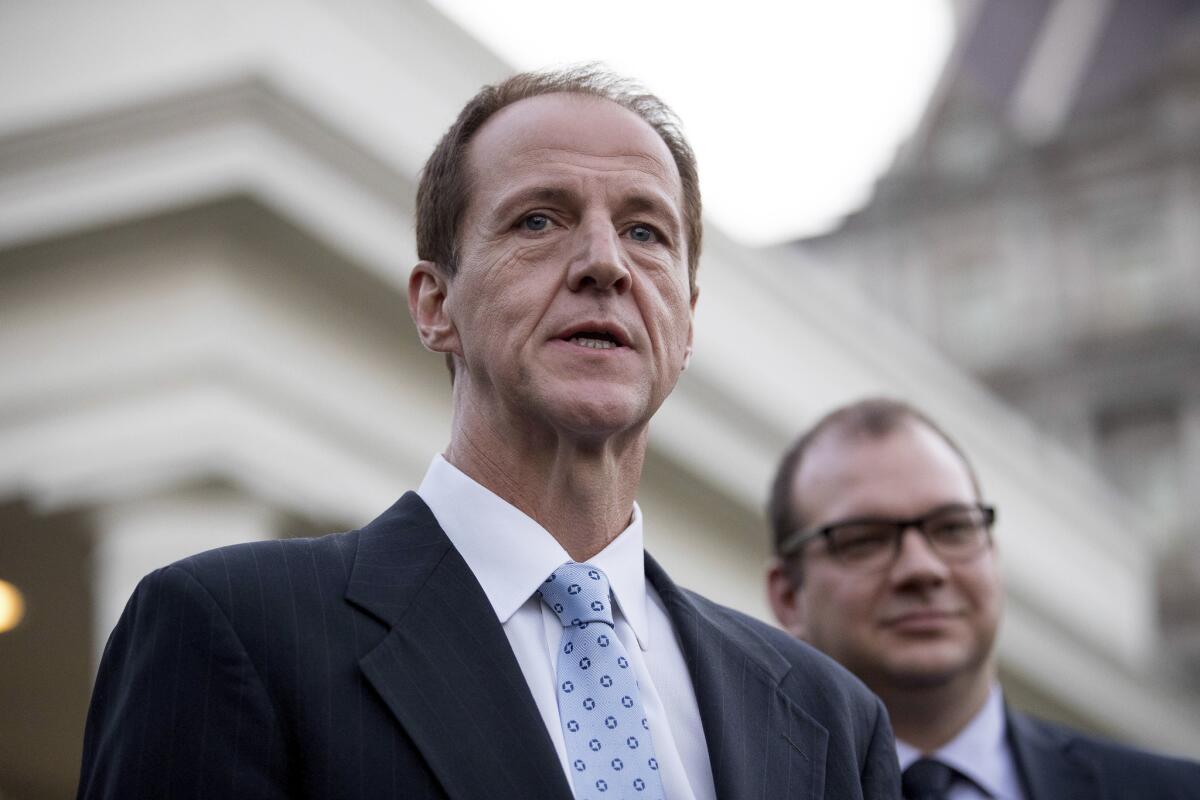
Conservatives floated two amendments for toughening up the Senate’s Obamacare overhaul this weekend at the influential Koch network’s confab of wealthy donors, as Republicans seek ways to win over detractors and tip enough GOP votes for passage.
That the Koch network quickly panned the Senate bill is no surprise. The organization of deep-pocketed conservative advocacy groups similarly rejected the House GOP bill this spring until party leaders tacked on tough amendments to appease right-leaning Republicans.
“We’ve been disappointed that movement’s not been more dramatic toward a full repeal or a broader rollback of this onerous law Obamacare,” said Tim Phillips, who heads Americans for Prosperity, the largest of the Koch network’s advocacy groups.
“But we are not walking away,” he said. “We worked to make the House bill better and it did get better…. We’re doing the same thing on the Senate front.”
One key lawmaker attending the weekend summit at the luxurious Broadmoor Hotel, Rep. Mark Meadows (R-N.C.), the chairman of the House Freedom Caucus and a chief negotiator on the House bill, outlined two key changes to the bill that he said could likely win enough conservative support for passage.
One amendment from Sen. Ted Cruz (R-Texas) would allow companies that offer insurance policies on the Obamacare marketplace to also offer plans that do not meet the ACA’s strict requirements.
Such a change would in essence allow insurers to offer cheaper, though skimpier, policies that may help achieve the GOP’s goal of lowering premiums for consumers.
Another amendment would broaden the ability of those who buy insurance on the marketplace to sock away more money in tax-free Health Savings Accounts to help them pay for their premiums.
Cruz is one of four Senate conservatives who have said they would not support the bill unless changes are made, positioning them for negotiations in the days ahead.
Senate Majority Leader Mitch McConnell (R-Ky.) needs to win back some of their votes to pass the bill with his slim 52-seat Republican majority. One of the conservatives, Sen. Mike Lee (R-Utah), was among those feted Saturday night at a reception with Charles Koch, the billionaire industrialist who funds the conservative network.
Koch told those gathered for an outdoor cocktail reception on a breezy Colorado Springs evening about how far his team has come over the years at promoting what is a libertarian-leaning conservative agenda.
“Now when I look at where we are, at the size and effectiveness of this network, I’m blown away,” he told donors. Koch met Friday with Vice President Mike Pence.
But the politics in the Senate remain difficult as McConnell continues to negotiate behind closed doors and rushes the bill to a vote expected this week.
On Sunday, one key centrist, Sen. Susan Collins of Maine, doubted a swift resolution.
“It’s hard for me to see the bill passing this week,” she said on ABC’s “This Week.”
Another crucial vote, Sen. Bill Cassidy of Louisiana, a physician who had offered his own proposal, also criticized the rush.
“I frankly would like a few more days to consider this,” Cassidy said on CBS’s “Face the Nation.”
But Republicans are anxious to resolve the healthcare debate, which has created a logjam in their legislative agenda.
Meadows also told reporters if the Senate passes the bill this week, the House could quickly follow with a weekend session -- ahead of a Fourth of July bill signing by the president.
Schiff: Obama should have acted on Russian interference, but Trump shouldn’t complain
A top House Democrat says President Obama should have reacted more forcefully upon learning of Russian election-meddling, but also asserted that it was illogical for President Trump to levy such criticism against his predecessor.
“I think the [Obama] administration needed to call out Russia earlier, needed to act to deter and punish Russia earlier,” Rep. Adam B. Schiff (D-Burbank), said in an interview aired Sunday on CNN’s “State of the Union.” Failure to do so, he said, had been “a very serious mistake.”
But Schiff, the ranking Democrat on the House Intelligence Committee, said Trump’s criticism of Obama made little sense in light of the current president’s own inaction in the face of decisive U.S. intelligence conclusions about Kremlin efforts to tip the 2016 race to Trump.
Trump, Schiff said, “is in no position to complain here” in light of the fact that as a candidate, he openly urged the Russians to hack Clinton’s emails.
“To criticize Obama is now a bit like someone knowingly receiving stolen property blaming the police for not stopping the theft,” said Schiff, a former prosecutor.
On Saturday, Trump issued a statement on Twitter referencing a Washington Post report a day earlier detailing the previous administration’s wrestling with how, when and whether to make public the degree of Russian interference.
“Since the Obama Administration was told way before the 2016 Election that the Russians were meddling, why no action? Focus on them, not T!” the president tweeted.
The Post report said Obama was worried about the appearance of improperly using mounting intelligence reports about Russian activities to aid Clinton’s candidacy. The subject was particularly inflammatory because at that point in the race, Trump had complained repeatedly about the “rigged” political process and even suggested he might not respect the election outcome.
Trump says he’s optimistic about Senate approval of GOP healthcare measure
President Trump says he believes that backers of a sweeping GOP healthcare measure are “going to get there” and pass the measure despite the refusal of five Republican senators to endorse the bill as written.
“Healthcare is a very, very tough thing to get, but I think we’re going to get it,” Trump said on “Fox and Friends” in an interview aired Sunday that he had touted beforehand on Twitter.
“We don’t have too much of a choice because the alternative is the dead carcass of Obamacare,” the president said, referring to the Affordable Care Act, his predecessor’s signature piece of legislation.
Opinion polls have indicated low public support for the version of the healthcare bill passed earlier by the House of Representatives. Senate Majority Leader Mitch McConnell (R-Ky.), wants to bring the Senate version, unveiled days ago, to a vote this week.
In addition to the five Republican senators who have publicly aired their opposition, several others have declined to explicitly endorse the bill, which would overhaul the U.S. healthcare system and set the stage for massive tax breaks that would primarily benefit the wealthiest Americans.
With a 52-seat Republican advantage in the 100-member chamber, only three GOP defections would be sufficient to derail the measure, since Vice President Mike Pence could cast a tie-breaking vote.
Pro-Trump group launches new attack ad against special counsel Robert Mueller
A Southern California group backing President Trump is out with a new ad attacking special counsel Robert S. Mueller III, criticizing the investigation into the Trump campaign’s possible cooperation with Russian interference in the 2016 election.
The ad, called “Witch Hunt,” features conservative favorite Tomi Lahren reflecting Trump’s own language to complain about the probe. The more than $400,000 ad buy is expected to start running Sunday.
“Only in Washington could a rigged game like this be called independent,” Lahren says, using air quotes in the ad to emphasize her point. She is now a senior advisor to Great America Alliance, which backs Trump.
The ad’s chief complaint echoes Trump’s criticism that Mueller’s team has ties to Democrats, because some of the lawyers have given campaign contributions to the party. Trump has also complained of the relationship between fired FBI Director James B. Comey and Mueller, who was once his boss.
Mueller is a registered Republican. Among the members of the legal team he is assembling for the Russia probe -- which is also looking into whether the president obstructed the federal investigation by firing Comey -- four have donated to Democrats. One who gave the maximum donation to Trump rival Hillary Clinton also donated to Republicans.
Both Republicans and Democrats have praised Mueller’s credentials and ability to handle the Russia probe as an independent investigation.
The group, which ran a similar attack against Comey ahead of his testimony earlier this month on Capitol Hill, has emerged as a key pro-Trump organization.
Amid probe into his campaign’s links to Russia, Trump accuses Clinton of ‘collusion’ against Sanders
President Trump, in a return to campaign-style rhetoric, on Sunday accused Hillary Clinton of engaging in “collusion” in order to win last year’s Democratic presidential nomination.
The presidential statement, issued on Twitter, did not refer directly to a broad-ranging investigation by a special counsel as to whether his own campaign had colluded in the Russian election meddling documented by U.S. intelligence agencies.
But the tweet implied -- as Trump has repeatedly insisted in recent months -- that he is being unfairly maligned over events during and after the 2016 campaign.
In keeping with another of his online habits, Trump coupled a personal attack on an individual with a claim of support. In this instance, he referred to Clinton’s rival for the nomination as “Crazy Bernie Sanders” but also asserted that the Vermont senator had not been allowed to fairly contest the Democratic nomination.
Aides, GOP lawmakers and legal advisors have reportedly implored Trump to stop talking about the Russia investigation on Twitter, even indirectly. Last week, the president walked back a suggestion – made in an earlier tweet – that there might have been “tapes” of his conversations with fired FBI Director James B. Comey.
Trump said Thursday on Twitter that he possessed no such tapes, while vaguely implying that such electronic surveillance might in fact exist. The White House characterized that as its formal response to a demand by congressional investigators that the president produce any existing recordings made by the White House of Trump’s conversations with Comey.
Koch brothers’ political network says Senate GOP healthcare bill is insufficiently conservative
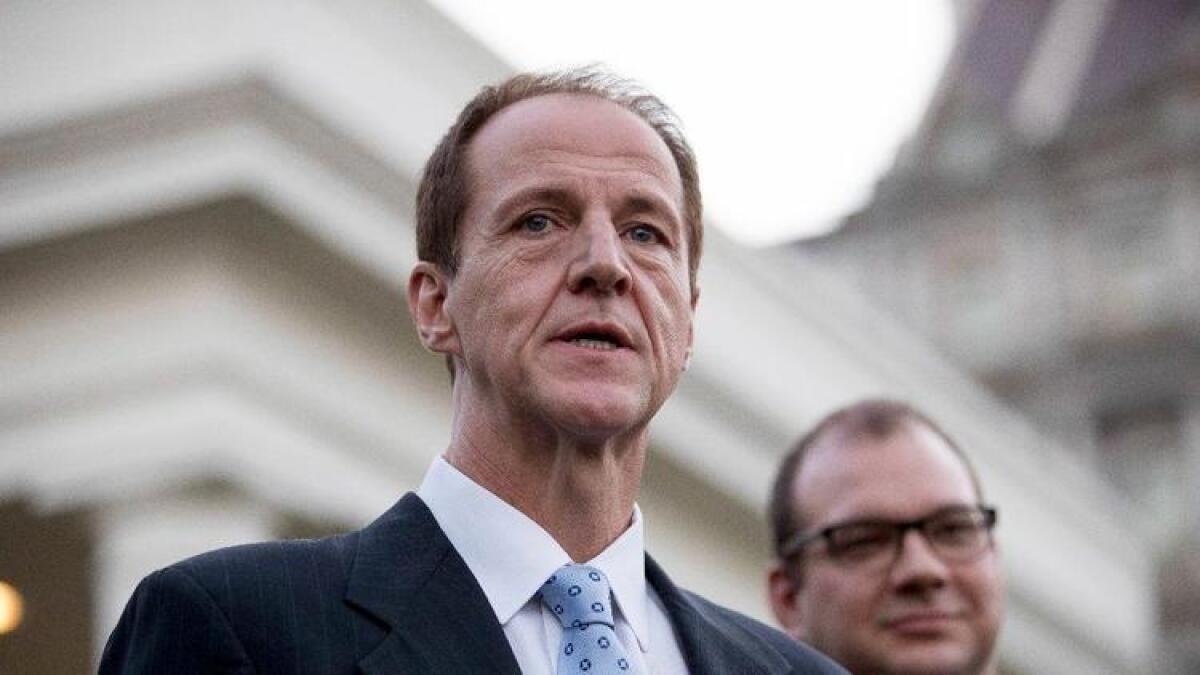
Chief lieutenants in the Koch brothers’ political network lashed out at the Senate Republican healthcare bill on Saturday, becoming a powerful outside critic as GOP leaders try to rally support for their plan among rank-and-file Republicans.
“This Senate bill needs to get better,” said Tim Phillips, who leads Americans For Prosperity, the Koch network’s political arm. “It has to get better.”
Phillips called the Senate’s plans for Medicaid “a slight nip and tuck” over President Obama’s healthcare law, a modest change he described as “immoral.”
The comments came on the first day of a three-day private donor retreat at a luxury resort in the Rocky Mountains. Invitations were extended only to donors who promise to give at least $100,000 each year to the various groups backed by the Koch brothers’ Freedom Partners — a network of education, policy and political entities that aim to promote small government.
No outside group has been move aggressive over the years-long push to repeal Obama’s healthcare law than the Kochs’, which vowed on Saturday to spend another 10 years fighting to change the healthcare system if necessary. The Koch network has often displayed a willingness to take on Republicans — including President Trump — when their policies aren’t deemed conservative enough.
Atty. Gen. Jeff Sessions wants to get tough on crime. These people think he’s got it all wrong
Atty. Gen. Jeff Sessions has vowed to crack down on crime by sending more criminals to prison for longer periods of time.
“Every one of our citizens, no matter who they are or where they live, has the right to be safe in their homes and communities from the scourge of criminal gangs, rapists, carjackers and drug dealers,” Sessions said in an address to law enforcement officials in Memphis, Tenn., last month.
In his view, imprisoning more criminals would make families safer, and fewer people would break the law if there were more severe punishments for crimes such as drug offenses.
In a recent memo to federal prosecutors, Sessions instructed them to pursue the harshest punishments legally allowed, a reversal of an Obama-era move giving federal lawyers more leeway to reserve such prosecutions for repeat offenders and people who had committed the worst of crimes.
Department of Justice officials hope the changes at the federal level — where a sliver of crimes across the country is prosecuted — will trickle down to a similar approach to crime in states.
Vice President Mike Pence stops in for an unscheduled chat with billionaire Charles Koch
Vice President Mike Pence popped in for a visit this weekend with Charles Koch, the billionaire GOP donor hosting his semi-annual confab of like-minded business leaders assessing their priorities for the White House and Congress.
The meeting was not listed on Pence’s official schedule for the day.
President Trump never much enjoyed backing from Koch ’s sprawling, secretive, political enterprise, which has emerged as a libertarian-leaning power center, sometimes overshadowing the traditional Republican Party apparatus with its high-dollar donors and vast operations. Koch’s group did not endorse the GOP presidential nominee.
But the network has always had close ties with Pence. The vice president had previously attended the exclusive gathering of donors, held this weekend at the luxurious Broadmoor hotel. And his top staff was plucked from a key Koch organization, Freedom Partners.
Pence and Koch and their top aides spoke for nearly an hour late Friday, according to a Koch spokesman. They discussed tax reform, the GOP’s healthcare overhaul and other heavy legislative lifts that have run into resistance in the Republican-controlled Congress. The aide described the talks as casual.
Pence was in the area making other stops, including at the Air Force Academy and an evening fundraiser for GOP Sen. Cory Gardner.
Even without investing in Trump, the Koch network has made impressive strides in advancing its agenda this year. Congress swiftly rolled back more than a dozen regulations, including some intended to protect the environment, that Koch-backed groups complained were too rigorous and invasive in industry operations.
The Koch network groups, including Freedom Partners, a free market-oriented, chamber of commerce-type organization, is pushing the Trump administration and Congress to pass tax reform and overhaul healthcare.
Both those efforts have stalled in Congress amid Republican infighting, but the Koch groups is able to put their army of resources – money, staff and volunteers in the states – to pressure lawmakers to act.
Kris Kobach fined for misleading court and refusing to produce previously exposed Trump memo

Kansas Secretary of State Kris Kobach has been fined $1,000 for misleading a federal court in an effort to keep two documents private.
The American Civil Liberties Union filed a lawsuit last year against Kobach arguing that his state’s proof of citizenship law violates the National Voter Registration Act. ACLU lawyers asked Kobach to produce two documents they said pertained to the case.
One of those documents was a draft of a proposed amendment to the National Voter Registration Act. The second was a document that had been photographed and widely shared in late November after Kobach met with then-President-elect Donald Trump. The power of a zoom lens exposed certain details of his proposal to Trump to deport potential terrorists.
In a 24-page ruling made public Friday, U.S. Magistrate Judge James O’Hara wrote that Kobach did not accurately represent the contents of the documents when he argued against producing them.
“Defendant refused to produce these documents, asserting that they are beyond the scope of reopened discovery, do not seek relevant information, and are protected by the attorney-client, deliberative-process, and executive privileges,” the judge wrote.
The court took Kobach at his word, O’Hara wrote, but upon review of the documents – produced under a court order – found that they did relate to the voting rights case.
The judge wrote that while the court could not say that Kobach “flat-out lied,” the “defendant’s statements can be construed as wordplay meant to present a materially inaccurate picture of the documents.”
For now, the documents will remain classified, as Kobach designated them. But, O’Hara wrote, that status could change.
Trump tapped Kobach last month to serve as vice chairman of a presidential commission that would oversee a voter fraud investigation.
Number of refugees admitted to U.S. drops by almost half
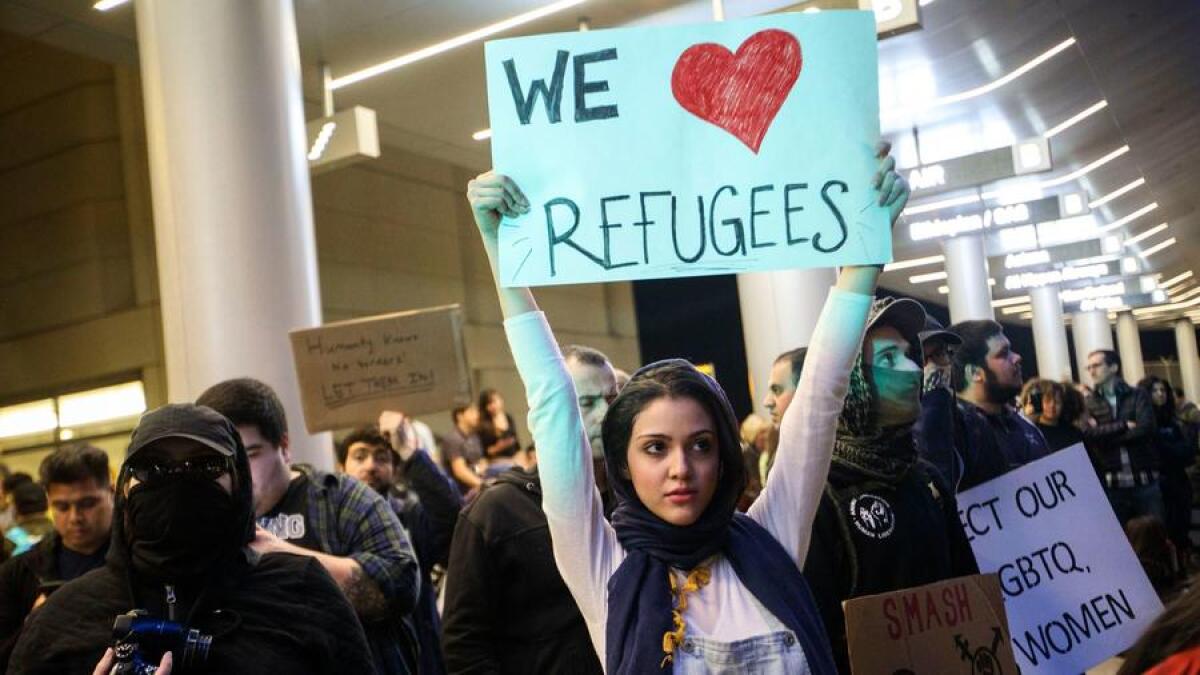
The number of refugees admitted to the United States was cut by nearly half in the first three months of the Trump administration compared with the final three months of the Obama presidency, reflecting the new president’s skepticism toward immigration.
Government statistics released Friday showed that more than 25,000 refugees were permitted to enter and reside in the United States at the end of the Obama administration. In the initial months under President Trump, the number fell to 13,000.
The statistics were released by the Department of Homeland Security, based on information supplied by the State Department.
Countries of origin were largely unchanged. In both periods, two-thirds of the arrivals came from five countries: the Democratic Republic of the Congo, Syria, Iraq, Somalia and Myanmar.
Refugees from two of those countries — Syria and Somalia — would have been banned under Trump’s executive order against entries from certain Muslim-majority nations, but federal courts have blocked the order. Trump’s original order covered Iraqis as well, but he omitted Iraq from his revised order.
The data suggest that the Obama administration, as it was about to turn over power to Trump, significantly stepped up the number of refugees admitted. Arrivals in its final three months reflected an 86% year-over-year increase compared to the same period the previous year.
In Trump’s first three months, arrivals were 12% lower than for the same period in the previous year.
Trump has sought to limit the number of refugees to 50,000 this year. But adverse rulings in the courts could work against him.
The United States already has one of the lowest quotas of refugee admissions among major receiving countries. Nations closer to conflict zones such as Syria have taken in millions of refugees.
More people have been displaced from their home nations, because of violence and poverty, than at any time since World War II.
Trump nominates former Dodgers co-owner Jamie McCourt as ambassador to Belgium
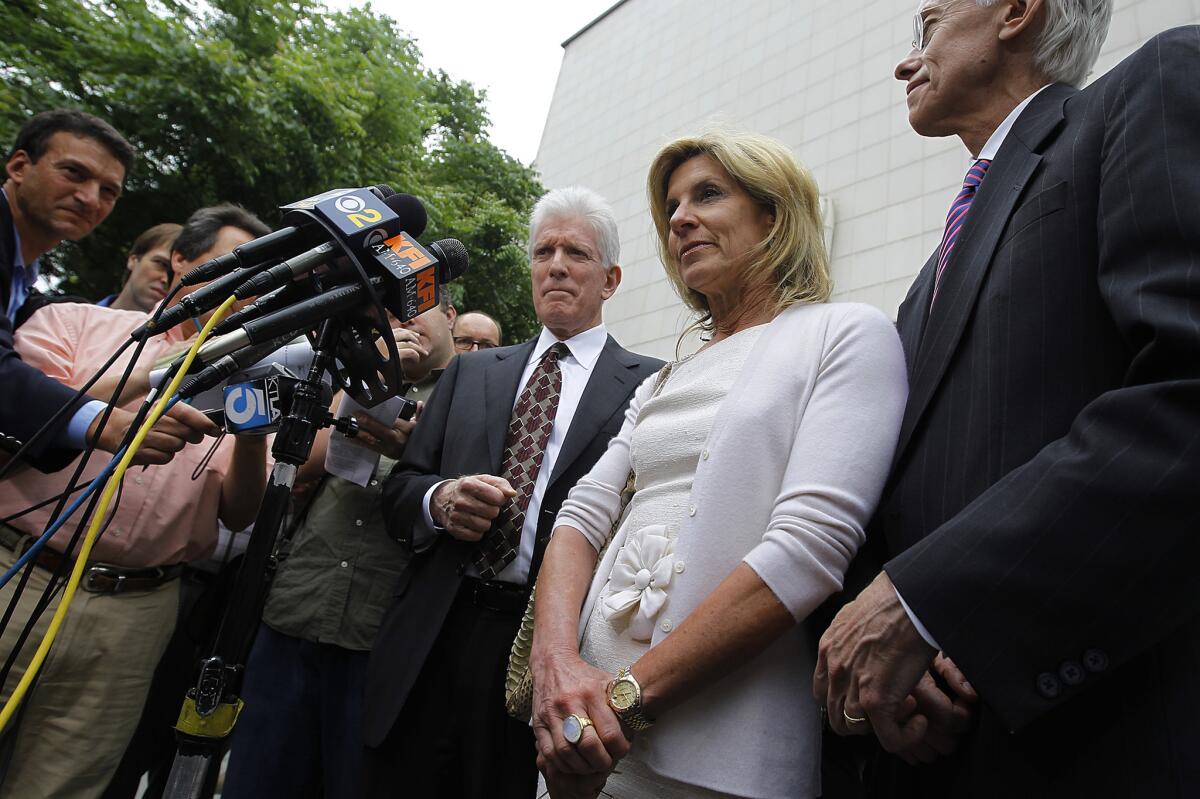
President Trump nominated Jamie McCourt, former co-owner of the Los Angeles Dodgers, to be the ambassador to Belgium on Thursday night.
McCourt, who co-owned the Dodgers with her husband, Frank, until their messy 2011 divorce, has donated money to several Republican organizations, including funds for Trump’s campaign and his transition to the White House.
McCourt was among many business leaders who signed their support for Trump early on in his campaign, praising his plan for economic development and growth. In the months leading up to Trump’s victory, McCourt gave more than $400,000 to the “Trump victory” fund, according to data from the Federal Election Commission. She signed a letter in October 2016 with 100 other business executives and CEOs championing Trump’s plan and criticizing opponent Hillary Clinton for having “thrown in the towel on strong economic growth.”
McCourt was listed as a 2016 State Victory Finance Chair for Trump’s campaign in July, according to a report from the GOP. Robert Wood Johnson, chairman and CEO of the New York Jets and Trump’s nominee for ambassador to the United Kingdom of Great Britain and Northern Ireland, was also on the list as Trump Victory vice chair.
After Trump won the election, McCourt continued to financially support his transition to office. In December, she helped host a fundraiser breakfast for the incoming president where tickets sold for $5,000 a piece.
Prior to her support for Trump, McCourt also donated to the campaigns of several other Republican presidential candidates, including John Kasich, Marco Rubio and Carly Fiorina, although in much smaller amounts.
In the past, she has also supported former President Obama, contributing to his campaign and victory funds in 2011 and donating $50,000 to the inauguration in 2009. She donated about $2,000 to Hillary Clinton for her presidential campaign in 2007, according to the FEC.
McCourt’s ex-husband said his former wife had political aspirations of her own, with an end goal of ending up in the White House, according to a March 2010 Los Angeles Times article. Her high-profile divorce gathered a lot of public attention and ended in dispute over finances and assets.
McCourt has founded and directed entrepreneurial enterprises in Los Angeles and Boston throughout her career as a entrepreneur and attorney. Her investment firm, Jamie Enterprises, invests in real estate and technology start-ups. She has degrees from Georgetown University, the University of Maryland School of Law and from MIT/ Sloan School of Management.
The Senate must confirm McCourt’s nomination for ambassador.
Nevada Sen. Heller -- a key swing vote -- says he opposes Senate healthcare bill
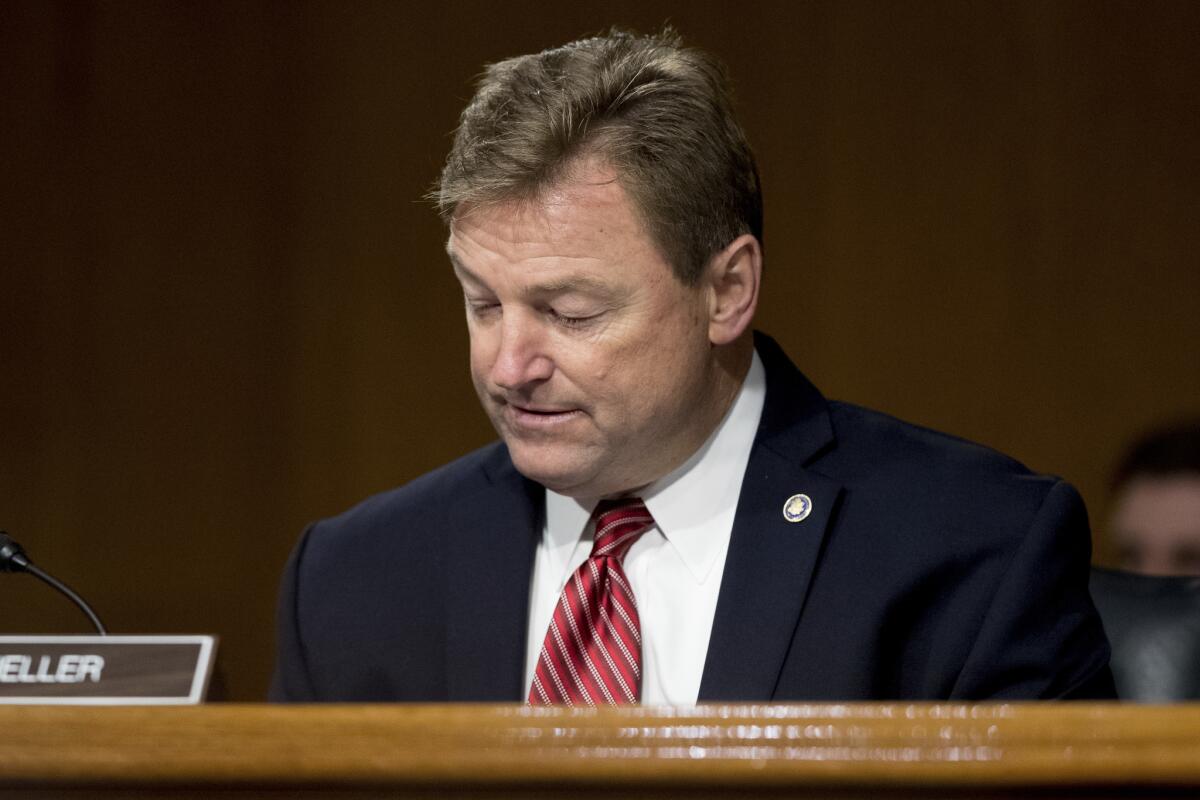
Nevada Sen. Dean Heller said Friday that he planned to vote against the Republican healthcare bill, a potentially key defection.
Although the White House and Majority Leader Sen. Mitch McConnell of Kentucky have said they plan further negotiations over the bill, “it’s going to be very difficult to get me to a yes,” Heller said at a news conference in Nevada with Gov. Brian Sandoval (R).
The bill unveiled Thursday by McConnell is “simply not the answer,” he said. “In this form, I will not support it.”
Given the unified Democratic opposition to the bill, McConnell can afford to lose only two Senate Republicans, so Heller’s announcement is significant.
A no vote by Heller would not seal the fate of the bill, however. Heller is widely viewed as the most vulnerable Republican senator up for reelection in 2018 -- the only one running in a state that Hillary Clinton carried last year -- and Republican leaders have been hoping to avoid having to count on his vote.
Heller cited several reasons for opposing the bill, but the chief one was its deep reductions in federal support for Medicaid.
“This bill will mean a loss of coverage for millions of Americans and many Nevadans,” he said.
Nevada, under Sandoval, has used its authority under the Affordable Care Act to expand Medicaid, which has given health coverage to more than 210,000 additional state residents, Sandoval said.
“These are folks who are worth fighting for,” he added.
The cutbacks the Senate bill, which would end Medicaid expansion, would cost the state $120 million a year by 2022, with the cost rising sharply after that the governor said. “That’s a cost that the state cannot sustain.”
Heller also cited the bill’s impact on treatment for opioid addiction and the likelihood that the plan would fail to reduce premiums.
“There isn’t anything in this piece of legislation that will lower your premiums,” he said, contradicting one of the main arguments that supporters of the bill have made.
Heller’s announcement increases the pressure on McConnell to find ways of persuading several other reluctant senators to support the bill.
Four conservatives, Sens. Rand Paul of Kentucky, Mike Lee of Utah, Ted Cruz of Texas and Ron Johnson of Wisconsin, said Thursday they were opposed to the bill in its current form because it does not go far enough to roll back the Affordable Care Act.
Several more centrist senators, including Sens. Susan Collins of Maine, Lisa Murkowski of Alaska, Rob Portman of Ohio and Shelley Moore Capito of West Virginia, have voiced concerns similar to Heller’s about the depth of the bill’s Medicaid cutbacks and its impact on opioid treatment.
Collins and Portman have both said they want to review the analysis of the bill from the Congressional Budget Office before making up their minds. The budget office has said it will release that assessment early next week.
Trump signs VA reform bill to make it easier to discipline and fire employees
President Trump signed into law Friday a bill that will ease restrictions on the discipline and termination of employees from the troubled veterans affairs department.
The Accountability and Whistleblower Protection Act of 2017 is designed to speed up the process to discipline an employee for misconduct and put more decision-making power in the hands of Secretary of Veterans Affairs David Shulkin.
The act is in response to the 2014 VA scandals involving long wait times for medical care and attempts by VA employees to cover up the delays.
Trump, who promised to improve healthcare for veterans during his campaign, said the bill was one of the largest reforms to the VA in its history and is “essential to making sure our veterans are treated with respect.”
The bill passed the House with bipartisan support June 13 and the Senate on June 6. Although the bill is widely supported by veterans advocacy groups, civil servant unions condemn the legislation as a way to get around long-standing protections for government employees and whistle-blowers.
The reform, Shulkin said, will not be used as a “tool for mass firings,” but rather a way to raise morale throughout the department and attract new employees. “Slow, steady, incremental change isn’t what this organization needs,” Shulkin said. “Right now, I believe this is progress.”
Mexico pushes back against Trump’s tweet calling it the second deadliest country in the world
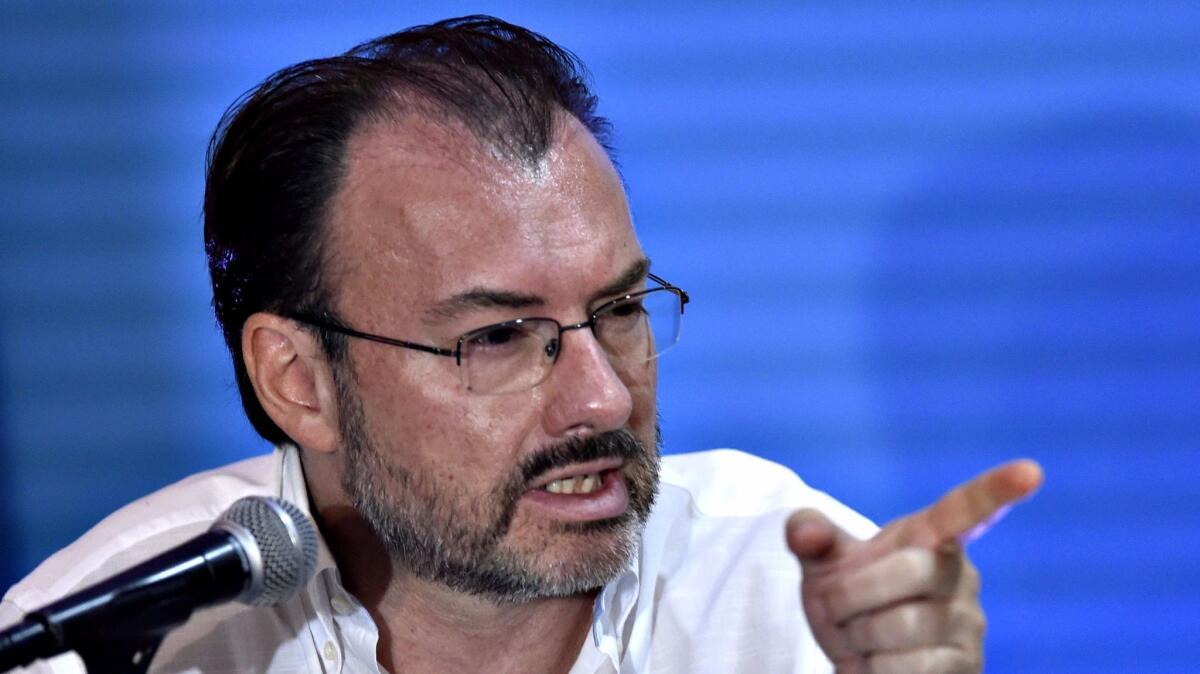
After President Trump incorrectly tweeted that Mexico is the second deadliest country in the world after Syria, the Mexican government responded quickly.
No, Mexico isn’t the second deadliest place on the globe, said a tersely worded statement issued by Mexico’s secretary of foreign relations, pointing to a host of other Latin American countries that have higher per capita murder rates.
And while homicides have been rising in Mexico in recent years, rising violence in Mexico is inextricably linked to demand for drugs in the United States, the statement said.
“Illicit drug trade is indeed the most important cause of violence in Mexico and drug trafficking is costing thousands of lives both in Mexico and the U.S.,” the foreign ministry said Thursday. “However, as has been repeatedly stated by the U.S. government itself, drug trafficking is a shared problem that will end only by addressing its root causes: high demand for drugs in the U.S. and supply from Mexico and other countries.”
“In order to be effective, we must be able to move beyond finger-pointing,” the statement said.
The Mexican government issued the response after Trump tweeted a reference to a controversial recent study that ranked Mexico as the world’s second most-dangerous conflict zone after Syria.
Trump misrepresented the study in his tweet, saying “Mexico was just ranked the second deadliest country in the world.” He also neglected the considerable debate about the study’s accuracy.
The annual Armed Conflict Survey, released this year by the International Institute for Strategic Studies, has been called into question by the Mexican government and others who say it wrongly points to the existence of an armed conflict in Mexico.
“The existence of criminal groups is not sufficient criteria to speak of a non-international armed conflict,” said a joint statement issued by Mexico’s secretaries of governance and foreign relations in May, adding that drug-war violence is part of a bigger regional problem.
Although Mexico’s homicide rate has soared — the first two months of 2017 were the most violent since the government started releasing such statistics in 1997 — other countries are experiencing higher homicide rates.
In January, Mexico had a homicide rate of 20 deaths per 100,000 people, according to a Times analysis of Mexican crime statistics.
By comparison, El Salvador’s homicide rate was 81 deaths per 100,000 people in 2016, according to InSight Crime, a think tank that studies organized crime in Latin America. Venezuela had a homicide rate of 59 deaths per 100,000 people.
Trump ended his tweet with a frequent campaign mantra: “We will BUILD THE WALL!”
Supreme Court says final decisions of term will come on Monday
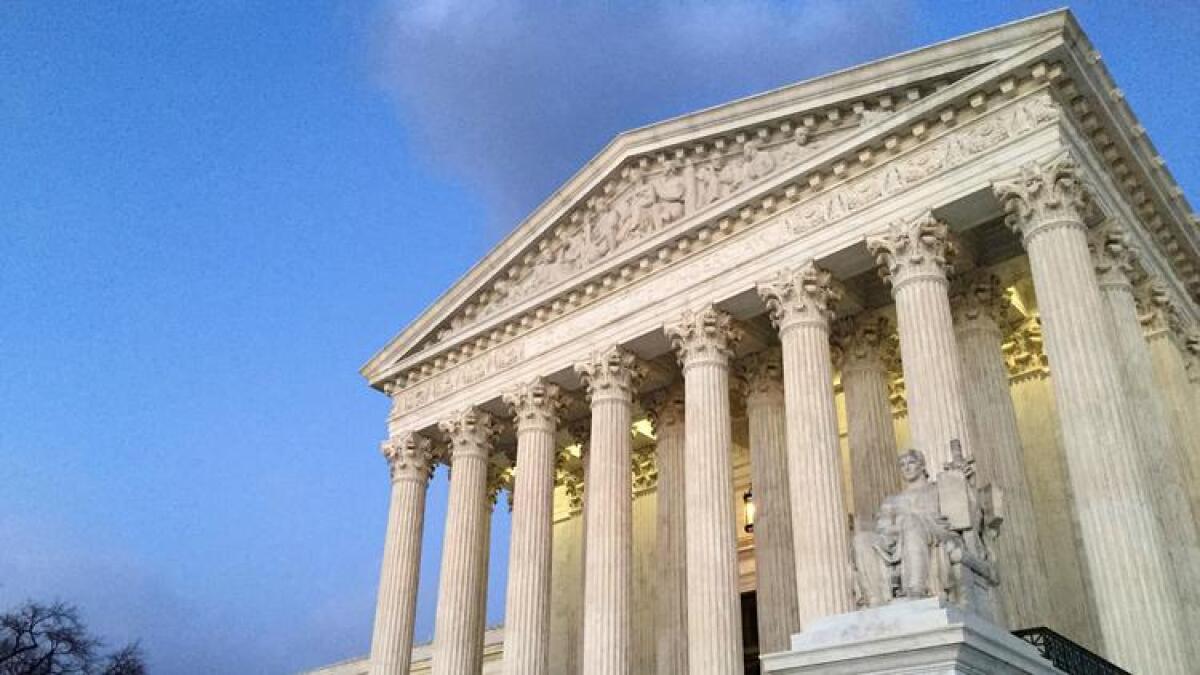
The Supreme Court announced it will hand down its final rulings for this term on Monday.
But that does not mean the justices will actually decide the six cases that remain, which include three significant disputes involving immigration and the U.S. borders.
Here’s a look at the notable decisions so far.
On Nov. 30, with one seat on the court still vacant, the eight justices heard arguments in a Los Angeles case on whether noncitizens who face possible deportation can be held in jail indefinitely or instead have a right to a bond hearing after six months. The case, Jennings vs. Rodriguez, has taken on added importance in the Trump era, but the long delay may signal that the justices are split 4-4.
If so, the court may announce Monday that the case will be reheard in the fall, leaving it to new Justice Neil M. Gorsuch to cast the tie-breaking vote.
Also still pending, since January, is a California case that will decide whether a crime such as breaking into an empty home qualifies as a “crime of violence,” triggering automatic deportation, even for an immigrant who is a longtime legal resident. A ruling in Sessions vs. Dimaya could affect thousands of deportations
The third case, pending since February, is a closely watched border shooting. At issue in Hernandez vs. Mesa is whether a U.S. agent can be sued for fatally shooting a 15-year-old who was standing on the Mexican side of the border.
On Friday, the justices gave a second chance to a Korean restaurant owner from Memphis who faces deportation for selling Ecstasy pills. Based on his lawyer’s advice, he pleaded guilty to the drug charge, having been assured it would not trigger his deportation.
The lawyer was wrong. By a 6-2 vote in Lee vs. United States, the court said the Korean man may withdraw his guilty plea and go to trial. “But for his attorney’s incompetence,” he “would not have accepted a plea,” said Chief Justice John G. Roberts Jr.. Dissenting were Justices Clarence Thomas and Samuel A. Alito Jr..
The justices, including Gorsuch, are likely to rule in a significant case on religion and funding for church schools. In Trinity Lutheran vs.Comer, the justices will decide whether states may exclude church schools from receiving public funds.
Also still pending, but on a different track, is the Trump administration’s appeal over his blocked foreign travel ban. The court may act on that appeal at any time.
Trump backs L.A. Olympic bid in meeting with IOC officials

President Trump “pledged his full support” for the Los Angeles bid to host a future Summer Olympics, the White House said Friday after an Oval Office meeting with the head of the International Olympic Committee.
Trump met Thursday with IOC President Thomas Bach and three U.S. members of the IOC -- Larry Probst, Anita DeFrantz and Angela Ruggiero.
A White House official called it a “very constructive conversation” in which Trump backed a potential third Summer Games in Los Angeles.
With only L.A. and Paris bidding to host the 2024 games, the IOC is moving to reward both cities, giving one hosting duties in 2024 and the other in 2028.
The United States hasn’t hosted a Summer Olympics since the Centennial games in Atlanta in 1996. Salt Lake City hosted the Winter Olympics in 2002.
Los Angeles Mayor Eric Garcetti said he discussed the city’s Olympic bid during a post-election conversation with Trump last November and that the then-president elect pledged his backing.
Trump says he tweeted about tapes to influence Comey’s account of their private conversations
President Trump called it “bothersome” that the special counsel now overseeing the Russia probe was “good friends” with fired FBI Director James B. Comey, and said he hinted at having tapes of his private conversations — apparently falsely — to try to influence Comey’s eventual testimony.
The president made his remarks during an interview that aired Friday morning on “Fox & Friends,” but was recorded on Thursday just hours after he tweeted that he did not, in fact, have tapes. Trump said that floating the possibility they did exist might have forced Comey “to tell what actually took place at the events.”
“When he found out that, I, you know, that there may be tapes out there, whether it’s governmental tapes or anything else, and who knows, I think his story may have changed,” Trump said. “My story didn’t change. My story was always a straight story.”
Fox’s Ainsley Earhardt followed up: “So it was a smart way to make sure he stayed honest in those hearings?”
“It wasn’t very stupid, I can tell you that,” Trump answered.
Many disagree, including Republicans. Comey testified that Trump’s tweet is what prompted him to ask a friend to slip contemporaneous memos of his conversations with Trump to reporters, to “get that out into the public square.”
In his accounts and his subsequent testimony to Congress, Comey conveyed his concerns that the president was asking him to drop the various Russia-related investigations, a request suggestive of obstruction of justice, and that Trump might lie about their encounters.
By getting the content of his memos into the news, “I thought that might prompt the appointment of a special counsel,” Comey told the Senate Intelligence Committee.
It did. Deputy Atty. Gen. Rod Rosenstein named Robert Mueller, a widely regarded lawyer who served as FBI director for more than a decade before Comey, to oversee the Russia probe.
Trump continued to disparage the investigation, which he repeatedly has called “a witch hunt” into the “hoax” that is allegations about Russia’s ties to his campaign. But in the interview he stopped short of saying Mueller should now recuse himself.
“We’ll have to see,” he said. “I can say that the people that have been hired are all Hillary Clinton supporters. Some of them worked for Hillary Clinton. I mean the whole thing is ridiculous, if you want to know the truth, from that standpoint.”
“But Robert Mueller is an honorable man and hopefully he’ll come up with an honorable solution.”
Some investigators and lawyers hired by Mueller reportedly contributed to Clinton. Yet so has Trump.
In 2007, Trump made a $600 donation to Clinton’s presidential campaign; his son, Donald Jr., made two separate donations totaling $4,000. In the 2008 and 2010 campaign cycles, Trump donated tens of thousands of dollars to individual Democrats and party committees, including former Senate Majority Leader Harry Reid (D-Nev.) and the current Senate Democratic leader, Sen. Charles E. Schumer — “Cryin’ Chuck,” as Trump calls him.
Let the political jockeying begin as Republican senators deal on Obamacare repeal
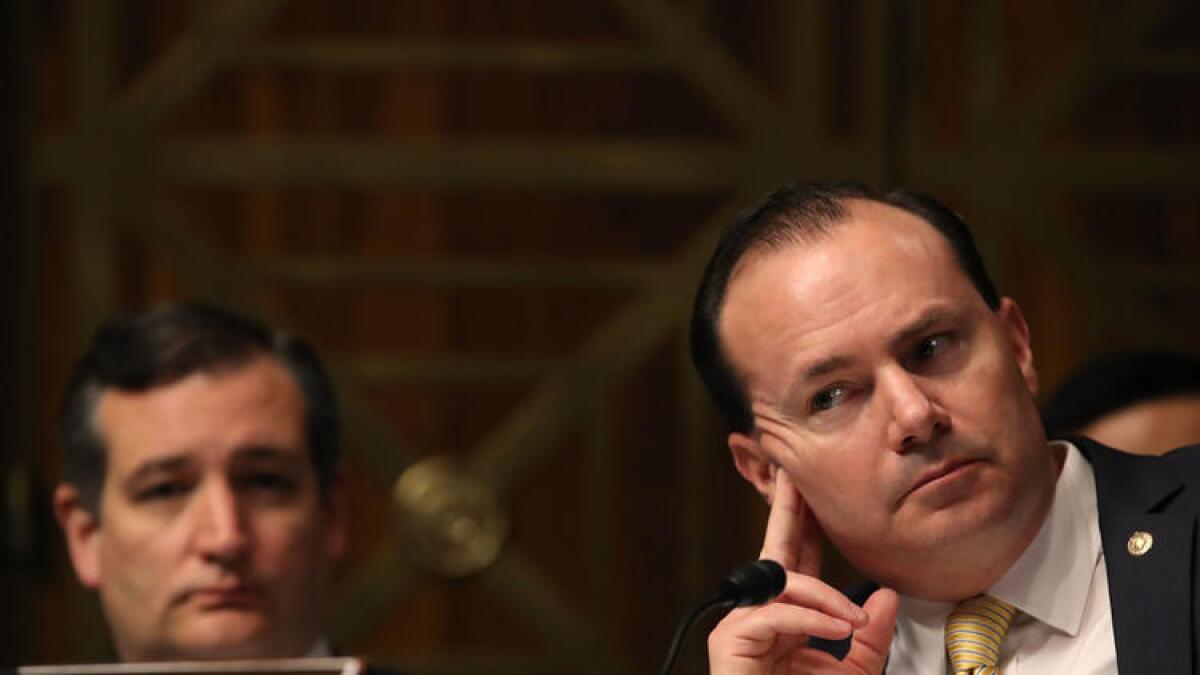
Get ready for a drama-filled week of mock hand-wringing, political jockeying and backroom brinkmanship as the Senate GOP healthcare plan heads toward a hoped-for vote next week.
No sooner did Senate Majority Leader Mitch McConnell unveil the long-awaited Obamacare overhaul Thursday than Republican senators started openly negotiating what it would take to win their votes.
Within just a few hours, four key conservative senators — Ted Cruz of Texas, Mike Lee of Utah, Ron Johnson of Wisconsin and Rand Paul of Kentucky -- jointly announced they could not possibly vote for the bill as is, unless it more fully guts the Affordable Care Act.
Likewise, centrists withheld their support unless they can push the bill the other way, as they mull the fallout from leaving millions more Americans uninsured.
Even President Trump — who called the House overhaul bill “mean” — initially withheld his endorsement, suggesting “a little negotiation” would make the Senate version “very good.” Later in the day he tweeted he was “supportive” but looked “forward to making it very special!”
Almost certainly McConnell opened the door to the haranguing by presenting the legislation as a “discussion draft” and inviting input to make it better.
After being widely panned by Democrats and Republicans alike for crafting the bill with unprecedented secrecy keeping details even from GOP senators, McConnell may now be eager to convey a sense of open debate and negotiation.
But if the process that played out in the House last month is any guide, expect the dealing-making to only go so far before Republicans quickly unify — preferring to hold hands and jump off the political cliff together rather than risk losing their best opportunity to fulfill the Republican promise to stop the Obamacare.
Senate Obamacare repeal plan would slash federal healthcare funding for Medicaid
Senate Republicans unveiled a draft bill on Thursday to roll back the Affordable Care Act, including a drastic reduction in federal healthcare spending that threatens to leave millions more Americans uninsured, drive up costs for poor consumers and further destabilize the nation’s health insurance markets.
The legislative outline, which Senate Majority Leader Mitch McConnell’s team wrote largely behind closed doors, hews closely to the Obamacare repeal bill passed last month by House Republicans, though it includes important differences. The House version was first celebrated by President Trump in a White House Rose Garden ceremony, though he later criticized the bill as “mean.”
Like the House bill, the Senate plan would eliminate hundreds of billions of dollars in taxes over the next decade, with large benefits for the wealthiest Americans. And like the House bill, it would pay for those cuts by dramatically reducing federal money for Medicaid, likely forcing states to make deep cuts in their healthcare programs for the poor. Trump promised during his campaign not to reduce Medicaid.
Although the Senate bill preserves premium subsidies that help some low-income buyers purchase insurance, it would scale them back significantly.
The reductions in federal spending for healthcare, which would be the largest rollback of the federal health safety net in history, drew sharp criticism from patient groups, doctors and some insurers.
McConnell hopes to call a vote on the measure next week, all but daring Republican holdouts to oppose it and prolong what has already been a politically painful process to fulfill their promise to do away with Obamacare.
More than 40 protesters arrested in ‘die-in’ at Capitol. Many forcibly removed from wheelchairs
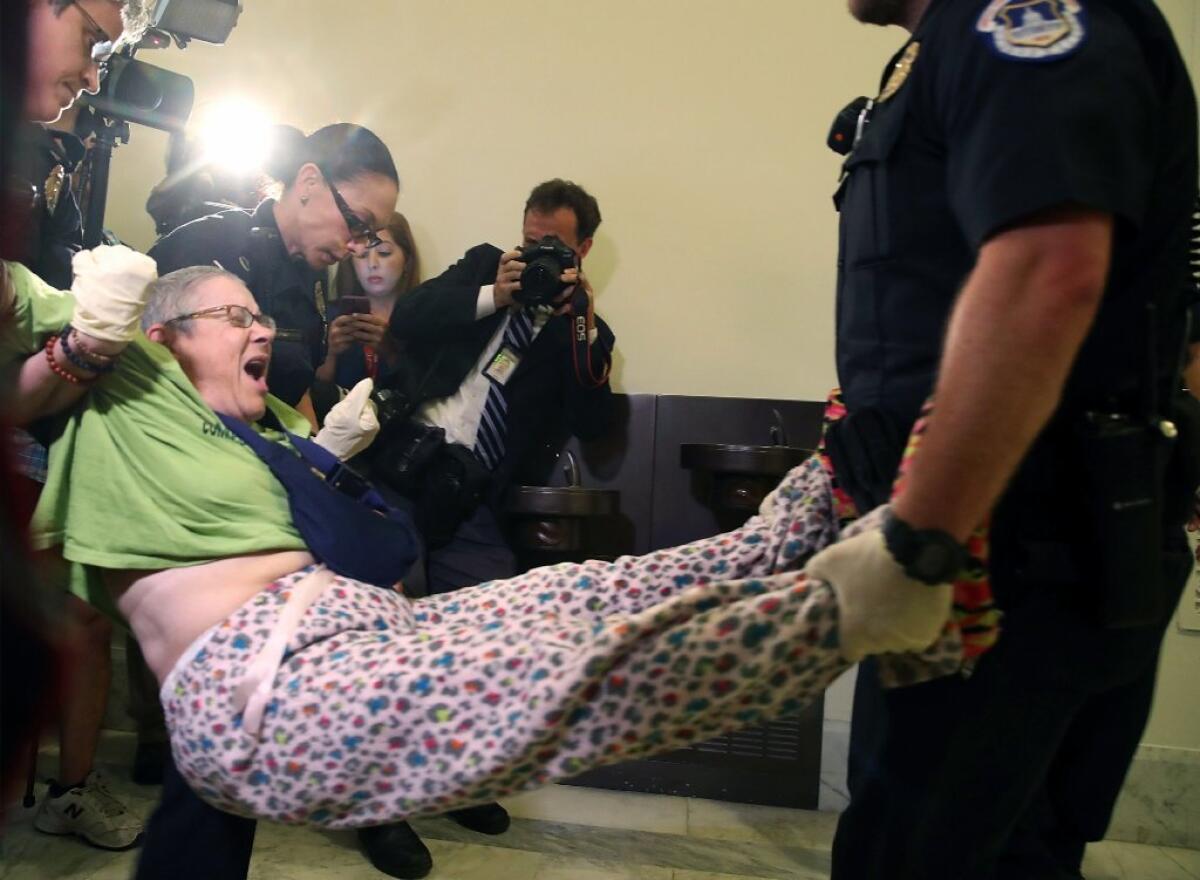
Dozens of disabled men and women were arrested after participating in a “die-in” protest outside of Senate Majority Leader Mitch McConnell’s office at the Capitol.
The demonstration, organized by the national disability group ADAPT, was staged in response to the Senate GOP’s healthcare plan, which proposes drastic cuts to Medicaid. It’s the primary source of funding for services that allow the disabled to live at home, sparing them from institutionalization.
Capitol Police say they arrested 43 people. According to spokesperson Eva Malecki, “many of the demonstrators, as part of their protest activities, removed themselves from their wheelchairs and lay themselves on the floor, obstructing passage through the hallway and into nearby offices.”
Several videos captured the scene in the marble hallway.

Protesters outside Senate Majority Leader Mitch McConnell’s office were removed from the area after staging a “die-in” on Capitol Hill on Thursday morning.
“No cuts to Medicaid!” one woman shouted as Capitol Police lifted her out of her wheelchair.
One man was lifted from the area by his arms and legs.
Another woman was wheeled away.
The protest fell on the 18th anniversary of Olmstead vs. LC – a 1999 Supreme Court ruling that said states must provide funding for the disabled to allow them to live at home. It recognized their rights to live in communities, rather than institutions.
“Here we are 18 years later and we are still fighting for our freedom from incarceration,” organizer Nancy Salandra said in a statement before the protest.
After building suspense, Trump says he doesn’t have tapes of Comey conversations
President Trump chose the day that secretive Senate Republicans released their much-anticipated healthcare bill to finally end some suspense of his own making: No, he hasn’t been surreptitiously recording conversations in the White House.
In Twitter messages posted just before a scheduled White House news briefing Thursday, the president did not entirely rule out the possibility that recordings of his private conversations — with fired FBI Director James B. Comey or anyone else — exist.
But, he wrote, “I did not make, and do not have, any such recordings.”
It was Trump who first suggested more than a month ago that he might have recordings. As he feuded publicly with Comey in the days after firing him May 9, Trump warned in a tweet: “James Comey better hope that there are no ‘tapes’ of our conversations before he starts leaking to the press!”
That tweet apparently backfired on the president. Comey has said he decided then to divulge his own contemporaneous notes of private meetings with Trump, in the hope — subsequently realized — that the Justice Department would name a special counsel to probe possible ties between Russia and the Trump campaign, and including whether the president sought to obstruct justice by urging Comey to end the FBI investigations into that and related matters.
The White House has refused to confirm or deny that Trump had been recording his conversations. And when Trump himself was asked about it at a news conference this month, he promised to answer the question at a time of his choosing. Reporters wouldn’t like the answer, he added mysteriously.
Trump has shown an uncanny ability to redirect media attention away from unflattering subjects onto other matters, even if they are hardly favorable to him.
The acting Republican chairman and senior Democrat in charge of the House Intelligence Committee’s Russia investigation had given the White House a June 23 deadline to produce any recordings that might exist of Trump’s conversations with Comey.
‘Pizzagate’ gunman sentenced to 4 years
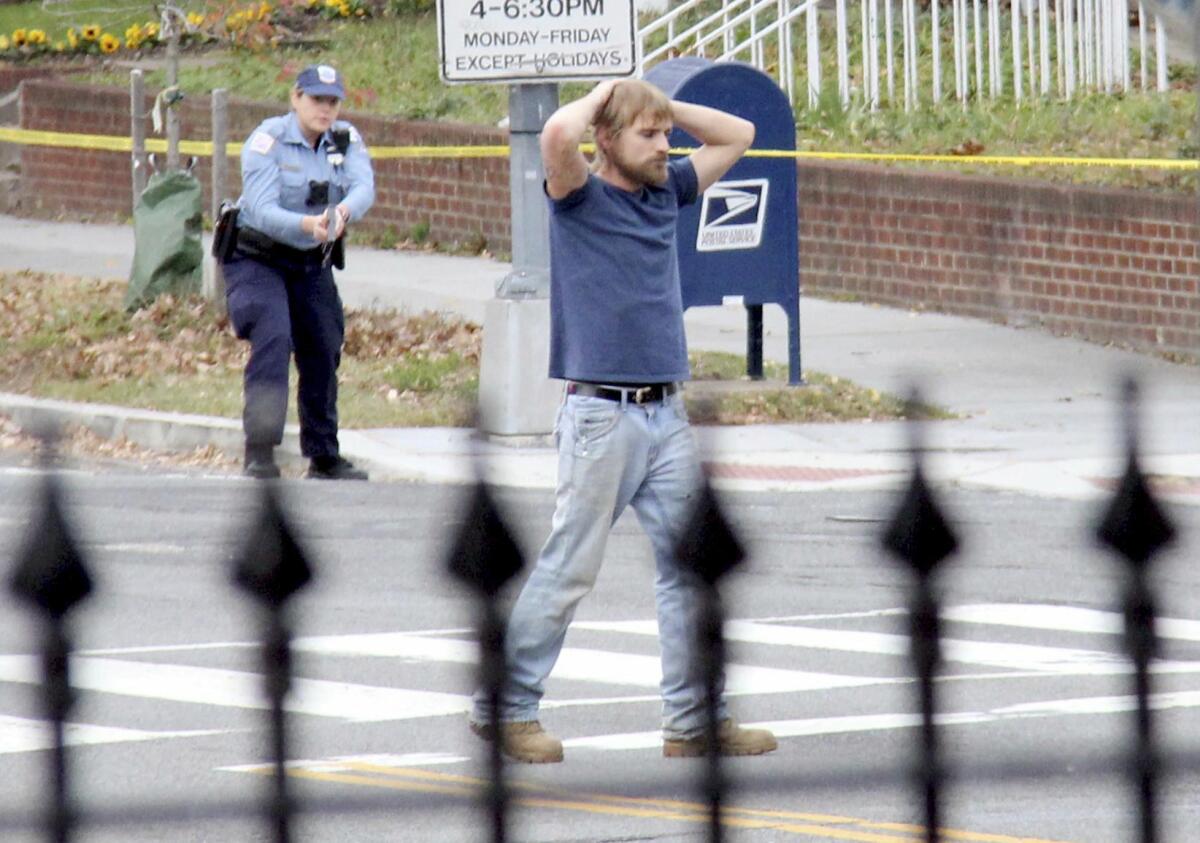
A North Carolina man who fired an assault rifle inside a District of Columbia restaurant during his investigation of a conspiracy theory dubbed “Pizzagate” has been sentenced to four years in prison.
Edgar Maddison Welch was sentenced Thursday in federal court in Washington. His attorney had asked that he be sentenced to 1 1/2 years in prison. Prosecutors asked for 4 1/2 years.
Welch pleaded guilty in March and acknowledged that he entered the Comet Ping Pong restaurant Dec. 4 with an AR-15 assault weapon and a revolver. He said he drove to the restaurant from North Carolina to investigate an unfounded conspiracy theory about Democrats harboring child sex slaves at the pizza restaurant.
No one was physically injured, but the judge says Welch’s actions “literally left psychological wreckage.”
Watch: Capitol Police remove protesters staging a health plan ‘die-in’ outside Sen. McConnell’s office

Protesters outside Senate Majority Leader Mitch McConnell’s office were removed from the area after staging a “die-in” on Capitol Hill on Thursday morning.
Protesters outside Senate Majority Leader Mitch McConnell’s office were removed from the area Thursday morning after staging a “die-in” on Capitol Hill.
The protesters staged the action in opposition to the Senate’s version of the Affordable Care Act repeal plan unveiled Thursday. McConnell is hoping to push the measure through the Senate next week.
Trump says he has no tapes of his conversations with Comey
Again using Twitter, President Trump on Thursday addressed the controversial questions of whether there were tapes of his conversations with fired FBI Director James B. Comey.
The president fired Comey in May and then tweeted that the lawman, who was overseeing the investigation into Russian interference in the presidential election and possible contacts between Trump’s campaign and Russian officials, “better hope that there are no ‘tapes’ of our conversations before he starts leaking to the press.”
At Comey’s recent hearing before the Senate Intelligence Committee, the former FBI chief said he hoped there were tapes, and gave his consent to release any that might exist.
Pelosi on rumbles for new leadership: ‘I’m worth the trouble, quite frankly’
House Minority Leader Nancy Pelosi on Thursday dismissed calls from some in her party who say it’s time for her to step aside.
A handful of Democrats have publicly said that after losing four special elections since January, especially a race in the Atlanta suburbs earlier this week, and failing to regain the majority in the House in the last four national elections, their party needs new leadership in the House. Others have privately said Pelosi weighs down Democrats and could prevent the party from retaking the House in the upcoming midterm elections.
In her weekly news conference, the San Francisco lawmaker called herself a “master legislator” and a “strategic, politically astute leader” who can raise a lot of money and has experience winning a majority in Congress.
With Republicans controlling both chambers, and President Trump in the White House, now isn’t the right time for new leadership, she said.
“I’m worth the trouble, quite frankly,” she said. “I love the fray.”
She dismissed the members who have said it is time for a change as “blatantly self-serving” and “having fun on TV.”
After being challenged for the post of minority leader in November by members who said they didn’t feel like they had enough input, Pelosi created more positions within the party leadership. She indicated Thursday that those members who play within the system are the ones she expects to one day lead the party, not the representatives complaining about her leadership.
“Maybe they don’t want to play in that arena, but I’m very proud of the members who do,” she said. “We’re paving a way for a new generation of leadership.”
Trump waded in Thursday morning with a tweet urging Democrats to keep Pelosi on, saying having her as a foil helps the GOP.
Pelosi laughed when asked about the tweet.
“That’s the first one I think he didn’t write. The Republicans gave him that,” she said. “It’s a classic Republican line.”
The Republican Party has spent tens of millions of dollars in attack ads attaching Democrats to her, Pelosi said.
“The fact is, they will always make a target. Sen. Reid was a target, Sen. Daschle was a target, Tip O’Neill was a target, I am a target. They always want to choose our leaders and usually they go after the most effective leaders because they want to diminish the opportunity that we have,” Pelosi said.
Health care still up for negotiation, Trump says
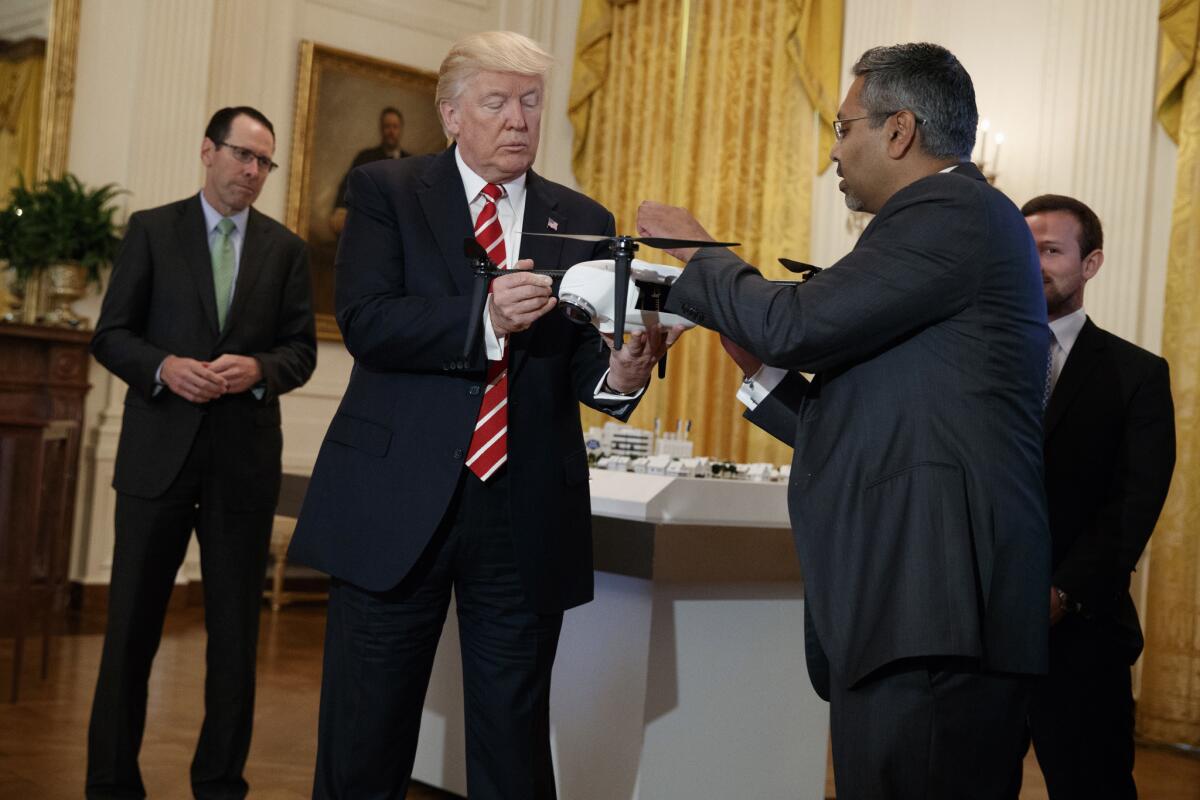
President Trump’s first public reaction to the Senate’s draft healthcare bill was to call it the starting point for more discussion.
“A little negotiation, but it’s going to be very good,” the president told reporters at an unrelated White House event in the East Room on Thursday, when asked if it had “enough heart.”
Trump said at a rally in Iowa Wednesday night that he wanted a “plan with heart.” To that end, he said he’d encouraged congressional Republicans to “add some money to it,” without specifying the purpose of such spending or the amount.
The president remained noncommittal about supporting the Senate’s newly unveiled draft, which is broadly similar to a House-passed measure that he has privately called “mean.” He said only that the issue was still “percolating.”
Both versions would result in millions of Americans losing insurance coverage.
“We’d love to have some Democrats’ support but they’re obstructionists,” Trump said. Democrats are united in opposing the repeal of the Affordable Care Act, which they considered one of their signature achievements of the Obama years.
White House officials have said the president’s legislative affairs team is “working hand-in-glove” with congressional Republicans, and that the president had been fully briefed about the evolving details this week.
Later Thursday, Trump is hosting lawmakers at the White House for the annual Congressional Picnic on the South Lawn.
Supreme Court limits the government’s ability to strip citizenship from immigrants
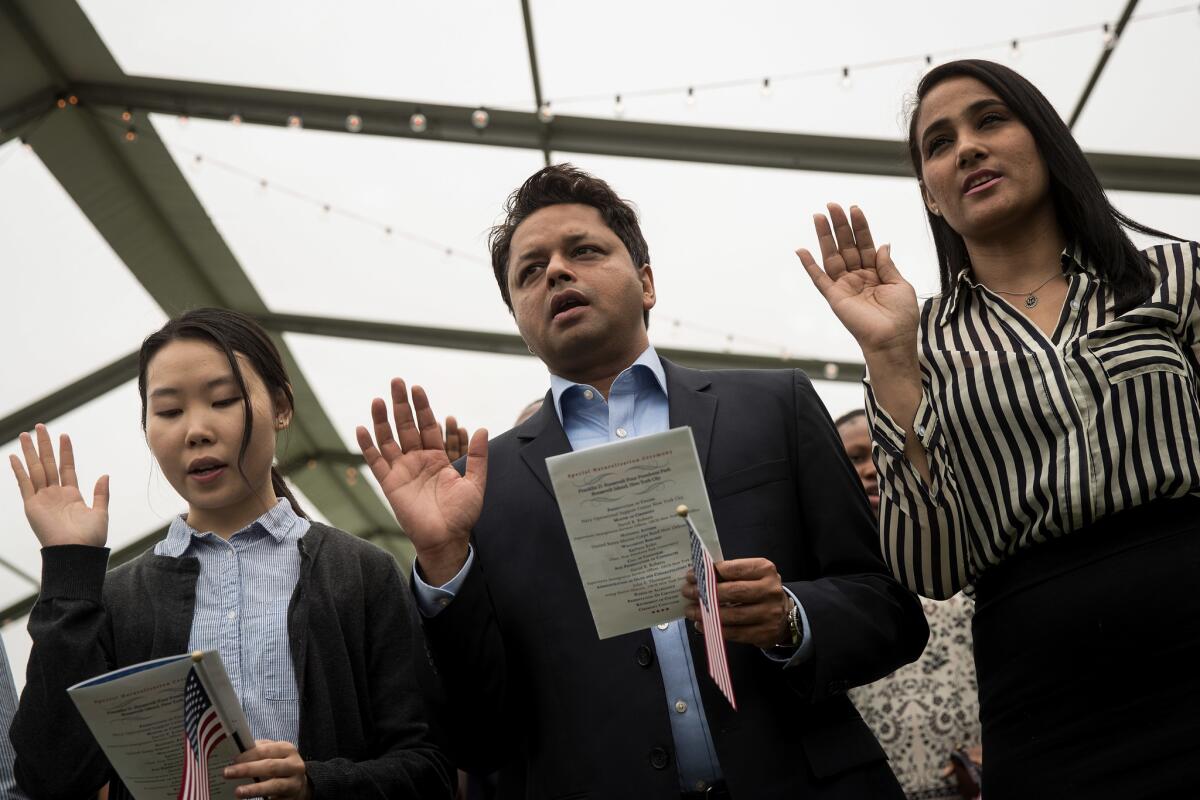
The Supreme Court on Thursday limited the government’s ability to strip U.S. citizenship from immigrants for lying during the naturalization process.
The justices ruled unanimously in favor of an ethnic Serb from Bosnia who lied about her husband’s military service.
Justice Elena Kagan wrote for the court that false statements can lead to the revocation of citizenship only if they “played some role in her naturalization.”
The court rejected the position taken by the Trump administration that even minor lies can lead to loss of citizenship.
The woman, Divna Maslenjak, and her family were granted refugee status in 1999 and settled near Akron, Ohio, in 2000. She became a citizen in 2007.
She initially told immigration officials her husband had not served in the Bosnian Serb military. That was a lie, she later conceded, and lower courts upheld a criminal conviction against her. The conviction automatically revoked her citizenship, and she and her husband were deported in October.
Maslenjak was convicted by a jury that was told that even an inconsequential lie was enough for a guilty verdict.
The high court returned the case to the 6th U.S. Circuit Court of Appeals in Cincinnati to determine whether Maslenjak’s false statements made a difference in the decision to grant her citizenship in the first place.
The case is Maslenjak vs. U.S., 16-309.
Read the Senate’s draft bill to replace Obamacare
Senate Republicans on Thursday unveiled a sweeping plan to roll back the Affordable Care Act, including a drastic reduction in federal healthcare spending that threatens to leave millions more Americans uninsured.
Press team beats Congress 2-1 in annual charity softball game
The women of the Washington press corps beat female members of Congress Wednesday in a charity softball game that raised over $300,000 for young women with breast cancer.
California members Rep. Norma Torres (D-Pomona) played catcher and Rep. Nanette Barragan (D-San Pedro) played outfield.
The annual game is considerably more low key than the annual Congressional Baseball Game, but both saw a surge on interest this year after a member of Congress and three others were shot during a baseball practice.
More than 2,500 fans came to watch the press win over Congress 2-1.
Trump takes personal interest in Americans held overseas, not human rights more broadly
Intelligence officials have found it hard to keep President Trump’s attention when they are describing complex geopolitical conflicts during his daily briefings. Yet Trump has regularly zeroed in on the status of individual Americans imprisoned overseas.
Such was the case with Otto Warmbier.
“What are we doing for that kid in North Korea?” he repeatedly asked his briefers, according to a U.S. official familiar with the Oval Office meetings.
Multiple times Trump sought to talk with the parents of the captive university student, who was arrested as a tourist last year, but the Warmbiers declined. Two U.S. officials described internal discussions surrounding the Warmbier case on the condition of anonymity. When U.S. officials learned this month that Warmbier was in a coma, Trump personally approved a risky operation to send a diplomat and two doctors to Pyongyang to demand the 22-year-old man’s release. Warmbier died Monday in a hospital, days after being returned home.
The president’s intervention in such individual cases, when Americans are involved, stands in contrast to his resistance to promoting human rights more broadly. Trump has proposed slashing U.S. programs that promote democratic values in other countries and rarely raises human rights concerns in public or private; his secretary of State, Rex Tillerson, has said such advocacy “creates obstacles” to advancing other American interests in foreign countries.
Trump says he hopes Senate healthcare bill has ‘heart’
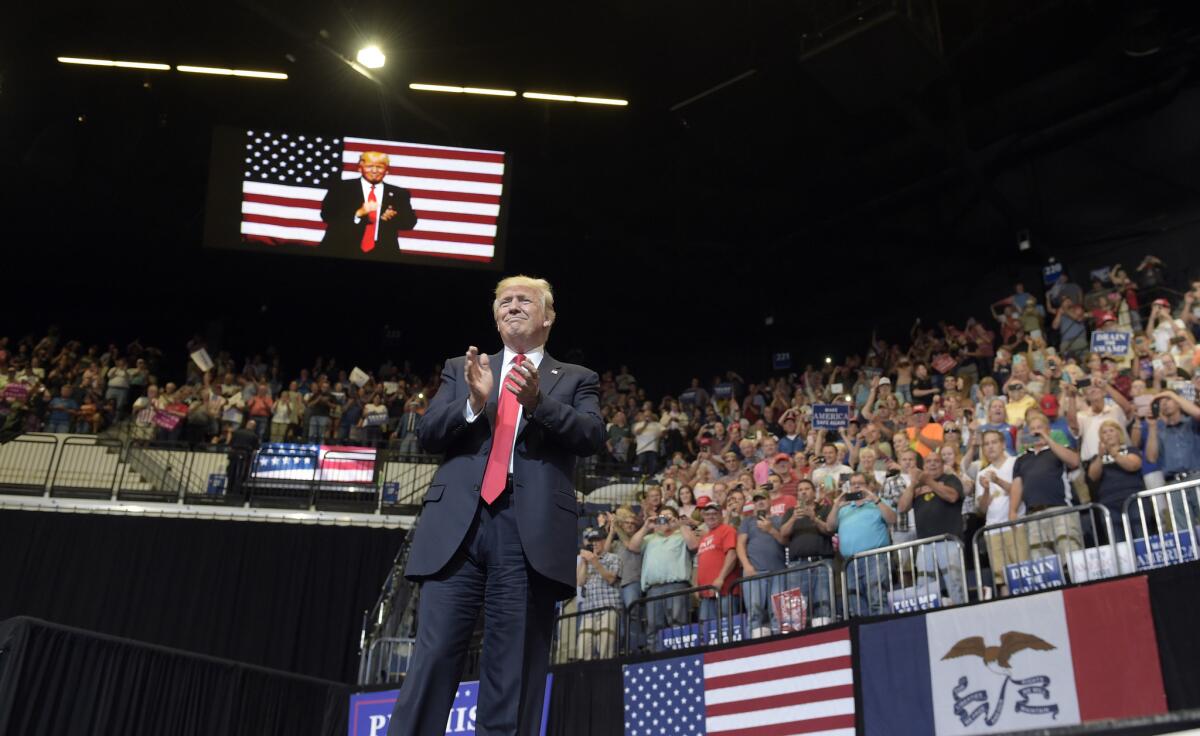
As Senate Republicans prepare to unveil their version of an Obamacare alternative, President Trump expressed his hope for a final plan “with heart.”
“I can’t guarantee anything, but I hope we’re going to surprise you with a really good plan,” Trump said at a campaign-style rally in Cedar Rapids, Iowa, on Wednesday night.
The White House said administration officials have been fully briefed on the details of a Senate healthcare bill that has been drafted with unprecedented secrecy, in advance of its planned release early Thursday. The Republican leader, Sen. Mitch McConnell, has been struggling behind closed doors to find a compromise that can get near-unanimous support from the Republican caucus, given that Democrats are united in opposition to the repeal of the Affordable Care Act.
“We basically can’t lose anybody,” Trump conceded.
The president’s talk of a bill with heart follows reports that he has privately called the House’s healthcare bill “mean” -- it would cause an estimated 23 million people to lose insurance coverage, according to the Congressional Budget Office -- despite the fact that he celebrated its passage in the Rose Garden with dozens of House Republicans.
At the Iowa rally, the president said he wanted more money for the health proposal, presumably to help cover more uninsured Americans. But as usual he did not offer any policy details.
Instead, he attacked Democrats as obstructionists.
“If we went and got the single greatest healthcare plan in the history of the world, we would not get one Democrat vote,” Trump said.
“It would be a beautiful, beautiful thing if we could get together as two parties that love our country and come up with that great healthcare, and come up with that great tax deal for our people,” he said.
Trump congratulated the two Republican victors in special elections Tuesday, mocking Democrats for falling short in attempts to capture GOP-held seats in the House. The White House said Republicans’ wins in Georgia and South Carolina showed that Trump’s agenda was resonating with the public. The winning Republicans’ margins, however, were significantly reduced from results in past elections.
“We are not going to let the same failed and tired voices in Washington keep us from delivering the change you voted for and the change that you deserve,” Trump said.
Trump clearly delighted in returning to a campaign-like setting, an arena packed with enthusiastic supporters applauding his attacks on Democrats and the media as well as his renewed calls for stricter immigration policies.
In addition to vowing to deliver on his stalled plan for a new wall on the U.S.-Mexico border — perhaps paid for in part through solar energy generation — the president said he would seek new legislation to place conditions on immigration to the United States.
“Those seeking admission to our country must be able to support themselves financially and should not use welfare for a period of at least five years,” he said, adding that immigrants would also have to “embrace our values.”
Russia, angry over sanctions, cancels meeting with top U.S. official
Thomas Shannon, a career U.S. diplomat who is the third-ranking official at the State Department, thought he was headed this week to meetings in St. Petersburg, Russia.
He planned to discuss U.S. sanctions imposed against Russia over the last three years, including the order last December to close two Russian-owned compounds in New York and Maryland in response to Russia meddling in the 2016 election.
Some members of the Trump administration had suggested it was time to return the properties, which Moscow said were used for recreation by its diplomats.
But Moscow announced Wednesday that it was canceling Shannon’s meeting with Russia’s deputy foreign minister, Sergei Ryabkov.
The reason: language issued the day before by the Treasury Department that updated the sanctions against Russia, first imposed in 2014 when it annexed Crimea and backed rebellion in eastern Ukraine.
A State Department spokeswoman, Heather Nauert, said the U.S. regretted Moscow’s decision to “turn away from an opportunity to discuss bilateral obstacles that hinder U.S.-Russia relations.”
She described the new language on sanctions as a “maintenance package” that updates the measures, something the U.S. does twice a year.
“If the Russians seek an end to these sanctions, they know very well the U.S. position: Our sanctions... will remain in place until Russia fully honors its obligations” to withdraw from the Crimean peninsula, she said in a statement.
The meeting was canceled days after the Senate voted 98-2 to approve tougher Russian sanctions. The measure also requires Congress to review any effort by the Trump administration to loosen the current sanctions.
The measure next goes to the House. The White House has not said if President Trump would sign the bill into law.
The administration has signaled it wants to improve relations with Russian President Vladimir Putin’s government, although that now seems unlikely in the short term.
Many in Congress want to prevent the White House from easing sanctions, especially since the FBI and several Congressional committees are investigating Russia’s meddling in the election last year
The Shannon meeting was scheduled as part of a senior-level working group that Secretary of State Rex Tillerson and his Russian counterpart, Sergey Lavrov, agreed to establish in April to work on improving troubled U.S.-Russian relations.
Senators to watch: These Republicans could make or break the effort to repeal Obamacare
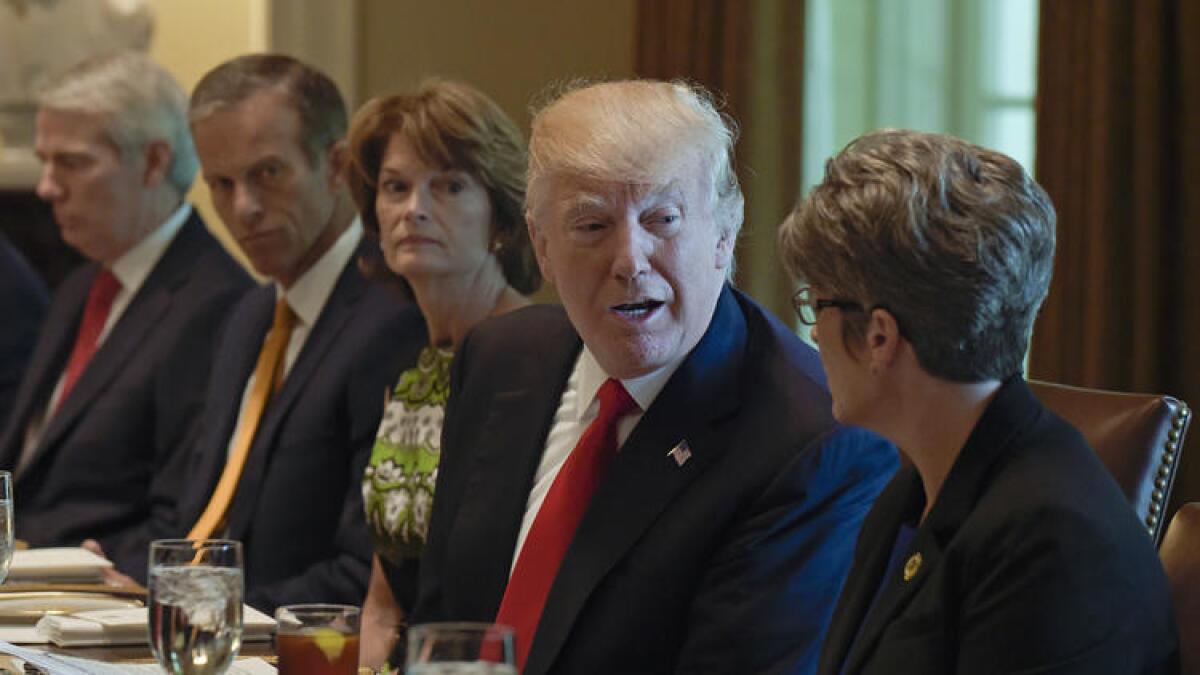
Senate Republicans have been working behind closed doors for weeks on their plan to repeal and replace Obamacare.
But not all GOP senators like the emerging legislation — which will be unveiled Thursday — and Senate leaders can’t afford to lose more than a couple when they vote, probably next week.
The most conservative senators want a quicker, more decisive end to the Affordable Care Act. Those from centrist states prefer a slower unraveling — preferring to keep Obamacare’s federal funding that allowed them to expand Medicaid to more residents.
With a slim majority and staunch Democratic opposition, GOP leaders can afford to lose just two Republican senators and still pass the bill. Even then, they would need Vice President Mike Pence for the tie-breaking vote.
Here are nine senators to watch:
Trump’s lawyers make final plea to Supreme Court on travel ban, with eye toward Justice Kennedy

President Trump’s lawyers made a final appeal to the Supreme Court on Wednesday in the pending dispute over his travel ban and quoted Justice Anthony Kennedy — likely a key swing vote — on the need to defer to the chief executive on matters of national security.
The justices are set to meet Thursday morning in their last scheduled conference before the summer recess, and they face a potentially momentous decision on the president’s power to control national borders.
The justices will vote on what to do about Trump’s plan to temporarily “suspend” the entry of foreign travelers from six Muslim-majority nations.
Trump’s order has never taken effect. A judge in Maryland blocked it, and the 4th Circuit Court agreed on the grounds it reflected religious discrimination against Muslims. A judge in Hawaii also blocked it, and the 9th Circuit Court in California upheld his decision, ruling Trump had not shown the travel ban was needed to protect against terrorism.
The administration’s lawyers insist both rulings are fundamentally mistaken. And they have filed two separate requests with the high court.
First, they urged the justices to issue an order that would allow Trump’s plan to take effect immediately. If so, the limited ban would run for 90 days.
And second, they asked the justices to grant review in the fall of the two lower rulings so they can rule broadly on the president’s power to prevent certain foreigners from entering the country.
In Wednesday’s appeal, acting Solicitor Gen. Jeffrey Wall quoted Justice Kennedy’s words from an opinion issued two days ago. “National security policy is the prerogative of the Congress and the President,” Kennedy said. Courts should “accord deference to what the Executive Branch has determined is essential to the national security,” he said in Ziglar vs. Abbasi.
Kennedy was explaining the court’s reasons for throwing out a post-9/11 lawsuit against top Bush administration officials who had ordered a roundup of Muslim immigrants in the New York area.
Not surprisingly, Kennedy also figures to hold a decisive vote in the travel ban case.
It is not clear how the justices will proceed, let alone what they will decide.
One option would be to issue a short order with no explanation. They could refuse to put Trump’s order into immediate effect, but also agree to hear the administration’s appeal in the fall. If the justices are closely divided, they may opt for this mixed result.
If the court’s conservatives can muster five votes, they could put Trump’s order into effect immediately. But doing so would almost surely prompt a sharp dissent from the liberals.
It is also possible the justices may agree with some legal analysts who have argued that the need for a temporary travel ban has passed, because Trump’s team has now had ample time to devise new “vetting procedures” for the six nations. Even so, however, the court’s conservatives are not likely to let the two appellate court rulings stand unchallenged as the law.
Trump and conservative media take a victory lap of sorts with special election wins
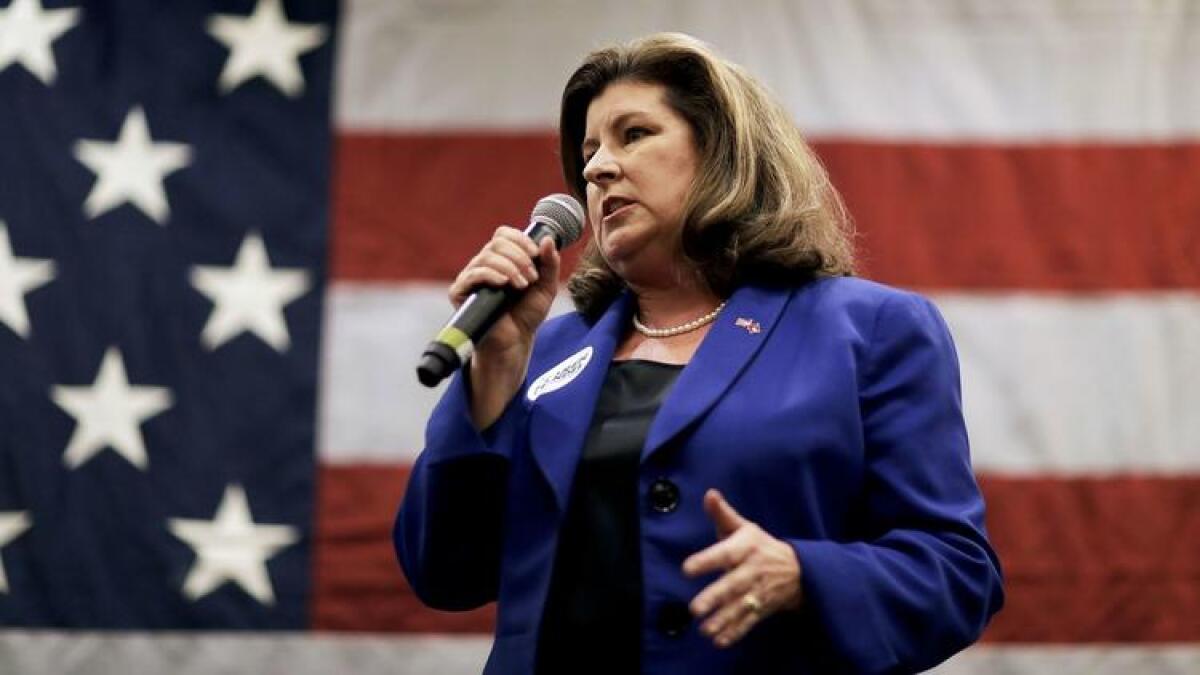
Republicans – especially President Trump – are rejoicing.
A day after the party won special elections in South Carolina and Georgia, Trump has a message for Democrats: Scoreboard.
(Fact check: Republicans won special elections for House seats in Georgia, South Carolina, Montana and Kansas this year. A fifth special election in California featured two Democratic candidates.)
For Trump, who made social media pleas of support for Ralph Norman and Karen Handel – both are Republicans who won in South Carolina and Georgia, respectively, on Tuesday – the special election season has seemingly been a success.
And as Trump boasts of the party’s victories, so too are some in conservative media.
Here are Wednesday’s headlines:
Resist fizzle: Democrats lose again, now 0-4 in special congressional elections this year (Townhall)
In the wake of last year’s presidential election, liberals have organized relentlessly, insisting the need to push back against Trump’s agenda.
So far, however, Democrats seems to be coming up short.
The article has five bulleted pieces of post-mortem analysis on the special election season.
No. 4 offers a moderate take of sorts:
“November 2018 is almost a year-and-a-half away, and none of these special elections will matter at all by then. That said, Democratic demoralization may have some important ramifications in terms of fundraising (although as we’ve learned yet again, try as they might, Democrats can’t necessarily just buy themselves electoral victories) as well as candidate recruitment,” writes the conservative website. “Republicans also saw that in red districts, ‘Trumpcare’ may not be the silver bullet that liberals seem to think it is based on some polling.”
Isolated from Washington establishment, Trump struggles for presidential victories (Washington Times)
As Republicans rake up special election victories, Trump has struggled to see wins with his agenda.
His travel ban has stalled in federal courts and his efforts to repeal the Affordable Care Act have hit several bumps as a bill slowly makes its way through Congress. All of this as the issue of Russian meddling in last year’s election and possible collusion between Trump aides and Russians continues to hover over the administration.
In this article, S.A. Miller, writes that Trump has grown increasingly isolated and has lacked support – and defense – from fellow Republicans:
“From his first day in the Oval Office, Mr. Trump received only tentative support from the Republican Party in Washington. He also came under unrelenting attacks from Democrats and the news media over suspicions of colluding with Moscow to rig the presidential election in his favor,” Miller writes. “The congressional probes and a Justice Department special counsel investigation that followed, as well as daily charges from Democrats that Mr. Trump and his campaign were involved in treasonous acts that rendered his presidency illegitimate, met scant pushback from Republican leaders in Congress.”
Robert Mueller, the swamp, and the lawyers tasked to run a silent coup (American Spectator)
Trump’s allies have said he’s the subject of a “witch hunt” when it comes to special counsel Robert Mueller’s investigation of Russian collusion in last year’s election.
And some have even called on the president to fire Mueller. (For now, the administration says that’s not going to happen.)
Jeffrey Lord, a prominent Trump supporter who regularly appears on CNN and talks of a “deep state” undermining the president, writes that Mueller’s investigation is fiction.
“It’s one thing to build political myths to soothe a losing candidate and her supporters. It’s quite another to successfully get a ‘special prosecutor’ to investigate a crime that never happened,” he writes of Democrats. “Let’s cut to the chase. This isn’t an investigation. It’s the Washington Swamp going on offense.”
U.S. still hopes to salvage OAS resolution on Venezuela
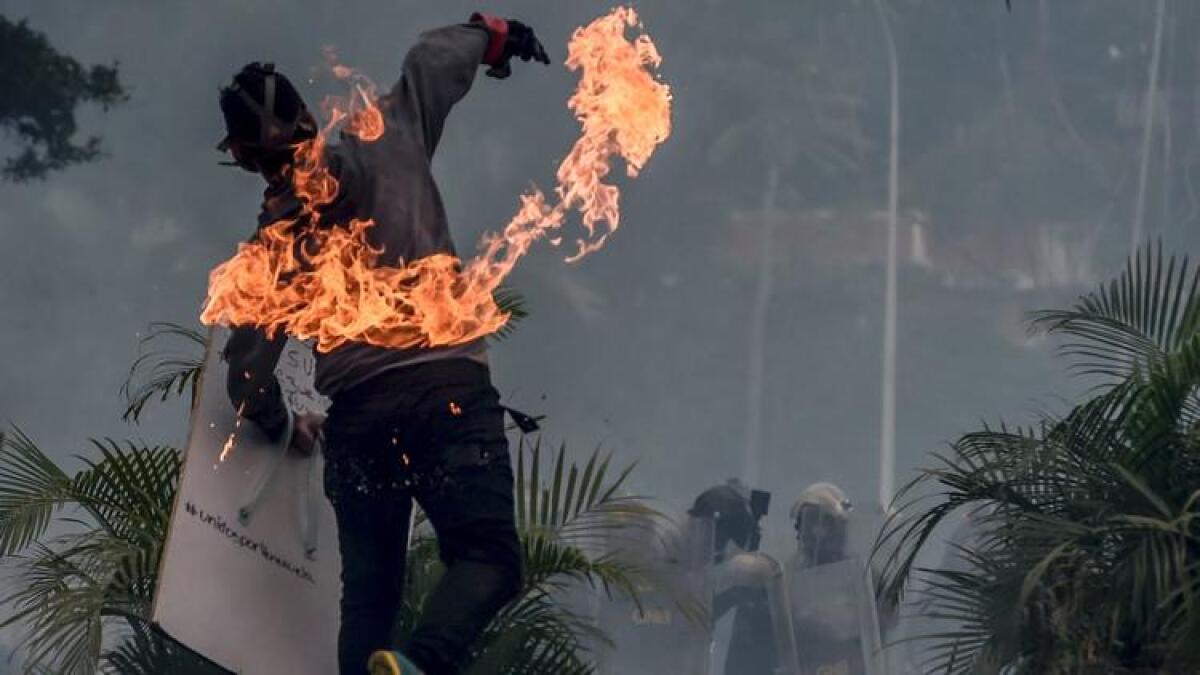
U.S. officials are holding out hope that the 34-nation Organization of American States, the hemisphere’s foremost regional organization, could still agree on a resolution on the crisis in Venezuela.
U.S. and Mexican diplomats were lobbying behind the scenes to secure more votes Wednesday as the OAS general assembly met in the Mexican resort city of Cancun.
A watered-down resolution that would create a “balanced” panel of member states to advise Venezuela failed to win the required two-thirds approval on Monday,
“This is an ongoing process,” U.S. Deputy Secretary of State John Sullivan told reporters after attending Tuesday’s session.
“We got 20 votes,” Sullivan said, describing it as the highest number yet to join on the issue. “We hope to get more.”
Some countries, especially those with leftist governments like Venezuela’s, are reluctant to criticize another OAS member state, which they see as outside intervention.
This is especially the case because many in Latin America regard the Washington-based OAS as an arm of the U.S. government.
Regardless of whether a resolution ultimately passes, Venezuela has said it will not recognize any OAS action. It has threatened to leave the regional body, which is a two-year process.
The U.S. and other governments have urged Venezuela’s government, led by President Nicolas Maduro, to release political prisoners, respect elections and forego a plan to rewrite the constitution, which Maduro could use to hold onto power.
More than 70 people have been killed in Caracas, Venezuela’s capital, and other parts of the country in large antigovernment demonstrations.
Venezuelan Foreign Minister Delcy Rodriguez labeled the protestors as a violent, small group influenced by the “lapdogs of imperialism.”
Rep. Steve Scalise’s condition upgraded to fair one week after shooting
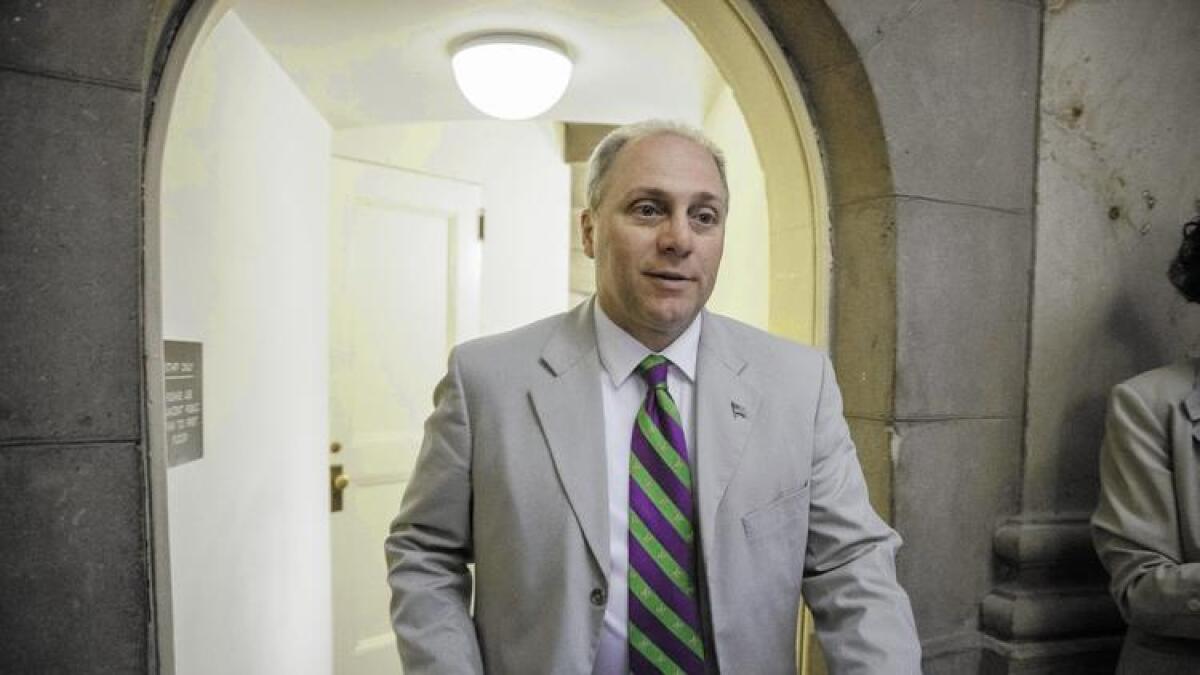
The Republican congressman shot last week at a baseball practice is making good progress and has been upgraded to fair condition.
MedStar Washington Hospital Center issued a statement on Wednesday saying Rep. Steve Scalise, 51, of Louisiana is “beginning an extended period of healing and rehabilitation.”
Scalise has undergone several surgeries since he was shot last week. Scalise and other congressional Republicans were practicing for their annual charity baseball game against Democrats when a gunman started shooting. U.S. Capitol Police and other officers returned fire and killed the gunman.
Scalise, the majority whip, was struck in the hip and the bullet shattered blood vessels, bones and internal organs. Doctors said he had arrived at the hospital June 14 at imminent risk of death.
Russians targeted election systems in 21 states, but didn’t change any results, officials say
Hackers backed by the Russian government targeted voting systems in 21 states last year in an effort to undermine confidence in the principle of free and fair elections, U.S. security officials testified on Wednesday.
While the Russian interference in the 2016 campaign has been known for months, it was the first time U.S. officials have said how many states’ electoral systems were targeted.
Testifying before the Senate Intelligence Committee, the officials said none of the digital intrusions affected the parts of electoral systems that counted votes -- but that they expect Russia to keep trying.
“I hope the American people will keep in mind Russia’s overall aim is to restore its power and prestige by eroding democratic values,” said Bill Priestap, assistant director of the FBI’s counter-intelligence division.
Priestap said the hackers successfully copied data from some states “to understand what it consisted of” and to plan future attacks.
He declined to describe the data that was stolen, saying the Russian interference remains the focus of several FBI investigations.
U.S. officials first found hacking aimed at state systems last August, he said. By late September the efforts were detected in 21 states.
Priestap would not name the states or say which systems lost data, saying the FBI wants to preserve confidential relationships with state and local election officials.
The top Democrat on the committee criticized the FBI for withholding that information.
“I do not believe our country is made safer by holding this information back from the American public,” said Sen. Mark Warner of Virginia, the ranking Democrat.
One state official also criticized the federal government for not sharing enough information about the hacking.
So far, no secretaries of state have been cleared to receive classified details of the Russian operation. said Connie Lawson, secretary of state in Indiana and president-elect of the National Assn. of Secretaries of State.
Jeannette Manfra, a cyber-security official at the Department of Homeland Security, said the decentralized nature of U.S. elections means that an attempt to penetrate state systems and change results would be “virtually impossible” to accomplish without being detected.
The House Intelligence Committee also held a hearing Wednesday to examine the Russian interference in the 2016 election. Jeh Johnson, who was U.S. secretary of Homeland Security during the November election, testified.
The Justice Department has appointed a special counsel. former FBI Director Robert S. Mueller III, also is investigating whether any of President Trump’s current or former associates colluded with the Russian effort.
During the presidential campaign, Trump said he hoped Russia would be able to uncover missing emails from Hillary Clinton.
Sen. Martin Heinrich (D-N.M.) asked Priestap if he thought Trump had become an “unwitting agent” of Russian interests.
Priestap remained silent. “I don’t blame you for not answering that question,” Heinrich said.
Trump has advice for Democrats after GOP’s special election victories
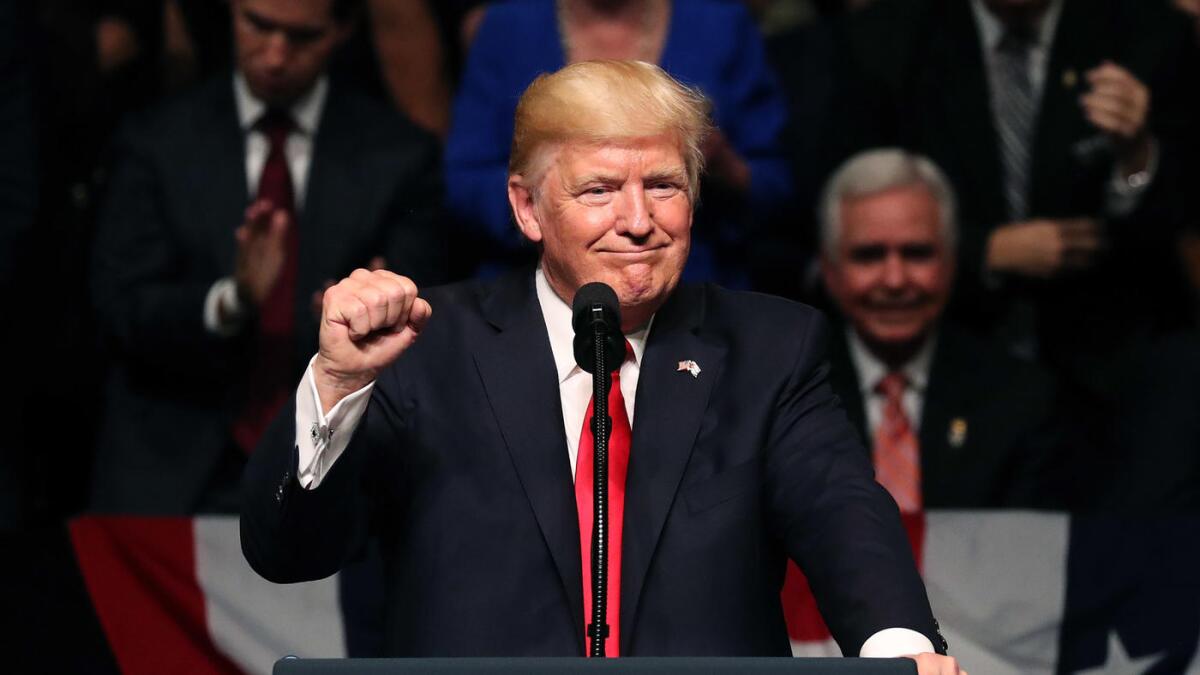
Tuesday night, President Trump celebrated two Republican victories in special House elections in conservative districts as a validation of his “Make America Great Again” agenda. On Wednesday, he was offering free advice to his Democratic rivals.
“Democrats would do much better as a party if they got together with Republicans on Healthcare, Tax Cuts, Security,” he wrote on Twitter. “Obstruction doesn’t work!”
Democrats were hardly likely to take his advice, given the widespread unpopularity of the Trump agenda. But the initial Wednesday morning quarterbacking among pundits and politicians -- especially about Republican Karen Handel’s victory in the most closely-watched of the two special elections, in suburban Atlanta, Georgia 6th congressional district -- was more about what Democrats did wrong than Republicans did right.
The race did not become a clear referendum on Trump’s first 150 days in office. Handel kept the president at arm’s length, not even mentioning him by name in her victory remarks, and Democrat Jon Ossoff focused more in the closing stretch on a grab bag of issues including healthcare and climate change. One of his closing ads focused on Handel’s role in cutting funding for Planned Parenthood during her time as an executive of the Susan G. Komen for the Cure charity for breast cancer.
Democrats on Wednesday played down the outcome in what have been heavily Republican districts. Yet they acknowledged their party needs to refine its message to attract voters uneasy with Trump and the Republican-controlled Congress, but lukewarm about the Democrats.
Sen. Christopher S. Murphy (D-Conn.), appearing on MSNBC’s “Morning Joe,” noted that in President Obama’s first year in office, Democrats were undefeated in congressional special elections — even some in Republican-leaning districts — only to lose control of the House the following year. If congressional Republicans go ahead with their plan to repeal Obamacare, “it may be the end of their special election run,” he predicted.
But Murphy also said that Democrats must do more to convince voters they have plans to boost the economy -- promoting “economic fairness” rather than broader growth is missing the mark. And Democrats can’t simply depend on voters defecting from the GOP over the array of legal and political woes involving Trump and his circle.
“The fact that we’ve spent so much time focusing on Russia has been a distraction from what should be the clear contrast between Democrats and the Trump agenda, which is on economics,” he said.
David Wasserman, who analyzes House races for the nonpartisan Cook Political Report, wrote Wednesday that the results Tuesday in Georgia and another special election in South Carolina “were far from a disaster for Democrats, and Republicans shouldn’t be tempted to believe their House majority is safe.”
He credited national Republicans with helping to neutralize Ossoff’s spending advantage but noted that fired-up Democrats have been winning larger-than-typical shares of the vote across the country, reflecting a potential enthusiasm gap among conservative voters “big enough to gravely imperil the Republican majority next November.”
The White House had avoided commenting specifically on the much-watched Georgia race this week, saying only that Trump naturally wanted to maintain his party’s majorities in the House and Senate.
But Trump is likely to keep touting the victories. He travels to Iowa on Wednesday afternoon for an event focused on agriculture technology before holding a rally with supporters.
Republican Karen Handel wins Georgia special election in the costliest House race in history
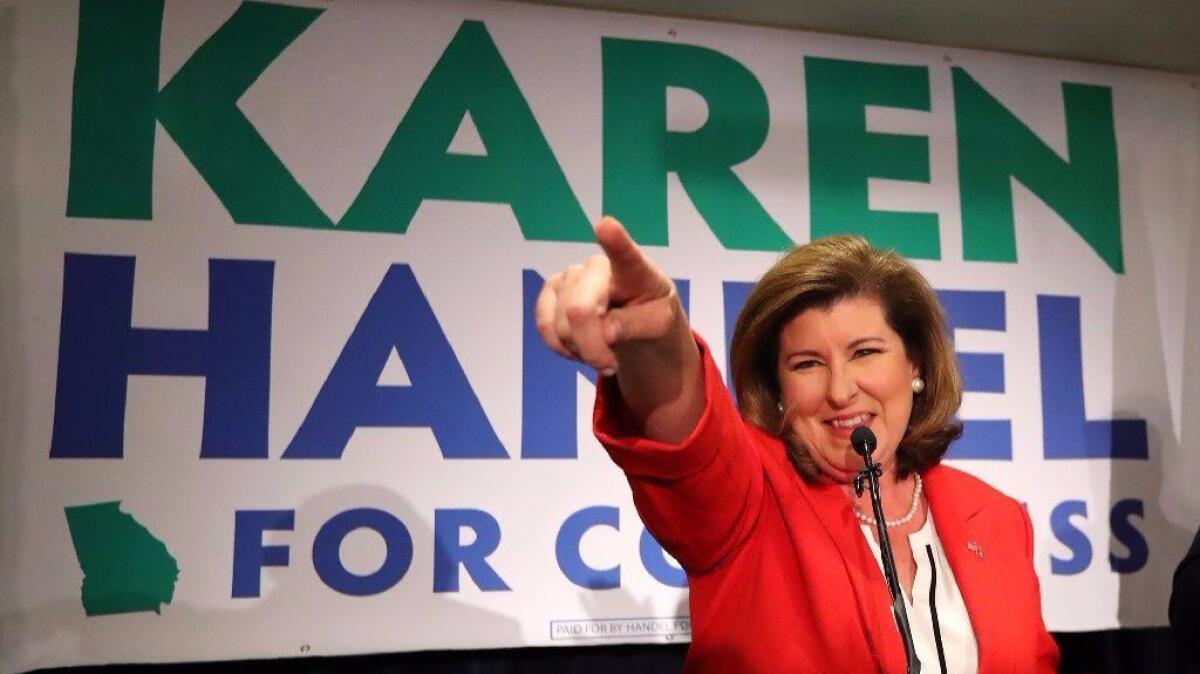
Democrats came up short Tuesday night in their costly bid to wrest control of a longtime GOP congressional seat in the suburbs north of Atlanta, losing a race the party had hoped would showcase deep Republican vulnerability in the Trump era.
Republican Karen Handel, the former secretary of state of Georgia, defeated Democrat Jon Ossoff, 52% to 48%. The contest had turned into the costliest House race in history, as Democratic activists nationwide sent a surge of donations to political newcomer Ossoff in an attempt to turn blue a district Republicans have controlled since the Carter administration.
The seat was last held by Tom Price, who vacated it to become President Trump’s Health and Human Services secretary. While the close election result is sobering for the Republican Party in a conservative district it customarily wins by double digits, the victory helps the party avert – for now – potentially much more damaging fallout for the White House and Republicans in Congress.
“It’s a huge disappointment for Democrats, who really did put all their eggs in this one basket, feeling as though it was the kind of district – upscale, higher education, higher income voters that went only narrowly for Trump – that if there’s any movement nationally, it should show up,” said Stuart Rothenberg, a veteran nonpartisan elections analyst.
The mood is jittery in Georgia as Democrats await results in special congressional election

The mood was jubilant, if jittery, as hundreds of Democrats squeezed into a ballroom at a hotel on the outskirts of Atlanta for the Jon Ossoff election-night party.
Many wore blue “Ossoff for Congress” T-shirts and baseball caps. Some clutched homemade campaign signs saying, “Vote for Ossoff” and “We Know How to Fight.”
“The love we have for our candidate is really special,” Jill Vogin, a 55-year-old chief financial officer for a staffing company, said as she showed off her hand-knit, sleeveless sweater that spelled out, “Flip the 6th.”
“This is a man that will go beyond the House. We keep asking, how soon will he be president?”
Whatever the outcome of Tuesday’s election, the Ossoff volunteer said, her life has changed.
“But I’m cautious,” she added. “My heart broke in November.”
The vibe remained upbeat as early returns began to flash on two large television screens, showing Republican candidate Karen Handel taking a razor-thin lead. A trio of young women bopped and swirled their hands in the air as the DJ played an R&B hit, “24k Magic.”
As more returns came in, and Ossoff took a slight lead, a huddle of female volunteers pumped their fists and chanted “Flip the 6th” and “Pave it Blue.”
“It’s a victory no matter what happens,” Nancy Miller, a 59-year-old retired schoolteacher and Ossoff volunteer, said in between a sip of gin and tonic.
“This district has always been red, and I feel very good that we now have a real women’s grass-roots group. This will have an everlasting effect.”
Meanwhile, a Democratic union worker known as ‘IronStache’ on Twitter makes a bid for Paul Ryan’s Wisconsin seat
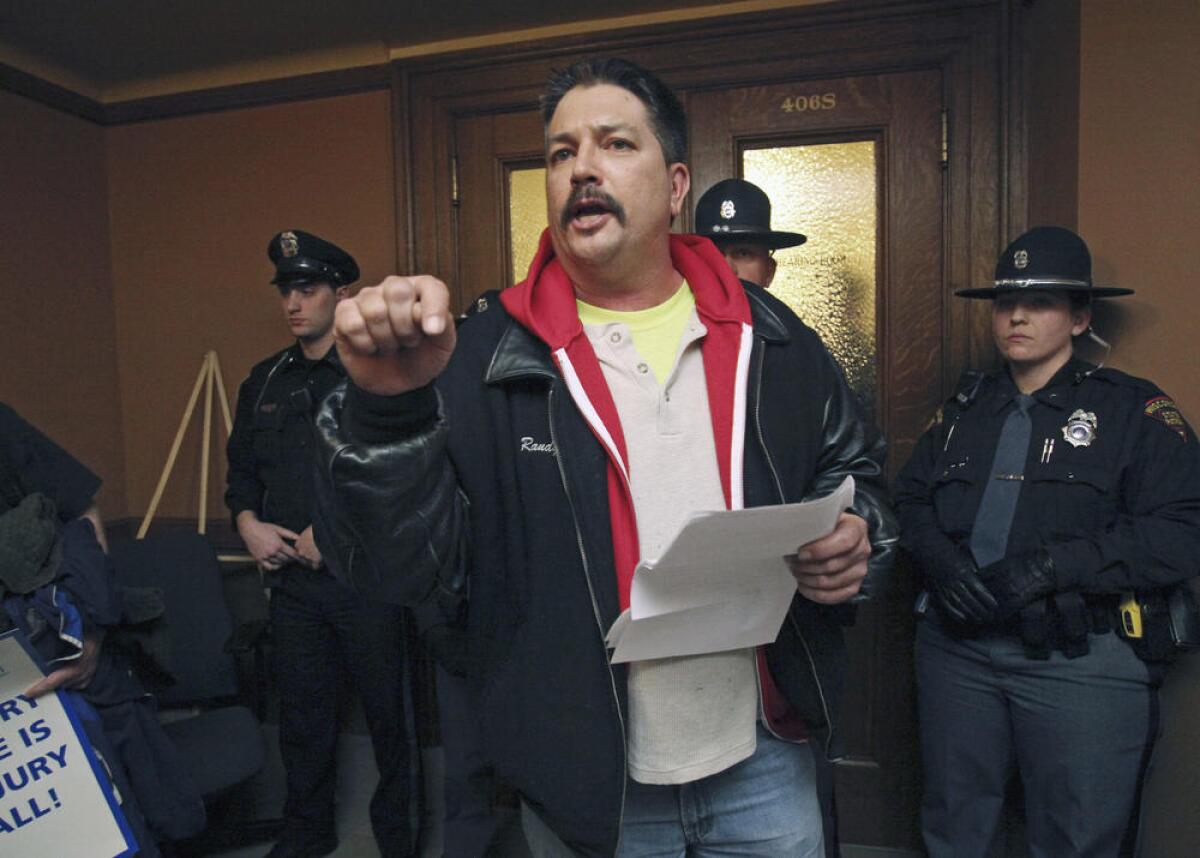
On a day when political attention was focused on a House race in suburban Atlanta, another bit of congressional election intrigue managed to turn heads in Washington.
A mustachioed ironworker, Randy Bryce, found a ready audience for an emotional bio-video introducing the Democrat as a blue-collar challenger to House Speaker Paul D. Ryan, a Wisconsin Republican, in 2018.
Some who viewed the politically powerful video, in which Bryce shares heart-tugging scenes with his ailing mother and young son, wondered whether the hard-hat-wearing candidate was for real. Could this be a parody?
But the long-shot contender is very real. He is known as @IronStache among his 48,000 Twitter followers, and describes himself as a lifelong Wisconsin resident and activist. Bryce has previously run for state office.
“I decided to run for office because not everyone has a seat at the table, and it’s time to make a bigger table,” he says in the video.
“Let’s trade places,” he goes on. “Paul Ryan, you can come work the iron and I’ll go to D.C.”
Ryan has represented his southeastern Wisconsin district for 20 years and easily beat back both a primary and general election challenger in 2016. He is favored for reelection in 2018.
Senate Republicans promise to unveil Obamacare overhaul Thursday, with votes expected next week
After months of secret negotiations, Senate Republicans are set to unveil their Obamacare overhaul Thursday, in hopes of voting next week before a holiday recess, leaders announced Tuesday.
Senate Majority Leader Mitch McConnell dismissed complaints that Republicans were working behind closed doors as “laughable,” and insisted “everyone will have adequate time” to review what he called Thursday’s “discussion draft” before the vote.
Republicans could not estimate how many fewer Americans would have healthcare -- the House GOP’s bill left 23 million more uninsured -- but they promised a better system than the Affordable Care Act, also known as Obamacare.
“You’ll be able to take a look at it,” McConnell told reporters Tuesday.
“I wouldn’t want to compare it to the House bill,” McConnell said. “It’ll be different.”
The Republican leader can spare only two GOP votes from his slim 52-seat majority for passage, presuming Vice President Mike Pence would cast the tie-breaking vote. Pence and Health and Human Services Secretary Tom Price both attended the Republican senators’ lunch Tuesday in a show of support.
Many GOP senators, however, remain skeptical of the party’s approach. Conservatives complain the emerging bill does not go far enough to gut Obamacare, while centrist-state senators worry that it too quickly yanks residents off Medicaid.
McConnell did not indicate he had the majority votes yet for passage.
“We’re going to make every effort to pass a bill that dramatically changes the current healthcare law,” he told reporters.
The White House could not yet say if President Trump had seen the Senate bill. Trump reportedly dismissed the House-passed effort -- which he celebrated last month in a Rose Garden ceremony -- as “mean.”
“The president clearly wants a bill that has heart in it,” White House Press Secretary Sean Spicer told reporters.
The No. 3 Republican, Sen. John Thune (R-S.D.), told reporters that the Senate effort would probably postpone until 2023 its phase-out of Obamacare’s Medicaid expansion, which gave health coverage to 15 million more Americans.
Even if the Senate is able to muster the votes to approve a bill next week, the legislation would still need to be reconciled with the House-passed version -- pushing final passage to later in the summer.
Ryan launches push to pass sweeping tax overhaul this year, but Republicans are running out of time
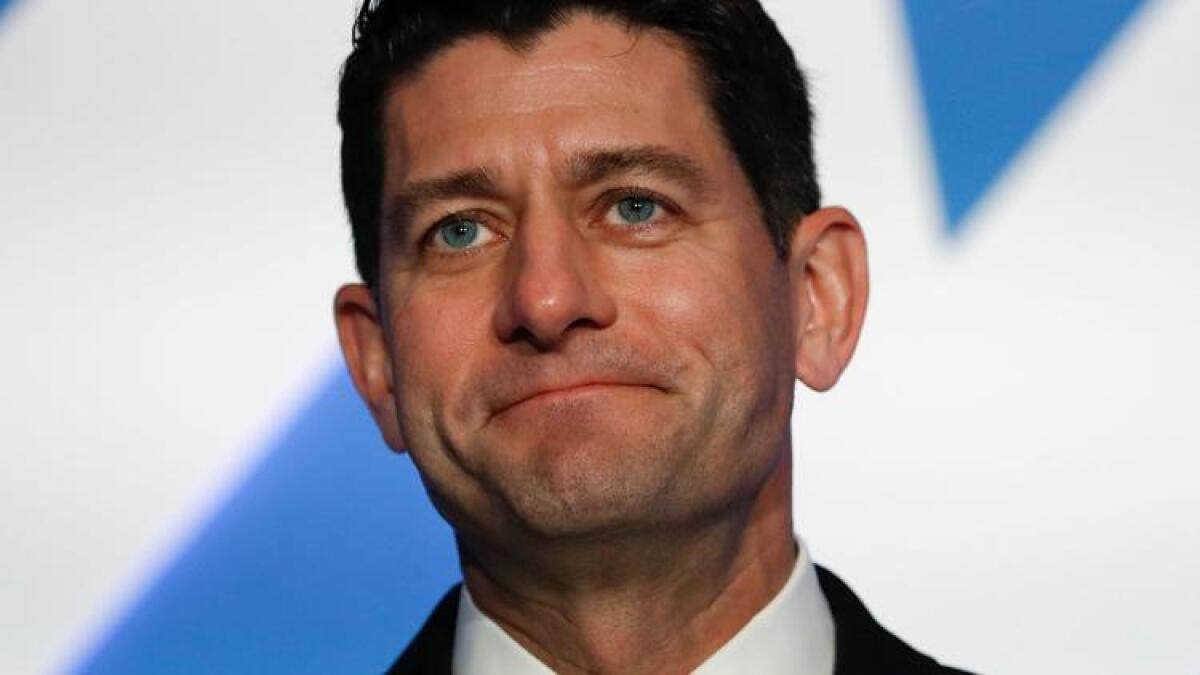
House Speaker Paul D. Ryan (R-Wis.) launched a major push Tuesday to overhaul the tax code this year — including massive cuts — but Republicans in Congress and the White House are running out of time as they continue to battle over the details.
With the legislative days remaining in the year dwindling, Ryan tried to jump-start the process with a major speech about what his staff described as the “crown jewel” of the Republican economic agenda.
“Once in a generation or so, there is an opportunity to do something absolutely transformational, something that will have a truly lasting impact long after you and I are gone,” he told the National Assn. of Manufacturers. “That moment is here and we are going to meet it. Ladies and gentleman, we are going to fix this nation’s tax code once and for all.”
“We are going to get this done in 2017,” he said. “We cannot let this once-in-a-generation moment slip by.”
Georgia voters hew to partisan lines, but say House election isn’t about Trump

Maureen Evans, a 52-year-old IT database administrator, speaks outside a polling station about her vote for Republican Karen Handel in Georgia’s closely-watched sixth district race.
Karyn Dolan was still mulling her decision in Georgia’s razor-tight House district race as she exited her local polling station Tuesday morning in scrubs after her night shift at a nearby hospital.
“It’s not an easy decision,” the 60-year-old registered nurse sighed after voting for Democrat Jon Ossoff at Life Center Ministries in the northern suburbs of Atlanta. “I’m still debating in my head.”
Dolan voted for Trump in the 2016 Presidential election. While she said she had not seen any concrete positives come out of Trump’s leadership, she was also not particularly enthused by Ossoff, a 30-year-old documentary filmmaker and former Congressional staff member. She worried that he did not live in the district and might be out of touch with residents.
“To be honest, I wanted to abstain,” she shrugged of the closely-contested Congressional runoff election between Ossoff and Republican Karen Handel. “My family is very torn… I think I let my liberal daughter sway me.”
Democrats have pitched the race in this traditionally staunchly conservative, affluent district of Atlanta’s suburbs as an early referendum on Trump’s presidency and a possible harbinger of the party’s fate in the 2018 midterms. A Democrat has not won a House seat since the Carter administration, yet recent polls have shown Ossoff and Handel almost deadlocked, less than two percentage points apart.
I’m not sending a message to Trump. I hate Trump, but I’m interested in what happens where I live.
— Molly Schlader, a 49-year-old stay-at-home mom
As residents of this leafy, affluent suburb of Atlanta turned out on a gray, drizzly morning to vote, many skewed to straightforward, partisan lines.
A steady stream of Republican voters who exited the polling station said they voted for Handel, a former Georgia secretary of state who bills herself as a “common sense conservative.”
“I have no idea who this Ossoff guy is,” said Maureen Evans, 52, an IT database administrator and Republican who voted for Trump. “He ran a slick campaign, but I think he’s wet behind the ears and I just don’t think I trust him. He’s getting a lot of money from out of state.”
Scanning the parking lot outside the parking lot, Evans said she was encouraged to see so many older voters. “I haven’t seen anyone under 30,” she beamed. “I’m hoping that gray-haired Republicans pull it off.”
Democratic voters, in turn, said they hoped to finally flip the district.
“If we win, it will send a wakeup call to Trump that he cannot do whatever he wants,” said Matthew Goodman, a 22-year-old chemistry graduate. “I would feel my voice is heard.”
However, many voters rejected the idea that the Sixth district campaign was an early referendum on Trump.
“I’m not sending a message to Trump,” said Molly Schlader, a 49-year-old stay-at-home mom who voted for Handel. She supported Gary Johnson in the 2016 Presidential election. “I hate Trump, but I’m interested in what happens where I live. I picked the lesser of two evils. Handel actually lives here and isn’t bankrolled by people in California.”
Trump calls Warmbier’s treatment a ‘total disgrace,’ suggesting Obama is to blame
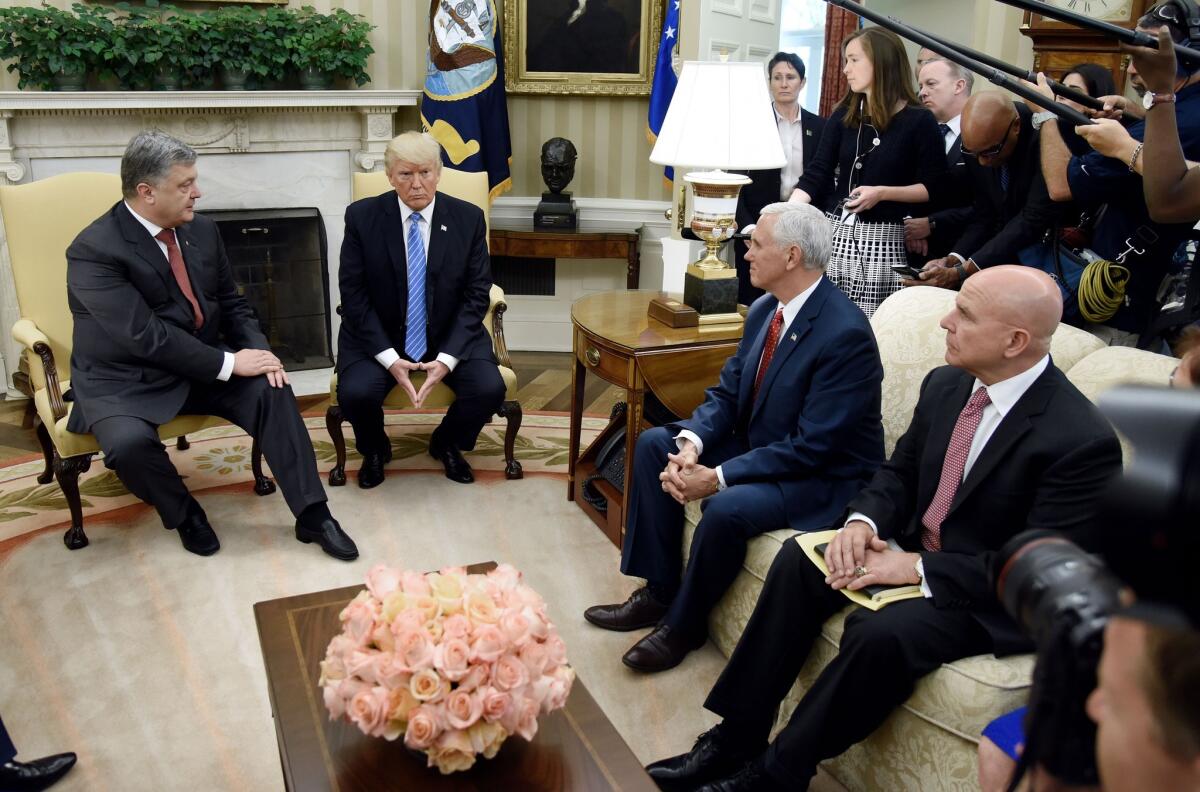
President Trump on Tuesday implicitly blamed his predecessor, former President Obama, for the death of American college student Otto Warmbier, calling it “a total disgrace” that the young man did not get to return home from captivity in North Korea until last week.
“Frankly, if he were brought home sooner, I think the results would have been a lot different,” Trump told reporters in the Oval Office as he met with Ukraine President Petro Poroshenko. “He should have been brought home a long time ago.”
Warmbier died Monday at an Ohio hospital five days after he was evacuated in a coma from North Korea, where he had been held for 17 months. Doctors said he had extensive loss of brain tissue — a result, his family said in a statement, of the “awful torturous mistreatment” he received while imprisoned.
Trump did not name Obama, but his comments suggesting the Obama administration should have been able to secure Warmbier’s return sooner echoed comments from Warmbier’s father, Fred, at a news conference last week.
Warmbier said his family was advised by the Obama administration “to take a low profile” as they worked to bring him home from North Korea. After Trump took office, Warmbier said, he and his wife “decided the time for ‘strategic patience’ was over” — using a term that had been used to describe the U.S. policy toward the rogue, nuclear-armed government in Pyongyang.
Warmbier said it was his understanding that, at Trump’s direction, State Department officials “aggressively pursued” a resolution.
A spokesman for Obama said that during his administration, “we had no higher priority than securing the release of Americans detained overseas.”
“North Korea’s isolation posed unique challenges, but we worked through every avenue available to us — including through the Swedish, our protecting power, as well as through our representatives in New York — to secure the release of Mr. Warmbier,” said Ned Price, a former National Security Council spokesman.
“These tireless efforts resulted in the release of at least 10 Americans from North Korean custody during the course of the Obama administration. It’s painful that Mr. Warmbier was not among them, but our efforts on his behalf never ceased, even in the waning days of the administration,” Price added.
David Axelrod, a longtime Obama advisor, tweeted that Trump’s “not-so-veiled attack ... truly IS sad!”
Trump also told reporters: “It’s a total disgrace what happened to Otto. It should never, ever be allowed to happen.” But he did not suggest what response, if any, the United States would take. Other Americans remain hostage in North Korea.
UPDATE: In a Twitter message, Trump said the U.S. “again condemns the brutality of the North Korean regime as we mourn its latest victim.” But the tweet links to an Instagram video of his Oval Office remarks seeming to criticize the Obama administration for Warmbier’s ultimate fate.
Why California is so interested in today’s nail-biter House race in Georgia
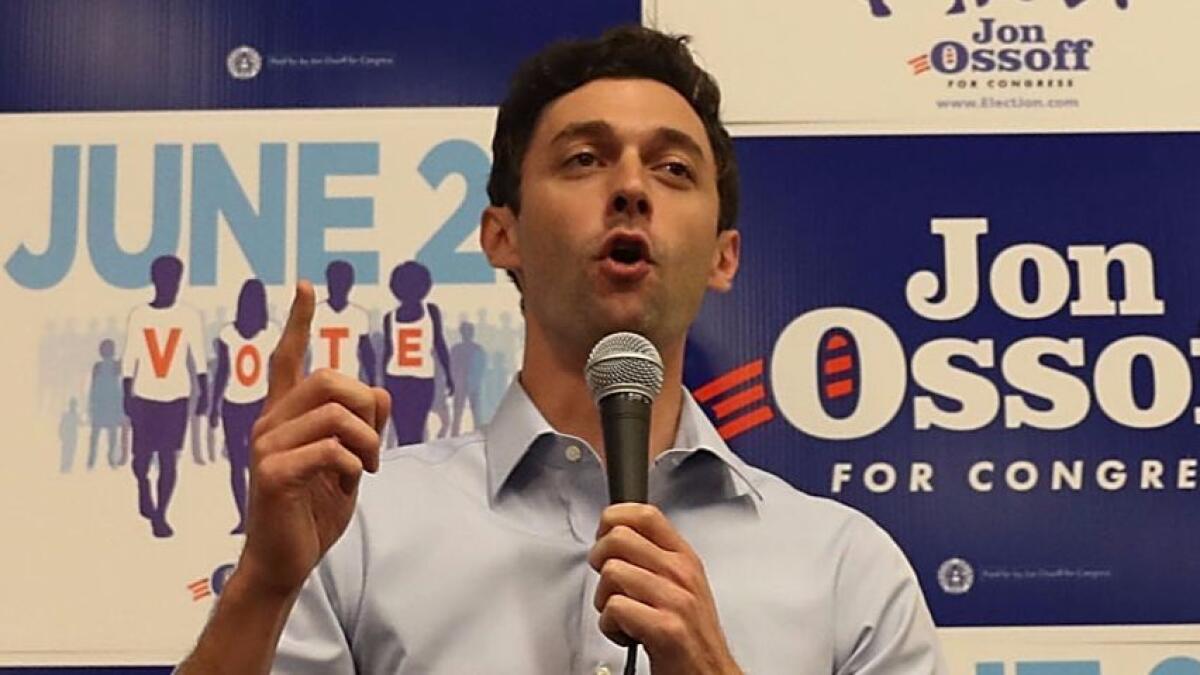
Voting Tuesday in the bitterly fought Georgia election to fill a House seat vacated by Tom Price, President Trump’s secretary of Health and Human Services, is taking place more than 2,000 miles from California.
Yet Californians are deeply invested in the race, which has become a referendum on the Trump administration and could chart the path for Democrats nationwide to rebuild their power base in one-time GOP strongholds such as Orange County.
More donors to the campaigns of Democrat Jon Ossoff and Republican Karen Handel are from California than any other state, including Georgia. San Francisco has played front and center in campaign attacks. Liberal Hollywood celebs have lent their star power.
And the outcome of the House race — the most expensive in history — may foreshadow even bigger battlegrounds in California.
A Republican data firm probably exposed your personal information — and you can’t do much about it
To any nefarious hackers looking for information that could be used to sway elections or steal Americans’ identities, the file compiled by a GOP data firm called Deep Root Analytics offered all manner of possibilities.
There in one place was detailed personal information about almost every voter in the U.S.. It was a collection of some 9.5 billion data points that helped the firm assess not only how those Americans would probably vote, but their projected political preferences. In some cases, the data collectors had scoured people’s histories on Reddit, the social media platform, to match vote history with social media use, and well-informed predictions were made about where each voter would stand on issues as personal as abortion and stem cell research.
It’s the kind of sensitive information that, if a bank or a big-box retailer or almost any other corporation had failed to protect it, would have triggered major trouble with regulators. But there it sat on the Internet, without so much as a password to guard it, for 12 days.
In gerrymander case, Supreme Court takes on long history of brazen political self-dealing
Gerrymandering, the practice of drawing self-serving political boundaries, is as old as the country itself. Its impetus, one could argue, is even older and deeper-seated, grounded in the fundamentals of human nature.
In the zero-sum game of campaigns and elections, where you either win or lose, gerrymandering is a way to stack the deck and improve the odds by sorting people into districts based on how they are expected to vote — in what, up to now, has been perfectly legal fashion.
By agreeing to hear a landmark case challenging the drawing of strongly partisan boundaries in Wisconsin, the U.S. Supreme Court indicated Monday that it will consider whether, finally, enough is enough.
If the court, which takes up the case in the fall, rules that partisan gerrymandering is unconstitutional — a very big if, experts say — it could drastically change the country’s politics by injecting much greater competition into races for Congress and for statehouses nationwide.
Secretary of Veterans Affairs David Shulkin plans integration for VA, private health sector services
Secretary of Veterans Affairs David Shulkin said Tuesday he plans to evaluate ways the VA can integrate services with private health sectors based on geographic region.
Shulkin, who served as the VA’s undersecretary during the Obama administration, said he does not support privatization of the department but wants to “build an integrated system” that minimizes overlap of services. The VA department should focus efforts and funds on areas of healthcare that the private health sector does not offer, he said, and these needs will look different for each geographic region.
“Every one of our regions will make an assessment of what they need to buy or build,” Shulkin said. “In some cases, we need to buy more community care. In others, to invest.”
Overall, Shulkin said he wants to focus efforts on building “world class services” that don’t already exist in the private sector and improving care that only other veterans can provide, such as treatment for post-traumatic stress disorder or other behavioral health services.
Areas where the private sector already offers services, such as maternity care, would be places for partnership rather than competition.
The issue of “finding a mix,” he said, is not political.
Although Shulkin said he supports President Trump’s budget, he is working with Congress to reallocate funds within the budget. Currently, the money is in “silos” based on decisions made months ago, he said. More flexibility and a “singular pot” of funds is part of the updated Choice program, which Shulkin is expected to announce in the fall.
Shulkin also said he is relying on the private health sector to recruit new employees as a solution to vacancy and retention issues.
The House on June 13 passed the Accountability and Whistleblower Protection Act to give the secretary more power to discipline and remove employees found of misconduct, which Shulkin anticipates will also help fill vacancies. Trump is expected to sign the accountability bill into law this week.
Currently, there are 15,000 pending cases of employee misconduct. Of these, 300 involve the theft of drugs. These pending cases will not be affected by the accountability bill since the misconduct occurred before the bill had passed.
Although the bill passed with bipartisan support, critics of the act say it could disturb protections for civil servants and could lead to changes in other departments. Others worry it will leave VA employees more vulnerable. Shulkin said he doesn’t see the bill as a “tool for mass firings.” Instead, he is “seeking change.”
U.S. forces shoot down Iranian drone over Syria as fighting escalates
A U.S. fighter jet Tuesday shot down an armed Iranian drone supporting Syrian government forces in southern Syria, marking the third American air-to-air shoot-down this month.
The armed Shahed-129 drone was destroyed by a U.S. F-15 fighter jet around 12:30 a.m. local time. The drone was approaching a small military base at the Syrian town of Tanf that U.S., British and Norwegian special operations forces use as a staging ground to train and equip rebel groups fighting the Syrian government and Islamic State militants.
The coalition forces “were manning an established combat outpost to the northeast” of the base when the drone flew in, a Pentagon statement said.
The F-15 intercepted the drone and shot it down after the unmanned aircraft failed to divert its course, the statement added.
The incident follows Sunday’s downing of a Syrian SU-22, a Russian-made attack jet. The U.S. said it acted after the Syrian plane bombed fighters from the Syrian Democratic Forces, an alliance of Kurds and Syrian Arab groups that the U.S. has supported.
On June 8, a U.S. fighter jet shot down another Iranian-made drone that dropped a bomb near forces patrolling the base at Tanf. U.S. warplanes launched three other airstrikes against the forces there.
Despite the recent violence, U.S. officials stressed they have no plans to escalate fighting against the government of Syrian President Bashar Assad.
“The coalition presence in Syria addresses the imminent threat ISIS in Syria poses globally,” the U.S. military said in a statement, referring to the Islamic State group, which controls a swath of territory in eastern Syria.
“The coalition does not seek to fight Syrian regime, Russian, or pro-regime forces partnered with them, but will not hesitate to defend coalition or partner forces from any threat.”
Supreme Court rules rock band the Slants may trademark its name, striking down law banning offensive terms
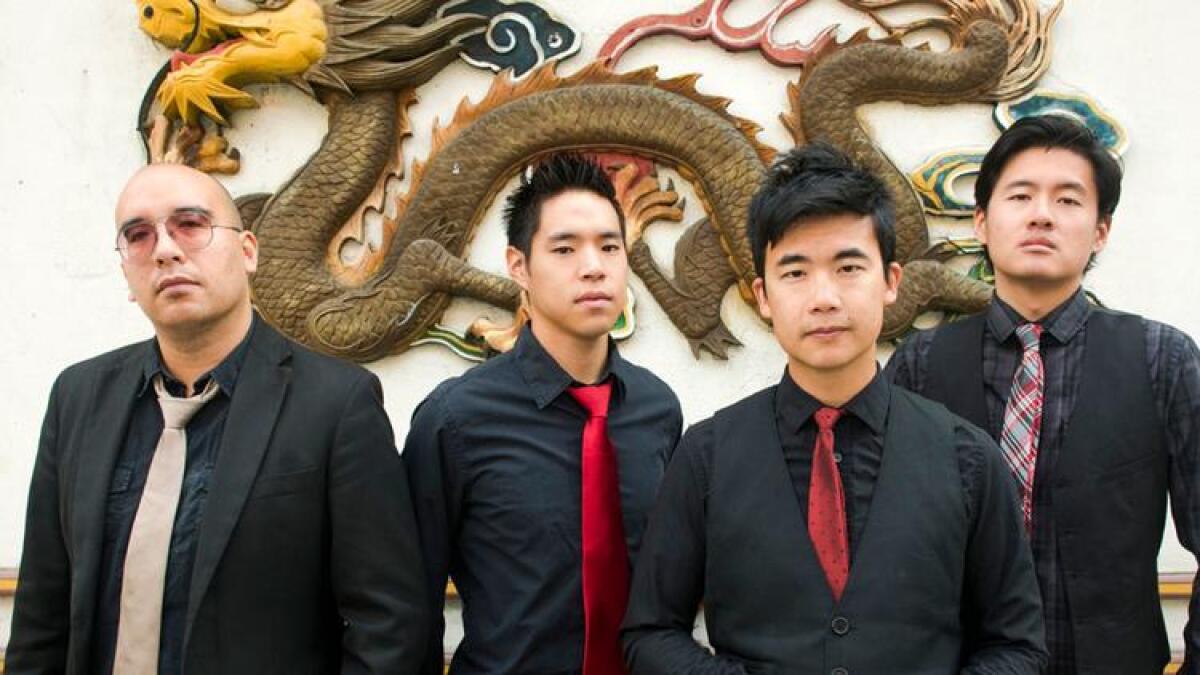
The Supreme Court extended trademark protection on Monday to words and names that may be offensive, ruling that the 1st Amendment right to free speech allows an Asian American band to call itself the Slants.
The unanimous decision will also likely preserve the trademarked and controversial name of the Redskins, Washington’s professional football team.
In recent years, such trademarked names have come under attack as racially offensive. Since 1946, the U.S. trademark law has included a provision that barred the government from registering trademarks that may disparage people or groups.
The case of the Slants raised questions about government’s efforts to police names that may be offensive to one group or another.
Simon Tam, the leader of the Portland, Ore.-based band, said he chose the name to make fun of a word that had been used as a slur against Asians, and thereby to “drain” it of any derogatory impact, as the court put it.
Partisan gerrymandering is almost as old as America, but will the Supreme Court decide it has gone too far?
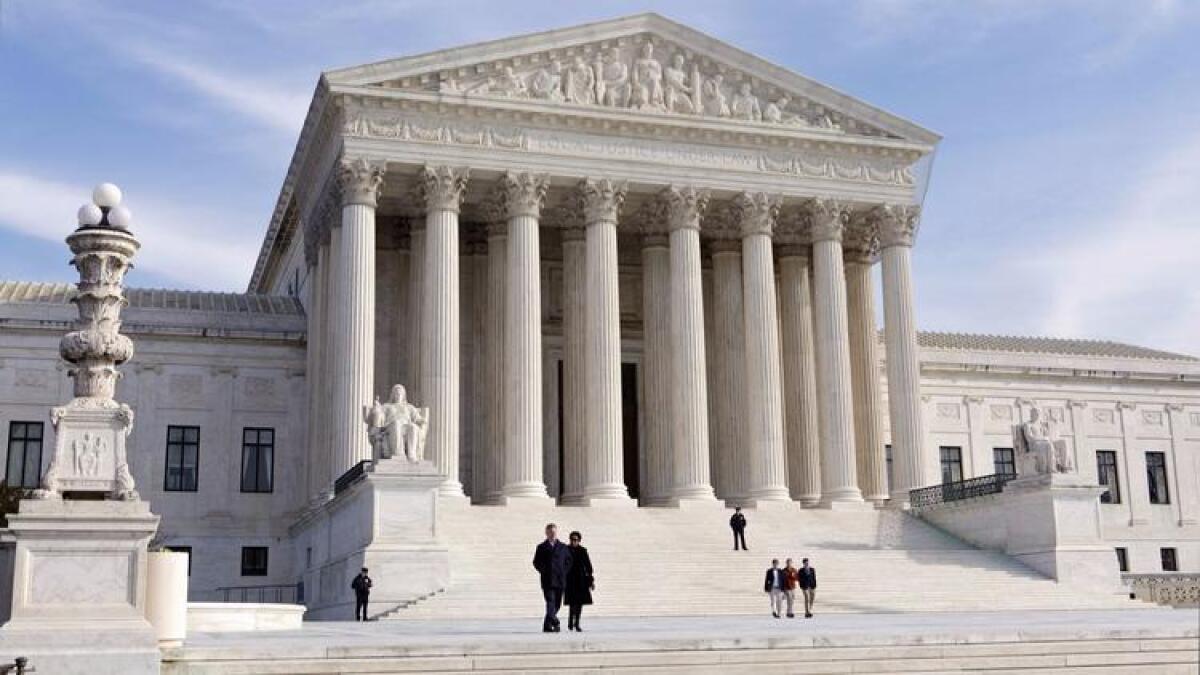
The Supreme Court agreed Monday to decide whether partisan gerrymandering – in which voting districts are drawn to favor one party – is a time-honored American political tradition or has evolved into an unconstitutional rigging of elections.
The Wisconsin case of Gill vs. Whitford, to be heard in the fall, could yield one of the most important rulings on political power in decades.
Gerrymandering has been derided for generations, often mocked in cartoons depicting bizarre-shaped districts that look like salamanders or spiders.
But in recent decades, thanks to software programs, gerrymandered maps looks less obvious and are more effective in giving one party an insurmountable advantage. The maps can all but ensure that the party in power at the beginning of the decade — when districts are drawn — will maintain control of the state legislature and win most of the state’s seats in the U.S. House of Representatives.
Democrats gum up Senate business to protest GOP healthcare bill secrecy
Ready for a long night in the Senate?
Senators settled in Monday as Democrats plan to slow-walk all action until Republicans relent on their secret healthcare negotiations and debate their Obamacare replacement in public.
Democrats plan to object to even the most routine procedural requests and use the floor time instead to berate Republicans for drafting the healthcare bill behind closed doors.
The tactic will not necessarily stall the Senate. The week’s schedule is not especially busy. But it will highlight the secrecy around the healthcare debate as Republicans rush to finish the bill before their Fourth of July recess.
Senate Majority Leader Mitch McConnell opened the Senate with no mention of when the GOP would unveil their bill or bring it to a vote. But many expect the strategic GOP leader will push it swiftly to the floor, nudging reluctant Republicans to vote.
But Senate Minority Leader Charles E. Schumer (D-N.Y.) chided Republicans for hiding the legislation that will likely result in millions of Americans losing their healthcare coverage.
“They’re ashamed of it, plain and simple,” Schumer said.
“No wonder they don’t want to show anyone the bill.”
Democrats say that they spent many hours in open-session public committee hearings in 2009 drafting the legislation that would become the Affordable Care Act, also known as Obamacare. Lawmakers at the time were pressured by constituents to “Read the bill!” before they voted.
The Senate’s GOP plan to overhaul the Affordable Care Act is expected to phase out Obamacare’s expansion of Medicaid and reduce federal subsidies for buying insurance on the private market.
Weeks in the making during private lunch time meetings, the Senate bill is likely to reflect the House GOP’s effort and loosen Obamacare’s provisions to protect coverage for pre-existing conditions.
Analysts said 23 million more Americans would be without healthcare under the House bill.
Senate Democrats plan to talk -- and talk -- to criticize GOP healthcare plans
Senate Democrats are complaining they haven’t been briefed on GOP plans to repeal the Affordable Care Act and replace it with the American Health Care Act.
The House passed the overhaul measure earlier this year but the Senate has not yet taken the bill to the floor or through the legislative process.
For the next several hours, Democrats plan to object to all of the Senate’s unanimous consent requests — in other words, stall business so they can talk about healthcare.
“Democrats have still not seen the bill,” Senate Minority Leader Chuck Schumer (D-N.Y.) said from the floor. Schumer said the plan is being written behind closed doors because Republicans “are ashamed of it, plain and simple.”
Senators will offer speech after speech into the evening, the Democratic leader said.
“If Republicans are not going to allow debate on their bill on the floor or in committee,” Democrats will, Schumer said.
After 150 days, Jared Kushner speaks
Jared Kushner has an expansive portfolio in the White House, he’s a subject of a special counsel’s probe of Russia’s ties to the Trump campaign and, as President Trump’s son-in-law besides, he’s often seen at the president’s side.
But until Monday, he had never been heard by much of the public.
So Kushner’s otherwise unremarkable voice proved to be among the more interesting things at the kick-off event of what the White House is calling “Tech Week.” On the administration’s 150th day, the 36-year-old adviser spoke before reporters and television cameras to discuss one of the initiatives he’s leading: a review of how private-sector solutions could be adapted to modernize government’s technological infrastructure.
His Office of American Innovation was leading a day-long forum at the White House that brought together administration officials and the CEOs of Amazon, Oracle, Apple, Intel and Microsoft, among many others.
“We are here to improve the day-to-day lives of the average citizen. That’s a core promise and we are keeping it,” he said.
“Together we will unleash the creativity of the private sector to provide citizen services in a way that has never happened before,” Kushner added, in words suggestive of Trump’s own for their ambition and hyperbole. “We will foster a new set of start-ups focused on gov-tech and be a global leader in the field making government more transparent and responsive to citizens’ needs.”
Kushner said that federal agencies maintain 6,100 data centers that could be consolidated. Some are more than a half-century old, he said, and some Pentagon systems still use floppy disks.
An effort underway to modernize electronic health records at the Veterans Administration was the first of many “very big” announcements to come, he said.
All told, Kushner spoke for just under seven minutes. Later this week he heads overseas to attend to another of his responsibilities -- making peace in the Middle East.
Trump and the Goldwater Rule: When is it OK to voice a professional opinion about the mental health of the president?
Since Donald Trump became president, commentary about his public statements, tweeting habits, predilections and even his personality have become something of a national pastime.
Some in the professional psychiatric community have been moved to join in, offering their own expert analysis on why the president says what he says and does what he does.
But should they? Not according to the American Psychiatric Assn., which years ago adopted a rule for its 37,000 licensed members against offering a public opinion about the mental health or general psychological makeup of a public figure.
It’s known as the Goldwater Rule, and in the era of President Trump, it’s suddenly the subject of vigorous discussion — most recently at an association meeting last month in San Diego.
So what exactly is the Goldwater Rule?
Consumer bureau director defends handling of Wells Fargo scandal in face of GOP criticism
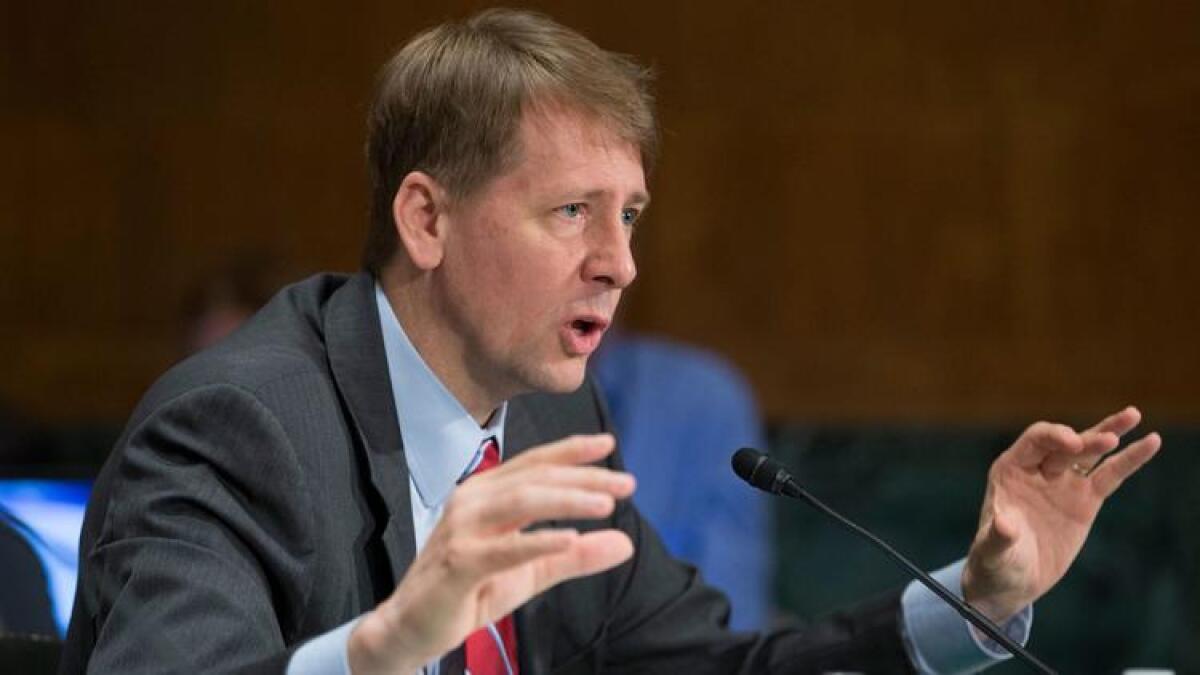
The federal government’s consumer financial watchdog is defending his handling of the Wells Fargo & Co. unauthorized accounts scandal in the face of Republican allegations that the agency failed to catch the problem and has stymied a congressional investigation into how it handled the case.
Richard Cordray, director of the Consumer Financial Protection Bureau, said he is “quite proud” of the team that looked into Wells Fargo’s sales abuses.
“Clearly our team, along with our partners, has performed a tremendous public service here,” Cordray wrote last week to Rep. Jeb Hensarling (R-Texas), chairman of the House Financial Services Committee.
The letter is the latest salvo in an acrimonious battle between Cordray, a Democrat who heads the powerful agency created in the aftermath of the 2008 financial crisis, and Hensarling, who has called for President Trump to fire Cordray and is pushing legislation gutting the bureau’s power.
Milwaukee County sheriff is not joining the Department of Homeland Security after all
The Department of Homeland Security says Milwaukee County Sheriff David Clarke is no longer a candidate for a position in the agency.
The conservative firebrand said last month he was taking a job as an assistant secretary at the DHS, but the agency declined to confirm the appointment, saying it announces such senior appointments once the DHS secretary makes them official.
Craig Peterson, a political advisor to Clarke, said in a statement that the sheriff notified DHS Secretary John Kelly late Friday that he “had rescinded his acceptance of the agency’s offer” to join the department. The Washington Post first reported on Clarke’s decision.
The tough-talking Clarke, who is known for his provocative social media presence, is an outspoken supporter of President Trump. According to Peterson’s statement, Clarke said he “is 100% committed” to Trump’s success and that he “believes his skills could be better utilized to promote the president’s agenda in a more aggressive role.”
Clarke is “reviewing options inside and outside of government,” the statement said.
A DHS spokesman said by email Sunday that Clarke is no longer being considered for a position within DHS.
Clarke has drawn a considerable amount of controversy as Milwaukee County sheriff.
He was hit by allegations last month that he plagiarized content in his master’s thesis on homeland security, which he denied.
Seven workers at the county jail he oversees are at the center of a criminal investigation into the dehydration death last year of an inmate who prosecutors say was deprived of water as punishment. Clarke isn’t among the seven staffers — prosecutors said he wasn’t directly involved in the events that led to the death of 38-year-old Terrill Thomas — but the death happened under Clarke’s leadership, which his critics say is enough cause for his firing.
Here’s a snapshot look at Trump’s new guidelines on Cuba
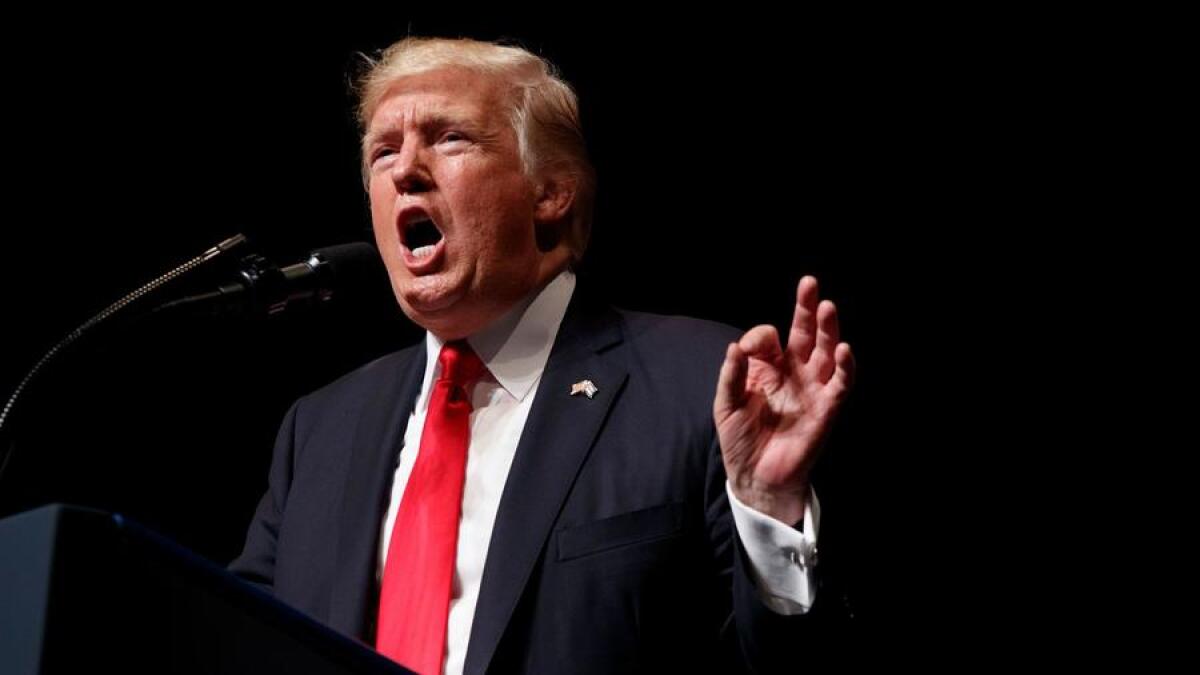
It’s a policy change President Trump insists will correct what he called a “terrible and misguided deal” by his predecessor.
Trump’s recent announcement on new travel and trade restrictions with Cuba aim to fulfill a campaign promise.
“Easing of restrictions on travel and trade does not help the Cuban people,” he said at an event in Miami on Friday. “They only enrich the Cuban regime.”
But while Trump’s policy backtracks on some of President Obama’s efforts to engage with the island, key directives will remain in place.
Here’s a look at Trump’s policy toward Cuba.
Trump’s lawyer says the president is not under investigation, despite what he tweeted
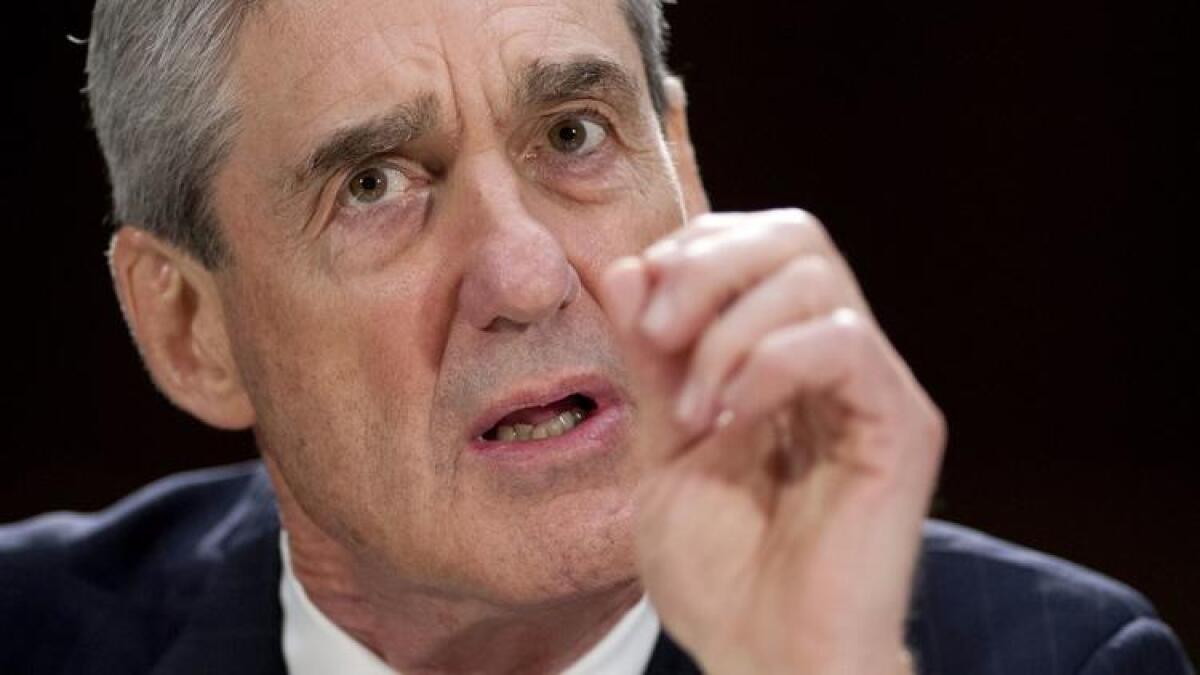
One of President Trump’s lawyers insisted on Sunday that a tweet in which he wrote of “being investigated” did not confirm that he was, in fact, under investigation, as senators of both parties suggested the probe will run for many more months whether Trump is unhappy about it or not.
Trump’s intemperate tweets have by now become commonplace, but few have been as revealing as last week’s volley of statements expressing outrage in the government’s probe of Russia’s alleged meddling in the 2016 presidential election.
Casting aspersions on the Justice Department and its inquiry, Trump on Friday seemed to confirm that he was under investigation for possible obstruction of justice by the special counsel looking into Russia’s actions.
“I am being investigated for firing the FBI Director by the man who told me to fire the FBI Director! Witch Hunt!” Trump tweeted.
On Sunday, however, Jay Sekulow, one of Trump’s lawyers, insisted that the president’s statement did not amount to an acknowledgment that he was under investigation.
Trump’s tweet was “in response” to a Washington Post story last Wednesday indicating that the special counsel’s probe now included the president, Sekulow said in television interviews. Trump was merely restating what the Post and other media had reported, Sekulow suggested.
“Let me be very clear here, as it has been since the beginning, the president is not and has not been under investigation for obstruction,” Sekulow said on NBC’s “Meet the Press.”
Sekulow did not provide much evidence for that statement, which he repeated as he made the rounds on Sunday talk shows.
He told CBS’ “Face the Nation” that there has been no notice from the office of the special counsel, Robert S. Mueller III, that Trump is under investigation.
The FBI and federal prosecutors, however, do not routinely notify people that they are under investigation. Notification is often provided if a person has become a “target,” meaning that charges could be imminent, but is not generally provided at the early stages of an investigation.
Sekulow also cited the recent congressional testimony of former FBI Director James B. Comey, who said he told Trump on several occasions that he was not being personally investigated. Those conversations, however, took place before Trump fired Comey -- one of the acts that could be interpreted as part of an effort to obstruct the case -- and before the Justice Department appointed Mueller.
Later, however, in an interview on “Fox News Sunday,” Sekulow conceded that he could not be sure of his statement. “I cannot read the mind of the special prosecutor,” he said.
Trump’s tweets have exasperated some of his aides and many of his supporters, even as they seek to defend him against what they see as a partisan investigation.
“Trump has a compulsion to counterattack. And he is very pugnacious,” former House Speaker Newt Gingrich said Sunday on ABC’s “This Week.”
“I don’t think it serves him well. I don’t think that tweet helped him,” Gingrich said of the remark suggesting that Trump was being investigated.
“But it’s almost like it’s who he has been his whole life,” Gingrich added. “I mean, he’s been a fighter his whole life. He is infuriated, and legitimately, in my judgment, by this whole Russian baloney.”
Other prominent Republicans expressed more support for the probe and defended the integrity of Mueller.
“The president’s pretty fired up about this,” said Sen. Marco Rubio, (R- Fla.), who said he discussed the probe with Trump on Friday.
“He, from every pronouncement we have seen, feels very strongly that he did nothing wrong, and he wants people to say that, because he feels very strongly about it. I don’t think that’s a mystery. And he’s expressing himself in that way,” Rubio said on “Meet the Press.”
“That said,” Rubio added, Trump’s displeasure “in no way is going to impede any of this work from continuing. It’s going to happen.”
“This is going to move forward. We’re going to get the full truth out there,” he said.
Asked if he believed that Russian agents had tried to influence the election, Rubio said he did.
“Not only do I believe it, I know it. Almost everybody else does” other than Trump, he said. “Ultimately, whether he believes it or not, the work’s going to move forward,” he added.
“The FBI doesn’t sit around all day and read tweets. The FBI’s going to do their job; Mueller’s going to do his job,” Rubio said. “And the best thing that can happen for everybody, the president, the country, our institutions [of] the government, is for a full and thorough and credible investigation that reveals everything.”
That process still has a long way to run, said Sen. Angus King of Maine, an independent who caucuses with the Democrats. King and Rubio are both members of the Senate Intelligence Committee, which is running an investigation that partially parallels the Justice Department probe being run by Mueller.
“I can say categorically that the collusion, the cooperation, aspect of the investigation is not over. And as far as that goes, I’d say we’re 20% into it,” King said.
“A lot of people have said, ‘When do you think you’ll be done?’ Maybe the end of the year. This is a very complex matter, involving thousands of pages of intelligence documents, lots of witnesses. There’s a lot of information yet to go.”
Sekulow suggested that Trump had taken to Twitter because the president wanted to fight back against news organizations that Trump and his supporters have repeatedly accused of using leaks and anonymous sources to undermine the president.
“So his legal team and the president responds,” Sekulow said on NBC.
Yet Trump’s tweets in recent days condemning the actions of his own Justice Department have reached an intense level, revealing the president’s increasing agitation about the probe and the attention it has drawn.
On Sunday, Trump again called the investigation a “witch hunt.” Last week he described the concerns about Russian influence in U.S. elections as a “phony” story.
Gunman went to Republican baseball practice with a list of names
The man who shot House Majority Whip Steve Scalise and others at a congressional baseball practice this week in Virginia had with him a piece of paper with doodles and the names of three lawmakers, according to a person familiar with the case.
The person told the Associated Press on Saturday that investigators weren’t sure of the significance of the names and didn’t know whether it was a list of people he was targeting. This person was not authorized to speak publicly about the case and spoke on condition of anonymity.
The person did not disclose the names, but said those listed had been briefed.
Scalise’s trauma surgeon said Friday that the Louisiana Republican can hope to make an “excellent recovery” even though he arrived at the hospital Wednesday at risk of imminent death.
Woman arrested after storming stage during controversial N.Y. ‘Julius Caesar’ production

A New York production of Shakespeare’s “Julius Caesar,” with a President Trump-like character who is assassinated, had a boisterous new scene this weekend: an activist who stormed the stage, yelling, “Do you want Trump to be assassinated?”
Police said Laura Loomer was arrested Friday evening during the play presented in Central Park by the city’s Public Theater. She was arrested, charged with criminal trespass and disorderly conduct and released. She is required to appear in court to respond to the charges at an unspecified later date.
“I’m out of jail, but I’m not apologetic,” the 24-year-old conservative activist wrote on Twitter. “Thanks to everyone who is supporting me & condemning political violence.”
As she rushed to the stage, Loomer reportedly shouted, “Stop leftist violence!”
Cuba’s leaders say U.S. is returning to ‘the coercive methods of the past’

Cuba’s leaders on Friday criticized President Trump’s “hostile rhetoric” and tightening of restrictions on Cuba as a harmful setback to what had been warming relations between the United States and the Communist-ruled island nation.
In a letter signed by Cuba’s revolutionary government and published in Granma, the ruling party’s official mouthpiece, Cuban leaders called Trump’s announcement that he would be tightening economic and travel restrictions on Cuba a return to “the coercive methods of the past.”
The statement said that Trump’s actions “contradict the majority support of American public opinion.” It suggested Trump was influenced not by overall opinion polls but by the views of a minority of Cuban Americans who opposed former President Obama’s moves to improve relations with and roll back sanctions against Cuba.
Despite their obvious anger at Trump’s attacks, the Cuban leaders did not threaten retaliatory measures. They said they would be willing to continue negotiating with the U.S., so long as it was via “respectful dialogue.”
In Florida, impact of Trump’s Cuba policy called ‘muted’ by some. Others not so sure
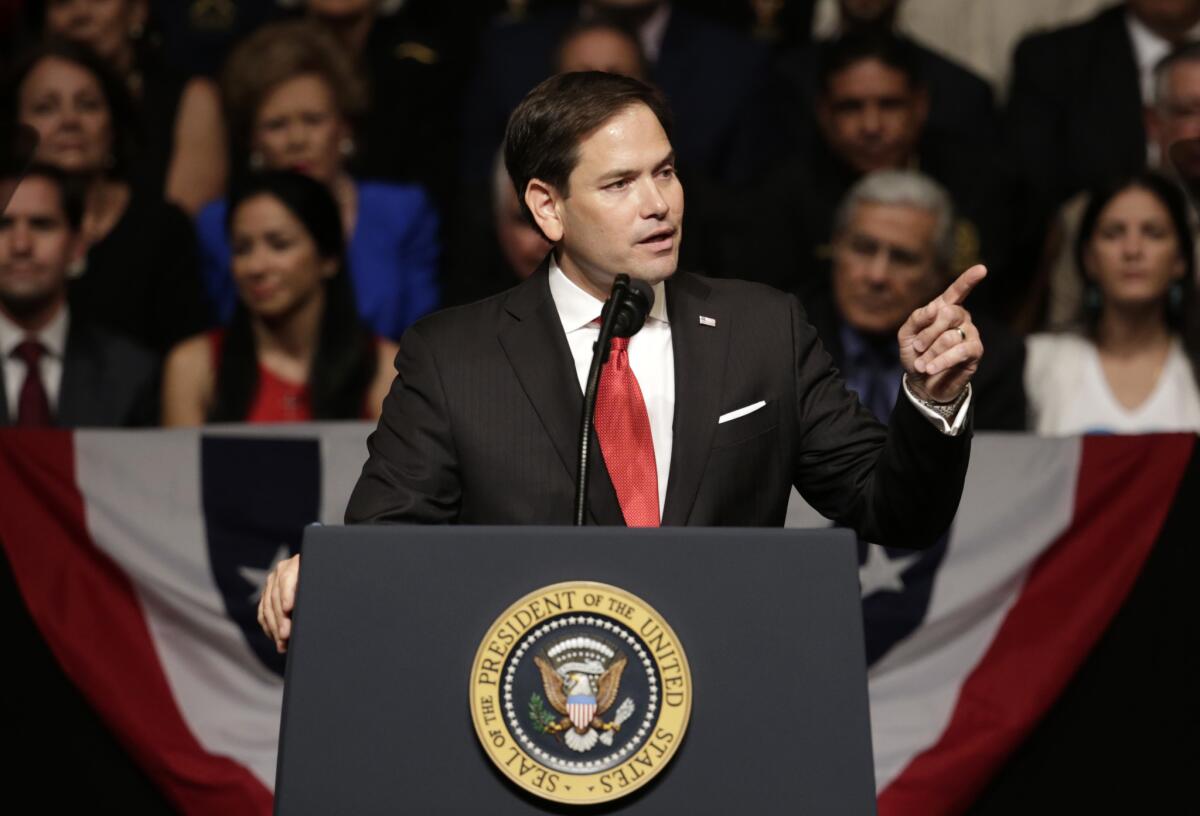
For nearly six decades opinions about Cuba have been divided, so it’s no surprise reaction varied widely Friday after President Trump announced that he was “completely cancelling” the “terrible and misguided deal” by President Obama that opened relations with Cuba.
Speaking in Little Havana, the epicenter of anti-Castro movements in Miami, Trump said rules on American travel to Cuba will be tightened, but airlines and cruise ships will continue to visit the Caribbean island. The new rules also prohibit Americans from spending money on businesses controlled by the military.
Sebastian Arcos, associate director of the Cuban Research Institute at Florida International University, said Trump’s speech wasn’t a “big deal” because, fundamentally, not much is changing.
“The changes he announced today are not a cancellation of Obama’s policy,” Arcos said from Boca Raton. “Many components of the original [Obama] policy stay the same. [Trump] used the word ‘cancellation,’ but he’s leaving many aspects of the policy untouched.”
Others, however, called Trump’s decision disastrous, a marked shift in the dynamic over the last two years, said Albert Fox, president of the Tampa-based Alliance for Responsible Cuba Policy Foundation, which advocates for engagement with the Cuban government.
“It’s a very big deal. People don’t understand how big it is,” Fox said from Tampa. “Trump’s speech was the worst form of political pandering I’ve seen in 50 years.”
“Those of us that are in favor of engagement with the Cuban government don’t understand [Trump’s] policy – nobody does, even his own people,” Fox continued. “More human rights abuses and violations happened today in Cairo than have happened in years in Cuba.”
President Trump had said in his speech on Friday that “executions” were still a problem in Cuba.
“There hasn’t been an execution in Cuba in 10 years,” Fox countered.
Florida Republican lawmakers who urged Trump to scale back Obama’s Cuban overtures voiced support for the president.
“Economic practices that benefit the Cuban military at the expense of the Cuban people will soon be coming to an end #BetterDealforCuba,” Sen. Marco Rubio said on Twitter.
Rep. Mario Diaz-Balart, who represents parts of Miami, told Fox News, “Our partners are not the Cuban regime. Our partners have to be the Cuban people.”
He described Trump’s move as a “win-win” victory for Cuba and the U.S. He also noted that Trump will not lift sanctions or the 56-year-old embargo in place until free and fair elections are held in Cuba. “Is that too much to ask for?”
Trump’s financial disclosure form: It’s complicated
The White House on Friday released President Trump’s personal financial disclosure, offering the most extensive look to date at his personal finances and the complex portfolio of real estate and other holdings that made him a billionaire.
The 98-page filing with the Office of Government Ethics lists 565 separate roles that Trump holds in his vast business empire, largely LLCs and corporations established to manage his hotels, apartments and golf courses.
It itemizes hundreds of sources of income and other assets, some only in broad ranges that make identifying an exact annual income or overall net worth difficult.
The disclosure also shows debts of at least $315 million in mortgages.
In a statement, White House Press Secretary Sean Spicer said Trump “welcomed the opportunity to voluntarily file” the disclosure form, noting one was not due until his second year in office.
Trump signed off on the release of the document on Wednesday -- his 71st birthday.
The president reported more than $37 million in income from his Mar-a-Lago resort in Palm Beach, Fla., where he traveled regularly during his first months in office and hosted the president of China and prime minister of Japan.
His new Washington hotel accounted for nearly $20 million in income. The property is at the heart of a new lawsuit by the attorneys general of Maryland and the District of Columbia. They argue that by his retaining ownership in the hotel and other venture, he violates a constitutional ban on accepting so-called emoluments from foreign states.
Trump also reported $84,292 in income from his Screen Actors Guild Pension.
Royalties from his 1987 book, “The Art Of The Deal,” ranged from $100,000 to $1 million, while a 2007 book, “Think Big and Kick Ass,” offered little income nearly a decade later.
In March, 180 administration officials released their own financial disclosure forms. Among them were Trump’s son-in-law Jared Kushner, whose form also accounted for Ivanka Trump.
President Obama’s 2016 financial disclosure form was far simpler -- and just eight pages long.
Vice President Mike Pence reported far fewer assets and decidedly less complex personal finances, consisting of his salary as governor of Indiana and participation in the state pension program.
Trump releases a financial disclosure form
President Trump released a new financial disclosure he voluntarily made Friday to the Office of Government Ethics. The documents cover January 2016 through this spring.
Appointment of Trump wedding planner to HUD post draws outcry
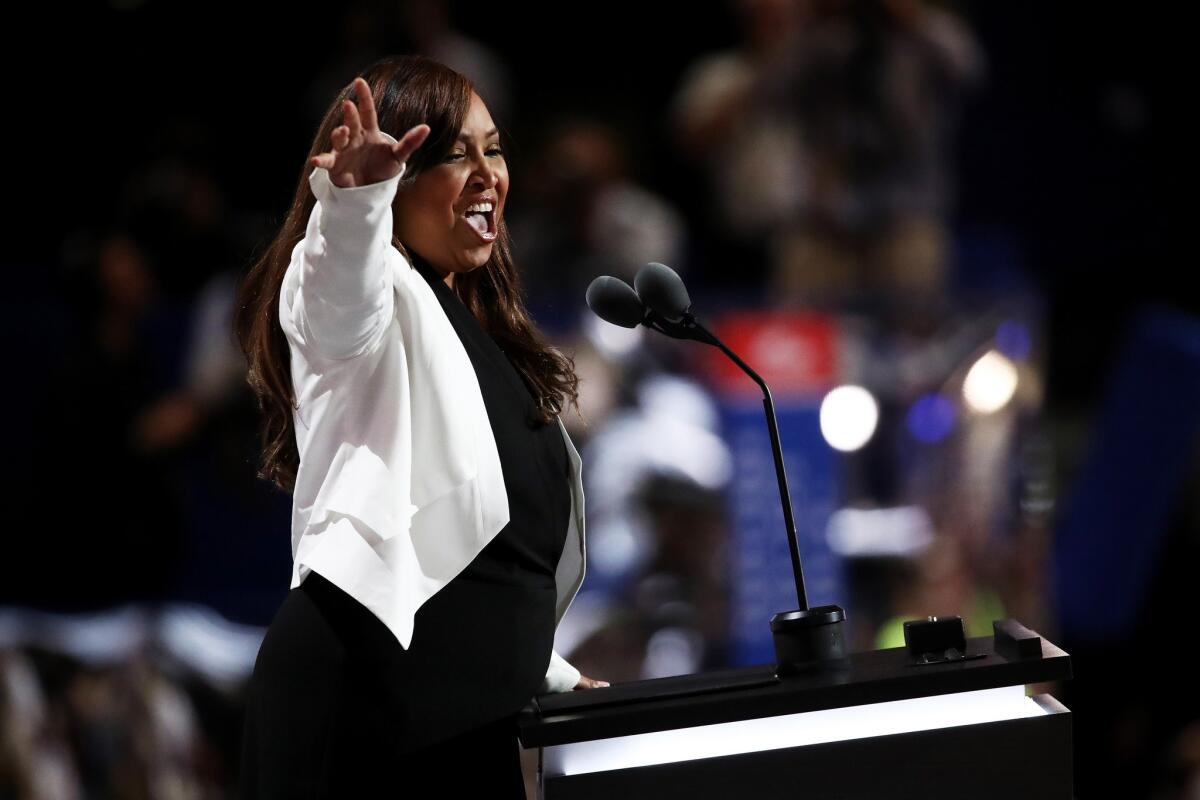
The appointment of Lynne Patton, a wedding planner and longtime Trump family associate, to head the Housing and Urban Development’s office for New York and New Jersey is encountering strong opposition in New York.
Grace Meng, a Democratic congresswoman from Queens, on Friday wrote a letter to President Trump protesting the appointment and questioning Patton’s lack of experience for the job.
“This is not The Apprentice; The federal government is not your personal patronage system,’’ Meng wrote in the letter published on Facebook.
Patton has worked since January as senior advisor and director of public engagement for the Housing and Urban Development department, where she served under HUD Secretary Ben Carson, a neurosurgeon who himself was criticized for a lack experience in handling housing policy.
Previously she worked on the Trump presidential campaign and as vice president of the Eric Trump Foundation, which is under investigation by the New York State attorney general for improperly handling funds that were earmarked for children with cancer. She was the planner for Eric Trump’s wedding in 2014 and handled other receptions and golf tournaments at Trump properties, according to her profile on Linkedin.
Patton was one of the most prominent of Trump’s African American supporters and she released a YouTube video during the campaign defending his record on racial issues.
Scalise’s condition improves, but more operations and long hospital stay expected
House Majority Whip Steve Scalise was at “imminent risk of death” after a gunman opened fire at a congressional baseball team practice, but the GOP leader is making progress and is expected to be able to walk again, officials said Friday.
The No. 3 House Republican remains in intensive care and is likely to stay hospitalized for weeks. He will need additional operations, possibly in the coming days.
“The congressman’s status remains critical. We are encouraged by improvement in his condition over the last 36 hours. We have controlled the internal bleeding and his vital signs have stabilized,” said Dr. Jack Sava, director of trauma at Washington MedStar Hospital Center, briefing reporters.
“An excellent recovery is a good possibility.”
The Republican baseball team was practicing early Wednesday ahead of an annual charity game when a gunman who had ranted against President Trump opened fire wounding Scalise and others in the ball field outside Washington.
Witnesses said the shooting would have been a “massacre” if not for the Capitol Police officers on duty as part of Scalise’s security detail and the gunfight that ensued as local law enforcement arrived.
Capitol Police Special Agent Crystal Griner was shot in the ankle but was recovering at the hospital.
“She’s in good condition and she’s in good spirits,” Sava said.
A congressional staffer and lobbyist were also shot, and another congressman and police officer suffered injuries.
The congresswoman’s wife, Jennifer, issued a statement Friday thankful for “the incredible amount of prayers and warm wishes we have received.”
The shooting cast a somber mood over Washington and momentarily tamped down the partisan fighting. Thursday night’s annual Congressional Ball Game drew record crowds and, despite an 11-2 rout by Democrats over Republicans, the GOP team took home the trophy as lawmakers dedicated the game to Scalise.
Speaking in Miami on Friday, Trump said Scalise “took a bullet for all of us. And because of him, and the tremendous pain and suffering he’s now enduring -- he’s having a hard time, far worse than anybody thought -- our country will perhaps become closer, more unified.”
“So we all owe Steve a big, big thank you,” the president said.
The rifle blast to Scalise’s left hip, as he stood near second base, caused “substantial damage” to bones, internal organs and blood vessels. By the time he arrived after being airlifted to the hospital, he was in shock.
“He was as critical as can be,” Sava said.
Predicting when the congressman would be released from the hospital was difficult, the doctor said, adding that “he will require a period of healing and of rehabilitation.” The rifle blast left possibly hundreds of bullet fragments that the doctor said will not likely be removed.
“I feel a lot more confident and a lot more optimistic than I did two, three days ago,” Sava said.
“We fully expect him to be able to walk ... hopefully, run.”
Small and midsized banks could get regulatory relief from Senate. Wall Street? Probably not
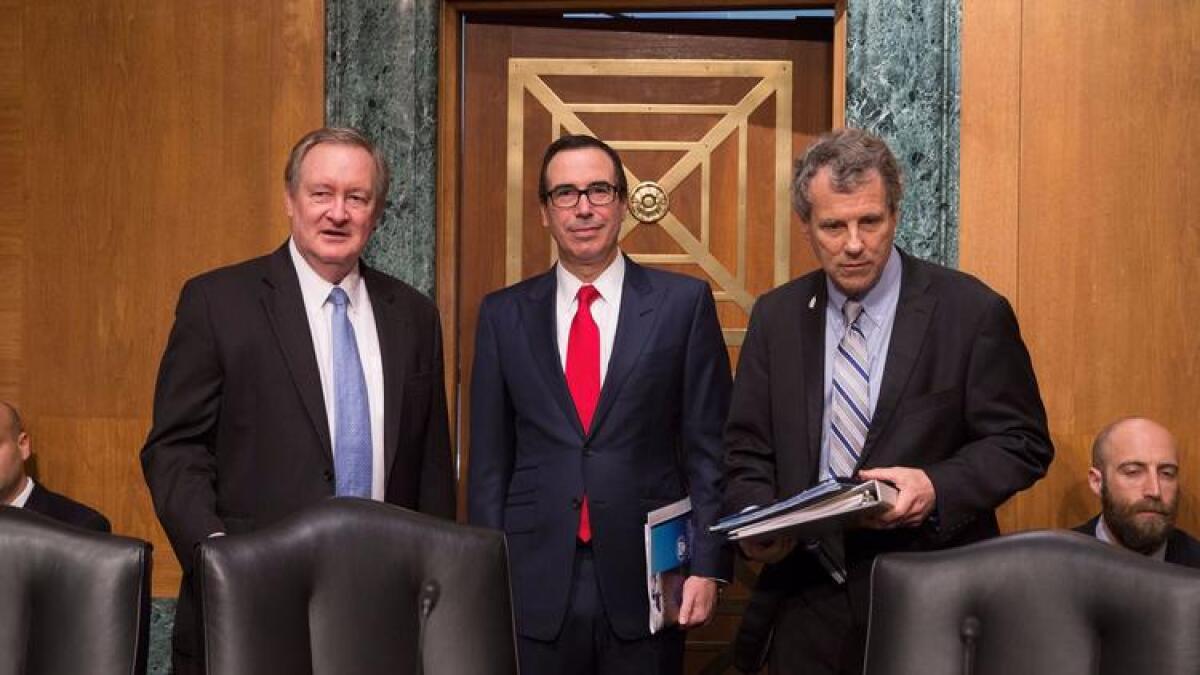
The Senate could reduce regulations for small and midsized banks, but Wall Street may be out of luck.
House Republicans and the Trump administration want a major rollback of the 2010 Dodd-Frank financial reform law, including changes that would help the nation’s largest banks. But as debate shifts to the Senate, those changes are likely to be scaled back significantly because Republicans lack the votes to push many of them through.
“We will have an easier time getting bipartisan agreement at the smaller size level of institution,” Senate Banking Committee Chairman Mike Crapo (R-Idaho) told an industry trade group this week. “As you move up the size level for institutions, the ability to get bipartisan agreement diminishes. But it doesn’t go away.”
Newt Gingrich says a president ‘cannot obstruct justice.’ That’s not what he said in 1998
In a recent interview at the National Press Club in Washington, Newt Gingrich appeared to contradict his past statements about obstruction of justice.
While discussing the ongoing Russia investigation involving President Trump and his campaign, the former GOP House speaker said the president can’t obstruct justice.
“Technically, the president of the United States cannot obstruct justice,’” he said, adding, “If he wants to fire the FBI director, all he has to do is fire him.”
But as House speaker in 1998, Gingrich argued the opposite point. As reported by the The Times and other news outlets at the time, when referring to the investigation into President Clinton after his repeated denials of having an affair with Monica Lewinsky, Gingrich described Clinton’s actions as “obstruction of justice.”
“What you have lived through for 2.5 long years is the most systematic, deliberate obstruction-of-justice cover-up and effort to avoid the truth we have ever seen in American history,” he said. Video of that statement was resurfaced in a 2011 CNN profile on him after he announced the launch of his presidential exploratory committee.
Ultimately, Gingrich’s House charged Clinton with obstruction of justice, as stated in Article III of the House Judiciary Committee’s report that urged his impeachment: “Although, the actions of President Clinton do not have to rise to the level of violating the the federal statute regarding obstruction of justice in order to justify impeachment, some if not all of his actions clearly do.”
Long-term fate of Dreamers remains in limbo after a day of rumors
A flurry of rumors, conflicting reports and divergent statements on Friday highlighted deep divisions within the Trump administration over a major element of immigration policy -- the fate of the roughly 750,000 so-called Dreamers who are shielded from deportation by an Obama-era policy.
The rumors began after Homeland Security Secretary John F. Kelly, moving to meet a court deadline, issued a memorandum late Thursday evening that formally ended the legal fight over former President Obama’s 2014 DAPA program. That initiative sought to temporarily remove the threat of deportation for more than 4 million immigrant parents of children who are U.S. citizens or lawful permanent residents.
The DAPA program was never fully implemented because of a series of legal challenges by mostly Republican-led states. So formally revoking it had little direct impact.
But one line of the memorandum noted that Obama’s 2012 order that shielded Dreamers -- young people who came to the U.S. illegally as children -- “will remain in effect.” That program, known as DACA, began five years ago this week.
The language saying DACA remained in effect raised hopes among immigrant activists that President Trump had decided to permanently keep the program in effect.
Trump vowed as a candidate to end the DACA program, calling it an “unconstitutional executive amnesty.” But his administration has continued to receive applications and renewal requests and grant work visas to eligible individuals since he took office in January.
Within the administration, some officials have pressed for Trump to stick with his promise to repeal DACA. But Trump has repeatedly said he does not want to see the Dreamers deported, and other advisers have urged them to leave DACA in place.
There is currently no formal process underway at the Homeland Security department to terminate the 5-year-old program, an administration official said.
But a White House official separately insisted that “there has been no final determination on DACA,” leaving it, and the fate of the estimated 750,000 who have won work permits under the program, uncertain.
Rep. Michelle Lujan Grisham (D-N.M.), chairwoman of the Congressional Hispanic Caucus, said the ongoing ambiguity of the administration’s policies “continues to create fear and anxiety in immigration communities.”
“Their announcement to keep DACA, while revoking DAPA and deporting family members is deceitful and is another effort to keep immigrant families feeling uncomfortable about their place in America,” she said.
On the other side of the debate, Trump’s failure to repeal DACA continues to generate complaints from some of his most ardent supporters.
“I certainly am very happy that Secretary Kelly ended DAPA ... that is a good thing and needed to happen -- but it does not fulfill Trump’s campaign promise. DACA needs to be ended,” said Rosemary Jenks, the head of government relations for NumbersUSA, a group that advocates for lower immigration levels.
There are ways to end DACA “to make it less painful” by phasing the work permits out gradually, Jenks said in an interview. NumbersUSA often mobilizes supporters to pressure lawmakers and the White House to adopt more restrictive immigration policies.
“It is clear the decision on DACA has been made at the White House,” said Jenks. “That is truly on Trump and he needs to do it,” she said.
During the campaign, Trump repeatedly said DACA was unconstitutional. “You can’t continue to do something that is unconstitutional,” Jenks said.
Trump curtails historic opening with Cuba
President Trump on Friday rolled back some, but not all, of his predecessor’s historic opening to Cuba, making it more difficult to travel to and do business with the Communist-ruled island.
In a speech in Miami, during which he greeted Cuban dissidents and denounced the Cuban regime, Trump said Cuban rulers were profiting from better relations with Washington but that ordinary Cuban citizens continued to be repressed.
“The previous administration’s easing of restrictions on travel and trade does not help the Cuban people, they only enrich the Cuban regime,” he said.
The result has been “only more repression.”
“I am canceling the previous administration’s completely one-sided deal,” he declared.
Trump’s actions will restrict the ways U.S. citizens can travel to Cuba and block business deals by American companies that might give revenue to the Cuban military.
But the announcement leaves intact many of the new Cuba policies adopted under President Obama, including the restoration of normal diplomatic relations, the elimination of special immigration rules for Cuban refugees and the permission for U.S. airlines and cruise ships to travel directly to the island.
Trump rarely cites human rights in his foreign policy decisions, and doing so now seemed to be in part a rhetorical nod to Republican Sen. Marco Rubio of Florida and others who lobbied the president to completely shut down the opening with Cuba.
In December of 2014, Obama and Cuba’s President Raul Castro announced they were reopening diplomatic ties after a half-century of hostility.
Soon, Americans could travel to Cuba and businesses, including the tourism industry and food-producing farm states, were involved in commercial deals.
But conservative members of Congress, especially those based in southern Florida, objected. It was mostly the Communist government and Cuban military who were benefiting, they said. Until Cuba’s human rights situation improved, they argued, deals with Cuba should be limited.
The timing and place of Trump’s announcement raised some eyebrows. His vice president and three cabinet secretaries have been hosting leaders of Mexico and Central America in Miami for a two-day conference on immigration and regional prosperity.
All of the visiting Latin Americans were among the hemisphere’s leaders who welcomed Obama’s decision to recognize Havana. Until then, the United States was the only country in the world that continued to maintain a hostile position toward Cuba, and Obama’s decision to reverse that gained enormous goodwill for the United States throughout the Western Hemisphere.
Trump’s announcement will anger Latin America and erode U.S. ability in the region, including Washington’s efforts to pressure Venezuela’s abusive, leftist government.
“The optics are not the best,” said a senior international Latin American finance official in Miami for the conference. Like many diplomats, he spoke on condition of anonymity to talk about the Trump administration.
“The entire region welcomed the United States’ normalization of relations with Cuba,” said Cynthia Arnson, director of the Latin America program at the nonpartisan Wilson Center think tank in Washington. “The hardening of policy can only add to the growing distance between Washington and the region’s democracies.”
National Security Council spokesman Michael Anton denied that the timing was a “slap in the face” to Latin American leaders.
“There’s nothing intentional about the timing. It’s not a slap in the face,” he told reporters on Air Force One as Trump flew to Miami.
“We hope we can get support from other Latin American leaders for this policy,” Anton said. “This is a policy that favors the Cuban people over and against an oppressive regime.”
Watch live: Trump speaks about U.S. policy toward Cuba
Feinstein says she’s increasingly concerned Trump will try to fire Mueller, Rosenstein
Tweets sent by President Trump have Sen. Dianne Feinstein (D-Calif.) concerned that he will try to fire the special prosecutor appointed to investigate Russian attempts to influence the 2016 presidential election, and the deputy attorney general who appointed him.
“The message the president is sending through his tweets is that he believes the rule of law doesn’t apply to him and that anyone who thinks otherwise will be fired. That’s undemocratic on its face and a blatant violation of the president’s oath of office,” Feinstein said in a statement Friday.
“It’s becoming clear to me that the president has embarked on an effort to undermine anyone with the ability to bring any misdeeds to light, be that Congress, the media or the Justice Department. The Senate should not let that happen. We’re a nation of laws that apply equally to everyone, a lesson the president would be wise to learn,” she said.
In a tweet Friday morning, Trump said he was “being investigated for firing the FBI director by the man who told me to fire the FBI Director! Witch Hunt”
Trump was likely referring to Deputy Atty. Gen. Rod Rosenstein, and to a Washington Post story Wednesday that Robert S. Mueller III, the special counsel leading the FBI investigation into Russian interference in the 2016 election, is looking at whether Trump attempted to obstruct justice.
Rosenstein authored the memo the White House initially used as justification for firing then-FBI Director James B. Comey as the agency was investigating elements of the Russian matter. Rosenstein also made the decision last month to name Mueller as a special counsel.
Feinstein stressed that Rosenstein has the authority to fire Mueller, not the president. After a longtime Trump associate said the president was considering firing the special counsel, Rosenstein testified this week that he would not fire Mueller without good cause.
“If the president thinks he can fire Deputy Atty. Gen. Rosenstein and replace him with someone who will shut down the investigation, he’s in for a rude awakening. Even his staunchest supporters will balk at such a blatant effort to subvert the law,” Feinstein said.
The black vote is key in Georgia’s upcoming House race — but can Democrats energize it?
As Democrats seek to win the hotly contested House race in this longtime GOP stronghold, one of their toughest and most urgent challenges has become energizing black voters who have gone lukewarm on the party nationally.
Even in a race in which Democrats have more money to spend than in any House race in history, they are struggling to get black voters in this rapidly diversifying district to turn out in the numbers they did when President Obama was on the ballot.
Their candidate, Jon Ossoff, fell just shy of winning the race outright during a special election in April, when the district’s voters exhibited enthusiasm for a Democrat not seen in decades.
Flat turnout among African Americans ultimately played big in pushing Ossoff into a runoff next week for the seat vacated by President Trump’s health and human services secretary, Tom Price.
Shooting heightens lawmakers’ security fears amid growing partisan rancor
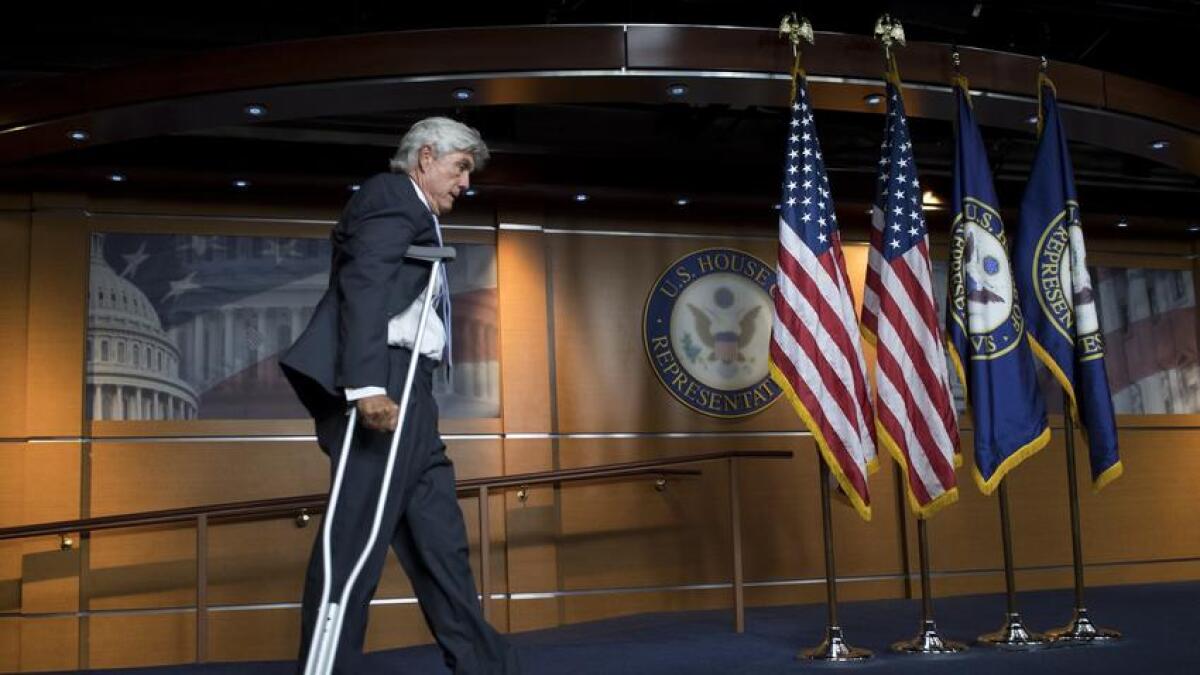
The voicemail messages left at Arizona Republican Rep. Martha McSally’s office were explicit: “Our sights are set on you. Right between your ... eyes.” Another said, “Your days are numbered.”
A female caller recently warned Rep. Adam Kinzinger (R-Ill.) that he would soon know her name — because she was coming for him.
And after a gunman opened fire Wednesday on Republicans playing baseball — critically wounding Majority Whip Steve Scalise of Louisiana — a staffer of GOP Rep. Claudia Tenney opened the New York congresswoman’s email to find this ominous message: “One down 216 to go.”
As the country’s polarized political environment has intensified since President Trump’s election, members of Congress report receiving more death threats than ever before.
That has led to renewed calls for beefed-up security and other changes to enhance members’ safety, particularly when they travel away from the protective environment of the Capitol.
In tweet, Trump seems to confirm he is under investigation for obstruction of justice
President Trump appeared to attack a top official in his own Justice Department on Friday, and in the process arguably confirmed reports that he is under investigation for obstruction of justice.
In one of a series of morning tweets, Trump said he was “being investigated for firing the FBI director by the man who told me to fire the FBI Director! Witch Hunt”
Trump is likely pointing to Deputy Atty. Gen. Rod Rosenstein, who made the decision last month to name former FBI Director Robert S. Mueller III as a special counsel to oversee the probe of Russian meddling in the 2016 election.
The Washington Post reported Wednesday that Mueller has expanded his investigation to include whether Trump attempted to obstruct justice.
Rosenstein told a Senate panel this week that he hasn’t spoken to Mueller about the substance of the investigation since he appointed him, adding that Mueller should make his own determinations about what is within the scope of it.
Rosenstein appointed Mueller after Trump fired FBI Director James B. Comey, a decision the White House initially said was largely based on a memo written by Rosenstein outlining concerns about Comey’s leadership -- but which never explicitly recommended his termination, despite what the president’s tweet Friday suggests.
Trump himself had told NBC News in an interview last month that he was planning to fire Comey anyway, independent of Rosenstein’s memo.
Whether Trump’s tweet confirms a possible obstruction of justice case against him or simply refers to the reports of one, it is only the latest example of him commenting about the larger probe in a way that his personal attorney and administration officials would almost certainly advise against.
It also comes amid speculation that Trump is considering firing Mueller -- a course of action congressional Republicans are widely advising against, even as Trump allies like former House Speaker Newt Gingrich suggest he should.
The tweet seemingly referring to Rosenstein, appointed by Trump and confirmed by the Republican-led Senate overwhelmingly earlier this year, comes after the deputy attorney general issued a cryptic statement Thursday night advising Americans to “exercise caution before accepting as true any stories attributed to anonymous ‘officials.’”
That statement appeared to be linked to a separate report that Mueller is also investigating the business dealings of the president’s son-in-law, senior advisor Jared Kushner.
Education Secretary Betsy DeVos suspends new rules cracking down on for-profit college abuses

As Corinthian Colleges Inc., ITT Technical Institute and other for-profit schools collapsed in recent years, the Obama administration overhauled regulations to make it easier to forgive loans for stranded students and to try to prevent future abuses.
Now, the Trump administration is suspending those rules, which had been set to go into effect July 1. The Department of Education, under Secretary Betsy DeVos, also is launching an effort to rewrite the rules.
Both moves drew criticism from Democrats and student advocates.
For Claudia Chacon, 25, of Los Angeles, a former student at Corinthian’s Everest College, the decision could lead to more difficulties in her attempt to get loan relief.
Another shooting — close to home — and still no change in Washington’s gun debate. Here’s why.
Nothing changed after moviegoers were slaughtered in Aurora, Colo. Nothing changed after children were massacred in Newtown, Conn., after worshipers were killed inside a church in Charleston, S.C., after office workers were mowed down at a holiday party in San Bernardino.
And even though members of Congress were attacked Wednesday by a gunman on a ball field just outside the capital, nothing is likely to change in the Washington debate over gun control, save the addition of Alexandria, Va., to the list of blood-soaked postmarks.
The two sides of the debate are simply too dug in, the political forces too firmly entrenched, the worldview of opposing sides so vastly different it is impossible to see how the gulf narrows even slightly, however close to home the latest attack.
Underscoring that notion, the one thing both sides shared after the latest mass shooting was the capacity to look at precisely the same event and see it in a way that buttressed diametrically opposing views.
‘Scalise Strong’: Congress puts up united front at charity baseball game after shooting
Rep. Brad Sherman (D-Porter Ranch) smiled broadly when asked who he thought would win the 56th annual Congressional Baseball Game.
“America,” he said with a laugh.
The charity game on Thursday night began on a somber note with a prayer and a moment of silence for House Majority Whip Steve Scalise (R-La.) and three others who were shot by a gunman on Wednesday at the GOP team’s practice for the event.
After the lawmakers on the Democratic and Republican rosters rose from their knees in prayer, fans and players quickly got caught up in the traditional rivalry at Nationals Park in Washington. Thousands of fans booed or cheered when their partisan teams made a play, and pulled out their phones to film the Nationals’ mascots — the running presidents — race around the bases. (Teddy Roosevelt won by cutting the final corner.)
Shortly after the shooting, coaches for both teams said they would go forward with the game. They seemed determined to show unity after a gunman who appeared to be targeting Republicans unleashed a spray of bullets on the practice field in Alexandria, Va., and was eventually stopped by police.
During the game, a Washington hospital announced that Scalise remained in critical condition. A Capitol Police officer who was injured while helping stop the attacker threw out the ceremonial first pitch, hobbling out on crutches to a standing ovation.
Indicators of Wednesday’s shooting were sprinkled throughout the stadium. Police were very visible at the event that sold a record 25,000 tickets and raised $1 million. Many fans, including ones who identified as Democrats, carried signs that read “Scalise Strong” or “Geaux Scalise.” Members of Congress from both parties wore Capitol Police and Louisiana State University hats to honor Scalise’s alma mater.
Rep. Pete Aguilar (D-Redlands) said there was a lot less trash-talking on the field this year and members spent more time checking on one another.
“The energy was very positive. It was one of unity and very sincere concern for Rep. Scalise. There was a lot of camaraderie,” Aguilar said.
With a final score of 11-2, Democrats received the coveted trophy. Democratic coach Rep. Mike Doyle of Pennsylvania called Republican coach Rep. Joe L. Barton of Texas to the microphone and said his team wanted the trophy to be displayed in Scalise’s office until the Louisiana congressman returns.
Democrats win Congressional Baseball Game
The Democratic team was victorious at the Congressional Baseball Game, but it opted to honor GOP Majority Whip Steve Scalise and let his office hang on to the trophy until he recovers.
The charity game on Thursday night began on a somber note with a prayer and a moment of silence for House Majority Whip Steve Scalise (R-La.) and three others who were shot by a gunman on Wednesday at the GOP team’s practice for the event.
After the lawmakers on the Democratic and Republican rosters rose from their knees in prayer, fans and players quickly got caught up in the traditional rivalry at Nationals Park in Washington. Thousands of fans booed or cheered when their partisan teams made a play, and pulled out their phones to film the Nationals’ mascots — the running presidents — race around the bases. (Teddy Roosevelt won by cutting the final corner.)
Shortly after the shooting, coaches for both teams said they would go forward with the game. They seemed determined to show unity after a gunman who appeared to be targeting Republicans unleashed a spray of bullets on the practice field in Alexandria, Va., and was eventually stopped by police.
During the game, a Washington hospital announced that Scalise remained in critical condition. A Capitol Police officer who was injured while helping stop the attacker threw out the ceremonial first pitch, hobbling out on crutches to a standing ovation.
Nancy Pelosi and Paul Ryan do their first joint interview ever at Congressional Baseball Game
Here’s a little clip from the interview with House Speaker Paul D. Ryan and Minority Leader Nancy Pelosi.
Sens. Charles E. Schumer and Mitch McConnell, minority and majority leaders, respectively, also appeared together on CNN.
Injured Capitol Police officer hailed as hero throws first pitch at Congressional Baseball Game
David Bailey, one of the two Capitol Police officers on Rep. Steve Scalise’s security detail who have been credited with saving his life, threw out the first pitch at Thursday’s Congressional Baseball Game.
Bailey, who injured his ankle during the shooting, received a warm welcome from players. He then surprised the crowd and walked with crutches to the pitcher’s mound.
Crystal Griner, the other Capitol Police officer who was injured during the shooting, has not yet been released from the hospital.
Prayer and huge crowds as Congressional Baseball Game begins
The Congressional Baseball Game has started, with a both somber and spirited tribute to House Majority Whip Steve Scalise, who remains in the hospital after being shot Wednesday during the Republican team’s practice for the game.
Fans are packing the stands of Nationals Park, where Washington’s Major League Baseball team plays, and organizers are reporting more than 20,000 tickets have been sold.
Capitol Hill aides and lovers of the annual game that pits Republicans versus Democrats are waving signs and cheering as things got underway.
The House chaplain led a moment of prayer for the players. President Trump addressed the crowd via video on the Jumbotron.
“This game is always an important moment for both parties to come together,” Trump said. He said the game takes on deeper meaning given the attack.
“By playing tonight you are showing the world that we will not be intimidated by threats, acts of violence or assaults on our democracy. The game will go on.”
Watch the game in this space or over here.
Ivanka Trump and Kellyanne Conway show up at Congressional Baseball Game
Vice President Pence has hired a criminal lawyer to respond to requests from the special counsel
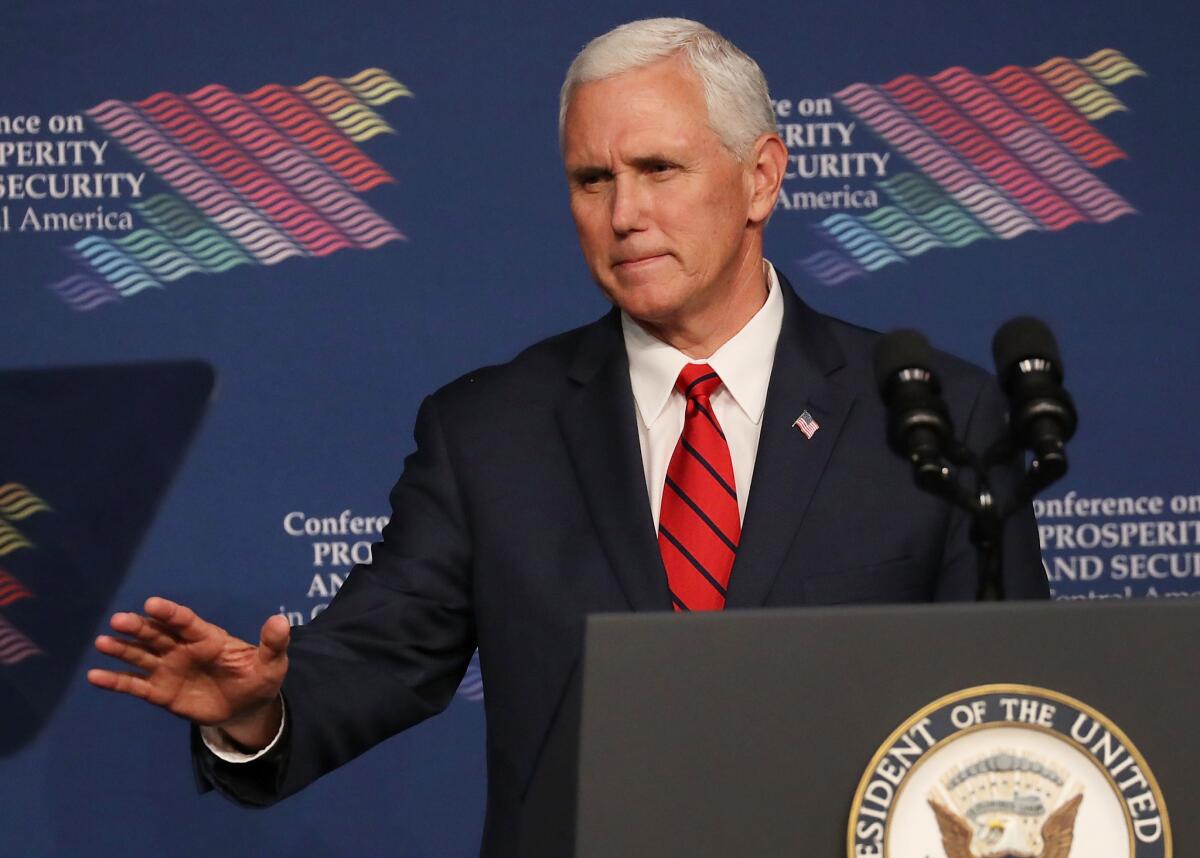
Vice President Mike Pence has hired an experienced criminal lawyer to respond to requests from the special counsel and congressional committees investigating possible connections between Donald Trump’s campaign and Russia, a spokesman for Pence said Thursday.
Richard Cullen, a former federal prosecutor and currently chairman of the McGuire Woods law firm, will help Pence handle inquiries from Robert S. Mueller III, the former FBI director leading the investigation, Jarrod Agen, Pence’s communications director, said in a statement.
“I can confirm that the vice president has retained Richard Cullen of McGuire Woods to assist him in responding to inquiries by the special counsel,” Agen said.
In recent days, Mueller reportedly has requested to talk to senior Trump administration officials as his team of investigators looks at whether people working on Trump’s presidential campaign colluded with Russian officials to interfere in the election process.
“The vice president is focused entirely on his duties and promoting the president’s agenda and looks forward to a swift conclusion of this matter,” Agen said.
In late May, President Trump hired Marc Kasowitz to handle legal and media requests about the Russia investigation.
Cullen served as U.S. attorney for the Eastern District of Virginia under President George H.W. Bush.
Cullen also has experience with high-profile congressional inquires. During the Iran-Contra investigation, Cullen was counsel to former Sen. Paul Tribe (R-Va.), and was on the staff of former Rep. M. Caldwell Butler (R-Va.) during the Watergate investigation.
Watch live: Congressional Baseball Game
The Congressional Women’s Softball Game will continue as planned too
Like the Congressional Baseball Game, which is being played Thursday night between Democrats and Republicans, the softball game between female members of Congress and the Washington press corps will go on as planned next week.
“Especially after the men’s game decided to persevere ... everyone wanted to move forward,” said Congressional Women’s Softball Game President Atalie Ebersole.
Played on the baseball diamond of an elementary school near the Capitol, the nine-year-old game tends to be more low-key than the Congressional Baseball Game, which will be played in Nationals Park just a day after a member of Congress and three others were shot during practice for the charity game.
At the women’s game, which raises money for young breast cancer survivors, local families who come to watch are so close to the field they can practically touch the center fielder. Members of Congress and reporters trash talk between cooing over each other’s children.
It’s my second year on the press team, and I was playing short stop at practice Wednesday when news of the shooting at the GOP’s practice in Alexandria, Va., began to trickle in. Roll Call political reporter Bridget Bowman was headed toward third base when she told us the news.
The next batter swung as first base coach and NBC News Capitol Hill producer Frank Thorp ordered players off the field. Cellphones began to buzz and light up in the dugout. Reporters started shouting what they were learning on Twitter, and figuring out who would carpool together to get to the shooting site, or to the Capitol to start working.
I answered a frantic phone call from my husband and sent my mother the text message I always do when there’s an incident in Washington she might hear about: “I’m safe.”
Several reporters spent the morning reporting on the shooting while still in their workout gear. One television network reporter went from standing on first base to interviewing members of Congress on air within 30 minutes.
A Capitol Police officer is always posted at the congressional team’s morning practices, and both Capitol Police and D.C. police will be at the June 21 game.
Ebersole said there’s been an uptick in ticket sales since the shooting — at least 200 tickets were bought Thursday. With the $260,000 raised so far this year, Ebersole said the game has raised more than $1 million since its inception for the Young Survival Coalition, an organization aimed at young women with breast cancer.
Trump visits Supreme Court justices as the fate of his travel ban hangs in the balance
President Trump had the rare privilege to visit with the nine Supreme Court justices in their private conference room on Thursday just before an investiture ceremony for new Associate Justice Neil M. Gorsuch.
The president and First Lady Melania Trump signed the guest book and had photos taken with the justices, according to a court spokeswoman.
The brief meeting came as the justices are weighing the fate of the president’s proposed temporary ban on travel from six Muslim-majority nations.
Trump’s acting Solicitor Gen. Jeffrey Wall, who took part in Thursday’s ceremony, has urged the justices to lift the lower court rulings that blocked Trump’s order from taking effect. He argued those rulings wrongly crimped the president’s power over immigration.
The justices are likely to vote on his motion next Thursday.
Trump has suffered a series of setbacks in the lower courts but has said he is confident he will prevail in the Supreme Court. It would take the votes of five justices to put the travel ban into effect.
The justices also met the president on April 10 when they were invited to the White House Rose Garden to witness Gorsuch being sworn in. The new justice took a separate judicial oath in a private ceremony at the court in April.
In recent decades, presidents have often come to the court to witness the swearing-in one of their new justices. But it was unusual for a new president to have a major case pending before the justices.
In Thursday’s investiture ceremony, Trump and his wife sat in the justice’s guest seats next to retired Justice John Paul Stevens. Deputy Atty. Gen. Rod Rosenstein, representing the Justice Department, presented to the court a rolled parchment paper that contained Gorsuch’s commission, which was signed by Trump.
After the commission was read, Gorsuch stepped up to the bench and joined his new colleagues. There he recited an oath promising to administer justice fairly and to “do equal right to the poor and to the rich.”
The courtroom was filled with judges, senators and former Justice Department officials as well as family and friends of the new justice.
Congressional Baseball Game tickets selling fast following shooting
Tickets for the Congressional Baseball Game are being snatched up quickly ahead of Thursday night’s game, and organizers are warning there might not be tickets left for walk-up fans.
Roll Call, a sponsor of the annual bipartisan game between members of Congress, reported tickets are selling at a rate of 500 per hour.
More than 20,000 tickets had been sold as of Thursday afternoon, organizers said, which is enough to fill half the stadium.
The game has raised over $1 million for Congressional Sports for Charity, double what the game raised last year, and far more than the $650,000 organizers expected to bring in before the Wednesday shooting of a congressman and three others during practice for the game.
The players will also wear Louisiana State University uniforms as a tribute to House Majority Whip Steve Scalise (R-La.), who is still in critical condition after being shot in the hip by a lone gunman. Democrats will wear white, Republicans will wear black, Roll Call reported. The players usually wear jerseys representing their local district teams.
Lawmakers pushed House leaders on Wednesday to allow the game to go forward, and said the fierce but friendly competition between the teams will continue.
“We’re not going to let incidents like this change our way of life or our routines,” said Democratic coach Rep. Mike Doyle at a news conference. “I did tell [Republican coach Rep. Joe Barton (R-Texas)] that I love him before the game, I love him after the game, but during the game we’re going to play to win and I know Joe’s team is going to do the same thing and charities are going to benefit.”
C-SPAN is expected to air the game live. House Speaker Paul D. Ryan (R-Wis.) and House Minority Leader Nancy Pelosi (D-San Francisco) are scheduled to appear together on CNN at 4:15 p.m. PT/7:15 ET during the pregame festivities.
We’ll be covering highlights from the game on Essential Washington.
Senate passes Russian sanctions, setting up potential showdown with White House
Setting up a potential confrontation with President Trump, the Senate overwhelmingly approved tougher Russian sanctions Thursday as Congress begins to reassert the legislative branch’s check on the White House.
In a strong bipartisan vote, the Senate passed a sweeping package, 98-2, which includes bolstered sanctions on Russia, Iran and a reaffirmation of NATO allies’ commitment for mutual defense.
The measure now goes to the House, but the administration has raised concerns over the Russia provisions. The White House has not yet said whether Trump would sign the bill into law.
The administration has signaled it wants an improved relationship with Russia, and many in Congress want to prevent the White House from easing sanctions against the U.S. adversary.
The measure requires Congress to review any effort by the Trump administration to loosen sanctions on Russia.
Thursday’s vote comes as investigators are probing whether Trump’s campaign coordinated with Russian interference in the 2016 election, as well as the president’s decision to fire FBI Director James B. Comey.
Senate Minority Leader Charles E. Schumer (D-N.Y.) called it “particularly significant that a bipartisan coalition is seeking to reestablish Congress as the final arbiter of sanctions relief, considering that this administration has been too eager – far too eager in my mind -- to put sanctions relief on the table.”
Senators attached the Russia provision to the broader Iran sanctions bill, which is popular and would be tougher for Congress and the White House to reject.
They also tacked on an amendment from Sen. Lindsey Graham (R-S.C.) reasserting the United States’ commitment to the North Atlantic Treaty Organization’s Article 5 charter provision that states that an attack on any one member is considered an attack on all.
Trump declined to make that commitment during remarks at NATO’s headquarters in Brussels last month, despite signals from administration officials he would. He did say at a news conference last week, in response to a question from a Romanian reporter, that he was “committing the United States” to the principle.
The measure firms up existing sanctions against Russia and imposes new ones.
Among those targeted are a wide array of what senators called “corrupt Russian actors,” including those engaged in hacking, seizure of state resources, human rights abuses and supplying arms to the Syrian regime.
Asked last week about the potential Russian sanctions provisions, Deputy White House Press Secretary Sarah Huckabee Sanders said the administration was “committed to existing sanctions” that were imposed related to Russia’s incursions into Ukraine.
“We believe that the existing executive branch sanctions regime is the best tool for compelling Russia to fulfill its commitments, and the administration will continue to work with Congress to ensure that we pursue the best course of action,” she said.
Attempts to sanction Russia for interfering in the election had stalled in Congress but gained momentum last week as the Senate began considering a separate bill to impose broader sanctions on Iran.
Democrats insisted that the Congress should also respond to Russia’s aggressions, including its annexation of Ukraine, attacks in Syria and interference in the U.S. election.
Scalise in ‘some trouble,’ President Trump says after visiting the congressman
Rep. Steve Scalise, wounded during the shooting attack at a GOP congressional baseball practice in suburban Washington, is in worse condition than originally thought, President Trump said Thursday morning after visiting the congressman in the hospital Wednesday.
The Louisiana lawmaker’s recovery is going to be “much more difficult,” Trump said at a White House event, adding, “He’s in some trouble. He’s a great fighter and he’s going to be OK, we hope.”
Trump and his wife, Melania, visited Scalise at MedStar Washington Hospital Center on Wednesday night.
Scalise, the House majority whip, had surgery Wednesday afternoon after sustaining a single rifle shot to the left hip that morning when gunman James T. Hodgkinson opened fire on the baseball practice in Alexandria, Va.
Hodgkinson was shot by police and died from his injuries, according to a report from the FBI, which is handling the investigation.
The bullet striking Scalise fractured bones, injured internal organs and caused severe bleeding, according to a statement from the hospital released Wednesday night. MedStar said Scalise was listed in critical condition and would require additional operations.
Lobbyist Matt Mika, who suffered multiple gunshot wounds in the incident, was also listed in critical condition and is expected to remain in the hospital’s intensive care unit for several days.
Crystal Griner, a Capitol Police officer wounded in the attack, remains in the hospital but is reportedly in good condition. The other two victims – Capitol Police Officer David Bailey and congressional staffer Zack Barth – have been treated and released, officials said.
Vice President Mike Pence visited Scalise and Griner on Thursday morning, officials said.
The shooting occurred around 7 a.m. Wednesday at Eugene Simpson Stadium Park, where the GOP representatives were practicing for an annual charity congressional baseball game, scheduled to take place Thursday night.
‘I heard a very large bang.’ And then a race for their lives.
They were taking swings and fielding line drives, Republican lawmakers taking a welcome break from Washington’s political maelstrom Wednesday in an early morning practice on a suburban baseball diamond for a charity game against Democrats.
Just after 7 a.m., they heard a loud pop that didn’t sound quite like the crack of a bat. A few looked at one another, trying to make sense of it.
“I heard a very large bang,” Rep. Chuck Fleischmann (R-Tenn.) said later. “Most people didn’t do anything…. About 10 or 15 seconds later there was a barrage of pops and it was very clear there was an active shooter.”
About two dozen members of Congress, staffers, a retired major league pitcher and others suddenly raced for cover — and their lives.
Congress returns to work, shaken, somber and vowing to improve civil discourse. And then Trump tweeted
Congress returned to work Thursday with fresh hopes of improving the civil discourse after a gunman opened fire in an apparently partisan-inspired shooting of Republican lawmakers at baseball practice.
Somber lawmakers were back at committee hearings, with postponed votes scheduled to resume throughout the day.
Vice President Mike Pence paid a hospital visit to thank doctors caring for the wounded, following President Trump’s stop the evening before as he and the first lady brought the victims flowers and well wishes for recovery. Spirits were high for the night’s Congressional Baseball Game, as players vowed for an especially robust display of comity.
But their good intentions quickly fell into familiar patterns of discord. Trump spoke out on Twitter in an early morning rant against the “bad” people investigating his firing of FBI Director James B. Comey amid the agency’s Russia probe.
“You are witnessing the single greatest WITCH HUNT in American political history - led by some very bad and conflicted people!” Trump complained, including his “Make America Great hashtag.
Lawmakers were already uneasy with the partisan divide, fueled by deepening investigations into whether the Trump’s campaign was involved with Russian interference in the 2016 election. They are now surveying the post-shooting landscape with heavy hearts, wondering how safe they will be doing their jobs in the country’s polarized environment. Death threats are being reported. Many want more protection.
The House majority whip, Rep. Steve Scalise (R-La.), remained in critical condition and required more surgeries, officials said, after being shot in the hip early Wednesday when the gunman opened fire at the ball field in suburban Alexandria, Va., outside Washington, where lawmakers practiced for the game.
Also shot were a U.S. Capitol Police officer, a congressional aide and a lobbyist. Another police officer and a congressman were treated for injuries. The gunman fired at least 50 rounds, officials said, and lawmakers reported feeling like “sitting ducks” on the field.
One area of agreement that emerged among lawmakers was the shooting would have been even worse -- with more injuries among the two dozen or so gathered -- if not for Scalise’s security detail, which is provided to him because he is part of congressional leadership.
Knowing that not every lawmaker can have such police security, several said they are trying for the next best protection: lowering the political rhetoric.
Shaken lawmakers said they must do better at negotiating their policy differences, turning down the heat that has been on full blaze since last year’s campaigns.
Some choked up with tears as they pledged to do better.
Rep. Joe Barton of Texas, the Republican baseball team manager, and Rep. Mike Doyle of Pennsylvania, representing the Democrats, said they would start with one small step -- having dinner together.
Watch live: Trump speaks on apprenticeship initiative
A political pastime that’s kept partisanship at bay
In the sixth inning of the Congressional Baseball Game in 2014, Republican Rep. Vance McAllister stepped up to the plate, snagging one of Democratic Rep. Cedric Richmond’s pitches and sending the grounder between second and third base.
Turns out, Richmond was giving McAllister exactly what he wanted. The two members of the Louisiana House delegation might be on rival teams and from warring parties, but one did the other the tiniest favor.
The lawmakers quipped about the home-state camaraderie at the after-party at Nationals Park, as McAllister’s kids eyed the snack bar and Richmond’s colleagues noted that even though the Democrats prevailed, his pitching had suffered because he has a new baby at home. Even the coaches figured out the New Orleans-area congressman had helped his pal from northern Louisiana lob in a single.
That’s just one story illustrating the deep ties forged on the baseball field, which has been a safe space for politicians in Washington dating back to 1909.
I was editor of the Capitol Hill publication Roll Call in 2014 when McCallister landed his grounder, and I used the anecdote in a column about how congressional sports has helped ease partisanship at a time when rhetoric has never seemed more heated.
There is more to making politics work than making friends, but it’s a start, I wrote.
Tonight’s baseball game between Republican and Democratic players is expected to draw even more attention than the usual several thousand fans and congressional aides who come to Nationals Park for the annual tradition.
Lawmakers were adamant on Capitol Hill that the game, which raises money for several charities, go on as scheduled despite Wednesday’s attack in which House Majority Whip Steve Scalise (R-La.) and three others were shot and wounded.
Learn more about the game, which has Republicans and Democrats at 39 wins apiece.
Putin calls Comey leaks ‘weird’ and voices hope for improved U.S.-Russia ties
Russian President Vladimir Putin made his annual appearance on a live call-in show nationwide in Russia, deploring the U.S. Senate’s decision Wednesday to impose new sanctions on Russia.
He called it a reflection of Western efforts to “contain” Russia but insisted that the measures have made the country only stronger.
The Republican-led Senate voted Wednesday to punish Moscow for interfering in the 2016 election by approving a wide-ranging package of sanctions that targets key sectors of Russia’s economy and individuals who carried out cyberattacks.
Here’s what else he had to say about Russia and the U.S.:
Putin said Moscow and Washington could cooperate in efforts to prevent the proliferation of mass-destruction weapons, including the North Korean nuclear and missile problem.
He said the two countries could also cooperate in dealing with global poverty and efforts to prevent climate change.
Putin also noted that Moscow hopes that the U.S. could play a “constructive role” in helping settle the Ukrainian crisis.
The Russian president described the allegations of Russian meddling in the U.S. election as a reflection of “exacerbating political infighting.”
He again denied meddling in the U.S. election, saying that Russia has openly expressed its views and hasn’t engaged in any covert activities.
Putin also commented on former FBI Director James B. Comey’s acknowledgement that he has given his account of conversations with President Trump on the matter to a friend who leaked them to the media. Putin called the move “weird.”
He compared Comey’s move to that of NSA contractor Edward Snowden, adding on a sarcastic note that Russia could grant Comey political asylum.
Virginia shooting victim appears on the ‘Today’ show: ‘I was running for my life’
Zachary Barth, a staff aide to Rep. Roger Williams (R-Texas) who was wounded in Wednesday’s shooting in Alexandria, Va., appeared on the “Today” show Thursday morning.
Trump responds to report that he’s being investigated for obstruction of justice
The special counsel appointed to investigate Russian influence in the 2016 presidential campaign is now examining whether President Trump tried to obstruct justice, it has been reported.
Accusations of obstruction arose last month when Trump fired FBI Director James Comey. Last week, Comey testified in a Senate hearing that he believed he was fired “because of the Russia investigation.” Comey also testified he had told Trump he was not under investigation.
The Washington Post reported late Wednesday that special counsel Robert Mueller was seeking interviews with three Trump administration officials who weren’t involved in Trump’s campaign: Dan Coats, director of national intelligence; Michael Rogers, head of the National Security Agency; and Richard Ledgett, former NSA deputy director.
Trump denounced the report Thursday morning via his Twitter account.
Mark Corallo, a spokesman for Trump’s personal lawyer, had responded Wednesday evening to the Post report by saying: “The FBI leak of information regarding the president is outrageous, inexcusable and illegal.”
The Post report cited anonymous sources who were briefed on requests made by investigators. It was not known whether the FBI was the source of the information. The New York Times also reported the story.
Mueller met Wednesday with the leaders of the Senate Intelligence Committee in an effort to ensure their investigations don’t conflict.
The committee leaders said in a statement Wednesday that they “look forward to future engagements” with Mueller.
Committee Chairman Richard Burr (R-N.C.) and Sen. Mark Warner of Virginia, the panel’s top Democrat, didn’t provide any other details regarding the meeting. An aide familiar with the meeting said it was held to discuss the investigations, including ways that the parallel inquiries don’t interfere with or overlap one another. The aide spoke on condition of anonymity because the meeting was private.
The meeting comes a day after lawmakers questioned Justice Department officials about the probe and Mueller’s independence, and after a friend of Trump said the White House was considering firing Mueller.
Deputy Atty. Gen. Rod Rosenstein, who appointed Mueller last month, testified Tuesday he has seen no evidence of good cause to fire Mueller.
Also Wednesday, Senate Judiciary Chairman Charles E. Grassley (R-Iowa) said his panel will investigate the removal of former FBI Director James Comey and “any alleged improper partisan interference in law enforcement investigations.”
Grassley announced the investigation in a letter to California Sen. Dianne Feinstein, the panel’s top Democrat. Grassley’s office said the letter is in response to a recent letter from Feinstein requesting that the committee seek details from senior FBI leadership about Comey’s interactions with Trump before he was fired.
The letter said the investigation will also probe Comey’s testimony that Loretta Lynch, as President Obama’s attorney general, had directed him to describe an FBI probe into Hillary Clinton’s email practices as merely a “matter” and to avoid calling it an investigation.
“You and I agree that the American people deserve a full accounting of attempts to meddle in both our democratic processes and the impartial administration of justice. ... It is my view that fully investigating the facts, circumstances and rationale for Mr. Comey’s removal will provide us the opportunity to do that on a cooperative, bipartisan basis,” according to the letter.
Feinstein has said the Judiciary Committee should investigate, but had asked Grassley to keep the investigations separate. Grassley said Comey’s dismissal and Comey’s testimony on Lynch should be looked at together, noting that Comey “took the opportunity in his testimony to clear his own name by denouncing as false the administration’s claims that the FBI rank-and-file had lost confidence in Mr. Comey’s leadership in the wake of the Clinton email investigation.”
Reaction to shooting at congressional baseball practice reveals a nation that doesn’t just disagree. It hates
The targeted shooting of Republican lawmakers at play yielded a kaleidoscope of emotions Wednesday — anger, revulsion, horror — but little in the way of surprise.
The attack almost seemed a natural, if sick, extension of the virulence that surrounds the country’s increasingly tribal politics.
As if to prove it, events quickly settled into a familiar pattern: finger-pointing, blame-laying, partisan positioning. People today don’t just disagree. They’ve grown to hate the other side, from President Trump on down.
Not necessarily over issues or ideology, which can be debated or leavened by compromise. But rather as an outgrowth of a deeper pathology, a contempt toward people for merely existing.
“It’s hard to suggest it’s an ideological conflict,” as if, say, the abortion issue has suddenly grown more heated, said Marc Hetherington, a political science professor at Vanderbilt University. “What it’s all about is bad feelings.”
Update on Rep. Scalise’s condition: Internal injuries, severe bleeding, more operations needed
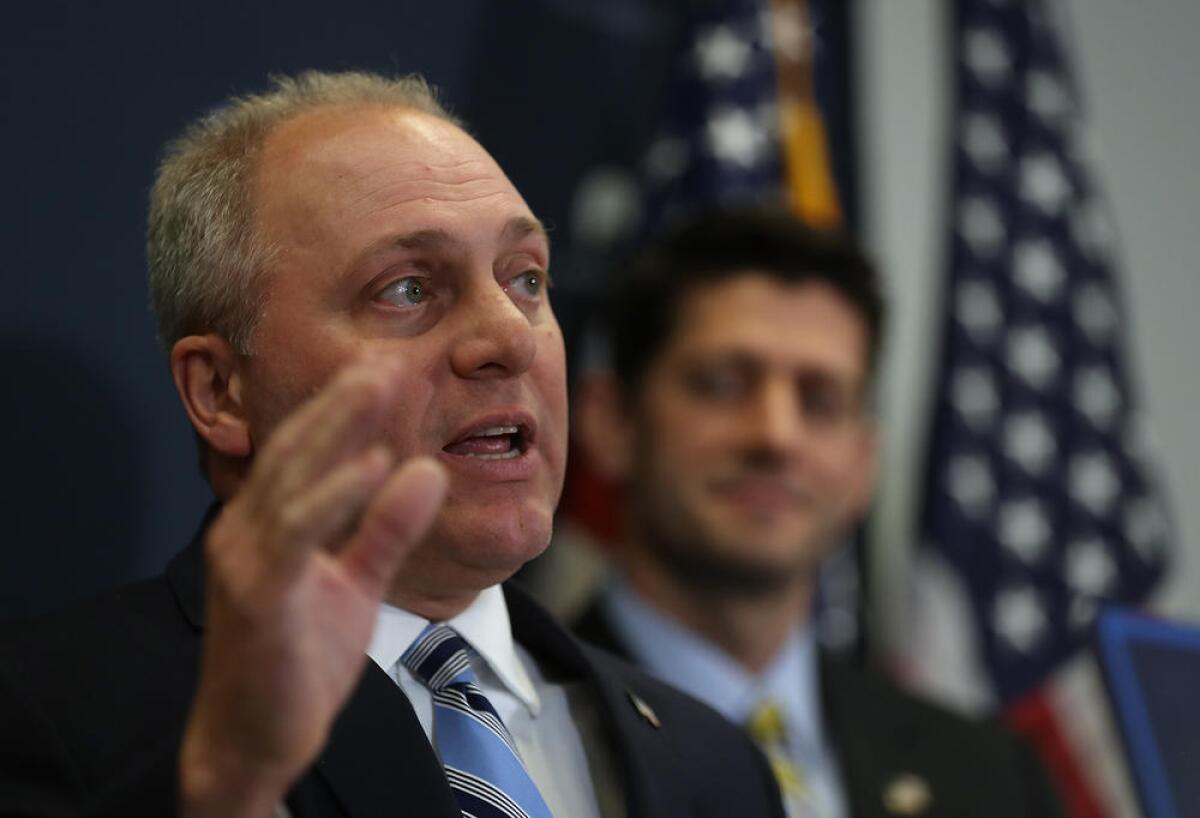
Medstar Washington Hospital Center has released an update on the condition of Rep. Steve Scalise of Louisiana, who was shot at a congressional baseball practice in Alexandria, Va., on Wednesday.
“Congressman Steve Scalise sustained a single rifle shot to the left hip. The bullet travelled across his pelvis, fracturing bones, injuring internal organs, and causing severe bleeding. He was transported in shock to MedStar Washington Hospital Center, a Level I Trauma Center. He underwent immediate surgery, and an additional procedure to stop bleeding. He has received multiple units of blood transfusion. His condition is critical, and he will require additional operations. We will provide periodic updates.”
Latest update: Scalise’s condition improves, but more operations and long hospital stay expected >>
President and first lady visit Rep. Scalise at hospital
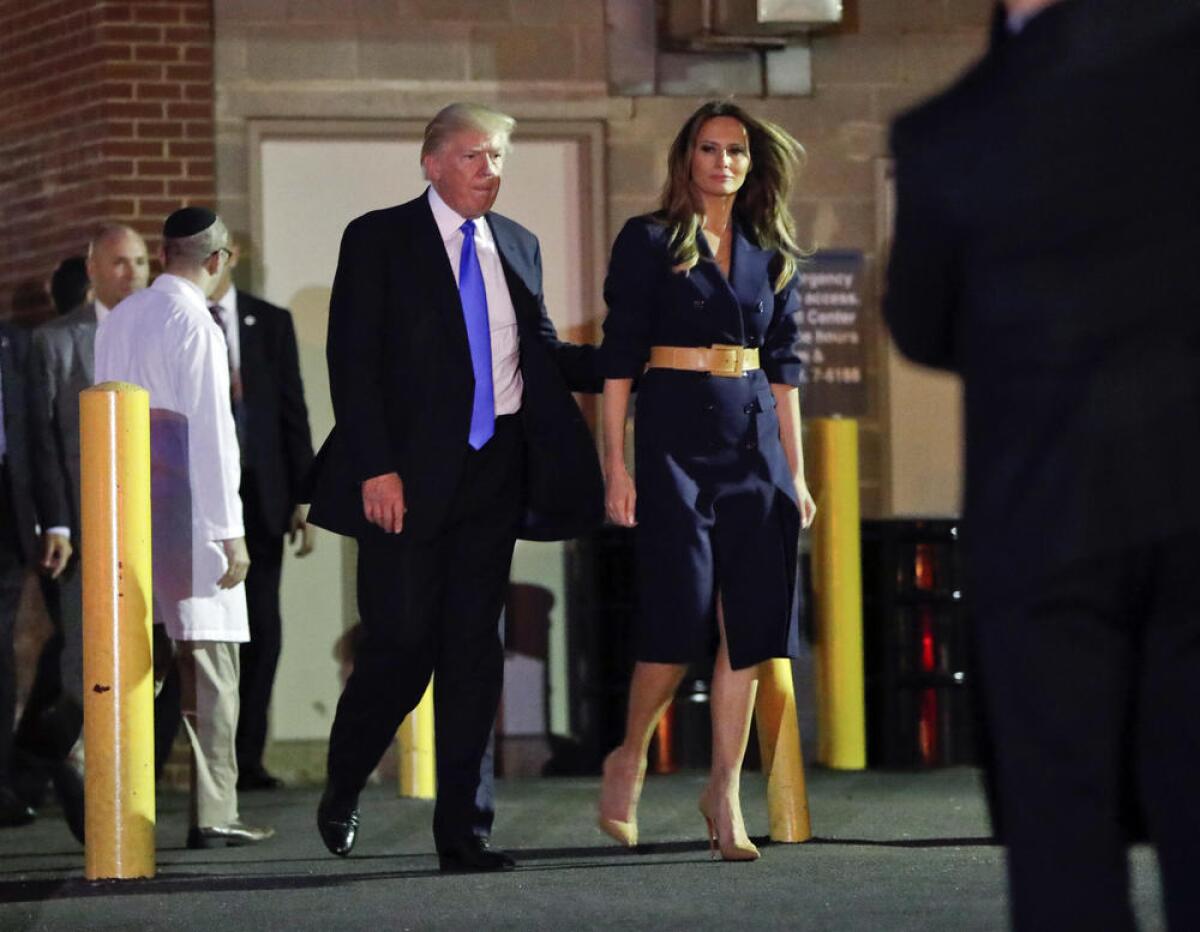
President Trump made a surprise visit to MedStar Washington Hospital Center, where Rep. Steve Scalise was being treated for his injuries after Wednesday’s shooting at a Republican congressional baseball practice.
The president and First Lady Melania Trump took two bouquets of white flowers to the hospital.
MedStar Washington said Wednesday evening that Scalise was in critical condition and would need more operations.
Scalise (R-La.), his party’s No. 3 leader in the House, was among four people wounded when a rifle-wielding attacker fired on lawmakers on a baseball field in Alexandria, Va., outside Washington. The attacker was shot by police and later died.
Obama calls Republican lawmaker after shooting at baseball field
Former President Obama called at least one Republican lawmaker after the shooting at a congressional baseball practice Wednesday, contacting Sen. Jeff Flake (R- Ariz.) to send “best wishes and prayers to those injured,” the senator said.
Flake, who maintained good relations with Obama during his presidency, rode Air Force One with Obama back home to Arizona for a service after Rep. Gabrielle Giffords was shot in 2011.
The former president wanted to let Rep. Steve Scalise, who was injured in the attack, and other Republican members of Congress “know he’s thinking about this,” Flake said.
For weeks, Alexandria shooter hung out at YMCA within sight of ball field
The Alexandria, Va., shooter apparently left his home in Illinois and spent weeks hanging out at a YMCA near the ball field where he shot at Republican congressmen and staffers.
James T. Hodgkinson, killed in a shootout with police, has been in the Alexandria area since March, FBI Special Agent Tim Slater told reporters at a news conference.
Hodgkinson would spend hours sitting in the lobby of the YMCA, staring at his laptop, said member Stephen Brennman.
Hodgkinson, 66, of Belleville, Ill., never dressed in workout clothes, but was usually dressed in polyester pants, collared shirts and a flat hat resembling a beret, Brennman says.
“I saw him over the course of weeks and weeks,” said Brennman, a lawyer with offices in Washington. Brennman, who lives in Alexandria, says he talks with everyone, to the point of people jokingly calling him the Y’s “social director.”
But Hodgkinson never looked at him and never said a word, he said.
“He was always in his own little world,” he said. “I never saw him talk to anybody.
“It’s just a friendly place, but I didn’t see him interacting with anybody at all. Just a blank stare.”
At first, Brennman said, he figured Hodgkinson was a contractor. “He looked like that kind of guy, like a guy who would come and sell you siding. Then it was like – what is he doing here?”
Brennman said he was curious but never asked staff members about him.
Former Alexandria Mayor Bill Euille, in an interview in the Washington Post, also said Hodgkinson began showing up at the YMCA weeks ago.
Hodgkinson would typically sit in one of two places, Brennman said, in the main lobby or with his back to a window. If he turned around and looked out that window, he would have had a good view of the ball field.
“The guy had to know something was going on that day. The only people I saw play baseball or softball there were kids,” Brennman said.
When he saw the shooter’s picture on CNN, Brennman said, the man looked familiar, but he couldn’t place him. “I’m in the shower, really racking my brain, and it came to me: Oh my God, it’s that guy sitting there with his laptop. I got chills all over.”
A look at the victims of the congressional baseball practice shooting
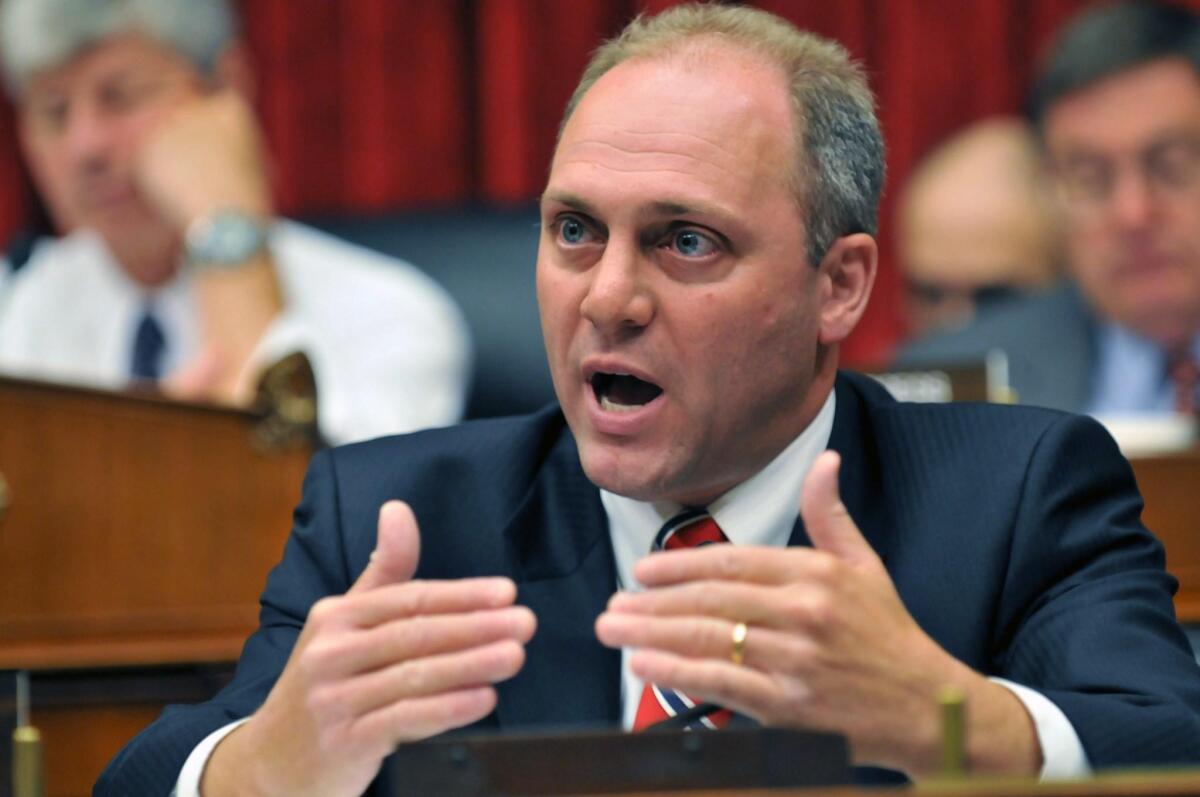
House Majority Whip Rep. Steve Scalise (R-La.) was shot and badly wounded at a congressional baseball practice Wednesday in Alexandria, Va., but he was only the best known of the victims of the attack.
Four others — including two Capitol Police officers — were also injured.
Also wounded were a former congressional staff member who works as a lobbyist and a staffer for Rep. Roger Williams (R-Texas).
How fake news starts: Trump supporters tie Bernie Sanders to Alexandria shooting using a fake quote
The gunman who attacked Republican congressional members at a baseball practice Wednesday morning campaigned for Sen. Bernie Sanders during the presidential election.
It didn’t take long for some to connect the shooting to Sanders himself. One person in particular, Jack Posobiec — a Trump supporter who has pushed the conspiracy theory surrounding DNC staffer Seth Rich’s death — especially fueled that idea.
“Just 4 days ago Bernie Sanders ordered his followers to ‘take down’ Trump,” he tweeted.
Sanders did not say that. Posobiec seemed to pull it from a CNN headline that describes Sanders’ nearly hourlong speech at Sunday’s People’s Summit.
The headline, “Sanders to faithful: Take down Trump, take over Democratic Party,” refers to Sanders’ message of resistance to the establishment rule, one that he campaigned on and since has reiterated, and his strong criticism of Trump.
Sanders called Trump “perhaps the worst and most dangerous president in the history of our country” in his speech and ended by saying, “I want you to think about the incredibly brave heroes and heroines in our history against unbelievably daunting odds who risked their lives for social justice, for economic justice, for racial justice.”
But he did not at any point say anyone should “take down” the president.
CNN anchor Fredricka Whitfield, in her description of Sanders’ speech, said he urged supporters “to take down President Trump’s agenda.”
But the mischaracterization hasn’t stopped people from retweeting Posobiec, who has hundreds of thousands of Twitter followers. The tweet also made its way to the top of “The Donald” subreddit — a discussion group for Trump supporters.
Sanders since has commented on the shooting.
“Violence of any kind is unacceptable in our society, and I condemn this action in the strongest, possible terms,” Sanders said.
Watch: Eyewitness footage of shooting at congressional baseball practice
Warning: Video contains graphic content.
Noah Nathan was walking past the Republican congressional baseball practice in Alexandria, Va., when he heard gunshots.
His recording, obtained by “PBS NewsHour,” lasts for just over five minutes. In it, roughly 64 to 66 shots can be heard.
Rep. Steve Scalise and four others were injured in the shooting.
Members of Congress say they have faced death threats, want more security
One widespread point of agreement in Congress after Wednesday’s baseball practice shooting was that the toll would have been much worse had Republican Whip Steve Scalise’s security detail not been at the playing field.
Top congressional leaders are protected around the clock by the Capitol Police, a practice that was bolstered after several incidents, including a 1998 shooting at the Capitol and the Sept. 11, 2001, terror attacks.
But now, in today’s intensely polarized political environment, more members want to reconsider their own security needs.
“Everyone’s getting a bunch of death threats right now,” said Rep. Ruben Gallego (D-Ariz.) as lawmakers exited a closed-door briefing on Capitol Hill with law enforcement officials. “A lot of members were asking for changes.”
Lawmakers feel particularly vulnerable at rowdy town hall events or when traveling unprotected away from the watchful eyes of police patrolling the Capitol complex. One lawmaker involved in Wednesday’s shooting noted that his great concern was that none of the ballplayers was armed and able to stop the shooter.
“They saved our lives,” Rep. Chuck Fleischmann (R-Tenn.) said about the Capitol Police.
Without Scalise’s security detail, “it would have been a very, very bad situation,” said Sen. Jeff Flake (R-Ariz.)
Lawmakers peppered officials at the briefing with requests for increased security and suggested they should be allowed to dip into campaign funds for protection.
No new procedures were announced after the morning shooting that left Scalise and others hospitalized. Security appeared particularly tight Wednesday at the Capitol.
Rep. Martha McSally (R-Ariz.), a former Air Force fighter pilot, said she has received death threats this year in her Tucson-area district that once was held by Rep. Gabrielle Giffords, who was shot in the head at a meeting with constituents outside a grocery store in 2011. She urged Americans, and colleagues, toward civility.
“For all the noise and all the fury, we are one family,” Speaker Paul D. Ryan (R-Wis.) said on the House floor. “Let’s just slow down and reflect, to think about how we’re all being tested right now. Because we are being tested right now.”
Two leaders of the congressional baseball teams, Rep. Joe Barton (R-Texas) and Rep. Mike Doyle (D-Penn.), were taking stock of security.
Barton said he may think twice about again taking his son, Jack, to congressional events, never having expected shooting violence at the 6 a.m. baseball practice.
Doyle said “perhaps we should” reconsider security at events where many lawmakers are present, but he said “most members will tell you they feel fine and are not seeking an increase in security.”
House Minority Leader Nancy Pelosi (D-San Francisco) noted that, other than former President Obama, she probably has had more threats on her life than any member of Congress.
“You may not know this, my colleagues, but every time I pray, which is frequently, and certainly every Sunday, I pray for all of you,” Pelosi said in remarks in the House.
Early on, she said she used to pray that lawmakers could work together, citing former President Kennedy’s inaugural address to do God’s work.
“But in more recent years, I have been praying not only for that, but for our safety,” she said.
‘It will be “play ball” tomorrow night’: The congressional baseball game will be played as scheduled
It will be ‘play ball’ tomorrow night at 7:05.
— Rep. Joe Barton, GOP team manager
Virginia shooter was ‘very irascible, angry little man,’ his lawyer says
The gunman who attacked congressmen at a ball field in a Washington suburb was a “very irascible, angry little man” with a history of charges for assault and other minor offenses, according to his former lawyer.
Lyndon Evanko, a now-retired attorney from Belleville, Ill., said he remembered James T. Hodginkson, a former home inspector and contractor, for his temper and brusque attitude toward police and neighbors.
Hodgkinson, 66, was shot and killed on Wednesday after he opened fire on Republican congressmen, staffers and others at a morning baseball practice in Alexandria, Va.
“He was a pushy little bastard, an in-your-face kind of guy,” Evanko said. “He believed what he believed and he wasn’t going to take any s--- from anybody.”
In 1993, Hodgkinson was charged with drunk driving and other traffic offenses by Illinois State Police near his home, a suburb of St. Louis. Court records show that judgment was withheld, and he spent a year under court supervision.
Hodgkinson was arrested in 2006 on a charge of battery by the St. Clair County Sheriff’s Office, court records show.
Evanko said the incident started as an argument with Hodgkinson’s foster daughter at his home. When a neighbor showed up to complain, Hodgkinson menaced him with a shotgun and apparently fired a shot, the lawyer said. Hodgkinson also cut a car seatbelt as he tried to pull the girl back into the house, he said.
The case was dismissed after witnesses did not show up at court hearings, the lawyer said.
“He was a bit of a misanthrope,” the lawyer said. “He came across as a very irascible, angry little man, but not somebody I would expect to do something like this.
“I would have clients I would suspect for doing something like this, but he’s not the one I would have pegged for it,” said Evanko, a longtime defense attorney. “He never had a felony. It was all penny-ante stuff.”
Records show that Hodgkinson allowed his inspection and contracting licenses to lapse. Evanko said he represented Hodgkinson again in 2009 when he was ticketed for doing work without the proper permits.
“Even with that, he had a temper: ‘What are they charging me for? I know what I was doing. So what if I didn’t have the paperwork?’” the lawyer said.
Senate Intelligence Committee leaders meet with special counsel
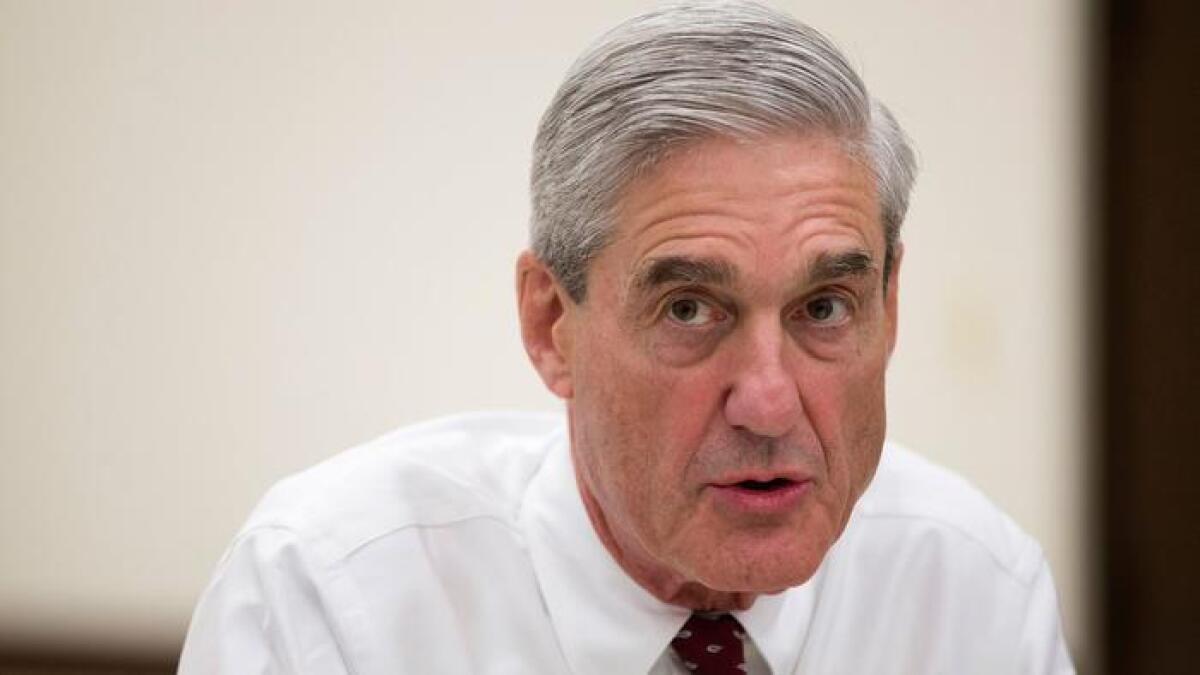
The leaders of the Senate Intelligence Committee met behind closed doors Wednesday with Robert S. Mueller III, the special counsel heading the investigation into Russian interference in the 2016 election.
Sens. Richard M. Burr (R-N.C.), the committee chair, and Mark R. Warner of Virginia, the panel’s ranking Democrat, issued a statement after the meeting calling it “constructive.”
“We look forward to future engagements,” they said.
Neither they nor Mueller released details of what was discussed.
The committee and Mueller are conducting parallel investigations, as is the House Intelligence Committee. In some past investigations, congressional committees and Justice Department investigators have clashed over access to witnesses and documents.
Both Burr and Warner have said they want to avoid similar problems in the current investigation, which is examining what the Russians did and whether any people close to President Trump or his campaign may have coordinated with them.
Here’s what we know about the Virginia shooter so far
The gunman who attacked a congressional baseball practice in Virginia on Wednesday, wounding five, has been identified as a passionate Bernie Sanders supporter and campaign volunteer who had long expressed his hatred for Republicans on social media. He was pronounced dead shortly after the attack.
James T. Hodgkinson, 66, of Belleville, Ill., had repeatedly likened the GOP to “a group of terrorists” in hyperbolic posts dating back to at least 2014.
Hodgkinson was a home inspector in downstate Illinois and a Democratic supporter who had written multiple letters to the editor of the Belleville News-Democrat in 2012, often opposing Republicans or supporting marijuana legalization.
A neighbor in Belleville, Aaron Meurer, 33, said Hodgkinson lived in a well-kept home in a rural area on the south side of town and had kept a Sanders sign in his yard during the 2016 election.
Senate overwhelmingly passes measure for tougher Russian sanctions
The Senate passed by a vote of 97-2 a measure to toughen sanctions on Russia, a rare bipartisan move intended to respond to various aggressions by Russia against the U.S.
The measure, attached as an amendment to a broader bill dealing with Iran, firms up existing sanctions against Russia and imposes new ones.
Among those targeted are a wide array of what senators called “corrupt Russian actors,” including those engaged in hacking, seizure of state resources, human rights abuses and supplying arms to the Syrian regime.
The measure also requires Congress to review any effort by the Trump administration to loosen sanctions on Russia.
The White House has not said whether Trump would sign the bill, raising the possibility of a veto standoff.
Attempts to sanction Russia for interfering in the election had stalled in Congress but gained momentum last week as the Senate began considering a separate bill to impose broader sanctions on Iran.
Democrats insisted that the Congress should also respond to Russia’s aggressions, including its annexation of Ukraine, attacks in Syria and interference in the U.S. election.
Another shooting, and once more Democrats call for gun control, while Republicans defend gun rights
It’s a recurring theme that sends partisans to their respective corners after every high-profile shooting.
Democrats call for stricter gun-control reforms, while Republicans call such efforts an infringement on the 2nd Amendment rights of citizens.
On Wednesday, hours after a gunman opened fire on members of Congress at a northern Virginia baseball field, it was much the same.
Democratic Virginia Gov. Terry McAuliffe said this wasn’t time to talk about gun control, but then essentially did just that.
“I have long advocated — this is not what today is about — but there are too many guns on the streets,” he said to reporters. He added, “I have long talked about this --- background checks and shutting down gun show loopholes. And that’s not for today’s discussion, but it’s not just about politicians. We worry about this every day for all of our citizens.”
In the wake of the 2012 mass shootings at a movie theater in Aurora, Colo., and Sandy Hook Elementary School in Connecticut, gun-control advocates pushed for new federal laws on firearms. Those efforts have stalled. Instead, many states -- Colorado, Connecticut and California, to name a few -- passed stricter laws that, among other things, placed limits on ammunition magazines and beefed up background checks.
Last year, in the wake of the shooting at Pulse nightclub in Orlando, Fla., in which a gunman killed 49 people, an effort to create stricter background checks on gun sales faltered in the GOP-controlled U.S. Senate. Polls have consistently shown strong public support for background checks.
And this year, House Republicans voted to rescind an Obama administration rule that heightened scrutiny of mentally impaired people who seek to purchase a firearm. Critics of the rule, mostly Republicans, said it would strip law-abiding citizens of their constitutional rights. Among those who voted to end the rule: House Majority Whip Steve Scalise. He was among those injured during Wednesday’s shooting.
For Scalise, he’s often touted his opposition to stricter gun-control reforms and has a earned himself an A+ rating from the National Rifle Assn.
As McAuliffe and some liberals on social media called for stricter gun-control laws on Wednesday, Republicans pushed back.
“I can only hope that the Democrats do tone down the rhetoric,” Rep. Chris Collins (R-N.Y.) said on WBEN radio. “The rhetoric has been outrageous – the finger-pointing, just the tone and the angst and the anger directed at Donald Trump, his supporters. Really, then, you know, some people react to things like that. They get angry as well. And then you fuel the fires.”
He vowed to start carrying his handgun at public events.
“On a rare occasion I’d have my gun in the glove box or something, but it’s going to be in my pocket from this day forward,” Collins said.
Why Capitol Police were with Rep. Scalise at the congressional baseball practice in the first place

The president’s Secret Service detail is a constant and visible reminder that even though the possibility of an assassination may often be out of sight, it is never out of mind.
For most members of Congress, the threat of a personal attack is less visible. They’re offered protection when they’re on the Capitol grounds, but don’t receive extra security elsewhere.
No police were present when then-U.S. Rep. Gabrielle Giffords of Arizona was shot and seriously injured while meeting with constituents in a supermarket parking lot outside Tucson in 2011. In fact, that’s often the case at such congressional meet-and-greet events around the country.
There are a few exceptions. The leadership of the House and Senate are never without protection from the Capitol Police.
Rep. Steve Scalise (R-La.), the majority whip and third-ranking GOP member of the House, is one of nine lawmakers who have security details in Washington, whether while in transit or at events like Wednesday morning’s congressional baseball practice, where he and other Republican members of Congress were targeted by a gunman.
Scalise and four others were wounded, including two Capitol Police officers who have been credited with saving Scalise’s life.
“Scalise’s security detail and the Capitol Hill police immediately returned fire, and Alexandria police also immediately came and began to return fire. They shot the shooter. The security detail saved a lot of lives because they attacked the shooter,” Rep. Joe Barton of Texas said.
Scalise had been on second base when the shooting began. Rep. Mo Brooks of Alabama described Scalise as “crawling into the outfield, leaving a trail of blood” behind him.
House Speaker Paul D. Ryan of Wisconsin identified the Capitol Police officers as David Bailey and Crystal Griner.
Shooting at congressional baseball practice ‘sounded like a war zone’
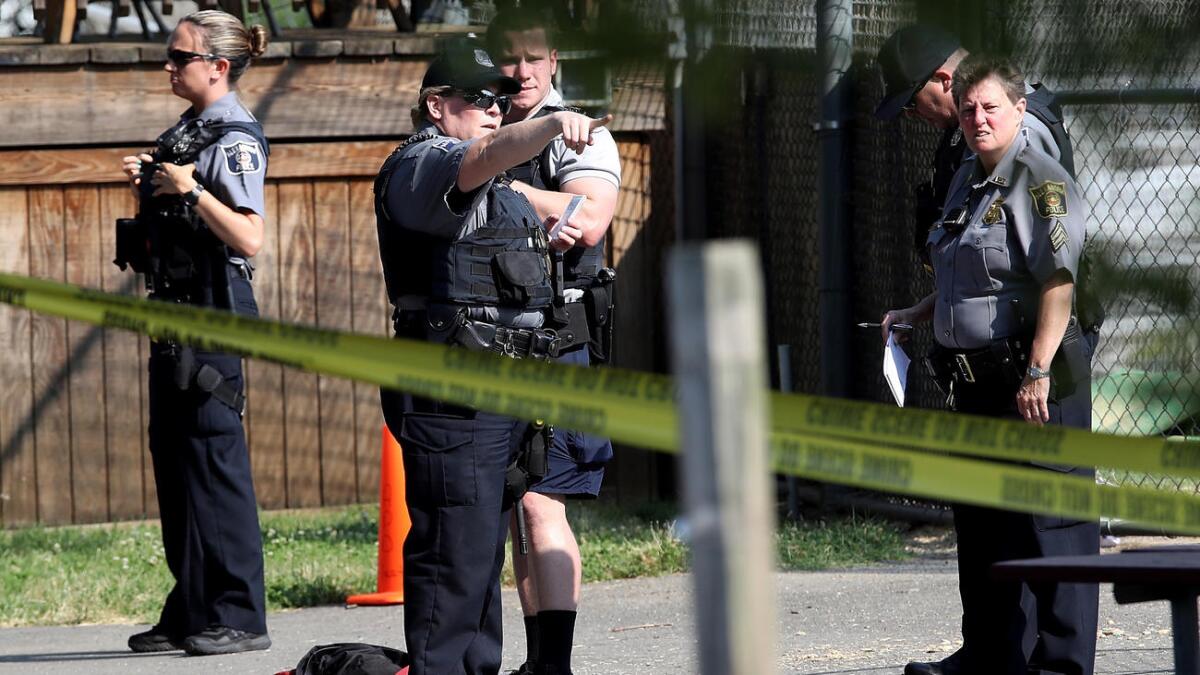
Kendra Newman was sipping her morning coffee, listening to the birds in the trees, and admiring the freshly mowed lawn behind her red brick row house when the pop of gunfire rang out -- slow and deliberate at first, then all at once.
“It was rapid and kept going and going and going,” she said. “It was clear that something was terribly wrong.”
Fearing it may be gunfire, Newman, 35, shooed her two dogs inside and ducked for cover while her fiance punched 911 into his cellphone. Within a minute or so, blaring police sirens resounded throughout the sleepy neighborhood of Del Ray in Alexandria, Va.
A firefight had broken out at the popular local park located at the end of narrow alleyway behind the couple’s shared home -- less than a block away.
“This did not sound like a simple shooting,” said Scott, her fiance, who wasn’t willing to disclose his last name. “It sounded like a war zone.”
The gunfire startled business owner John Patrick, 40, out of sleep. He sat up, but lay back down, dismissing the sounds as yet another construction project in the neighborhood. Then he overheard the squad cars amassing on the street outside.
“It was confusing,” Patrick said. “I couldn’t figure out what was going on.”
He walked out his front door into the summer heat to see the baseball field across from his home bustling with uniformed officers. As he got closer, peering through the chain link fence that ringed the field, he saw a throng of people crowded around a body on a stretcher.
A helicopter slowly emerged in the distance as a dot in the clear blue sky and descended on the outfield, kicking up a cloud of dirt and grass.
“It was a strange thing to see,” Patrick said. “This is a tight-knit, everyone-knows-everyone kind of place. You wouldn’t think this sort of thing could happen here.”
In addition to the baseball field, the park has a tennis court, dog park, and a children’s area complete with a jungle gym, a swing set and two sets of slides. It is surrounded by quaint town homes with manicured front lawns.
The shooter is said to have staged his attack in the park’s small butterfly garden, taking several steps toward the fenced-off dugout on the third-base side. He took aim and hit Scalise who was allegedly on second base.
Marion MacLean, a 68-year-old retired high school English teacher who lives next door to Patrick, believed the attack was carried out by someone who methodically planned it out.
“This is a really busy park, people are here all the time, but that was rather early for people to be out there,” she said. “Whomever carried out the attack must have known they were out there at that time.”
Democratic congressional baseball team sheltered for an hour after learning of shooting
Rep. Tim Ryan, who plays shortstop on the Democratic congressional baseball team, had a chilling thought as he and other players huddled in the dugout at Gallaudet University in northeastern D.C. awaiting word of when they could safely leave the field.
At first, “we didn’t know a whole lot other than a handful of people were hit,” the Ohio Democrat said in an interview.
Ryan said as they sheltered, players learned that GOP Majority Whip Steve Scalise had been shot, and that it was Scalise’s protective detail that stopped the shooter. Ryan said his thoughts immediately went to the lone Capitol Police officer who parks in the lot near the field during practices.
“If Scalise had a breakfast or something else this morning and wasn’t there, you would have had 15 or 20 dead congressmen and 10 dead staff people. There is nothing that would have stopped this guy,” Ryan said.
Eventually a sniper team arrived and surrounded the area to allow lawmakers to leave the dugout with protection, he said.
Just as disturbing for Ryan was the fact that Rep. Joe Barton’s children were in the dugout during the shooting. “It’s just unbelievable to think about,” he said.
His own children have helped with the team in years past, and many members bring their families to town for the event.
Organizers of the annual Congressional Baseball Game have not yet said what will happen tomorrow night when the match is scheduled to take place at Nationals Park. But Ryan said members of Congress are hoping the game is still on.
“We’re encouraging even more people to come,” he said.
Watch House Speaker Paul Ryan’s full address to Congress on the shooting at the baseball field

House Speaker Paul Ryan addressed the House of Representatives after Wednesday’s shooting at a practice of lawmakers for the annual charity congressional baseball game.
Watch: Sen. Bernie Sanders says alleged shooter volunteered for his presidential campaign
Trump calls for unity as the shooting threatens to inflame political tensions
President Trump called for unity Wednesday following the shooting at a GOP baseball practice, which wounded at least five people and threatened to increase political tensions within the country.
“We may have our differences, but we do well, in times like these, to remember that everyone who serves in our nation’s capital is here because, above all, they love our country,” Trump said in a televised address from the Diplomatic Room of the White House.
“We are strongest when we are unified and when we work together for the common good,” Trump said.
Law enforcement officials identified the gunman as James T. Hodgkinson, 66, of Belleville, Ill. The shooter died in custody as a result of wounds he suffered during the incident, Trump said.
Facebook messages that appear to have been posted by Hodgkinson regularly supported Sen. Bernie Sanders and criticized Hillary Clinton and Trump.
House Majority Whip Steve Scalise (R-La.) was shot in the hip and was in stable condition in a local hospital. Two Capitol police officers and at least two others also were wounded, Trump said.
Trump praised the response of the Capitol Police detail that was at the baseball field to protect Scalise, the third-ranking Republican in the House.
“Many lives would have been lost if not for the heroic actions of the two Capitol Police officers who took down the gunman despite sustaining gunshot wounds during a very, very brutal assault,” Trump said, adding that “everyone on that field is a public servant.”
The GOP baseball team was practicing for an annual game between Republican and Democratic lawmakers at Nationals Park in Washington. Congressional staff also were at the practice.
Trump also commended the “brave first responders” from Alexandria Police, Fire and Rescue who arrived on the scene.
The FBI is leading the investigation into the shooting.
Trump said he spoke with Scalise’s wife and pledged his “full and absolute support” for the Scalise family.
“Congressman Scalise is a friend, and a very good friend. He’s a patriot, and he’s a fighter. He will recover from this assault. And, Steve, I want you to know that you have the prayers not only of the entire city behind you, but of an entire nation and, frankly, the entire world,” Trump said.
Who is Steve Scalise? A quick look
He’s served in Congress since 2008 and has risen to the highest ranks among House Republicans.
House Majority Whip Steve Scalise represents Louisiana’s 1st Congressional District, which spans areas outside New Orleans.
On Wednesday, Scalise was among those injured when a gunman opened fire on an early-morning baseball practice attended by Republican members of Congress. He’s expected to recover.
Scalise, 51, has deep political roots in Louisiana. Before arriving in Washington, he served in both the Louisiana state House and Senate for more than a decade.
His Louisiana congressional district is reliably Republican. In November, he was reelected with nearly 75% support over his Democratic challenger.
Scalise has been a staunch supporter of President Trump. On Wednesday, Trump offered prayers to the congressman.
Scalise is married and has two daughters.
Trump to nominate Democrat Jessica Rosenworcel, a net neutrality supporter, to return to FCC
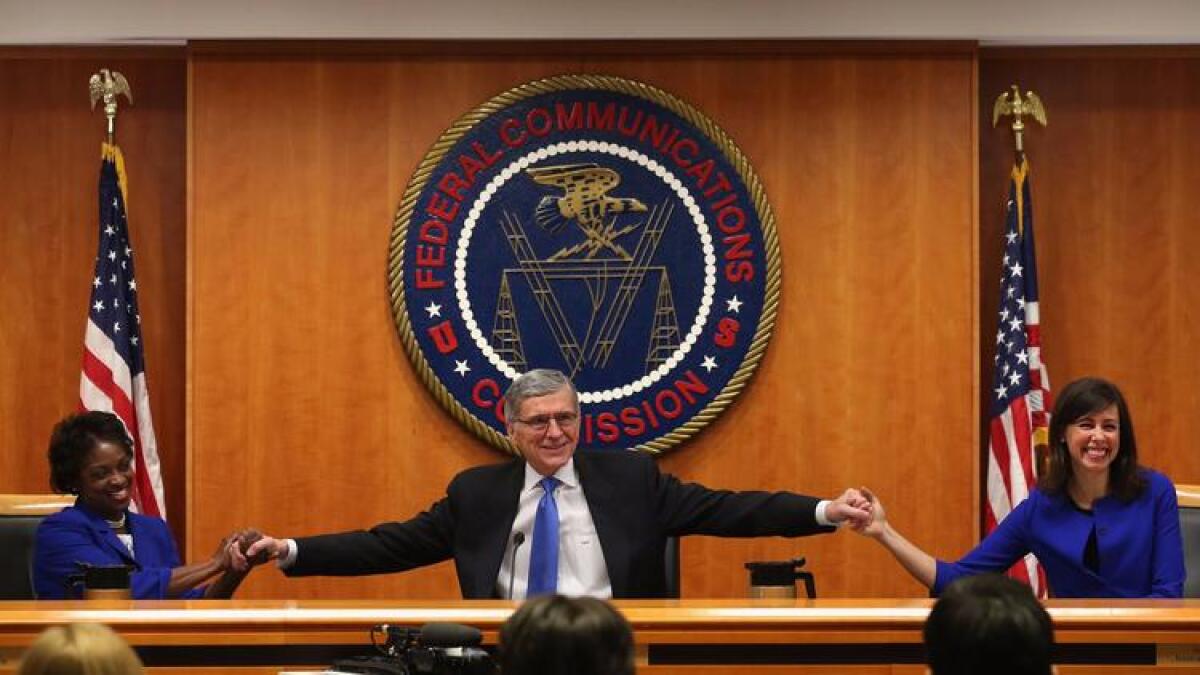
President Trump intends to nominate Democrat Jessica Rosenworcel to return to the Federal Communications Commission after her term lapsed at the end of last year because of political maneuvering.
The White House announced the coming nomination of Rosenworcel, a supporter of tough net neutrality rules for online traffic, late Monday night.
If confirmed by the Senate, she would become only the second FCC commissioner to serve nonconsecutive terms.
Her first five-year term expired in May 2016 but she was allowed to stay on until the end of the year as Democrats pushed Senate Republican leaders to allow a confirmation vote after President Obama renominated her.
On his 71st birthday, Trump expected a quiet morning and woke up to a shooting
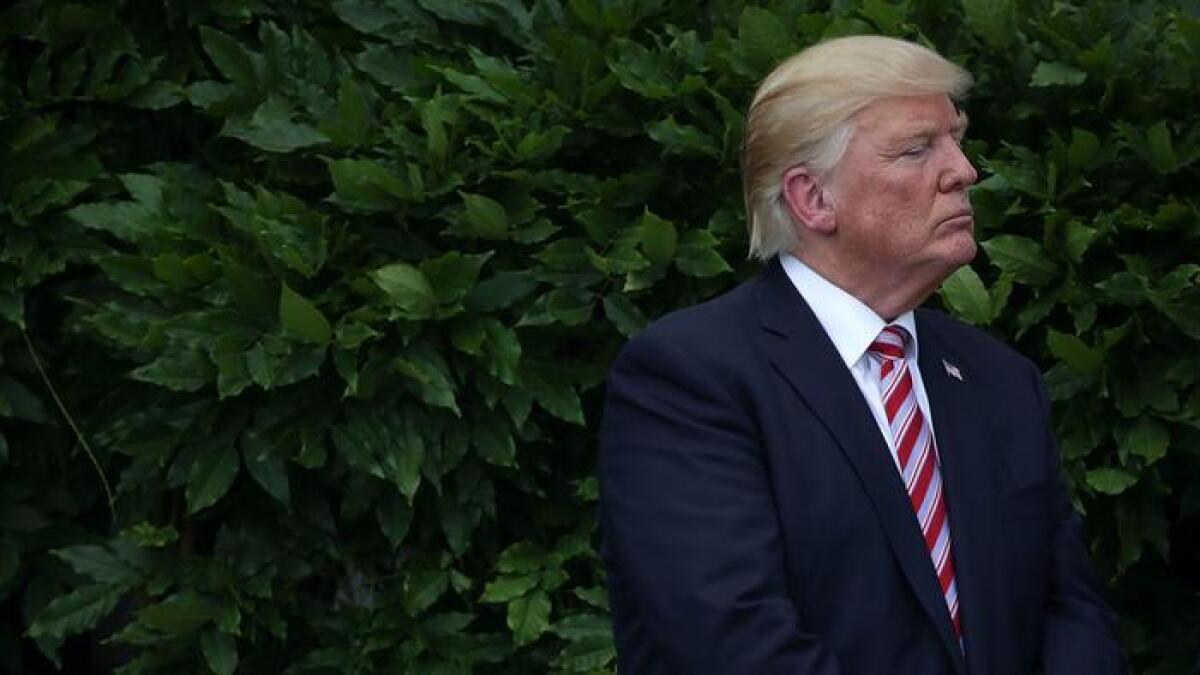
It was supposed to be a quiet morning at the White House as President Trump marked his 71st birthday, with nothing on his public schedule until the late afternoon. But that was shattered by early reports that a shooter had opened fire on Republican lawmakers and staff at a baseball practice across the Potomac River in Virginia.
White House staff canceled Trump’s scheduled public events Wednesday and scrambled to bring details to the president as he watched the developments on television, including the news that the House Majority Whip Rep. Steve Scalise (R-La.) and a congressional aide were shot.
Trump posted on Twitter shortly before 9 a.m. that Scalise, “a true friend and patriot, was badly injured but will fully recover. Our thoughts and prayers are with him.”
Scalise was shot in the hip on the ball field in Alexandria, Va., shortly after 7 a.m. and was taken to George Washington University Hospital in Washington for surgery.
Aides told reporters Trump would cancel his scheduled speech at the Department of Labor on Wednesday afternoon, and Trump’s senior advisors huddled to decide how the president would react to the shooting.
Vice President Mike Pence canceled a morning speech at the National Assn. of Home Builders in Washington to stay in the West Wing with Trump to help manage the administration’s response.
“The vice president and I are aware of the shooting incident in Virginia and are monitoring developments closely,” Trump said in a statement. “We are deeply saddened by this tragedy. Our thoughts and prayers are with the members of Congress, their staffs, Capitol Police, first responders, and all others affected.”
In the hours immediately after the shooting, Secret Service agents closed off large sections of Lafayette Park in front of the White House. By 10:30 am, the park was open to the public again, and tourists were taking photos in front of the White House fence.
Congressman’s account: ‘A routine day that turned into a nightmare’
Rep. Chuck Fleischmann (R-Tenn.) said he was just walking off the baseball field in order to beat traffic to Capitol Hill when he heard a large pop.
“I said, ‘Gosh, that sounds like a gunshot.’ Then there was a pause, and then there was just a barrage of gunshots,” he told CNN.
Fleischmann threw himself into the dugout, slightly injuring himself in the process. He and others sheltered there as the shooting continued, fearful that the gunman would approach them.
“We were really literally crying for help, and help finally did arrive,” he said. “He kept firing and firing and firing.”
He said he believed Capitol police on the scene initially only had pistols to confront the gunman.
“This was a routine day that turned into a nightmare,” Fleischmann told the network. “The fear factor was horrific. We did not know when it would end.”
GOP lawmaker tells Fox News he was approached in parking lot before the shooting
We reported to police that there was a gentleman that confronted us when we were going to our car and he wanted to know whether it was Republicans or Democrats that were out there. We said it was Republicans and he kind of started walking to the field. I don’t know if that was the guy, but I think it’s important to put that information out there and it was a little bit different than someone would do that.
— Rep. Ron DeSantis, on Fox Business Network’s “Mornings With Maria”
Members of Congress react to Virginia shooting
Rep. Steve Scalise in surgery after being shot in the hip, congressman’s office says
The office of House Majority Whip Steve Scalise (R-La.) released the following statement on his condition after this morning’s shooting.
***
This morning, at a practice for the Congressional Baseball Game, Whip Scalise was shot in the hip. He was transported to MedStar Washington Hospital Center, where he is currently undergoing surgery. He is in stable condition.
Prior to entering surgery, the Whip was in good spirits and spoke to his wife by phone. He is grateful for the brave actions of U.S. Capitol Police, first responders, and colleagues.
We ask that you keep the Whip and others harmed in this incident in your thoughts and prayers.
This office will release additional information regarding the Whip’s condition as appropriate.
Texas Rep. Roger Williams says a member of his staff was shot at baseball practice with Steve Scalise
Texas Rep. Roger Williams says a member of his staff was shot at the baseball practice in Virginia where Rep. Steve Scalise was wounded.
In a statement Wednesday, Williams said that at about 7 a.m. Wednesday, a gunman arrived at the practice and opened fire. Williams said he was not shot but that a member of his staff was and is receiving medical attention.
Williams said the gunman has been detained.
Williams, who is one of the coaches, said the Republican baseball team holds its practice every morning at 6:30 at Eugene Simpson Stadium Park in Alexandria.
House majority whip, several others, shot at congressional baseball practice
House Majority Whip Steve Scalise (R-La.) was shot at a Republican congressional baseball practice Wednesday morning by a gunman who appeared to have targeted members of Congress.
Police in Alexandria, Va., located just outside of Washington, D.C., said they were investigating a “multiple shooting” and a suspect was in custody. Five wounded people were being taken to area hospitals for treatment, the police said.
Two police officers and two or three congressional staff members were among the wounded, Sen. Rand Paul of Kentucky said on CNN.
The shooter “was going after elected officials,” Rep. Mo Brooks (R-Ala.) told CNN from the scene of the shooting. The location of the congressional practice session, in preparation for an annual charity baseball game, was well known in the area, he noted.
One person, not a member of Congress, was shot in the chest and appeared to be the most seriously wounded, Sen. Jeff Flake (R-Ariz.) told reporters.
The gunman, a white man with dark hair and wearing a blue shirt, could be seen standing with a rifle as he began shooting, Flake said. “Fifty would be an understatement,” Flake said, referring to the number of shots.
Scalise, 51, the third-ranking Republican in the House, was standing on second base, fielding balls during batting practice when the shooting began, Flake said.
“We climbed into the dugout” to shelter and treat the wounded, Flake said.
Police returned fire, and “when we heard the shooter was down,” he and others ran onto the field to help Scalise until medics arrived, Flake said.
Alexandria Police Chief Michael Brown said his officers arrived on the scene within two to three minutes and engaged the shooter.
Matthew Verderosa, chief of the U.S. Capitol Police, said police were interviewing multiple witnesses on the scene.
If police had not been at the scene “it would have been a massacre,” Paul said. “As terrible as it is, it could have been a lot worse.”
The members of Congress “practice 20 or 30 times” over a period of several weeks before the game, Paul said.
Paul said he heard perhaps 50 to 60 shots, which he said sounded like they were coming from an AR-15 or similar rifle.
Capitol Police officers were present because Scalise, a member of the congressional leadership, was there.
“We were really lucky that they were there,” he said.
The charity ballgame, played off and on since 1909, pits Democrats against Republicans in a friendly rivalry. The game is sponsored by the Capitol Hill newspaper Roll Call and raises money for three Washington-area charities. It is scheduled to take place Thursday evening before a few thousand Capitol Hill staff members, lobbyists and other members of Congress.
White House Press Secretary Sean Spicer tweeted that President Trump was aware of the shooting.
Trump tweeted that Scalise, “a true friend and patriot, was badly injured but will fully recover. Our thoughts and prayers are with him.”
UPDATES
6:22 a.m.: This post has been updated with information from an Alexandria Police media briefing.
This post originally published at 5:10 a.m.
President Trump: Rep. Steve Scalise ‘badly injured but will fully recover. Our thoughts and prayers are with him’
Trump has ‘no intention’ of firing special counsel, spokeswoman says

President Trump has “no intention” of firing the special counsel investigating Russia’s interference in the 2016 presidential election, a senior spokeswoman for Trump told reporters traveling with the president Tuesday.
“While the president has the right to, he has no intention to do so,” Deputy White House Press Secretary Sarah Huckabee Sanders said when asked whether Trump was considering firing special counsel Robert S. Mueller III.
Sanders also said that Trump saw part of Atty. Gen. Jeff Sessions’ testimony before the Senate Intelligence Committee. Trump “thought that Atty. Gen. Sessions did a very good job and, in particular, was very strong on the point that there was no collusion between Russia and the Trump campaign,” she said.
Whether Trump does, in fact, have the authority to fire the special counsel is an unsettled legal issue, but Trump appears to have been at least thinking about the idea.
Deputy Atty. Gen. Rod Rosenstein, who appointed Mueller, testified Tuesday on Capitol Hill that under Justice Department regulations, he is the only official empowered to fire a special counsel.
Asked what he would do if Trump ordered him to fire Mueller, Rosenstein said, “I’m not going to follow any order unless I believe they are lawful and appropriate orders.... It wouldn’t matter to me what anybody said.”
Christopher Ruddy, a conservative publisher and a longtime friend of Trump, said Monday that Trump was considering removing Mueller, a former FBI director who has been praised for his credibility by Republican and Democratic lawmakers.
Sanders declined to describe Trump’s current opinion of Mueller, who was named special counsel last month by Rosenstein. Since his appointment, Mueller has hired a seasoned group of investigators and former prosecutors to look into potential links between Trump’s campaign and Russian government officials.
Mueller was interviewed by Trump to be FBI director on the day before Rosenstein tapped Mueller to run the Russia investigation, Sanders said.
“I do know that he did interview him, I believe, the day before he was named as special counsel, and beyond that and what I said earlier, I don’t have anything to add,” Sanders said.
Mueller had been FBI director from 2001 to 2013. It is unclear whether Mueller was interested in returning to that job.
Last week, Trump picked Christopher A. Wray to head the bureau and replace former Director James B. Comey, who Trump fired on May 9. Wray is a former federal prosecutor who recently defended Gov. Chris Christie of New Jersey in the so-called Bridgegate scandal.
Analysis: In grinding Senate hearing, a turn in the spotlight for new senators
The latest congressional hearing into Russia’s election meddling and the Trump administration’s handling of the subsequent FBI investigation probably did little to alter Americans’ views, which have been hardening on both sides.
But for an aspiring class of new senators, President Trump’s troubles have been good fortune, desired or not, offering continual turns on a very public stage for office-holders who may harbor a desire to succeed him.
Sen. Kamala Harris of California treated Atty. Gen. Jeff Sessions as a defendant under her prosecutorial glare, to the point where she was admonished to ease up on interrupting him. Another Democrat, Sen. Martin Heinrich of New Mexico, got off one of the lines of the day when he laid a trap for Sessions and accused him of “impeding” the Senate investigation.
Sen. Tom Cotton of Arkansas, more aggressive than most Republicans, mocked the idea of the Trump administration colluding with Russia as something that would never pass muster in a spy movie. Sen. James Lankford of Oklahoma, another first-termer, offered Sessions a comfortable respite from hard-charging Democrats.
The unexpected election of Trump, and the even more unexpected series of events that have spiraled from his administration in the last four and a half months, has unhinged official Washington, now operating on a tense, what-will-happen-next footing. But for some there is advantage in the chaos.
Attorney general brings wife to Senate Intelligence Committee hearing
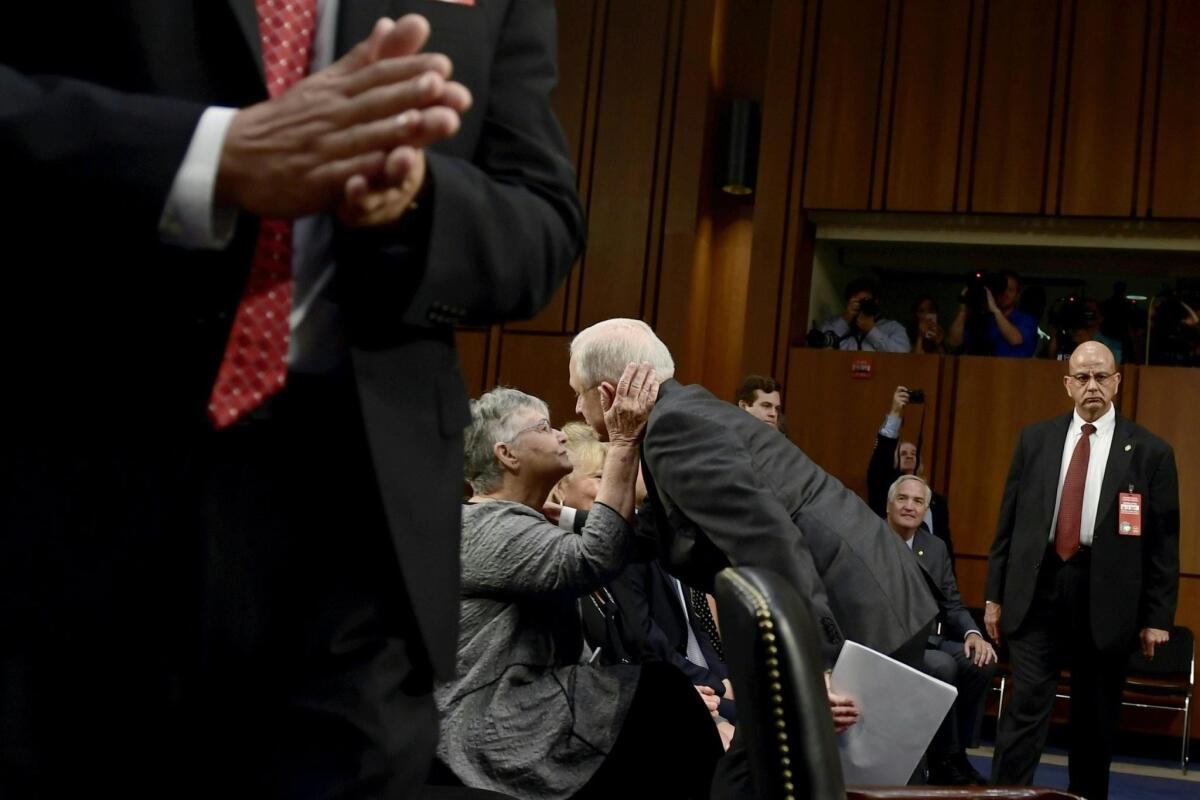
It wasn’t all grilling and testy exchanges.
Atty. Gen. Jeff Sessions’ testimony before the Senate Intelligence Committee will be remembered for its friction, but there was one light moment.
Before Sessions swore his oath, his wife of 48 years embraced him. Mary Sessions sat just behind her husband in the hearing room as the attorney general endured more than two hours of pointed questions.
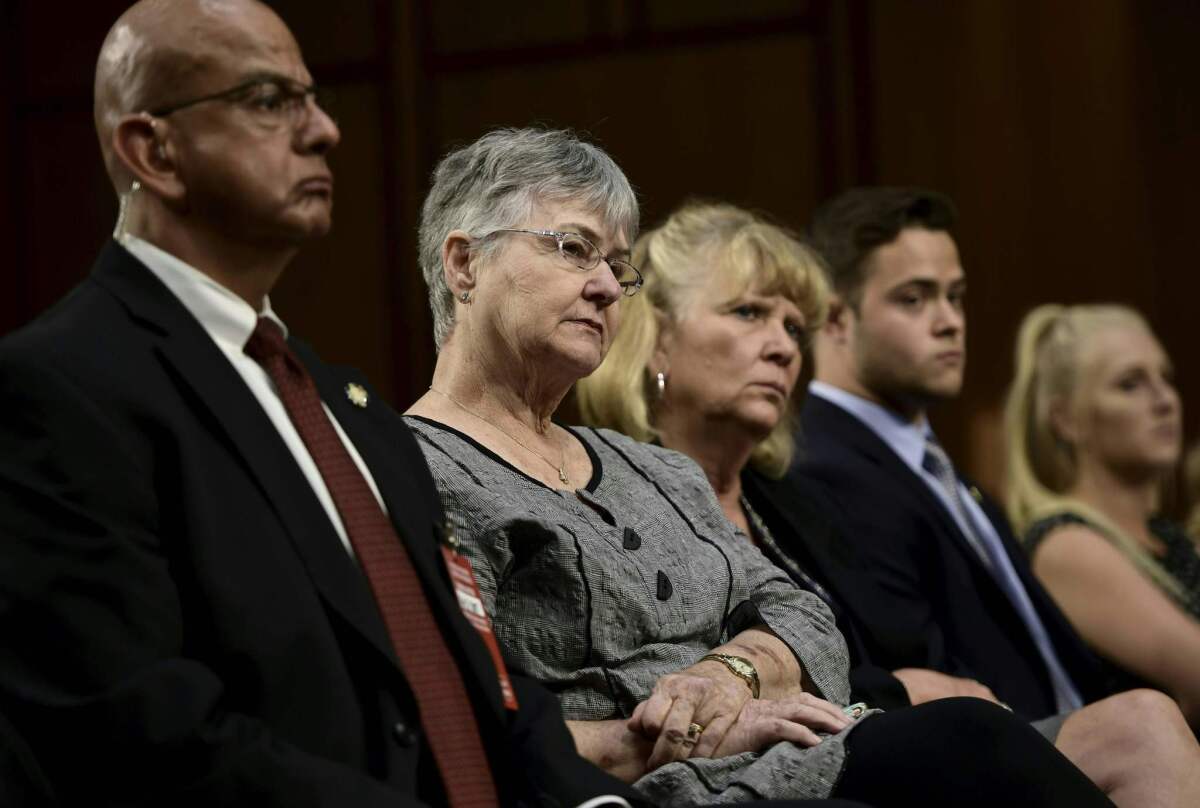
Sen. Roy Blunt (R-Mo.) took a moment to give his former Senate colleague some warm wishes and to note Mrs. Sessions was in attendance.
“Attorney general, it’s good to see you here. It’s good to see Mary,” Blunt said. “I know that there’s probably ... other places you’d both rather be today, but you’ve always looked at public service as something you did together, and it’s good to see you here together.... And know that your family continues to be proud and supportive of what you do.”
Sessions smiled and thanked the senator, adding, “I’ve been blessed indeed.”
Earlier this year, Sessions offered a similar line when testifying on Capitol Hill during his confirmation hearing. Asked whether he ever disagreed with his wife, he said no, and then corrected himself since he was under oath: only on occasion.
The savvy ways Sessions slips away from his questioners
The average American might wilt under the extraordinary heat of senatorial questioning. Jeff Sessions, the nation’s top law enforcement official and himself a former senator, is not an average American.
Parrying questions at Tuesday’s hearing by the Senate Intelligence Committee, Sessions exercised the guile that allowed him to rise to the positions of senator and then U.S. attorney general -- sometimes eating up questioners’ allotted five minutes for questioning with perambulatory answers, and responding to pressure by flashing a disarming smile or a passionate defense of his honor.
“I recused myself from any investigation into the campaigns for president,” Sessions said in his opening statement, “but I did not recuse myself from defending my honor against scurrilous and false allegations.”
In Sessions’ first back-and-forth with a Democrat, Sen. Mark R. Warner of Virginia, a fellow Southerner but a Yankee by birth, Sessions’ patient Alabama drawl slowed Warner’s rapid-fire questions. Sessions’ first four answers to Warner’s first four questions ended each time with Warner having to interrupt him to ask another question.
Warner, as the committee’s senior Democrat, got 10 minutes of time, but he questioned Sessions as if he had only five. In one exchange, Sessions began to explain, “I know nothing --”
“Do--” Warner started, but Sessions continued.
“-- about the investigation --”
“Do you believe --”
“-- and I fully recused myself --”
“I’ve got a series of questions, sir,” Warner finally said, speeding on to his next query.
Sessions let his pelagic calm break into waves once in the hearing, as he raised his voice both to defend his honor and subtly accuse anyone in the Senate who would question that honor:
“I was your colleague in this body for 20 years, at least some of you, and the suggestion --” Sessions paused for dramatic effect, as he often does -- “that I participated in any collusion, that I was aware of any collusion with the Russian government, to hurt this country? --” here Sessions inflected the word upward, as if it were a question -- “which I have served with honor, for 35 years?”
Sessions’ voice broke ever so slightly on the word “years,” and he paused for a full second before continuing.
”... or to undermine the integrity of our democratic process, is an appalling and detestable lie,” Sessions said, slamming shut his sentence with the word “lie” the way an attorney might drop a heavy book on a courtroom table during trial.
It was a dramatic moment. Sessions was basically saying some of the people who knew him best were suggesting he is a traitor. Yet moments later he slipped back into easygoing collegiality -- a common segue in debates within the Senate arena he knew so well -- referring to his interrogators as “colleagues” before genially stopping himself.
“I can’t say colleagues now,” Sessions mused, warmly. “I’m no longer a part of this body.”
Later, after Sessions repeatedly claimed that he would not answer questions about his conversations with President Trump -- citing both a Justice Department policy and the possibility that Trump could claim executive privilege -- Sen. Kamala Harris grilled him. The Californian, a newcomer who was never Sessions’ colleague, did so as Sessions sat with his fingers knitted together, his eyebrows arched.
Sessions sometimes smiled at Harris. Harris did not smile back, except when she thought Sessions wasn’t answering her questions directly.
“Sir, sir, I have just a few,” Harris said, affecting a professional smile as she tried to steer Sessions back to her preferred line of questioning about whether Sessions had failed to disclose meetings with any Russian nationals.
“Will you let me qualify it? If I don’t qualify it, you’ll accuse me of lying, so I need to be correct as best I can,” Sessions said. “I’m not able to be rushed this fast.” Sessions then squinted and the corners of his mouth turned up ever so slightly. “It makes me nervous.”
As Harris persisted, the smile faded. She pressed Sessions on his basis for declining to answer questions about his conversations with Trump. But when other senators interrupted Harris to tell her to let Sessions finish his answers, he again broke into a grin.
Besides, he didn’t have much longer to speak. Harris’ time was about to expire.
Comey versus Sessions: A side-by-side comparison of their testimony
One of the most anticipated parts of Atty. Gen. Jeff Sessions’ appearance Tuesday before a Senate committee was whether his statements would contradict the testimony of fired FBI Director James B. Comey.
Here’s a comparison of each man’s version of events.
Congress approves VA reform bill that will make it easier to fire department managers
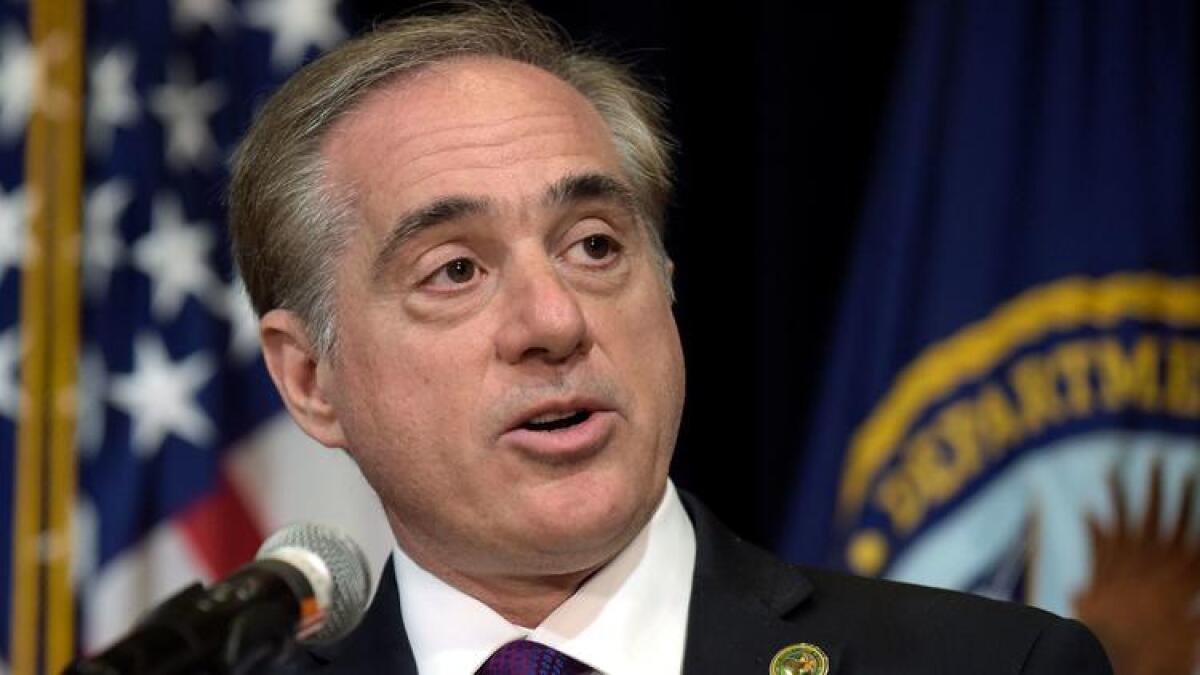
The House gave final passage Tuesday to a bill that will make it easier for the troubled Veterans Affairs Department to fire managers accused of misconduct.
But civil servant unions condemned the legislation, approved 368 to 55, as an end-run around long-standing protections for government employees and whistle-blowers.
‘I don’t recall’ is a common response from Atty. Gen. Jeff Sessions
Atty. Gen. Jeff Sessions says any claims he was involved in Russian attempts to influence the 2016 election are false.
But what about other individuals who served on President Trump’s campaign?
In testimony before the Senate Intelligence Committee on Tuesday, Sen. Joe Manchin III (D-W.Va.) pressed Sessions about the relationships other Trump aides might have had with Russians.
“To the best of your knowledge did any of the following individuals meet with Russian officials at any point during the campaign?” asked Manchin. “You can just go ‘yes’ or ‘no.’”
Here are Sessions’ responses:
Former Trump campaign chairman Paul Manafort: “I don’t have any information that he had done so.”
White House strategist Stephen K. Bannon: “I have no information that he did.”
Former national security advisor Michael Flynn: “I don’t recall it.”
White House Chief of Staff Reince Priebus: “Uh, I don’t recall.”
Trump policy advisor Stephen Miller: “I don’t recall him ever.”
Former Trump campaign manager Corey Lewandowski: “I do not recall.”
Sen. Kamala Harris leaves Sessions ‘nervous’ in interrogation over his refusal to disclose conversations with Trump
Sen. Kamala Harris of California turned her aggressive prosecutor tactics on Atty. Gen. Jeff Sessions in a tense interrogation Tuesday at a Senate hearing on Russia and the Trump campaign.
The two talked over each other as the freshman Democrat challenged Sessions to produce documents on his work as a top advisor to the campaign.
In a campaign, Sessions told her, “you’re moving so fast that you don’t keep notes. You meet people. I didn’t keep notes of my conversation with the Russian ambassador.”
Harris interrupted.
“Will you provide this committee with the notes that you did maintain?” she asked.
“As appropriate, I will supply the committee with documents,” he replied.
“Can you please tell me what you mean when you say appropriate?” she asked.
So it went for the full five minutes of Harris’ allotted time. When Sessions said he didn’t recall any conversations with Russian businessmen at the 2016 Republican convention, Harris interrupted again.
“Will you let me qualify it?” he responded in a tone of annoyance. “If I don’t qualify it, you’ll accuse me of lying. So I need to be correct as best I can. I’m not able to be rushed this fast. It makes me nervous.”
Harris, a former San Francisco district attorney and California attorney general, demanded to know what policy Sessions was relying upon when he refused to discuss his conversations with President Trump.
Sessions began describing the principle behind the policy.
“Sir, I ‘m not asking about the principle,” she said.
Sen. John McCain butted in.
“Mr. Chairman, the witness should be allowed to answer the question,” the Arizona Republican said.
Committee Chairman Richard M. Burr of North Carolina intervened.
“Senators will allow the chair to control the hearing,” he said. “Sen. Harris, let him answer.”
“The Constitution provides the head of the executive branch certain privileges,” Sessions resumed. “And one of them is confidentiality of communications.”
At a Senate hearing last week, Burr cut off Harris’ questioning of Deputy Atty. Gen. Rod Rosenstein, saying she was not letting him finish his answers.
Harris used the incident to raise campaign money, telling potential donors in an email: “Thank you for standing with me yesterday when the GOP tried to shut me down.”
Sessions can’t invoke executive privilege, but he’s using it a lot
Atty. Gen. Jeff Sessions is having a hard time shaking questions about his refusal to testify about his conversations with President Trump, which has forced him to invoke a circuitous interpretation of the president’s right to executive privilege.
Not long after Sen. Martin Heinrich (D-N.M.) grilled him about “impeding this investigation” by declining to answer questions, Sen. Angus King (I-Maine) took a shot.
It’s not up to Sessions to invoke executive privilege. It’s up to the president, making it tricky for Sessions to use that right to avoid answering questions.
“I understand” the right to executive privilege, King said. “But the president hasn’t asserted it,” King told Sessions after he refused to discuss his conversations with Trump about the firing of FBI Director James B. Comey.
“I am protecting the right of the president to exert it if he chooses,” Sessions replied.
That struck King as confusing. How could Sessions use an executive privilege that has not been invoked? “I don’t understand how you could have it both ways,” he said.
Sessions said he was keeping Trump’s options open for him. “It would be premature to deny the president a full and intelligent choice about executive privilege,” he said.
But King found an inconsistency. Sessions had just testified about a conversation with Trump, revealing that the president asked him for an opinion about Comey’s job performance before he fired him.
Sessions said he only discussed the conversation because he believed Trump had disclosed it publicly already.
“If he hasn’t, then I’m in error,” Sessions said.
“You’re being selective,” King responded.
9 key moments from Jeff Sessions’ testimony
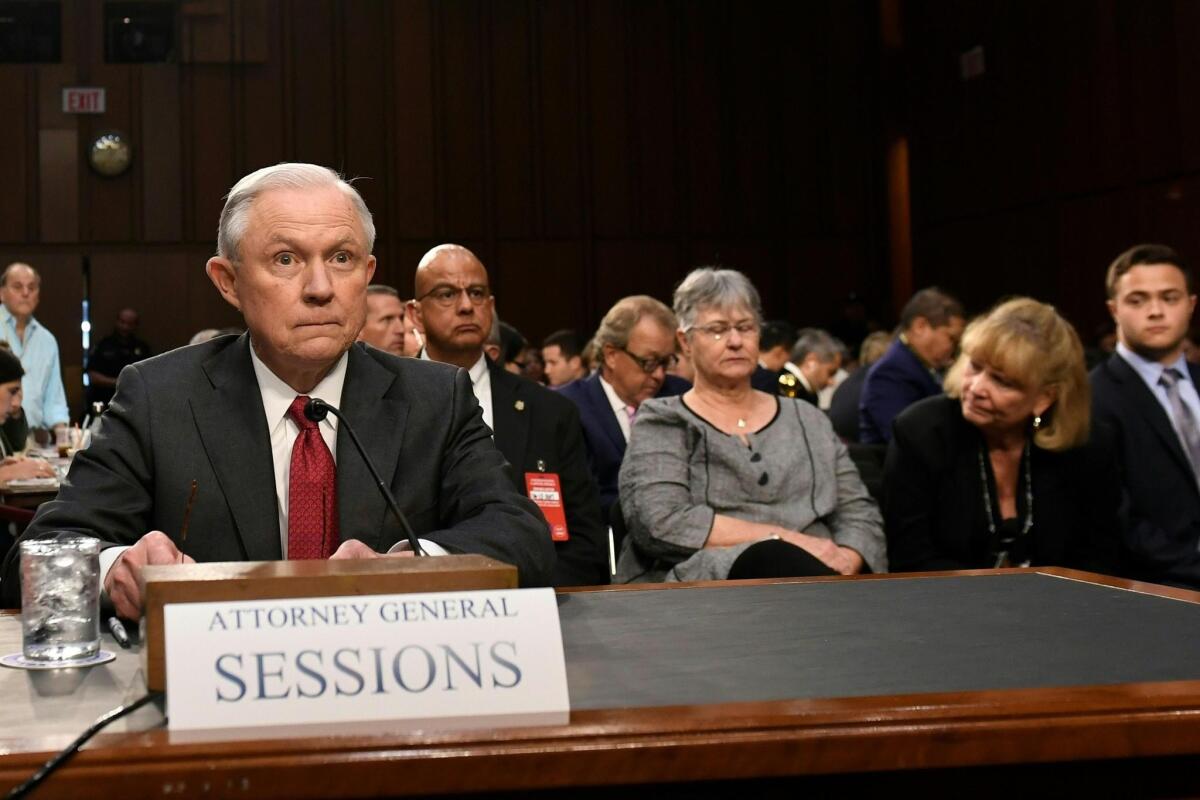
Less than a week after former FBI Director James B. Comey testified before the Senate Intelligence Committee, the spotlight turned to Atty. Gen. Jeff Sessions and his role in Comey’s firing, the Russia investigation and other issues.
Here are key moments:
Sessions does not remember meeting any Russian officials at the Mayflower Hotel
Sessions, who has acknowledged two meetings with Russian Ambassador Sergey Kislyak, said he had no recollection of meeting with him a third time during a conference at the Mayflower Hotel in Washington.
He did not rule out such a meeting, but repeatedly said he did not recall it.
“It’s conceivable that it occurred. I just don’t remember it,” he said.
Session is emphatic that he did not collude with Russian officials to influence the 2016 election
Sessions said any suggestion to the contrary was “a detestable and appalling lie.”
Sessions implies that he was recused from the Russia investigation from Day 1 on the job.
From his first day in office, Sessions said he did not receive any information about the Russia investigation.
Sessions’ reasons for firing Comey differ from Trump’s
Sessions said he had issues with Comey’s performance as FBI director, including his handling of the investigation into Hillary Clinton’s emails. Sessions said he thought the FBI needed a “fresh start” under a new leader. Trump, however, told a TV interviewer that the Russian investigation was on his mind when he fired Comey.
Sessions confirms that he was not in the Oval Office when Comey had a private meeting with Trump
Sessions’ account matches Comey’s. Both said Trump asked Sessions and other officials to leave the room before he closed the door to meet privately with Comey. Comey has testified that Trump then asked him to drop a criminal investigation of former national security advisor Michael Flynn.
Sessions confirms that he and Comey met after the Oval Office discussion and that Comey expressed concern about private meetings with Trump
Comey said he asked the attorney general to try to prevent future one-on-one meetings with Trump but that Sessions did not respond. Sessions confirned that Comey “expressed concern” about the private conversation, but said “I did respond.” He conceded, however, that he might not have addressed “everything he asked.” Both men agreed that Comey did not tell Sessions about the subject of his conversation with Trump, which Comey testified was the president’s request that he drop the FBI investigation of former National Security Advisor Michael Flynn.
Sessions insists that his letter to Trump recommending that Comey be fired did not conflict with his recusal
During one of the testier exchanges of Tuesday’s hearing, Sen. Ron Wyden, an Oregon Democratic, pressed Sessions on why he signed the letter, since he had earlier recused himself from anything to do with the Russia investigation.
“”It did not violate my recusal,” Sessions said.
“That does not pass the smell test,” Wyden responded.
Sessions refuses to answer questions about his conversations with Trump about the Russia investigation
The attorney general said he couldn’t divulge his private conversations with Trump. “I am not stonewalling. I am following the historic policies of the Department of Justice,” he said. Under questioning by Democratic Sens. Kamala Harris of California and Jack Reed of Rhode Island and Sen. Angus King, an independent from Maine, Sessions declined to specify what those precise policies are, but said the “principle” is to protect presidential confidentiality. He said the White House has not specifically invoked executive privilege to shield his conversations with Trump.
Sessions has confidence in special counsel Robert Mueller III
Amid reports that Trump is thinking of firing the special counsel who is leading the Russia investigation, Sessions was asked whether he had confidence in his abilities.
“I have confidence in Mr. Mueller, but I am not going to discuss any hypotheticals,” he said.
Sessions denies secret meeting with Russian ambassador
Atty. Gen. Jeff Sessions said Tuesday it was possible he met the Russian ambassador at a reception in April 2016 but said he did not recall any conversation between them and he denied any wrongdoing.
“I did not have any private meetings nor do I recall any private conversations with any Russian officials at the Mayflower Hotel,” Sessions told the Senate Intelligence Committee.
The FBI has been investigating whether Sessions had an undisclosed meeting with the Russian envoy at the hotel. Sessions said he was there for a Trump campaign speech, which drew several foreign ambassadors.
Sessions forcefully denied having any improper discussions with Russian officials about the 2016 presidential election, calling such suggestions “an appalling and detestable lie.”
He added, “I have never met with or had any conversation with any Russian or any foreign officials concerning any interference in any campaign or any election.,” he said.
In closed-door testimony after a hearing before the same committee last week, former FBI Director James Comey said the FBI had been looking into the intelligence that Sessions may have met with Russian Ambassaor Sergey Kisylak at the Mayflower event.
Sen. Al Franken (D-Minn.) said on MSNBC on Monday that evidence of that encounter comes in part from an intercepted conversation “between Kislyak and his people.”
Kislyak may have been exaggerating the contact, Franken said.
Sessions acknowledged having two other subsequent meetings with Kislyak, one in his Senate office and another at a speech at the Republican convention in July.
Sessions recused himself on March 2 from the FBI’s investigations of Russian meddling in the election and any improper ties between some of Trump’s campaign or White House aides and Russian authorities.
Senator accuses Sessions of ‘impeding’ Senate investigation by not answering questions
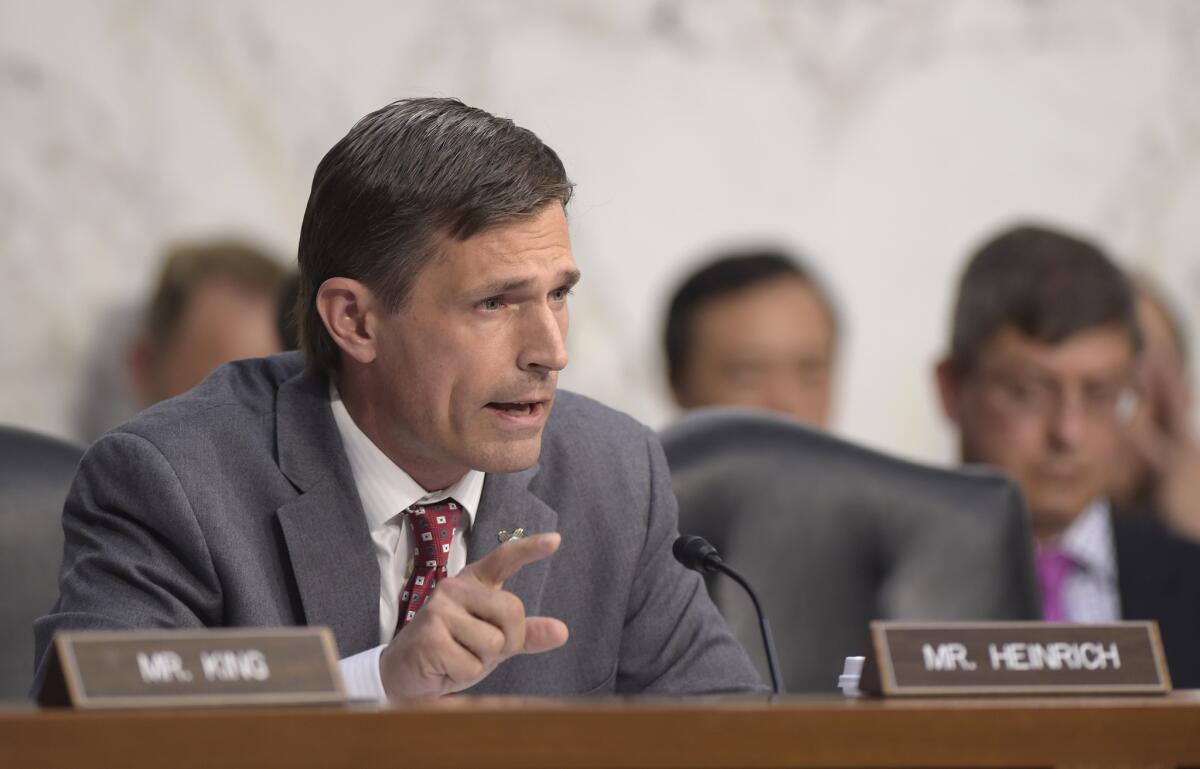
Sen. Martin Heinrich accused Atty. Gen. Jeff Sessions of “impeding” the Senate investigation by not answering questions before the chamber’s Intelligence Committee on Tuesday.
“You are obstructing” the Senate investigation, the New Mexico Democrat told Sessions, pushing the attorney general on whether he is invoking executive privilege to refuse to answer.
Sessions, who avoided claiming executive privilege during the Intelligence Committee hearing, said he is “protecting the president’s constitutional right” to confidential communications. Several administration officials over the last week have refused to answer questions from senators but have not specifically invoked executive privilege.
Sessions says recusing from Russia inquiry didn’t stop him from talking about firing Comey
While he recused himself from the investigation into Russian interference in the election, Atty. Gen. Jeff Sessions argues he didn’t step down from supervising the Justice Department – or from being able to recommend firing FBI Director James B. Comey.
Sessions said he spoke about the need to get rid of Comey with Deputy Atty. Gen. Rod Rosenstein long before a meeting about the FBI director with President Trump last month.
“It was something we both agreed to, that a fresh start at the FBI was a good thing,” Sessions told the Senate Intelligence Committee.
In his testimony, Sessions tried to push back against criticism that, by getting involved in the firing of Comey, he was breaching his pledge to recuse himself from anything to do with the Russia investigation.
“It is absurd, frankly, to suggest that a recusal from a single specific investigation would render an attorney general unable to manage the leadership” of various parts of the Justice Department, he said.
He said he agreed with Rosenstein that Comey had overstepped his authority when he held a news conference last summer to announce a decision not to charge Hillary Clinton in an investigation of her handling of government emails while she was secretary of State.
But Sessions refused to reveal his conversations with President Trump, including what the president said at a White House meeting the day before he fired Comey on May 9.
In a television interview after the firing, Trump said he had been thinking of “this Russia thing” when he fired Comey.
“I guess I’ll have to allow his words to speak for themselves,” Sessions said.
Meet Sessions’ former colleagues on the Senate Intelligence Committee
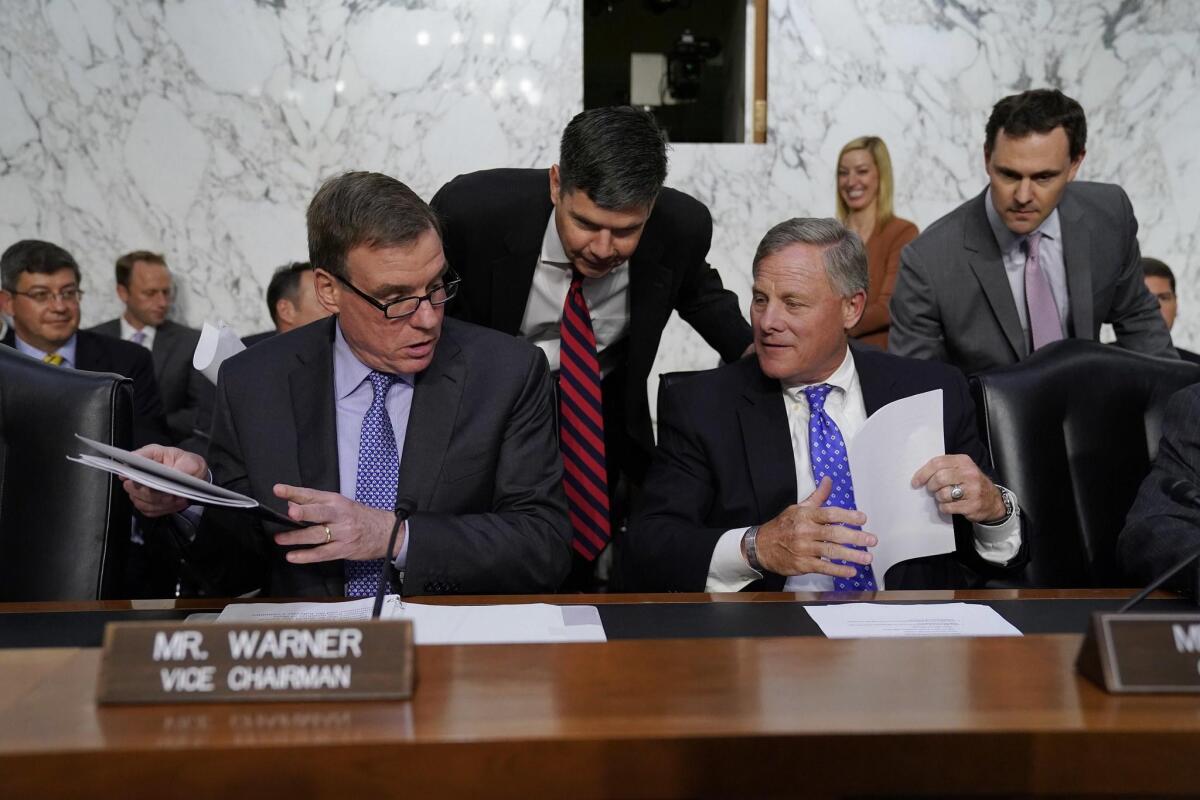
Atty. Gen. Jeff Sessions is in the hot seat today, speaking with the 15 members of the Senate Intelligence Committee.
The panel’s senators are getting high-profile introductions to the nation in recent weeks, particularly after last week’s hearing with fired FBI Director James B. Comey.
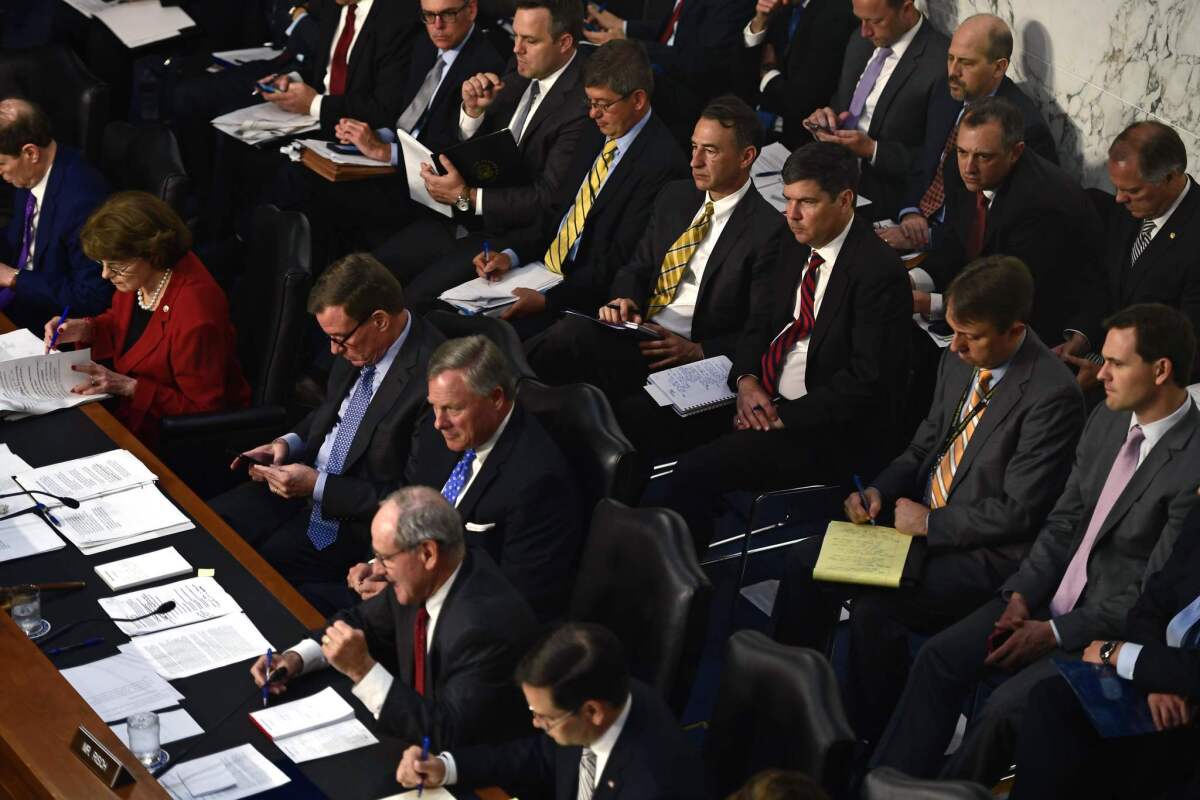
There are senators who have run for president. Both of California’s senators. Members of the Republican leadership. Someone Trump considered hiring to replace Comey.
Learn more about them.
Sessions uses Sean Spicer strategy to avoid tough question: Trump’s words ‘speak for themselves’
Atty. Gen. Jeff Sessions took a page from White House Press Secretary Sean Spicer’s book during Tuesday’s testimony, avoiding a tough question about President Trump’s comments by saying that they speak for themselves.
Sen. Dianne Feinstein, the San Francisco Democrat, asked whether Sessions knew it was Trump’s opinion that he would have fired FBI Director James Comey regardless of the official Justice Department recommendation when he signed his own letter recommending that Comey be fired.
“I guess I’ll just have to let his words speak for themselves,” Sessions said.
Spicer has relied on that phrase, and others like it, since he began working for Trump to avoid contradicting Trump or saying something that Trump might undercut later. It has become handy for many members of the administration, given Trump’s propensity for making controversial statements.
Voices raised: Sen. Ron Wyden and Sessions have testy exchange as attorney general denies ‘stonewalling’
Atty. Gen. Jeff Sessions denied “stonewalling” in his testimony to the Senate Intelligence Committee as Sen. Ron Wyden (D-Ore.) pressed him on his refusal to answer questions.
Sessions declined to elaborate about his conversations with President Trump concerning the handling of the investigation into Russian meddling in the U.S. presidential election.
But “I am not stonewalling,” he said, his voice rising. “I am following the historic policies of the Department of Justice” regarding confidential communications with the White House.
Sessions appeared frustrated when Wyden continued the line of questioning, while raising his own voice. “I can tell you that ... this is secret innuendo being leaked out there about me and I don’t appreciate it,” Sessions said.
Watch the exchange.
Analysis: ‘Passing the smell test’ and other thoughts on Sessions’ testimony
Observations from Times’ political writer Cathleen Decker on the hearing so far:
- To recap: Atty. Gen. Jeff Sessions said earlier that former FBI Director James B. Comey was fired for deficiencies. Pressed about President Trump’s having said Comey was fired because of the Russia investigation, Sessions wouldn’t elaborate.
- Sessions says he “felt comfortable” listing his criticisms in writing. When asked whether Comey’s firing was because of to Russia, Sessions again defers to Trump.
- Sen. Dianne Feinstein (D-Calif.): asks: “When you wrote your letter, did you know Trump already planned to fire Comey?” Sessions tells Feinstein that Trump’s words speak for themselves.
- Asked whether he would have “headed for the exit” had he heard any indication that the Trump campaign had colluded with Russia, Sessions lightly says: “Maybe.”
- An hour in, here are the headlines: Sessions says he can’t remember any more Russian meetings, “detestable” lies abound and Comey was uncomfortable with Trump.
- Sessions is laying all the blame on meetings with Trump on Comey, as opposed to Trump. But he also confirms Comey’s uneasiness.
- Since his first hearings before the Senate, Sessions has gone from flatly denying Russian meetings to saying he doesn’t remember. Is that from a lawyer impact?
- Sen. Mark Warner (D-Va.) was boring in on the urgency with which the administration fired Comey — there were no previous talks about supposed deficiencies, just swift action. This is the second time in which Sessions has said that Comey’s firing was because of his deficiencies. But Trump told NBC the reason for his firing was Russia. To the extent that any normal people are watching, Sessions’ explanation of Comey’s firing will seem unusual: No groundwork was laid at all, just boom.
- Tonally, Sessions is much more emotional than Comey — and in keeping with earlier hearings where he bridled at criticisms of his integrity.
- Sessions confirms that Comey came to him with concerns about President Trump’s speaking individually to him. Sessions testifies that he said to abide by the rules.
- Comey, in his testimony, suggested there was no big response from Sessions and instead was more of a whaddaya-want-me-to-do shrugging.
- Left unstated: After Comey complained about Trump, did Sessions say anything to Trump? (He said he would not describe conversations with Trump.)
Trump would have to claim executive privilege, but Sessions could speak of those talks to the committee. So far, though, he’s acting like other administration officials.
Asked why he will not answer some questions, Sessions cites “longstanding [Department of Justice] policy ... for confidential reasons,” not executive privilege.
Does Sessions support special prosecutor Robert Mueller III? “I have confidence in Mr. Mueller, but I’m not going to discuss any hypotheticals. ... I know nothing about the interview.”
Sessions cites Justice Department regulation in recusal from Russia inquiry
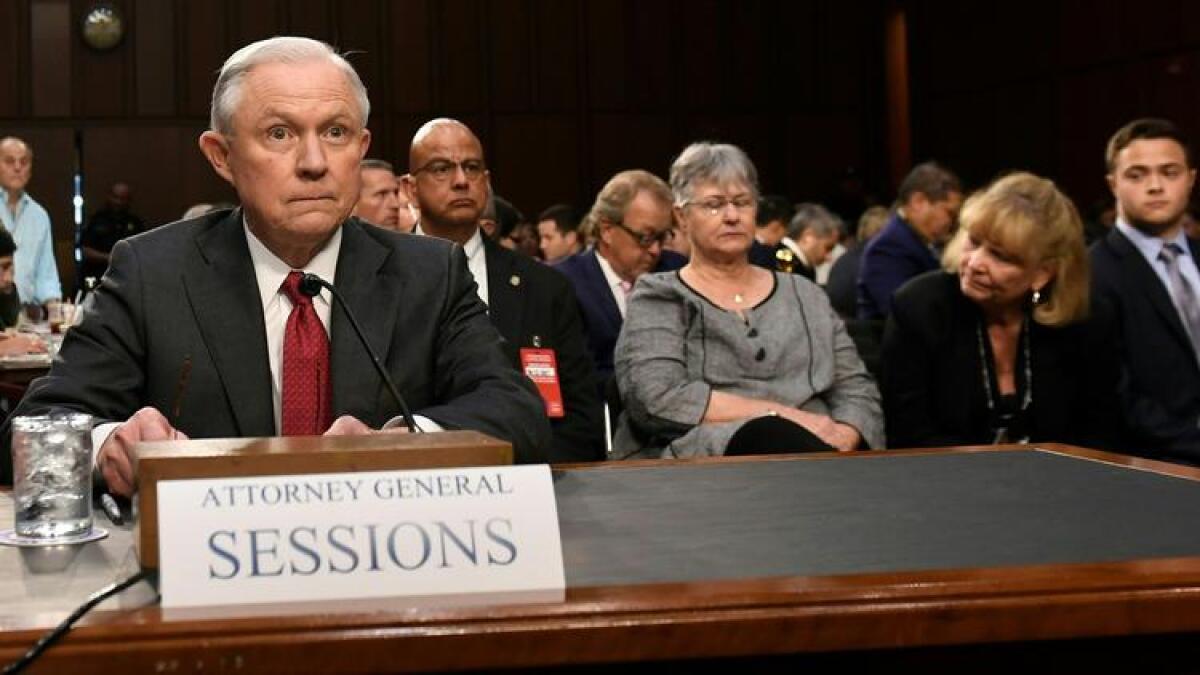
Atty. Gen. Jeff Sessions insists his recusal from any investigation into Russian collusion in last year’s election was simple: It’s the law.
In an opening statement before the Senate Intelligence Committee on Tuesday, Sessions cited a Department of Justice regulation that he said mandated him stepping aside.
The regulation, 28 CFR 45.2, notes that a Justice Department employee shall not participate in a “criminal investigation or prosecution if he has a personal or political relationship with … an elected official, a candidate (whether or not successful) for elective, public office, a political party, or a campaign organization.”
“I recused myself not because of any asserted wrongdoing on my part during the campaign,” Sessions said. “But because a Department of Justice regulation, 28 CFR 45.2, required it.”
“That regulation states, in effect, that department employees should not participate in investigations of a campaign if they have served as a campaign advisor,” said Sessions.
Throughout much of the 2016 election, Sessions served as a senior advisor to Trump’s campaign.
In March, Sessions announced he was recusing himself from any investigation into charges that Russia meddled in the 2016 presidential election and potential collusion between Russians and Trump’s campaign. Following his announcement, reports surfaced that Trump was irate that Sessions had recused himself from any investigation.
Sessions hearing draws a crowd, but the buzz doesn’t compare to Comey’s appearance
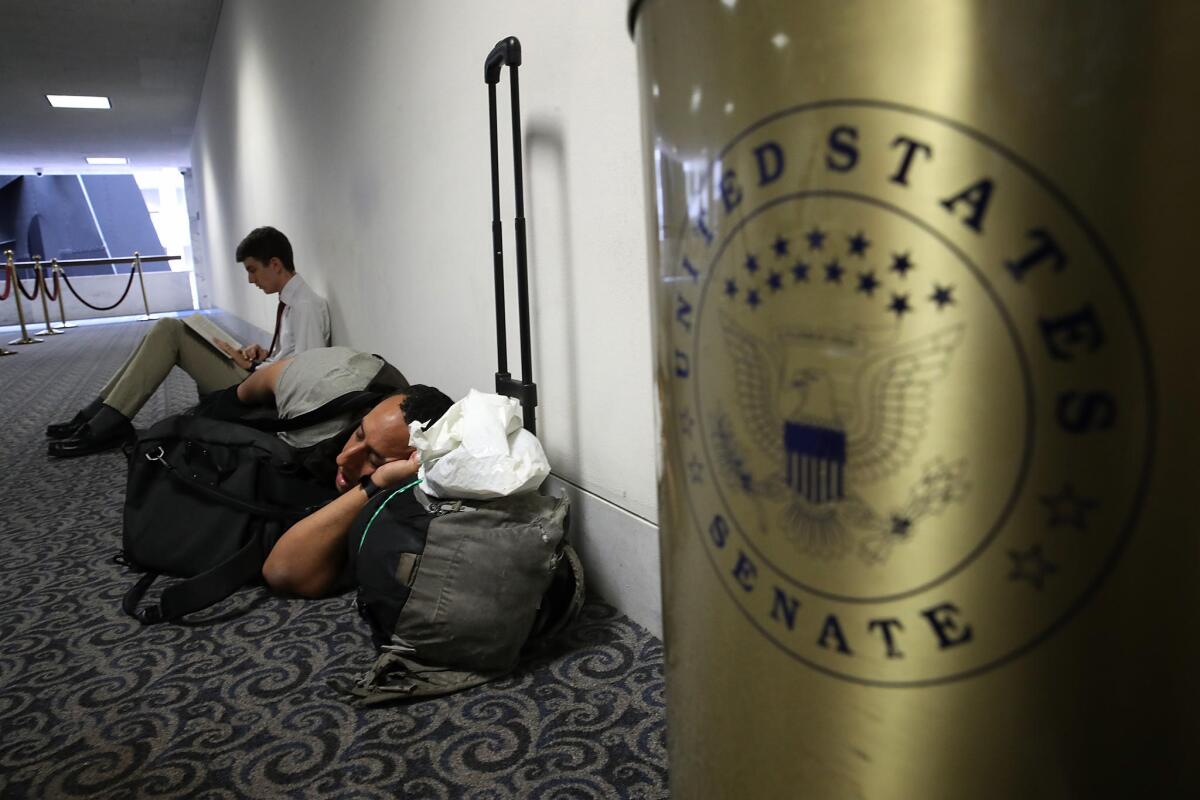
For the second time in a week, the second floor balcony of the Hart Senate Office Building was filled with police, camera crews and droves of people waiting in line for hours on end.
People arrived on Capitol Hill before daybreak last Thursday to hear former FBI Director James B. Comey testify about his interactions with President Trump in the weeks leading to his dismissal. And many returned Tuesday to hear Atty. Gen. Jeff Sessions’ version of events.
Public excitement surrounding Sessions’ testimony may not have matched that of Comey’s, but people still lined up more than two hours before the event began to get a seat in the hearing. The room was full by 2 p.m. and there was one overflow room in the Dirksen Senate Office Building.
Several people remained in line, hoping a last-minute seat would open up. Felix Cramer, 20, said he arrived around 11:45 a.m. Eastern time and just missed the cut off to enter the hearing. Cramer, from St. Louis, was visiting D.C. and said he could not miss such a “politically relevant” event because “if we want to have opinions, we have to engage.”
Isadora Connor, co-founder of Let’s Go Postal, an organization that sells packages with supplies for sending letters to legislators, used that momentum as a chance to hand out postcards to those waiting in line. Connor said people had become “exhausted” over the last couple weeks, but that the testimonies have gotten people “back in the fold” of political advocacy.
For Comey’s testimony, several D.C. bars opened early and offered drink and food specials related to the FBI and Comey. They did not repeat that offer for Sessions.
Union Pun, which offered free drinks for every Trump tweet on Comey day, tweeted that the bar was “back to normal.”
Sumer Anelli, who was in D.C. for an advocacy forum with the American Foundation for Suicide Prevention, said she had been following the investigation with audio news on her phone. But she was able to attend the hearing in person thanks to a gap in their schedule.
“It’s one of those moments where it’s going to be big enough to remember historically,” Anelli, from Nashville, said. “It’s awesome. I’m already texting everyone telling them how excited I am.”
Sessions refuses to answer questions on conversations with Trump
Atty. Gen. Jeff Sessions refused to answer Tuesday whether President Trump told him that James B. Comey’s handling of the Russia investigation was the reason he planned to fire the FBI director.
Sessions’ dodging of questions posed by Sen. Dianne Feinstein of California left it unclear whether the attorney general had honored his pledge to recuse himself from all matters involving the investigation of contacts between Russia and the Trump campaign.
The veteran Democratic senator pressed Sessions to explain why he wrote Trump a letter recommending the firing of Comey if he knew the president had already made up his mind, as Trump acknowledged in an NBC News interview.
“Do you concur with the president that he was going to fire Comey regardless of recommendation because the problem was the Russian investigation?” Feinstein asked.
“Sen. Feinstein, I guess I’ll just have to let his words speak for himself,” Sessions responded. “I’m not sure what was in his mind explicitly when we talked with him.”
“Did you ever discuss Director Comey’s FBI handling of the Russia investigations with the president or anyone else?
“Sen. Feinstein, that would call for a communication between the attorney general and the president, and I’m not able to comment on that,” Sessions told her at the Senate Intelligence Committee hearing.
“You are not able to answer the question here, whether you ever discussed that with him?” Feinstein continued.
“That’s correct,” Session said.
Feinstein declined to drop the matter. “So you’d had no verbal conversation with him about the firing of Mr. Comey?”
“Well, I’m not able to discuss with you, or confirm or deny, the nature of private conversations that I may have had with the president on this subject or others,” Sessions said.
But Sessions did tell Feinstein about his unhappiness with the way Comey handled the closing of the FBI’s investigation – unilaterally with no clearance from then-Atty. Gen. Loretta Lynch – of Hillary Clinton’s use of a private email server when she was secretary of State.
“That was really a usurpation of the authority of the federal prosecutors in the Department of Justice,” Sessions said. “It was a stunning development. The FBI is the investigative team. They don’t decide prosecution policies, and so that was a thunderous thing. He also commented at some length on the declination of the Clinton prosecution, which you shouldn’t do.”
‘I did not recuse myself from defending my honor’: Watch Atty. Gen. Jeff Sessions’ opening statement
Atty. Gen. Jeff Sessions denied reports that he had a third, previously undisclosed meeting with Russian officials. He also told the Senate Intelligence Committee any suggestion that he was involved with Russian efforts to influence the 2016 election was an “appalling and detestable lie.”
Watch his opening statement in full.
Sessions confirms testimony that Trump met privately with Comey after directing everyone else to leave Oval Office
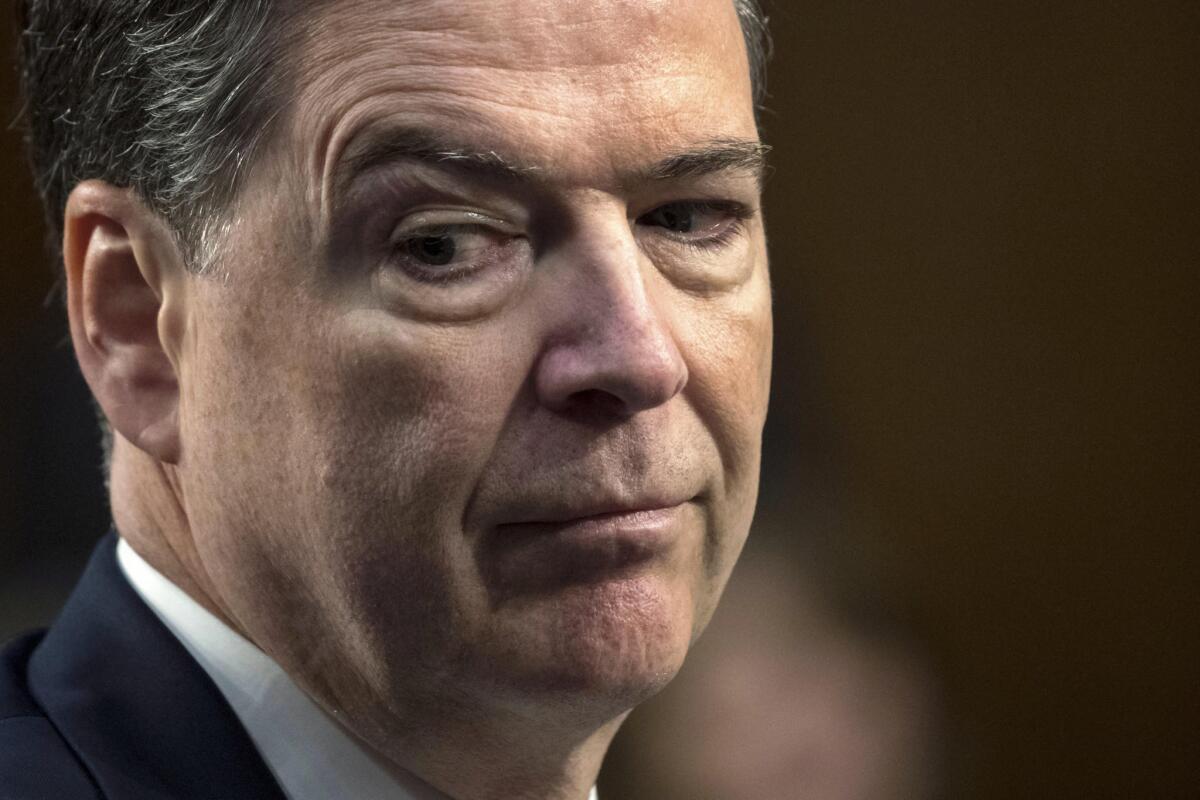
Atty. Gen. Jeff Sessions today confirmed James B. Comey’s testimony that President Trump met privately with the then-FBI chief in the Oval Office after directing everyone else to leave.
“Everyone else did depart,” Sessions told the Senate Intelligence Committee. The next day, Sessions said, Comey “expressed concern about being left alone with the president,” confirming a key part of Comey’s account of the incident. But Sessions added that Comey did not tell him the substance of the conversation he had with Trump.
Sessions says the foreign policy team he led during the campaign ‘never functioned ... as coherent team’
Atty. Gen. Jeff Sessions, who served as a top campaign advisor to President Trump, diminished his own role in crafting foreign policy during his Senate testimony Tuesday.
Sessions chaired Trump’s foreign policy advisory committee, normally a point of pride. But as the campaign’s Russia ties have come under scrutiny, Sessions sought to downplay his influence.
“We met a couple times maybe ...,” Sessions said in response to a question. “But we never functioned, frankly, Mr. Chairman, as a coherent team.”
Trump and his allies almost always characterize their work as top notch, rarely conceding any sense of dysfunction.
But during the campaign, there were multiple outside reports of disorganization, making Sessions’ claim plausible.
Sessions says he has ‘confidence in’ special counsel Robert Mueller
Atty. Gen. Jeff Sessions said Tuesday he had “confidence in” special counsel Robert S. Mueller III.
The attorney general told the Senate Intelligence Committee that “I don’t know about these reports” that President Trump might seek to fire Mueller and that he wouldn’t comment on “hypotheticals.”
But, he said, he has known Mueller for years and “I have confidence in Mr. Mueller.”
Donald Trump Jr. is live tweeting the Sessions hearing
Sessions says that ‘in effect’ he was recused from the Russia investigation from his first day in office
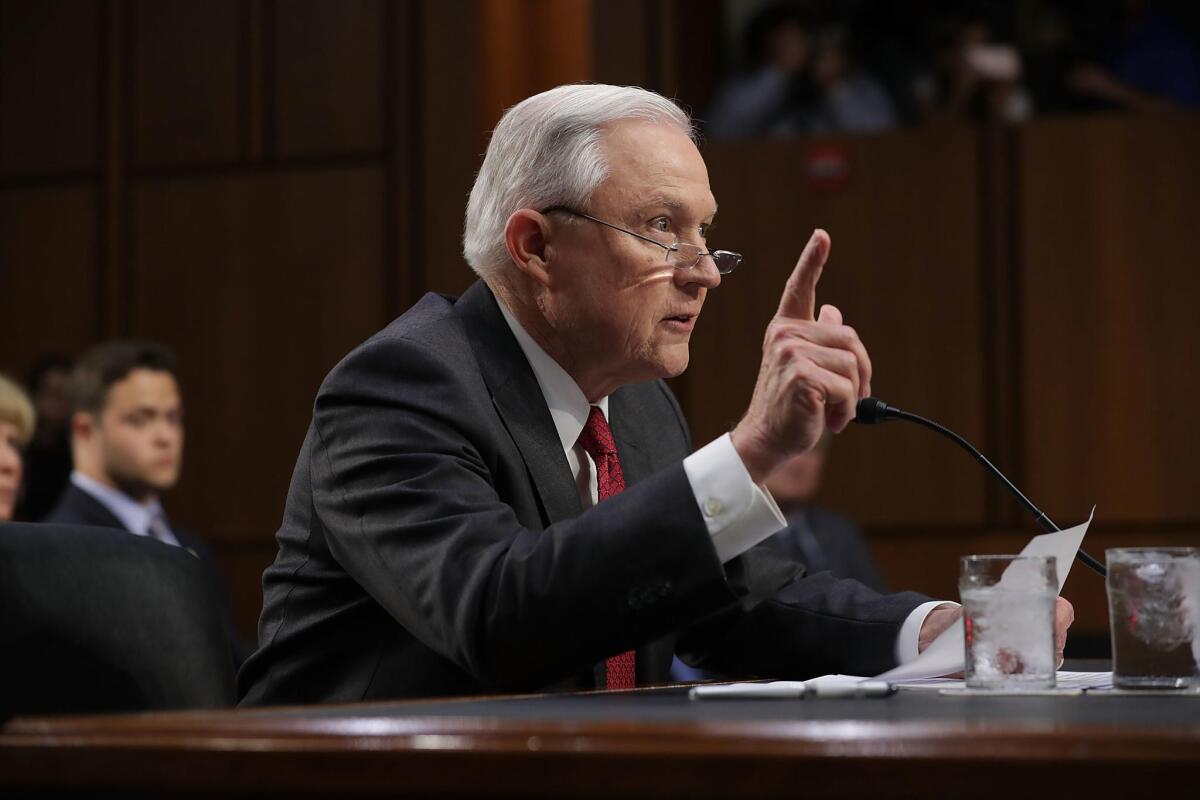
Atty. Gen. Jeff Sessions said Tuesday that he was “in effect” recused from the Russia investigation from his first day in office. “I never received any information” about the investigation,” Sessions told the Senate Intelligence Committee. From his first day in office, Sessions said, he was concerned that he might have to recuse himself because he had been a “principal advisor” to President Trump’s campaign.
Sessions says his recusal from the Russia investigation did not prevent him from involvement in the firing of FBI chief
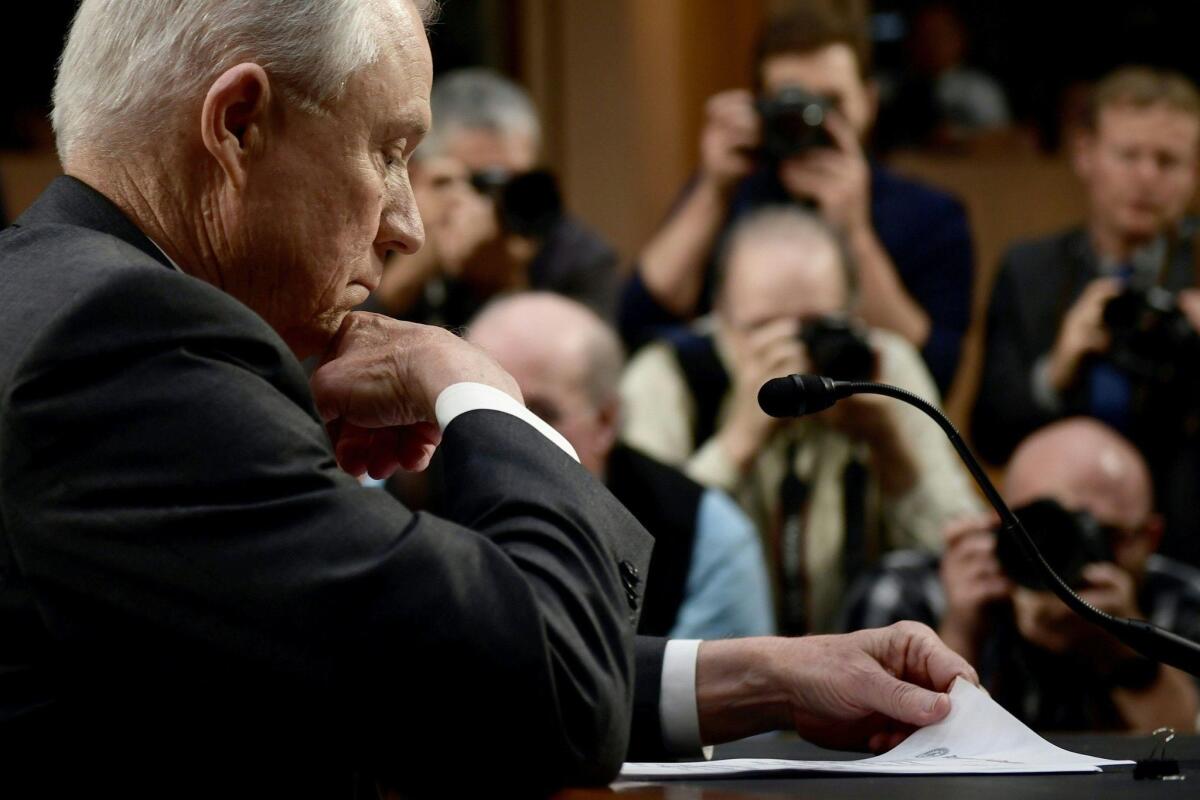
Atty Gen. Jeff Sessions said today his recusal from the Russia investigation did not prevent him from involvement in the firing of FBI chief James B. Comey.
“It is absurd, frankly, to suggest that a recusal from a single specific investigation would render an attorney general unable to manage the leadership of the various Department of Justice law enforcement components that conduct thousands of investigations,” Sessions told senators.
Sessions denies reports of a third meeting with Russian officials
Atty. Gen. Jeff Sessions today denied reports that he had a third, previously undisclosed meeting with Russian officials. In testimony before the Senate Intelligence Committee, Sessions also said that any suggestion that he was involved with Russian efforts to influence the 2016 election was an “appalling and detestable lie.”
Get to know Jeff Sessions, who served in the Senate 20 years
Atty. Gen. Jeff Sessions served four terms as a senator before President Trump selected him to lead the Justice Department.
Here’s his Congressional Quarterly biography.
- Born: Dec. 24, 1946; Hybart, Ala.
- Religion: Methodist
- Family: Wife, Mary Sessions; three children
- Education: Huntingdon College, B.A. 1969 (history); U. of Alabama, J.D. 1973
- Military Service: Army Reserve 1973-1986
- Career: Lawyer; teacher
- First Elected: 1996 (four terms)
- Latest Election: 2014 general (97.25%)
- Political Highlights before Senate: Assistant U.S. attorney, 1975-77; U.S. attorney for southern Alabama, 1981-93; Alabama attorney general, 1995-97; U.S. Senate, 1997-2017
Learn more about Sessions’ influence within the Trump administration.
Sen. Kamala Harris continues to focus on Atty. Gen. Jeff Sessions’ recusal from Russia investigation
Minutes before Atty. Gen. Jeff Sessions was set to testify before the Senate Intelligence Committee, Sen. Kamala Harris (D-Calif.) said she plans to focus on whether Sessions violated his pledge to recuse himeslf from the FBI investigation into Russia’s interference in the 2016 election.
Amid reports that President Trump was considering firing Robert S. Mueller III, the special counsel now handling the investigation, Harris said Mueller should have “full independence.”
She also repeated her call for Sessions to resign for failing to tell senators during his confirmation hearing about his own meetings with Russian officials.
During fired FBI Director James B. Comey’s testimony to the same Senate committee last week, Harris pressed Comey to say why Sessions was involved in his dismissal if it involved the Russia probe, as Trump has said.
Comey said he did not know the answer.
Senate set to vote on tougher Russian sanctions in bipartisan response to election interference
Senate leaders have struck a deal to toughen sanctions on Russia, a rare bipartisan accord amid multiple probes into Russian interference in the 2016 election and possible coordination with President Trump’s campaign.
The agreement -- the first congressional response to increased Russian aggressions -- would firm up existing sanctions and impose new ones. Among those being targeted are a wide array of what the senators call “corrupt Russian actors,” those engaged in hacking, seizure of state resources, human rights abuses and supplying arms to the Syrian regime.
Most notably, the measure would require Congress to review any effort by the Trump administration to loosen sanctions on Russia.
“No nation state should be able to attack our sovereignty without suffering an unacceptable response,” said Senate Majority Leader Mitch McConnell (R-Ky.) “Sanctions represent only one facet of our foreign policy tools.”
Votes are expected Wednesday as Republicans and Democrats join in an unusual display of bipartisanship.
“We are ensuring that the United States continues to punish President [Vladimir] Putin for his reckless and destabilizing actions,” said Senate Minority Leader Charles E. Schumer (D-N.Y.).
Schumer said the result would send a “powerful and bipartisan statement to Russia and any other country who might try to interfere in our elections that they will be punished, and that Congress will stand firm in making sure they are punished, Democrat and Republican.”
Efforts to slap sanctions on Russia for interfering in the election had stalled in Congress, but gained momentum last week as the Senate began considering a separate bill to impose broader sanctions on Iran.
Democrats balked that penalties on Iran should not take precedent over Russia for its annexation of Ukraine, attacks in Syria and interference in the U.S. election.
Negotiators agreed to add the Russia provisions as an amendment to the Iran sanctions legislation.
They also agreed to first allow a Tuesday vote of disapproval on Trump’s recent arms deal with Saudi Arabia. Senators from both parties, led by Rand Paul (R-Ky.), oppose the deal but they do not appear to have enough votes to stop it.
Anticipation builds for Sessions testimony
Ryan tells Trump: ‘Let Robert Mueller do his job’
House Speaker Paul D. Ryan urged President Trump to allow special counsel Robert S. Mueller III to continue the Russia investigation, even as GOP leaders grew visibly frustrated Tuesday over questions thatTrump might fire the investigator.
Even so, Ryan and Majority Leader Kevin McCarthy (R-Bakersfield) both dismissed questions about a possible firing as “rumor,” as reporters peppered the leaders with questions at a news conference that was supposed to be about the House GOP agenda.
The speaker said Trump would be “vindicated” if he kept Mueller on the job and allowed the Russian investigation to continue.
“The best thing to do is to let Robert Mueller do his job,” Ryan said. “I think the best vindication for the president is to let this investigation go on independently and thoroughly. That, to me, is the smartest thing to do, the best thing to do, and that’s what I think hopefully will happen.”
Pressed as to whether he had conveyed that advice to the White House or if Congress would intervene, Ryan and McCarthy snapped back, shooting down the questions as “rumor.”
“You’re creating a debate that’s not occurring here. This is something that I think was a rumor,” Ryan said.
The pushback came as Republicans in Congress struggle to make legislative gains amid federal investigations into the Trump campaign’s possible cooperation with Russian interference in the 2016 election.
Ryan has previously defended Trump’s behavior in the firing of FBI Director James B. Comey, saying the president entered the White House without previous political experience and was “new at this.”
House Republicans huddled behind closed doors Tuesday at the Republican National Committee as lawmakers face a potentially daunting political climate heading toward the 2018 midterm elections.
They want to show voters they are making good on promises to repeal the Affordable Care Act and cut taxes, though both initiatives have stalled.
The party in power often suffers during midterms if voters are dissatisfied with the White House, and Trump’s approval rating has been sinking.
Firing Mueller would be ‘catastrophic,’ Feinstein says
I do believe it would be catastrophic.
— Sen. Dianne Feinstein, on the prospect of the president firing special counsel Robert S. Mueller III
Deputy Atty. Gen. Rosenstein: No reason to fire Mueller as special counsel
Amid reports that President Trump is considering firing the special counsel overseeing the Russia investigations, a senior Justice Department official said Tuesday that he - and not the president - is the only official empowered to dismiss the prosecutor and that he sees no reason to do so.
Deputy Atty. Gen. Rod Rosenstein, the No. 2 official at Justice, also promised that the special counsel, former FBI Director Robert S. Mueller III, would have the independence to pursue the investigation as he saw fit.
On Monday, Christopher Ruddy, a longtime Trump friend, said in an interview on PBS that he had just come from the White House and that the president was “considering, perhaps, terminating the special counsel.”
Firing Mueller after a month in the post would be an explosive political step and inevitably raise concerns that the president was trying to obstruct an investigation affecting the White House.
Rosenstein took over the investigation when Atty. Gen. Jeff Sessions recused himself from any dealings with the Russia probe on March 2 after his own dealings with Russian officials was disclosed.
After Trump fired FBI Director James Comey on May 9, Rosenstein appointed Mueller as a special counsel to oversee the FBI investigations into Russia’s attempts to interfere with the 2016 election, and any signs of collusion between the Trump campaign and Moscow.
Under Justice Department regulations designed to ensure a measure of independence for the special counsel, Rosenstein may only fire Mueller for “good cause.”
During a hearing on Tuesday before a joint House and Senate appropriations subcommittee, Rosenstein was asked whether he had seen any evidence of that.
“No, I have not,” he said. “You have my assurance that we are faithfully going to follow that regulation, and Director Mueller is going to have the independence he needs.”
Rosenstein said that, under the special counsel regulations, he is the only department official with the authority to get rid of Mueller.
Asked what he would do if Trump ordered him to fire Mueller, Rosenstein said, “I’m not going to follow any order unless I believe they are lawful and appropriate orders…It wouldn’t matter to me what anybody said.”
He said Sessions is not involved in the Russia probe and has not been briefed on it since his recusal.
“He actually does not know what we’re investigating and I’m not going to talk about it publicly,” he said.
Trump may not have the legal power to fire Mueller, the special counsel

President Trump is at least thinking about firing special counsel Robert S. Mueller III, according to a close confidant of the president’s who visited the White House on Monday.
Leading Republicans, including House Speaker Paul D. Ryan, have made it clear they see no reason to remove Mueller and would prefer he be allowed to finish the probe.
But suppose Trump ignores their advice. Does he actually have the legal power to fire the special counsel, who is leading the investigation into Russian interference in the 2016 election and examining possible coordination by Trump’s associates?
That’s an unsettled legal issue.
The Justice Department has detailed regulations covering the powers of a special counsel, how one can be appointed and when one can be fired. Those regulations specify that a special counsel can be fired only for “misconduct, dereliction of duty, incapacity, conflict of interest, or for other good cause, including violation of departmental policies.” The reason must be stated in writing and only the attorney general can actually carry out the firing.
In this case, because Atty. Gen. Jeff Sessions has stepped aside from any role in the Russia investigation -- recusal is the legal term -- Deputy Atty. Gen. Rod J. Rosenstein serves as acting attorney general for all matters related to the special counsel. So under the regulations, he’s the ultimate decision maker.
That much is pretty clear. After that, the questions start.
As Jack Goldsmith, a Harvard Law professor and former top Bush administration Justice Department official, wrote in a blog post, an important constitutional issue exists on whether the president’s authority over executive branch officials can be limited that way.
Trump might assert he has authority to fire Mueller on his own, courts might or might not agree.
The president might also assert that proper cause exists to fire Mueller. Already, some of his allies have suggested that Mueller has a conflict of interest. Their argument, ironically, involves the fact that Mueller’s law firm has represented members of Trump’s family. However, the Justice Department ethics office already has ruled that is not a conflict.
Another possibility would be for Trump to order Rosenstein to fire Mueller. If Rosenstein refused, Trump could fire him and move on to find another Justice Department official who would say yes. That scenario would be similar to the “Saturday Night Massacre” in which President Nixon ordered the firing of the Watergate special prosecutor, Archibald Cox. The two top officials of the Justice Department quit in protest rather than carry out the order.
The shortage of Senate-confirmed officials at the Justice Department who would potentially have the authority to carry out such an order would complicate matters further if Rosenstein were to refuse. On Tuesday, Rosenstein signaled at a hearing that he would fire Mueller only for good cause and that he saw no reason currently to do so.
Finally, there’s the question of whether Congress would consider a move to fire Mueller an impeachable offense. In Nixon’s case, “abuse of power,” rather than specific criminal acts, formed the basis for several articles of impeachment. What constitutes such an abuse is a political issue more than a legal one, so a lot might depend on public reaction.
North Korea releases imprisoned American student; 22-year-old reportedly in coma
North Korea on Tuesday released an American student imprisoned there and sentenced to hard labor, the State Department announced.
The University of Virginia student, Otto Warmbier, had been sentenced to 15 years hard labor after being convicted in Pyongyang for acts against the state.
Warmbier’s announced release came as former basketball star Dennis Rodman arrived in North Korea for the latest of his visits to the isolated country. As he traveled, he was asked whether he planned to advocate on behalf of four Americans detained in North Korea, and he said that that was not his “purpose.”
“At the direction of the president, the Department of State has secured the release of Otto Warmbier from North Korea,” Secretary of State Rex Tillerson said in a statement. “Mr. Warmbier is en route to the U.S. where he will be reunited with his family.”
The Washington Post reported from Tokyo that Warmbier was in a coma and being medically evacuated.
Warmbier, 22, was last seen tearfully begging for mercy in a video on the day of his conviction in March 2016 after an hourlong trial. His alleged offense apparently stemmed from having taken a political poster from a building wall in Pyongyang.
“The Department of State continues to have discussions with the DPRK [North Korea] regarding three other U.S. citizens reported detained,” Tillerson added.
He said the department would have no further comment “out of respect for the privacy of Mr. Warmbier and his family.”
How to watch Jeff Sessions testify before the Senate Intelligence Committee
Atty. Gen. Jeff Sessions is scheduled to testify today before the Senate Select Committee on Intelligence.
If you’re planning to watch or just want to catch up on the story, we can help:
Meet the members of the committee. Sessions’ former Senate colleagues are expected ask him about his meetings with Russian diplomats, as well as President Trump’s firing of James B. Comey as FBI director and Comey’s account of his interactions with the president.
How influential is Sessions in the Trump White House? His reach can be found throughout the Trump administration.
Confused about how many investigations are in the works? This explainer will help sort things out.
Join us at 11:30 a.m. for a live stream of the Sessions hearing and commentary and analysis from our veteran political writers.
Mnuchin calls for major rollbacks of Dodd-Frank financial reforms
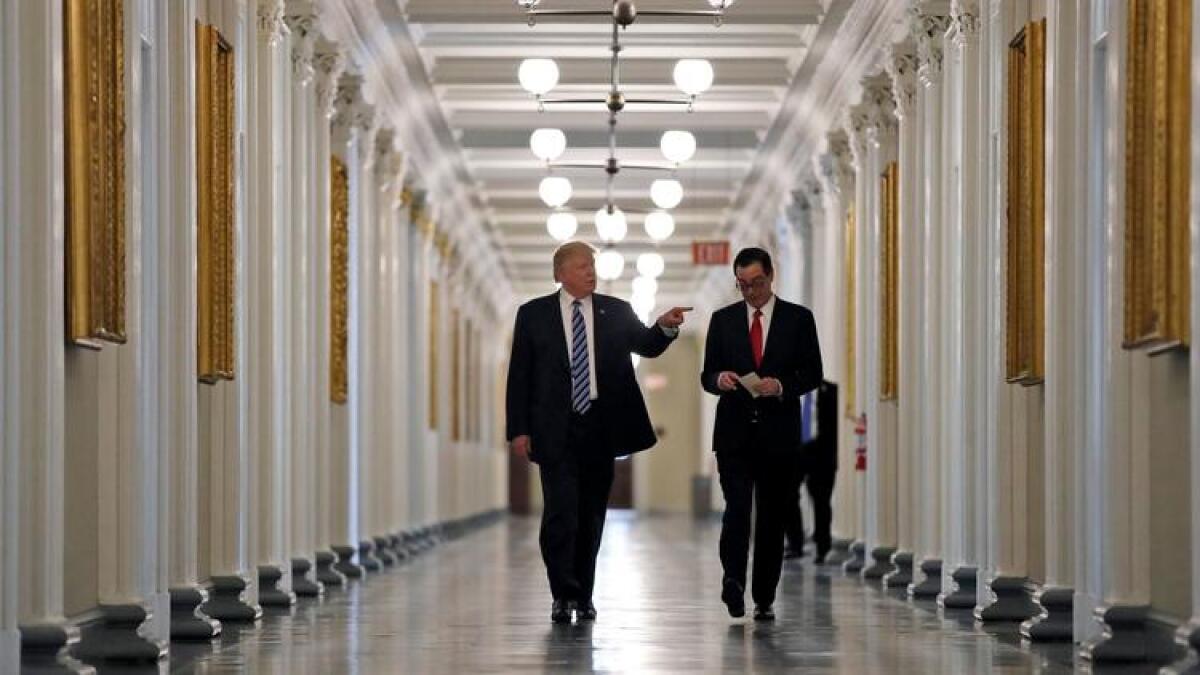
Treasury Secretary Steven T. Mnuchin on Monday proposed sweeping changes to the tough Dodd-Frank regulations put in place after the 2008 financial crisis, including a major reduction in the power of the Consumer Financial Protection Bureau and other rollbacks long desired by Wall Street.
In a 149-page report ordered by President Trump, Mnuchin also recommended reducing oversight of large financial institutions, providing even more regulatory relief for smaller banks and loosening new mortgage restrictions designed to prevent a repeat of the subprime meltdown.
The report was the Trump administration’s first formal salvo in what’s expected to be a long and complex process involving Congress and federal agencies to try to scale back regulations that Republicans have complained are harming banks and stifling economic growth.
Trump friend says president might fire special counsel Robert Mueller

A close friend of Donald Trump’s said the president “is considering perhaps terminating” special counsel Robert S. Mueller III, fueling speculation that has been building in Washington that Trump could intensify the struggle over the Russia investigation.
“I think he’s weighing that option,” Christopher Ruddy, the chief executive of Newsmax, a conservative website, told PBS’ “NewsHour” on Monday. “I think it’s pretty clear by what one of his lawyers said on television recently.”
“I personally think it would be a very significant mistake,” Ruddy added.
Ruddy’s mention of “one of his lawyers” appeared to be a reference to Jay Sekulow, a lawyer who appeared on ABC’s “This Week” program on Sunday and implied that Trump was considering the idea.
Who is Christopher Ruddy, and why does he know what the president is thinking?>>
Whether Trump has the legal authority to fire Mueller is untested. Justice Department regulations say that a special counsel can be fired by the attorney general “for cause.”
In testimony last week, responding to a question from Sen. Kamala Harris (D-Calif.), Deputy Atty. Gen. Rod Rosenstein implied that Mueller could not be fired directly by the president. Trump could order Rosenstein to fire Mueller. What would happen if he refused to agree is unclear.
Ruddy, a longtime friend of Trump’s who consults with him often, was at the White House on Monday. Sarah Huckabee Sanders, a White House spokeswoman, said Ruddy and Trump did not speak on Monday and Press Secretary Sean Spicer offered a separate statement.
“Mr. Ruddy never spoke to the president regarding this issue,” Spicer said. “With respect to this subject, only the president or his attorneys are authorized to comment.”
Ruddy also said that Trump had initially approached Mueller about becoming FBI director after Trump fired James B. Comey last month.
When Comey was fired, he was overseeing the investigation into Russian meddling into the 2016 election and potential collusion with the Trump campaign. His firing, and his Senate testimony last week that Trump requested loyalty from him and requested that he drop an investigation into former national security advisor Michael Flynn, raised significant questions about Trump’s willingness to let the investigation proceed independently.
Mueller previously ran the FBI and has garnered bipartisan praise.
Ruddy’s comments came after another highly visible Trump confidant, former House Speaker Newt Gingrich, seemed to encourage Trump to make the move, tweeting that “Republicans are delusional if they think the special counsel is going to be fair.”
“Time to rethink,” he added.
Gingrich less than a month ago had called Mueller a “superb choice: His reputation is impeccable for honesty and integrity. Media should now calm down.”
The public comments from close friends suggest Trump may be testing the waters on a decision that would be among the most controversial he has made since becoming president, recalling the “Saturday Night Massacre” when President Nixon fired special prosecutor Archibald Cox amid the Watergate investigation.
Mueller has served multiple presidents in both parties. Atty. Gen. Jeff Sessions has recused himself from the investigation and is testifying Tuesday before the Senate Intelligence Committee. He is almost certain to be asked about the possibility of the president firing Mueller.
Who is Christopher Ruddy, and why does he know what the president is thinking?
It’s the TV interview that set Washington abuzz Monday night, and it featured a familiar man, Newsmax Chief Executive and President Christopher Ruddy, talking about a familiar topic, President Trump.
“I think [Trump is] considering perhaps terminating the special counsel,” said Ruddy during an appearance on PBS’ “NewsHour.”
He was referring to former FBI Director Robert S. Mueller III, who has been appointed by the Justice Department to investigate Russia’s interference in the 2016 presidential election and any possible ties to the Trump administration.
“I think he’s weighing that option,” Ruddy said.
The Atlantic has called Ruddy the “Zelig of the Trump administration,” a seemingly ubiquitous figure inside Trumpworld who often tells the media, on the record, what he thinks the president is thinking.
Ruddy founded Newsmax, an influential conservative multimedia company, in 1998, after working as a journalist for the New York Post and the Pittsburgh Tribune-Review. He befriended Trump a year later.
“I’ve flown with him on his plane and I’ve gotten to know him pretty well through the years,” Ruddy told RealClearPolitics in March. “He is someone who has always asked advice and feedback on political stuff.”
Ruddy has a membership to Trump’s Mar-a-Lago club in Palm Beach, Fla., and since Trump’s political ascendancy, he has used his access to the president to act both as spokesman and journalist.
“Once in a blue moon he will say, ‘We gotta keep this confidential,’ and I always live by that. But very rarely will he say this to me now,” Ruddy told RealClearPolitics. “I make a decision as to what I think he would like or not like, if I share something he said.”
In February, Ruddy met with Trump at Mar-a-Lago and came away telling news outlets that White House Chief of Staff Reince Priebus was on a short leash with the president. (“This sounds like somebody with an ax to grind who has no real access to the president,” groused a senior administration official in response, speaking to the New York Times — unlike Ruddy — on the condition of anonymity.)
In March, Ruddy opened another possible portal into Trump’s thinking after the president accused former President Obama of wiretapping Trump Tower.
“I spoke with the president twice yesterday about the wiretap story,” Ruddy wrote in a column for Newsmax.com. “I haven’t seen him this [mad] in a long time. When I mentioned Obama ‘denials’ about the wiretaps, he shot back: ‘This will be investigated, it will all come out. I will be proven right.’ ”
In May, Ruddy wrote an op-ed for the New York Times largely defending Trump’s “bully pulpit” on China, while acknowledging some of the criticisms of the president.
“At 70, he is also not about to change,” Ruddy said. “He won’t stop saying things that rub people the wrong way. And he will not stop tweeting — nor should he (though perhaps there should be a process for reviewing his tweets before posting).”
Sen. Schumer spoofs Trump’s flattery-filled Cabinet meeting
President Trump’s first full Cabinet meeting was an exercise in group deference.
Trump kicked things off Monday by bragging about his “record-setting pace” in his first few months in office – a claim some might question, since he has signed no significant legislation even though his party controls the Senate and House.
After that, each person at the table began their progress report with roughly the same message: Thank you, Mr. President.
“It’s an honor to be able to serve you,” said Atty. Gen. Jeff Sessions, who will testify on Tuesday before the Senate Intelligence Committee.
“My hat’s off to you for taking that stand,” said Energy Secretary Rick Perry, referring to Trump’s decision to pull out of the Paris climate accord.
“The greatest privilege of my life,” said Mike Pence of his role as vice president.
White House Chief of Staff Reince Priebus, whose job may be on the line as Trump considers a staff shake-up, thanked the president for “the opportunity and the blessing you’ve given us to serve your agenda.”
The video was posted to the White House’s official YouTube channel (something Trump’s predecessor, President Obama, did as well):
Chris Lu, secretary of the Cabinet for Obama, said on Twitter that it was an unusual tone for a Cabinet meeting.
Sen. Charles E. Schumer (D- N.Y.), the Senate minority leader, posted a video on Twitter with a Cabinet meeting of his own.
In the 25-second parody video, the meeting goes about the same as Trump’s did: a chorus of reassuring compliments.
One key difference between this meeting and Trump’s: It ends with the room bursting into laughter.
In his first Supreme Court opinion, Gorsuch shows writing flair, strict interpretation of law

Justice Neil M. Gorsuch used his first high court opinion Monday to write a concise, pointed essay on how the justices should decide cases — by following the “plain terms” of the law, not by updating an old statute to meet new problems.
“These are matters for Congress, not this court,” he wrote.
He spoke for all nine justices in limiting the reach of the Fair Debt Collection Practices Act of 1977 to debt-collection businesses and not to companies that have purchased unpaid debts which they then try to collect for themselves.
It was also the first opportunity for Gorsuch to display his writing style, which has been praised for its clarity and avoidance of the usual legalese.
Trump banking regulator nominee says he did not misrepresent his academic credentials
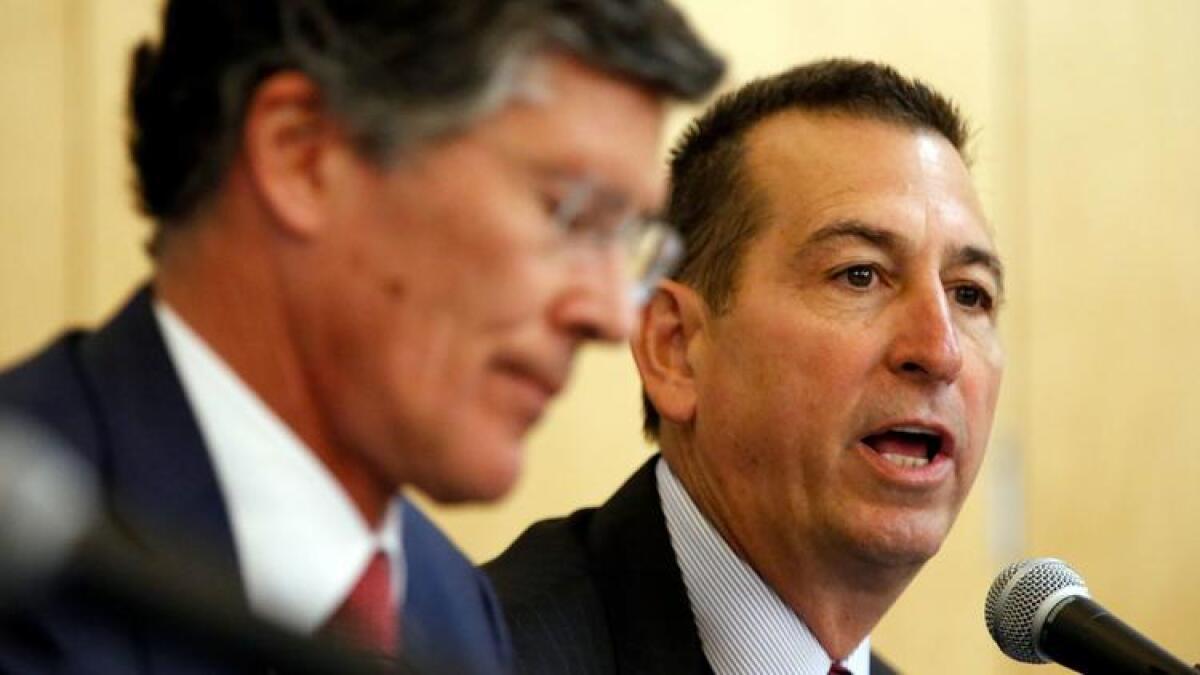
President Trump’s nominee to be a key banking regulator said through a spokesman Monday that he did not misrepresent that he had a degree from Dartmouth College, but simply used the wording on a certificate he earned from a four-week continuing education program held at the school.
“He’s not implying that he got a degree from Dartmouth College,” said Sig Rogich, a spokesman for Joseph Otting.
Otting, the former chief executive of Pasadena’s OneWest Bank, was nominated last week to be the comptroller of the currency. The job involves leading the Office of the Comptroller of the Currency, an independent bureau of the Treasury Department that oversees federally chartered banks.
A short biography of Otting put out by the White House said he “is a graduate of the School of Credit and Financial Management at Dartmouth College.”
Soldier from Barstow killed by Afghan soldier in apparent insider attack
The Pentagon has released the names of three U.S soldiers, including one from San Bernardino County, who were killed Saturday, apparently by a member of the Afghan military.
Sgt. William M. Bays, 29, of Barstow died in eastern Afghanistan’s after a so-called insider attack that the Taliban claimed was carried out by one of its operatives.
Sgt. Eric M. Houck, 25, of Baltimore, and Cpl. Dillon C. Baldridge, 22, of Youngsville, N.C., were also killed in the shooting, the Pentagon said. Another soldier was wounded.
The three were in the 101st Airborne Division and deployed to Afghanistan last fall to train, advise and assist Afghan forces against the Taliban and an Islamic State affiliate.
The insider attack — the second this year — occurred in the Peka Valley near Achin district in Nangarhar province, where U.S. and Afghan forces have been locked in combat with an Islamic State-affiliated militant group for months.
“Our thoughts and prayers are with the families of our soldiers who were killed and wounded,” Gen. John W. Nicholson, commander of U.S. forces in Afghanistan, said in a statement.
“We will always remember our fallen comrades and remain committed to the mission they carried out and for which they ultimately gave their lives,” he added.
Six U.S. service members have been killed in Afghanistan this year, all in Nangarhar province.
The U.S. has deployed 8,400 troops in Afghanistan, although most don’t participate in combat.
The Trump administration is weighing sending as many as 5,000 more U.S. troops to help train Afghanistan’s military and police forces as they battle Taliban insurgents, Islamic State militants and other militias, U.S. officials say.
U.S. 9th Circuit Court of Appeals refuses to reinstate Trump’s travel ban
A federal appeals court refused Monday to lift a hold on President Trump’s revised travel order barring new visas for nationals from six predominantly Muslim countries.
The unanimous, unsigned ruling by a three-judge panel of the U.S. 9th Circuit Court of Appeals was the latest in a string of legal defeats the administration has suffered. The administration has said it will take its case to the U.S. Supreme Court.
“In suspending the entry of more than 180 million nationals from six countries, suspending the entry of all refugees, and reducing the cap on the admission of refugees from 110,000 to 50,000 for the 2017 fiscal year, the President did not meet the essential precondition to exercising his delegated authority: The President must make a sufficient finding that the entry of these classes of people would be “detrimental to the interests of the United States,” the ruling said
The 9th Circuit, which decides federal cases for nine Western states, also said that Trump’s order violated a provision of immigration law that bars nationality-based discrimination.
The three judges — Michael Daly Hawkins, Ronald M. Gould and Richard Paez — were appointed by former President Clinton.
Their decision leaves in place a nationwide injunction issued by a federal judge in Hawaii in response to a lawsuit by the state and a Honolulu-based imam.
Maryland and D.C. attorneys general allege Trump violated Constitution by retaining ties to businesses
The attorneys general of Maryland and the District of Columbia have announced they’ve sued President Trump, alleging he violated the Constitution by retaining ties to a sprawling global business empire.
District of Columbia Atty. Gen. Karl Racine and Maryland Atty. Gen. Brian Frosh made the announcement at a jointly held news conference in Washington, confirming the suit has been filed in a court in Maryland. Frosh and Racine cited Trump’s leases, properties and other business “entanglements” around the world as the reason for the suit, saying those posed a conflict of interest under a clause of the Constitution.
“The president’s conflicts of interest threaten our democracy,” Frosh told journalists. “We cannot treat the president’s ongoing violations of the Constitution and his disregard of the rights of the American people as the new acceptable status quo.”
Racine says the president has spoken about drawing a line between the presidency and his many businesses and properties but that he “has walked his promise back.”
“We have a duty to enforce the law and that’s why we are taking action today,” Racine added.
The White House did not immediately respond to requests for comment Monday. The president called an earlier, similar lawsuit about the so-called emoluments clause of the Constitution an issue “without merit, totally without merit.”
Watch live: Attorneys general of D.C. and Maryland discuss lawsuit against Trump
Sessions to answer questions in public about Russia dealings
Atty. Gen. Jeff Sessions will testify in public Tuesday before the Senate Intelligence Committee, where members are eager to hear an explanation of his actions related to the investigation into whether President Trump’s campaign colluded with a Russian scheme to interfere in last year’s election.
Sessions asked to testify in public, believing “it is important for the American people to hear the truth directly from him,” according to Sarah Isgur Flores, a Justice Department spokeswoman.
The nation’s top law enforcement official, Sessions recused himself from supervising the Russia investigation after he came under criticism for failing to disclose two meetings with Sergey Kislyak, the Russian ambassador. Some Democrats also have questioned why Sessions, after that recusal, wrote a memo to Trump saying he recommended the firing of FBI Director James B. Comey.
In closed-door testimony during the hearing last week, Comey said that the FBI had been looking into unverified reports that Sessions might have had a third conversation with the ambassador during a Trump campaign speech at the Mayflower Hotel last year. The Justice Department has said there was no such meeting.
Attorneys general of Maryland and D.C. plan ‘major lawsuit’ against Trump
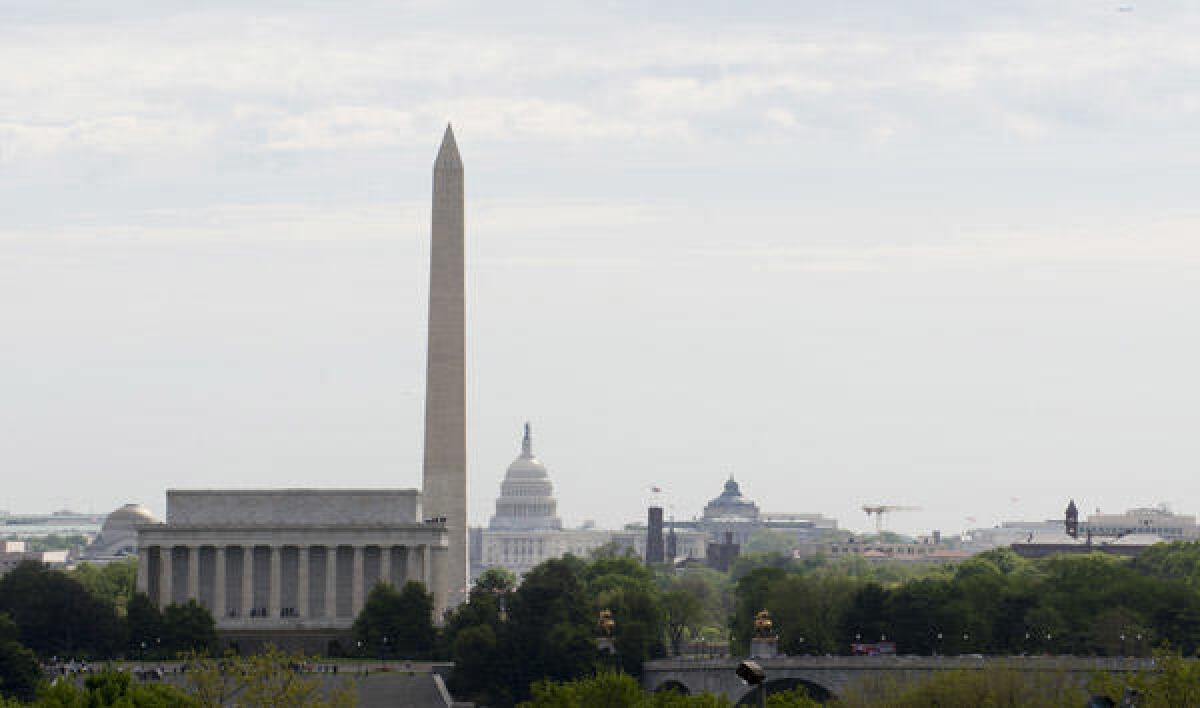
The attorneys general of Maryland and the District of Columbia said Monday they will sue President Trump, alleging he has violated the Constitution by taking payments from foreign governments as president.
Maryland Atty. Gen. Brian Frosh outlined details of the lawsuit in an interview with the Associated Press. Much of it is focused on alleged violations of the emoluments clause of the Constitution, based on Trump’s real estate holdings. The clause prohibits the president and other government employees from accepting foreign gifts and payments without congressional approval.
The Trump Hotel in the nation’s capital affects business in the Washington area and is part of the reason the lawsuit was filed by officials in the District of Columbia and Maryland, Frosh said.
“We have economic interests that are impacted, but the most salient factor is that when the president is subject to foreign influence, we have to be concerned about whether the actions he’s taking — both at home and abroad — are the result of payments that he is receiving at the Trump Hotel, payments that he is receiving at Mar-a-Lago, payments that he is receiving at Trump Tower, payments that he is receiving in all of his other far-flung enterprises, and he brags about it,” Frosh said.
Frosh and District of Columbia Atty. Gen. Karl Racine have scheduled a news conference later in the day to announce the lawsuit.
The lawsuit also focuses on the fact that Trump chose to retain ownership of his company when he became president. Trump said he was shifting assets into a trust managed by his sons to eliminate potential conflicts of interests.
The White House did not immediately respond to requests for comment Monday. The president called an earlier, similar lawsuit about the emoluments issue “without merit, totally without merit.”
If a federal judge allows the case to proceed, Racine and Frosh say they will demand copies of Trump’s personal tax returns in court to gauge the extent of his foreign business dealings.
Trump’s unique status as president and the financial beneficiary of his global business empire raised questions about the little-known emoluments clause of the Constitution even before he took office. Trump and his attorneys argue that the clause does not cover fair-value transactions, such as hotel room payments and real estate sales.
The Democratic attorneys general aren’t the first to sue Trump over emoluments. Just days after Trump’s inauguration in January, the government watchdog Citizens for Responsibility and Ethics in Washington filed a federal lawsuit in the Southern District of New York. Since then, a restaurant group and two individuals in the hotel industry have joined as plaintiffs.
The Justice Department said Friday that those plaintiffs did not suffer in any way and had no standing to sue, and that it is unconstitutional to sue the president in his official capacity.
UPDATE
8:07 a.m.: This post was updated with additional details on the lawsuit.
Melania Trump and son Barron move into the White House
The first family is together again under the same roof: the White House.
After nearly five months of living apart, President Trump’s wife, Melania, announced Sunday that she and the couple’s young son have finally moved into the executive mansion at 1600 Pennsylvania Ave.
Mother and son broke with tradition by living at Trump Tower in New York since the inauguration so that Barron, now 11, could finish the school year uninterrupted; the president lived and worked at the White House.
The president spent the weekend at his private golf club in Bedminster, N.J., and had said on several occasions that his wife and son would move to the White House after the school year. Trump celebrates his 71st birthday on Wednesday and got his gift a few days early.
Melania Trump said last month that Barron will attend a private school in Maryland in the fall, an announcement that answered one of the lingering questions surrounding the Trump family’s unusual living arrangement. It also pointed toward a coming move to the White House.
One remaining question had to do with a move-in date, and the first lady answered it Sunday.
Her spokeswoman, Stephanie Grisham, confirmed the move by email and on Twitter.
Barron will enter the sixth grade at St. Andrew’s Episcopal School in Potomac, Md., in the fall. Trump has four older children — Don Jr., Ivanka, Eric and Tiffany — among his two ex-wives. Ivanka Trump has taken a White House job as an advisor to her father.
Melania Trump stayed largely out of sight during her husband’s presidential campaign and was an absent first lady at the outset of the administration, staying in New York and focusing on Barron. But she has slowly been raising her profile at the White House, including joining the president when foreign leaders and their spouses visit, co-hosting the annual Easter Egg Roll and holding some solo events.
She recently accompanied the president on his first foreign trip, a nine-day journey through Saudi Arabia, Israel, Italy and Belgium that marked her first extended turn as first lady in the public spotlight.
Now that’s she’s at the White House full time, pressure will build for her to be seen more and to do more. She said during the campaign that she would work on the issue of cyberbullying as first lady, but she has made no further announcements about the subject.
She also has shown an interest in military veterans and empowering women and girls.
“I do think once she’s in D.C. there’ll be more pressure for her to be working on something that’s her own, that’s helping some segment of the population because that’s what first ladies are supposed to do,” said Jean Harris, professor of political science and women’s studies at the University of Scranton in Pennsylvania.
First ladies are also seen as calming influences on presidents. In the case of President Trump, many will be anxious to see whether his wife’s daily presence will have a positive influence on Trump’s behavior and mood, including his often angry tweet storms.
The first lady has said she wishes he would give up tweeting.
Former U.S. Atty. Preet Bharara says Trump fired him after a series of ‘uncomfortable’ calls
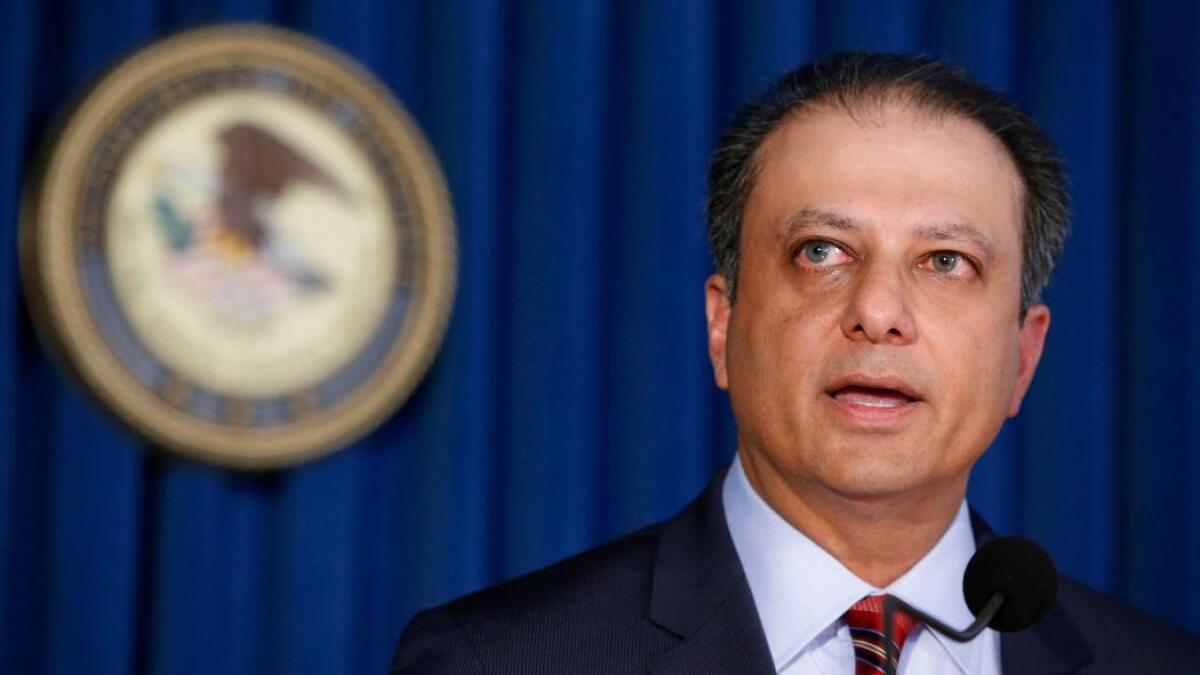
Preet Bharara, the former U.S. attorney for Manhattan, told an interviewer Sunday that he was fired after a series of “uncomfortable” telephone calls that made him feel that President Trump might be trying to compromise his independence as a federal prosecutor.
Trump, who was then president-elect, first telephoned in December, “ostensibly to shoot the breeze and asked me how I was doing and wanted to make sure I was OK,” Bharara said on ABC’s “This Week.”
“It appeared to be that he was trying to cultivate some kind of relationship.”
Bharara had already met with Trump and had been asked to stay on as U.S. attorney, so he was surprised by the call, and by a similar one a few weeks later. When Trump telephoned a third time, after the inauguration, Bharara said he didn’t return the call. He was fired 22 hours later.
The experience had echoes of the testimony given last week by fired FBI Director James B. Comey about seemingly inappropriate conversations with Trump.
After reading the stories about how Trump kept contacting Comey, Bharara said it “felt a little bit like deja vu.”
“I’m not the FBI director, but I was the chief federal law enforcement officer in Manhattan with jurisdiction over a lot of things including, you know, business interests and other things in New York.”
Among other investigations handled by Bharara’s office at the Southern District of New York was an inquiry into stock trades by Tom Price, Trump’s Health and Human Services secretary, according to the nonprofit news outlet ProPublica.
Although the appearance on ABC was Bharara’s first interview since being fired in March, the former prosecutor has become a vocal critic of the president’s conduct on Twitter.
Sessions says he will testify Tuesday to answer questions about Russia raised by Comey
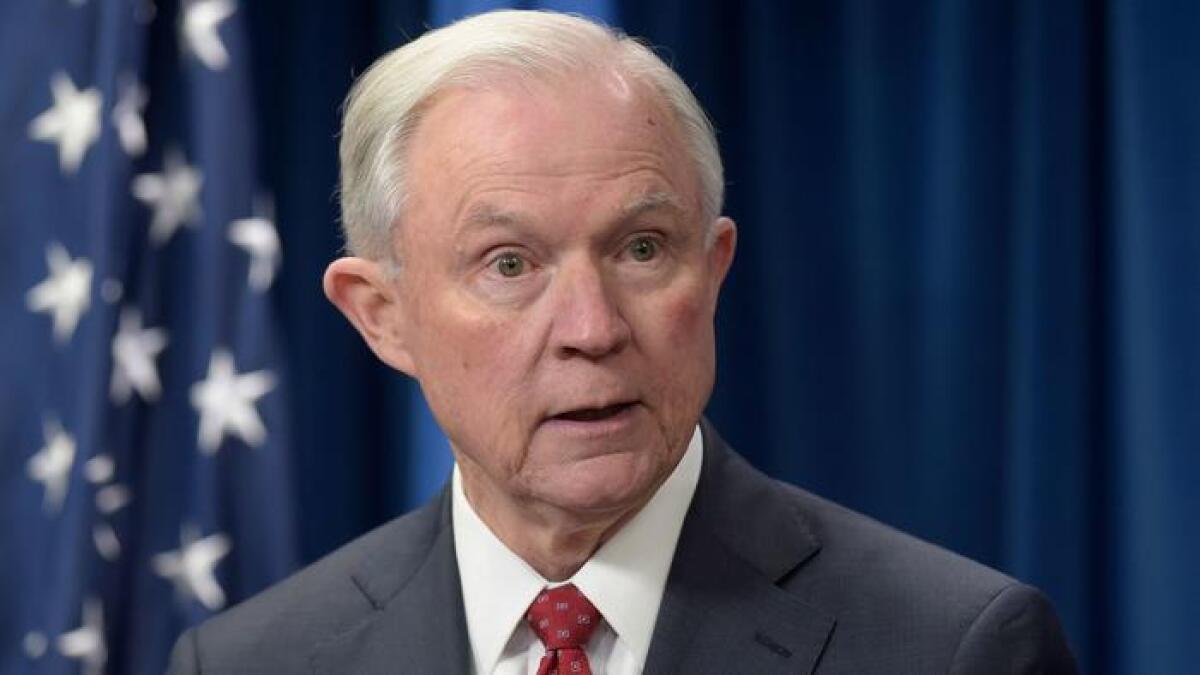
Atty. Gen. Jeff Sessions said he would appear before the Senate Intelligence Committee on Tuesday to answer questions about his dealings with Russian officials.
Sessions, who came under criticism for failing to report meetings with the Russian ambassador, wrote a letter Saturday saying he wanted to answer questions raised during former FBI Director James B. Comey’s testimony on Thursday.
During his testimony, Comey said the FBI had learned about something regarding Sessions “that would make his continued engagement in a Russia-related investigation problematic.” Comey said he couldn’t discuss it publicly.
In a closed session afterward, Comey said the FBI had received unconfirmed reports that Sessions might have had a third meeting with Ambassador Sergey Kisylak during a reception for then-candidate Donald Trump at Washington’s Mayflower Hotel.
A Justice Department spokeswoman has said that no such meeting occurred.
In March, Sessions recused himself from supervising the investigation into possible collusion between President Trump’s campaign and Russian meddling in the 2016 election. Sessions had come under fire for failing to report two other meetings with the ambassador, but he says he recused only because he had worked so closely with Trump during the campaign.
Sessions had been scheduled to testify Tuesday before a joint appropriations subcommittee of Congress, but on Saturday he sent letters to the committee chairmen saying that the Intelligence Committee would be a better forum to answer questions about Russia.
“In light of reports regarding Mr. Comey’s recent testimony ... it is important that I have an opportunity to address these matters in the appropriate forum,” Sessions wrote, saying the Intelligence Committee has access to relevant, classified information.
Deputy Atty. Gen. Rod Rosenstein will take his place at the appropriations hearing, he said.
Trump nominee for powerful bank regulator post misrepresented college degree

President Trump’s nominee for a post as a powerful banking regulator has misrepresented a college degree on his resume, according to a spokeswoman for Dartmouth College.
Joseph Otting, the former chief executive of Pasadena’s OneWest Bank who Trump nominated on Tuesday to be the next comptroller of the currency, has claimed to be a graduate of the School of Credit and Financial Management at Dartmouth.
“Joseph Otting is not a Dartmouth graduate,” Diana Lawrence, the college’s associate vice president for communications, said Saturday. “Dartmouth does not have a school of credit and financial management.”
The degree was included in a short biography of Otting released by the White House on Monday when Trump announced his intention to nominate him.
The James Comey method of dealing with a bad boss offers lessons for all harassed workers
Harassed people of the American workplace, listen and learn.
James Comey has something to teach you.
Last week, a lot of us thought former FBI Director Comey’s interactions with President Trump were eerily reminiscent of the kind of harassment many women experience in the workplace.
Comey said he felt uneasy in meetings with Trump. Trump, he said, tried to get him alone, and then asked him to do things that made him squirm.
And then, when Comey appeared Thursday before the Senate Intelligence Committee, he was treated in a way that was reminiscent of how the Senate Judiciary Committee treated Anita Hill so many years ago, when she alleged sexual harassment by Supreme Court nominee Clarence Thomas.
Trump commits to NATO’s Article 5 obligation, after having left mutual defense commitment in doubt
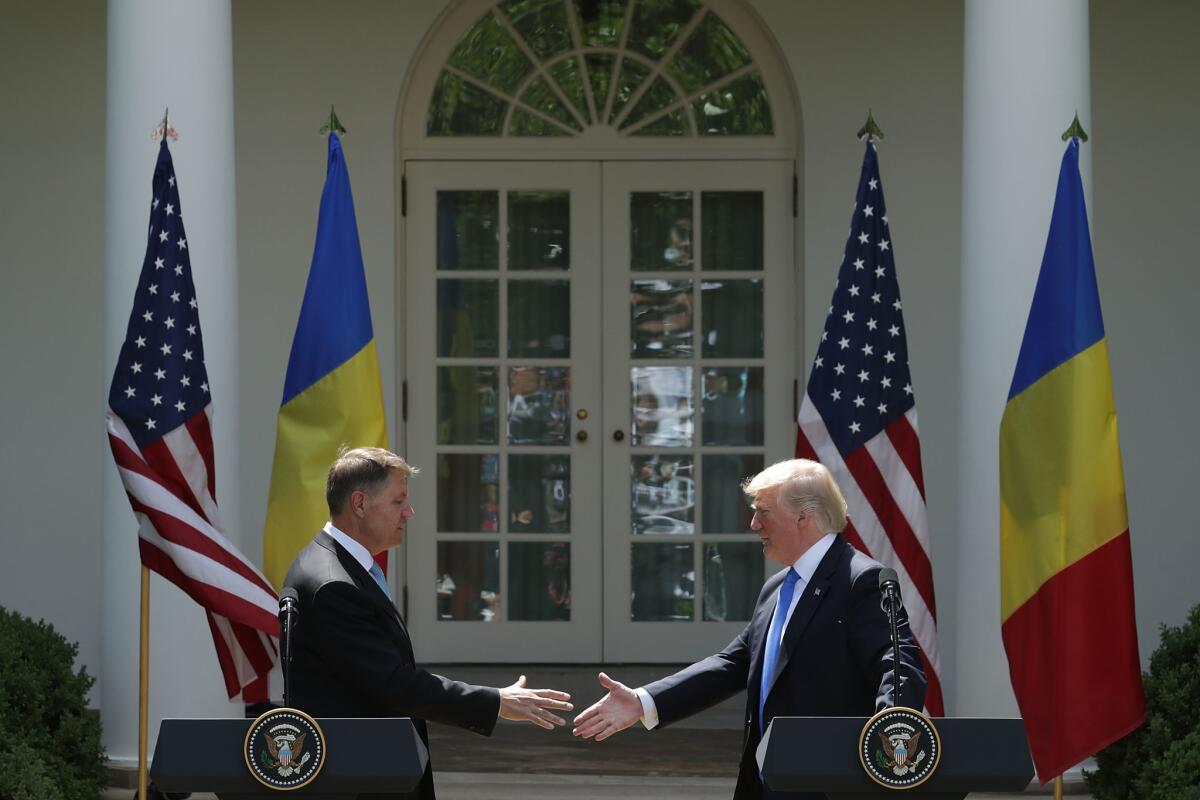
President Trump on Friday made an explicit commitment to NATO’s core mutual defense obligation, weeks after he declined to do so at a meeting of alliance members in Brussels.
“I am committing the United States to Article 5,” Trump said in response to a question during a Rose Garden news conference with the president of Romania. “Certainly we are there to protect.”
That he previously omitted any reference to the NATO charter obligation in remarks at the organization’s new headquarters last month deepened concerns among the other leaders of member nations concerning the future of the trans-Atlantic alliance in the Trump administration.
The White House has downplayed the omission, and even called the dust-up “silly.”
“The president’s presence at an Article 5 commemoration and his discussion about NATO invoking Article 5 for the first time ever after 9/11 pretty much speaks for itself,” White House Press Secretary Sean Spicer said this week.
Politico, though, reported that administration officials debated the precise language Trump should use in reaffirming the U.S. commitment to the alliance, only to have Trump strike the final language before delivering a stern lecture to allies about insufficient defense spending.
At the news conference Friday, Trump praised President Klaus Iohannis and Romania for raising that nation’s defense spending to meet the alliance’s goal of 2% of national GDP — a threshold that predates Trump’s time in office, but one he has championed even if at times he has appeared to misunderstand how that money is spent.
“The money is starting to pour in,” Trump said, suggesting that the new defense spending by Romania was being paid into the alliance, rather than being spent internally. “Other countries are starting to realize that it’s time to pay up and they’re doing that. Very proud of that fact.”
Trump contradicts Comey’s testimony, says he’s willing to testify under oath
President Trump on Friday denied asking fired FBI Director James B. Comey for a loyalty oath or requesting that he drop the investigation into former national security advisor Mike Flynn, and said he would be “100%” willing to testify under oath.
“I hardly know the man,” Trump said of Comey during a Rose Garden news conference with Romanian President Klaus Iohannis. “I’m not going to say ‘I want you to pledge allegiance.’”
Of Comey’s Senate Intelligence Committee testimony that Trump asked him to drop the Flynn investigation. the president said, “I didn’t say that.”
He added, “And there’d be nothing wrong if I did say it, according to everybody that I’ve read today.”
Trump said in response to a reporter that he would be willing to answer questions from Robert Mueller, the special counsel who is running the investigation into Russian meddling in the 2016 presidential election and possible coordination with the Trump campaign.
Trump declined multiple times to say whether he had recorded his White House conversations with Comey, despite previously suggesting in a tweet that he might have.
He said he would answer the question “over a fairly short period of time,” and then said cryptically to assembled reporters, “You’re going to be very disappointed when you hear the answer.”
He repeated his insistence that Comey’s testimony on Thursday cleared him of wrongdoing.
“No collusion, no obstruction. He’s a leaker,” Trump said, adding, “But we want to get back to running our great country.”
“We are doing really well,” Trump said. The allegation of collusion with Russia “was an excuse by the Democrats” for their election loss in November.
Watch: Trump holds joint news conference with Romania’s president
Watch live: Trump speaks at the Department of Transportation
Trump’s attorney said to be planning complaint against Comey for memo leaks
President Trump’s personal attorney is planning to file a complaint against former FBI Director James Comey over details Comey revealed during his congressional testimony, a source told the Associated Press.
Trump’s legal team will file a complaint early next week with the Justice Department’s inspector general, according to a person close to the legal team who agreed to speak on condition of anonymity. The complaint will take issue with Comey’s revelation that he asked a friend to pass along to a reporter notes he took of his private conversations with the president.
The team is also expected to file a submission with the Senate Judiciary Committee.
Trump has a long history of threatening to file complaints and lawsuits and not following through.
Trump’s attorney, Marc Kasowitz, previously issued a statement saying the president’s team would “leave it [to] the appropriate authorities” to determine whether the leaks “should be investigated along with all those others being investigated.”
The prospect of legal action raises questions about whether Trump has executive privilege when it comes to his conversations with Comey, and whether Comey’s release violated that.
Fervent free-market ideology fuels Jeb Hensarling, the man who would slay Dodd-Frank reforms
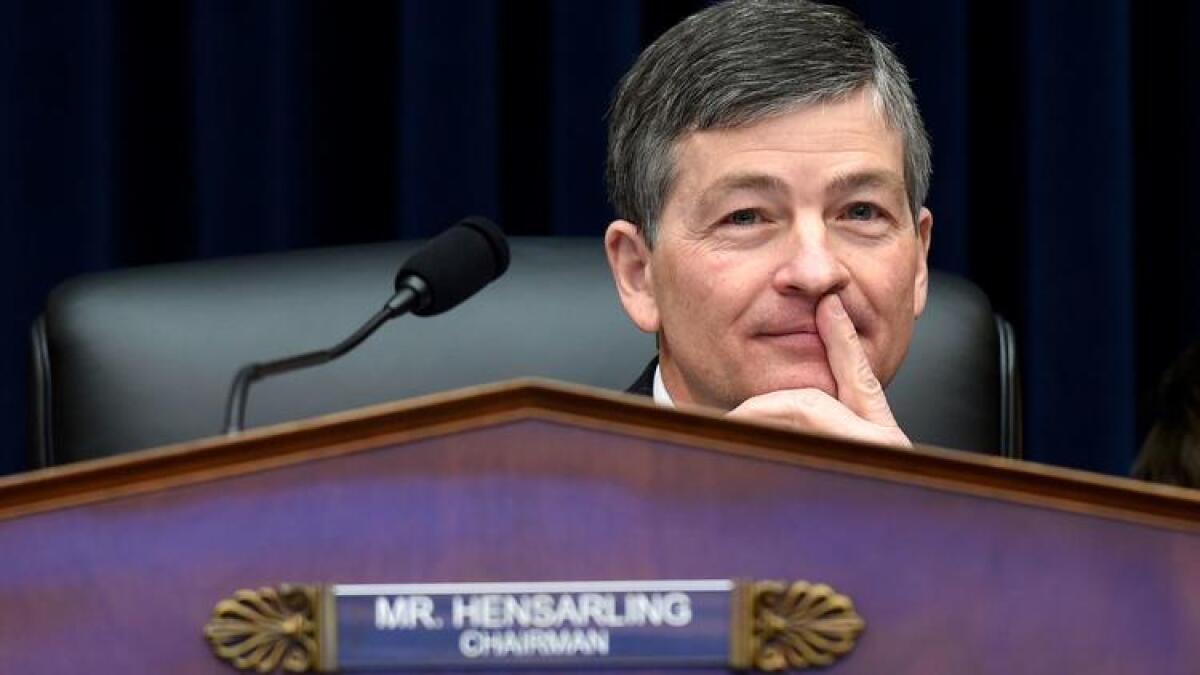
With the financial system imploding in 2008, Treasury Secretary Henry Paulson and Federal Reserve Chairman Ben Bernanke implored Congress to authorize $700 billion to bail out the banks or risk a total meltdown.
Rep. Jeb Hensarling would have none of it.
His actions then represented a key milestone on the Texas Republican’s path to becoming a powerful House committee chairman and a pivotal player in the GOP effort to reduce financial regulation in the Trump era.
Hensarling was among the rebellious House conservatives who helped torpedo the first attempt to create the Troubled Asset Relief Program on Sept. 29, 2008, triggering a record stock market plunge.
As Wall Street nervously awaited a second vote four days later, he acknowledged that many Americans could lose their jobs and homes if Congress didn’t act.
But the man who diverted beer money in college to subscribe to a leading libertarian journal said he had an even greater fear: The bailouts would put the nation on “the slippery slope to socialism.”
Trump gets back to tweeting with a response to the Comey hearing

Complete coverage of former FBI Director James Comey’s testimony on Essential Washington >>
President Trump was uncharacteristically absent from Twitter as former FBI Director James B. Comey testified in front of the Senate Intelligence Committee on Thursday.
But Friday morning, he was back on the social media site to respond:
In case you missed it, here are the six key things we learned from the hearing.
Stoli, FBI sandwiches and Twitter: Comey testimony on Trump and Russia turn America into one big watch party
For a few brief hours, America was united once more.
Red state, blue state. Rural, citified. Black, white. Deep-breathing in a yoga pose, or slowly sipping an eye-opening Bloody Mary at a corner tavern.
James B. Comey, the former FBI director-turned-Trump-tormenter, caused millions of Americans to halt whatever they were doing Thursday morning and turn eyes and ears to his stolid yet gripping testimony before a Senate committee plumbing the depth of Russian meddling in last year’s presidential campaign.
Watch: Highlights from Comey’s testimony

Complete coverage of former FBI Director James Comey’s testimony on Essential Washington >>
At Washington bars, Comey-watching to cheers, ‘covfefe’ and early-morning Russian vodka
Washington is a quintessential company town, and it was hard to find anyone Thursday who wasn’t at least following the James Comey hearing via earbuds, personal-device screens or word of mouth.
Doormen and baristas glanced at smartphones; taxi drivers tuned in to news radio.
Even so, Eric Heidenberger was surprised by the crowds that descended on Shaw’s Tavern, the unassuming neighborhood bar he co-owns, which had advertised its Comey-watching party on social media.
By its 9:30 a.m. opening, a line stretched for a full city block. The main floor, upstairs and an outdoor patio all quickly filled to 150-person capacity, with 10 televisions tuned in to the Senate committee hearing and many listening in from the sidewalk.
Some Washington watering holes had early morning openings and jokey food-and-drink specials.
The Partisan offered cocktails dubbed “The Last Word” and “Drop the Bomb,” while the Union Pub advertised a free round of drinks for every patron each time Trump tweeted about the hearing.
The president’s rare radio silence on Twitter all morning thus surprised and disappointed everyone at the pub but the owner.
Shaw’s offered up “FBI” sandwiches – fried chicken, bacon and iceberg lettuce – and earlier-than-usual Stolichnaya vodka “because, you know, Russia,” Heidenberger said.
Coffee drinks, as at many establishments, had already been rechristened “covfefe” in honor of Trump’s much-dissected tweet.
Typically for Washington, the crowd was more work-oriented than raucous, with plenty of people peering into screens and pecking away at laptops.
“I’m supposed to be working,” said Radha Patel, a 34-year-old accountant and registered Democrat visiting from Chicago. “But I didn’t want to miss this.”
Although customers mostly watched the testimony in silence, some lines drew a strong reaction. A trio of young women visibly shuddered when Comey referred to being “alone with” the president-elect.
“Eeew,” said one.
There was a round of cheers and applause early on when the ousted FBI director condemned Trump’s comments about the FBI being in disarray as “lies, plain and simple.”
And Comey’s declaration, with a catch in his voice, that his abrupt dismissal while he was out of town meant he never got to say thanks and goodbye to his FBI colleagues drew a chorus of “Awwwww!”
Marshall Nannes, a 29-year-old business student who moved to Washington for a summer internship, said he was interested in the hearing but mostly went to Shaw’s to watch the crowd watching Comey.
“It just seems like such a D.C. thing!” he said.
Nannes said he was impressed that Comey could provide such detailed accounts of his conversations with Trump.
“I mean, I can hang up the phone and forget within minutes what was discussed,” he said. “So that was impressive. Really.”
Trump administration considers easing some sanctions on Russia
Even as the controversy over Russian meddling in U.S. elections engulfs Washington, the Trump administration is considering easing some punishments the Obama administration levied against Moscow for those alleged abuses, officials said Thursday.
Senior State Department officials are in talks with Russian officials over returning two compounds in the U.S. that the Obama administration seized last December after the intelligence community concluded that Moscow had attempted to interfere in the presidential electoral campaign.
“Those discussions are ongoing,” State Department Spokeswoman Heather Nauert said. “That is one of the issues, the dachas, that remains an irritant and something that they have certainly asked us to address.”
She used the Russian word for vacation villas that wealthy Russians enjoy.
The two compounds in question are located on New York’s Long Island and on Maryland’s Eastern Shore. Russia had possessed them since the times of the Soviet Union and said they were used to give rest and recreation to its diplomats and embassy personnel.
But the Obama administration late in December accused the Russians of using them for intelligence-gathering, ordered them vacated and expelled 34 Russians as spies.
Moscow has been demanding return of the properties almost ever since.
It was after the Obama order that Michael Flynn, who would later become President Trump’s national security adviser until he was fired, was reported to have been in communication with Russian Ambassador to the United States Sergey Kislyak. He assured Moscow that policy on sanctions would be reviewed under the new administration.
Those conversations and Flynn’s subsequent statements about them are part of the basis of the FBI investigation into Flynn.
“We are working to try to rebuild trust with the Russian government,” Nauert said. “There are areas where we can work together.... There are areas in which we don’t see eye to eye.”
She said the talks about the compounds, which began in May between Under Secretary of State Thomas Shannon and the Russian Deputy Foreign Minister Sergei Ryabkov, “are ongoing and, and I anticipate they will continue.”
The two officials are expected to meet again later this month in the Russian city of St. Petersburg, Russian Foreign Ministry spokeswoman Maria Zakharova said Thursday in Moscow.
At the time of the first session, Ryabkov said the two had reached agreement on “the most important bilateral issues,” according to the official Russian news agency, Tass.
U.S. officials, however, insisted there were no agreements yet.
Several members of Congress, meanwhile, introduced a bill this week that demands the administration not hand back the properties until Russia modifies its behavior.
“It makes no sense to give these facilities back without assurances that these properties were not used by Russian personnel for intelligence-related purposes,” said Rep. Bill Pascrell (D-N.J.), sponsor of the bill.
“While investigations trying to answer that very question are still ongoing, returning these compounds to Russia is premature at best and foolish at worst,” he said in a statement.
Pascrell named the bill the No Russian Diplomatic Access to Compounds Here in America Act.
It requires the president to submit a report to Congress describing any proposed changes to sanctions before taking action that would grant Russians access to the compounds. It also requires a 120-day review period before the president can waive, suspend, reduce, provide relief from or otherwise limit the application of sanctions related to the compounds.
In Congress, it’s Comey vs. Trump, as GOP sticks with a president they say is ‘new at this’
Almost as striking as James B. Comey’s testimony Thursday was the eagerness of many Republicans to stand with President Trump, dismissing his private behavior as rookie mistakes of a wealthy businessman learning on the job.
While Democrats drew bright lines in Comey’s testimony of evidence mounting against Trump’s questionable actions at the White House, Republicans saw a version of events that relieved the president of any wrongdoing.
House Speaker Paul D. Ryan set the tone early – “the president’s new at this; he’s new to government” – and others quickly joined his explanations.
When pressed whether he was comfortable with Trump’s actions with the fired FBI director, Sen. John Cornyn of Texas said, “It’s a not altogether surprising.
“This president is not a conventional office-holder,” said Cornyn, the No. 2 Republican in the Senate.
Republicans have been wary – at least publicly – of crossing Trump or sowing party divisions. They appeared to trust Trump’s version of events as much as those from Comey, who testified under oath at the Senate Intelligence Committee.
Many Republicans believe Trump was vindicated by Comey’s appearance, since the FBI director confirmed he had told the president that he was not personally under investigation in connection with Russian interference in the election – even though the probe continues now with Special Counsel Robert Mueller III and appears to have expanded to included Trump’s possible efforts to interfere.
“His testimony verified a lot of what the president has said and I think was generally more helpful to the president than not, but we’re not through with this by any means,” said Sen. Roy Blunt (R-Mo.), a member of the Intelligence Committee.
As for the discrepancy between Comey’s sworn testimony and Trump’s lawyer’s assertion that the president did not seek Comey’s “loyalty” or ask to do away with the FBI’s investigation into former national security advisor Michael Flynn, some Republicans dismissed it as he-said-he-said.
“What I’m saying is that even if those conversations occurred, however each man sees them in retrospect, doesn’t mean that the other one is wrong,” Blunt said. “And it doesn’t mean that there’s any reason in those conversations that you should automatically think the president somehow can’t do his job.”
A few Republicans, though, appeared publicly pained as the investigation continues, fearing a continued drip-drip of revelations that already are distracting from the GOP majority’s agenda in Congress.
“The whole thing is unsettling,” said Sen. John McCain (R-Ariz.).
“That’s why we’re in a full-fledged scandal, as I told you weeks ago. That’s why we need a select committee,” said McCain, whose calls with Senate Minority Leader Charles E. Schumer (D-N.Y.) for a 9/11-style panel have been rejected by GOP leaders.
“It will happen sooner or later because there will be more shoes to drop,” McCain said.
Said Sen. Lindsey Graham (R-S.C.) of Thursday’s hearing: “In the court of public opinion, it probably hurt Trump some. Legally, it reinforced what I’ve always believed – that he’s not under investigation for collusion – yet – with the Russians.”
Asked about Ryan’s assertion that Trump is just new on the job, Sen. Richard Burr (R-N.C.), the chairman of the Intelligence Committee, said: “I’ll let Speaker Ryan speak for himself.”
For Democrats, meanwhile, the choice between Comey and Trump was easily apparent as they push to understand the scope of Russian interference in the election.
“He spoke, I think, from the heart,” said Sen. Dianne Feinstein (D-Calif.).
Sen. Richard Durbin (D-Ill.) said he believed Comey was more trustworthy.
“The whole Russian travesty was diminished by President Trump from the start, and I think what Comey’s trying to do is breathe life back into it. And he should.”
House votes along party lines to repeal key Dodd-Frank financial reforms
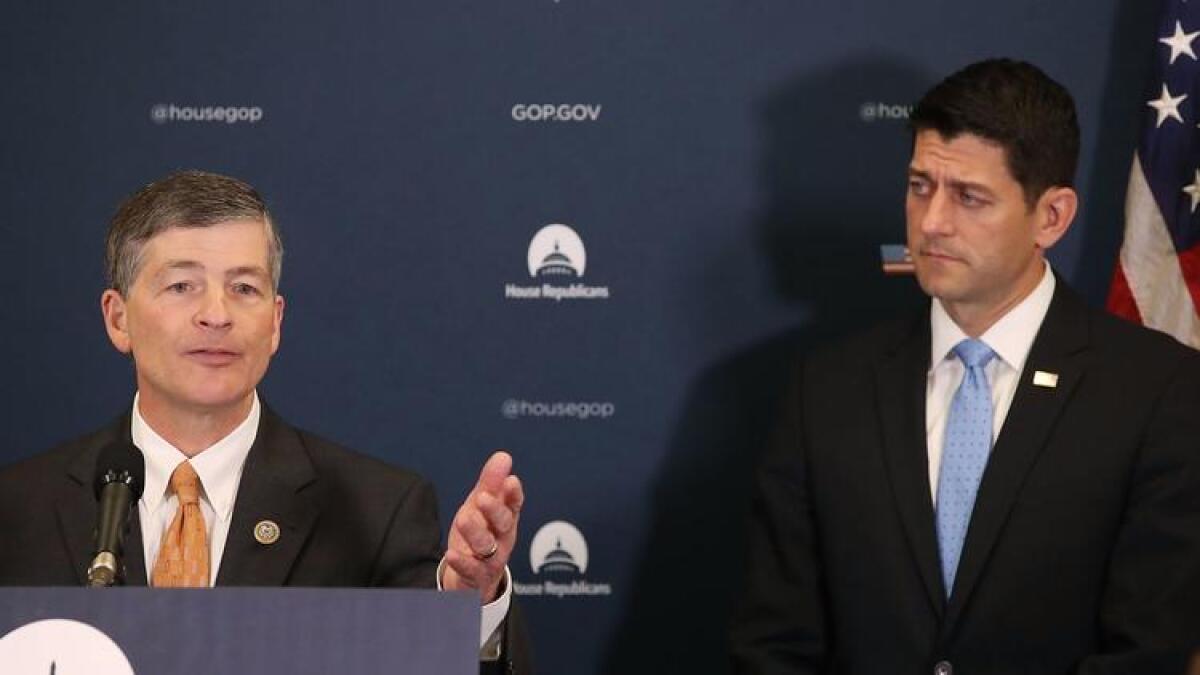
The House voted along party lines Thursday to repeal many of the stricter regulations enacted after the 2008 financial crisis, taking the first step in a long-held Republican desire to roll back landmark rules they complain are hurting banks, restricting consumer credit and slowing economic growth.
The legislation, which faces major hurdles in the Senate because of united Democratic opposition, would continue the Republicans’ deregulatory push under President Trump by dismantling key parts of the 2010 Dodd-Frank Wall Street Reform and Consumer Protection Act.
That law, passed with almost no Republican support, was the biggest overhaul of financial regulations since the Great Depression and one of President Obama’s signature accomplishments.
The bill approved Thursday, authored by Rep. Jeb Hensarling (R-Texas), chairman of the House Financial Services Committee, passed on a vote of 233 to 186. All but one Republican voted for the bill. No Democrats supported it.
Trump’s personal lawyer punches back at Comey
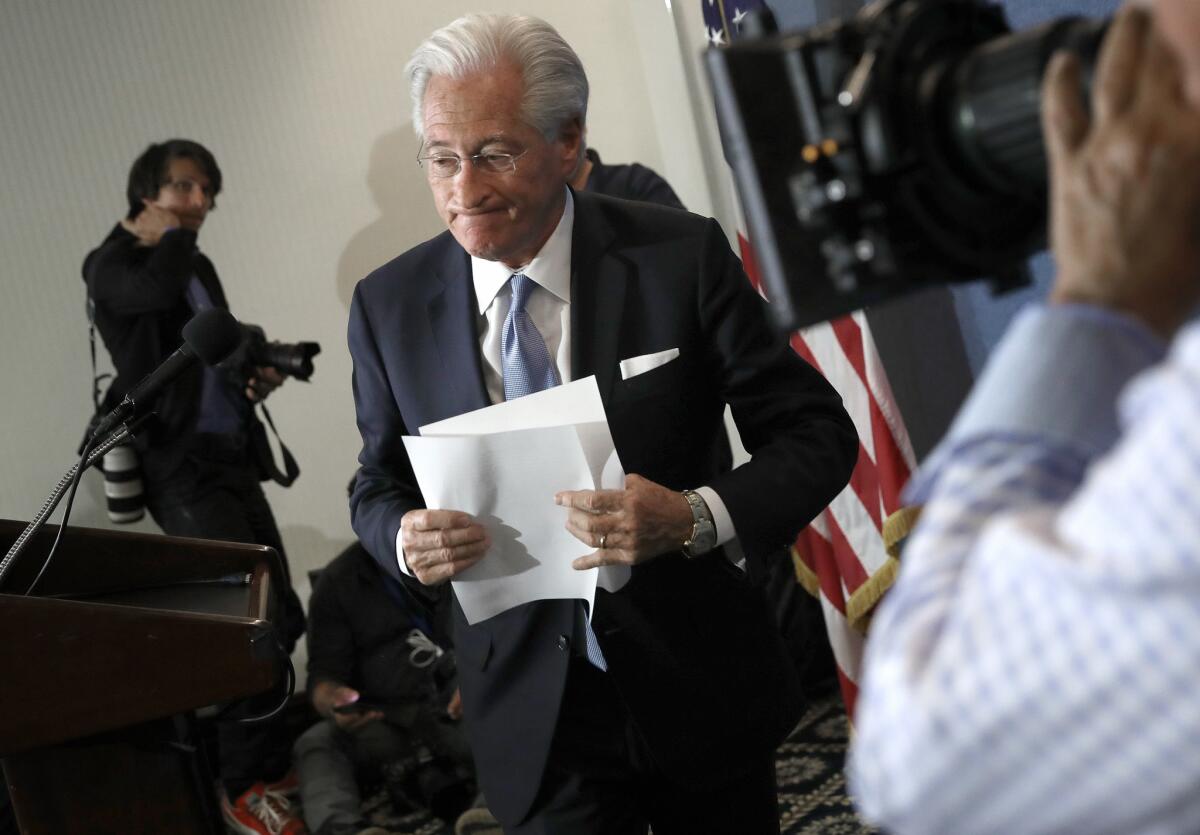
President Trump’s personal lawyer lashed out at former FBI Director James B. Comey on Thursday, accusing Comey of being a “leaker” and suggesting he could be investigated for releasing accounts of his private conversations with Trump.
Trump’s Twitter account remained silent during Comey’s widely televised Senate testimony, an unusually quiet moment for a president with a track record of hitting back hard against criticism.
But within two hours after Comey finished speaking, Trump’s attorney Marc Kasowitz launched into counter-accusations. He took aim at Comey’s disclosures and attempted to link him with federal officials who over the last several months have provided reporters with details from inside the FBI and intelligence community’s investigation into Russian interference in the 2016 elections.
“Today, Mr. Comey admitted that he unilaterally and surreptitiously made unauthorized disclosures to the press of privileged communications with the president,” Kasowitz said, speaking to reporters at the National Press Club in Washington.
Kasowitz did not say what privilege the disclosures might have violated. Comey made a point of noting that the memos were not classified, and the White House has not claimed that executive privilege shields the conversations.
In stark contrast to several Republican senators who praised Comey’s credibility during the hearing Thursday, Kasowitz suggested Comey was part of a campaign by federal officials to undermine Trump’s administration by leaking negative stories to the press.
“It is overwhelmingly clear that there have been and continue to be those in government who are actively attempting to undermine this administration with selective and illegal leaks of classified information and privileged communications,” Kasowitz said.
“Mr. Comey has now admitted that he is one of these leakers,” he said.
Kasowitz also denied Comey’s claim that Trump asked for his loyalty during an awkward one-on-one dinner on Jan. 27 in the White House residence. “He never said it in form and he never said it in substance,” Kasowitz said.
Although he said Comey was untruthful, Kasowitz also said that Trump felt “completely vindicated” by Comey’s testimony that the president was not being investigated for colluding with Russian officials during the 2016 elections. He also lauded Comey’s statement that there was no evidence that votes had been changed as a result of Russian interference.
Comey had captivated viewers for most of the morning with detailed descriptions of his private conversations with Trump, during which Comey felt Trump had asked for his loyalty and had directed him to drop the FBI investigation into Trump’s former national security advisor, Michael Flynn.
Comey said he decided to document his interactions with Trump in memos because he was worried Trump later would lie about their meetings. After he was fired on May 9, he passed some of those memos to a friend with instructions to give them to the media. Reports later appeared in the New York Times detailing Comey’s unease with Trump’s requests.
John McCain confuses everyone, blames performance on staying up past his bedtime
Sen. John McCain was the last senator to grill former FBI Director James Comey during his public testimony. McCain’s questions were expected to be pointed, but instead, his fellow senators, Comey and most of the Internet were left confused, to say the least.
During a hard-to-follow line of questioning, McCain pressed Comey about his investigation into former Secretary of State Hillary Clinton’s email use.
“She was clearly involved in this whole situation where fake news, as you just described it, ‘big deal,’ took place. You’re going to have to help me out here. In other words, we’re complete — the investigation of anything that former Secretary Clinton had to do with a campaign is over and we don’t have to worry about it anymore?”
Comey did not follow, but McCain continued to ask about the investigation regarding Clinton, compared with the Russia investigation involving President Trump.
“I think the American people have a whole lot of questions,” he asked at one point.
The American people did have questions, and made that point in not-too-nice Twitter posts and memes noting the 80-year-old Arizona Republican’s age. Namely, what was McCain talking about?
He apparently noticed, and chose to clear things up later in a written statement, blaming his performance on the fact that he stayed up too late watching baseball (at least his team, the Arizona Diamondbacks, won the game).
“What I was trying to get at was whether Mr. Comey believes that any of his interactions with the President rise to the level of obstruction of justice. In the case of Secretary Clinton’s emails, Mr. Comey was willing to step beyond his role as an investigator and state his belief about what ‘no reasonable prosecutor’ would conclude about the evidence. I wanted Mr. Comey to apply the same approach to the key question surrounding his interactions with President Trump — whether or not the President’s conduct constitutes obstruction of justice.”
McCain intends to formally submit his question to Comey for the record.
Conservatives come to Trump’s defense after Comey hearing
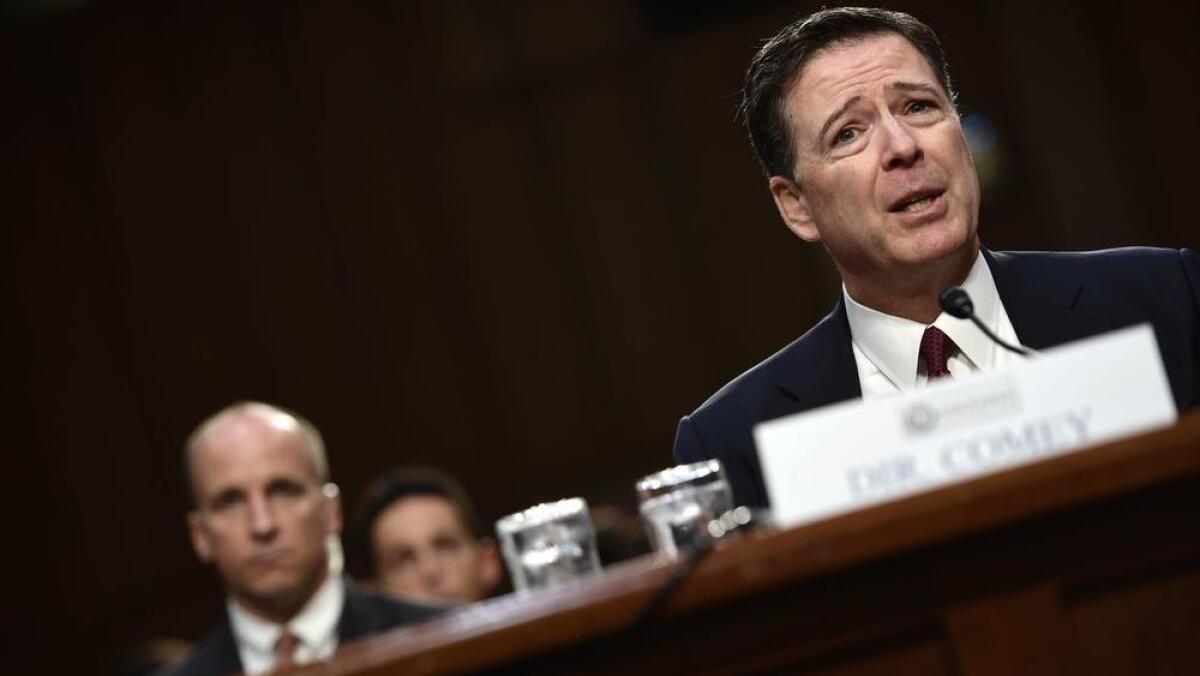
Cable news networks offered stark headlines about the testimony of former FBI Director James B. Comey’s two-plus hours of testimony to senators about his interactions with President Trump.
CNN: “Comey: Trump administration lied about me & FBI.” MSNBC: “Comey: ‘Don’t think I should answer if Trump colluded with Russia.’” Fox News: “Awaiting statement from Pres Trump’s Outside Atty.”
Through it all, at least as of the time this post was written, one voice was not included in the discussion: Trump’s.
The president, though, had no shortage of support from some in conservative media.
Here are some examples:
“Comey’s testimony” was the headline in the National Review.
While many large newspapers, including the Los Angeles Times, focused on Comey’s portrayal of Trump on several occasions as a liar, Rich Lowry homed in on the former FBI director’s behavior.
“We heard this morning about what a shrewd operator Comey is — deliberately not including any classified material in his memos about his interactions with Trump so they could be spread around as necessary, getting a friend at Columbia to leak their contents to the press after his firing to try to force the appointment of a special counsel,” he writes. “As a practical matter and the merits aside, this was a reason not to fire him like Trump did — Comey knows how to fight back bureaucratically and in the media.”
Lowry also seemed to question Comey’s integrity and intentions from a back and forth with Sen. Tom Cotton (R-Ark.).
“Cotton made a telling point at the end, noting how Comey threatened to resign his Justice Department position over a dispute over surveillance policy in 2004,” while serving in the George W. Bush administration.
“But despite how disturbing he found Trump’s conduct, never threatened to resign over it,” he writes.
The alt-right and other prominent Trump backers turned to Twitter to respond to the hearing.
“Comey blows hole in liberal narrative that Trump tried to stop Russia investigation,” said a headline in the conservative website Daily Caller.
The article offered its view on whether Trump’s conversations with Comey were an attempt to obstruct justice.
“North Carolina Sen. Richard Burr, the Republican chairman of the Senate Select Committee on Intelligence, asked Comey, ‘Did the president at any time ask you to stop the FBI investigation into Russian involvement in the 2016 U.S. elections?’ The former FBI director replied, ‘Not to my understanding, no,” website reported.
Read Trump lawyer Marc Kasowitz’s statement after the Comey testimony
President Trump’s lawyer released the following statement to the press following the James Comey hearing on Thursday:
***
I am Marc Kasowitz, President Trump’s personal lawyer.
Contrary to numerous false press accounts leading up to today’s hearing, Mr. Comey has now finally confirmed publicly what he repeatedly told the President privately: The President was not under investigation as part of any probe into Russian interference. He also admitted that there is no evidence that a single vote changed as a result of any Russian interference.
Mr Comey’s testimony also makes clear that the President never sought to impede the investigation into attempted Russian interference in the 2016 election, and in fact, according to Mr. Comey, the President told Mr. Comey “it would be good to find out” in that investigation if there were “some ‘satellite’ associates of his who did something wrong.” And he did not exclude anyone from that statement.
Consistent with that statement, the President never, in form or substance, directed or suggested that Mr. Comey stop investigating anyone, including suggesting that that Mr. Comey “let Flynn go.” As he publicly stated the next day, he did say to Mr. Comey, “General Flynn is a good guy, he has been through a lot,” and also “asked how is General Flynn is doing.” Admiral Rogers testified that the President never “directed [him] to do anything . . . illegal, immoral, unethical or inappropriate” and never “pressured [him] to do so.” Director Coates said the same thing. The President likewise never pressured Mr. Comey.
The President also never told Mr. Comey, “I need loyalty, I expect loyalty” in form or substance. Of course, the Office of the President is entitled to expect loyalty from those who are serving in an administration, and, from before this President took office to this day, it is overwhelmingly clear that there have been and continue to be those in government who are actively attempting to undermine this administration with selective and illegal leaks of classified information and privileged communications. Mr. Comey has now admitted that he is one of these leakers.
Today, Mr. Comey admitted that he unilaterally and surreptitiously made unauthorized disclosures to the press of privileged communications with the President. The leaks of this privileged information began no later than March 2017 when friends of Mr. Comey have stated he disclosed to them the conversations he had with the President during their January 27, 2017 dinner and February 14, 2017 White House meeting. Today, Mr. Comey admitted that he leaked to friends his purported memos of these privileged conversations, one of which he testified was classified. He also testified that immediately after he was terminated he authorized his friends to leak the contents of these memos to the press in order to “prompt the appointment of a special counsel.” Although Mr. Comey testified he only leaked the memos in response to a tweet, the public record reveals that the New York Times was quoting from these memos the day before the referenced tweet, which belies Mr. Comey’s excuse for this unauthorized disclosure of privileged information and appears to entirely retaliatory. We will leave it the appropriate authorities to determine whether this leaks should be investigated along with all those others being investigated.
In sum, it is now established that the President was not being investigated for colluding with the Russians or attempting to obstruct that investigation. As the Committee pointed out today, these important facts for the country to know are virtually the only facts that have not leaked during the long course of these events.
As he said yesterday, the President feels completely vindicated and is eager to continue moving forward with his agenda with this public cloud removed.
Thank you.
Did you hear the one about the FBI director and the president?

So a dozen comedians walk into a bar to watch James Comey testify…..
It sounds like the opening of a joke, but there is no punch line because few people were laughing as they watched the former FBI director’s congressional testimony on a large-screen television at a bar in Queens, N.Y., that often features stand-up comedy. Most were sipping sobering iced coffees rather than beer, tapping away tweets on their laptops.
“I find it terrifying more than funny,’’ said John Conroy, 35, a stand-up comic who was watching Thursday morning at the Q.E.D. Club, in the same borough where Trump lived as a child. “This is a difficult time for us. Before the election, Trump was great fodder. I was joking about him at clubs, but now I find a pall falls over the room when you mention him.’’
Jenn Wehrung, 44, said she grew up in a staunchly Republican family where her father keeps on their coffee table a photo of a National Rifle Assn. magazine with a photo of Trump. No fan of Trump herself, she confessed to being conflicted about his presidency.
“Professionally, Trump is good for us. It is hard not to be amused, but I’m an American and there is nothing funny about what is happening to our country right now,’’ said Wehrung. “Nobody is cracking jokes right now.”
Still, Wehrung mustered a few jokes over Twitter, finding humor – after a campaign replete with allegations of sexual harassment – about Comey’s fear of being alone in a room with Trump.
Andrea Shapiro, 31, said she felt the same conflicts about Trump.
“I feel compelled to keep making jokes about Trump, but frankly it is exhausting,’’ said Shapiro. She found her most promising material in the quaint language used by Comey (“Lordy, I hope there are tapes”), which she said made him sound a little like a damsel in distress.
The owner of the club, Kambri Crews, said she had hastily set up a public viewing of the testimony to comfort her young customers.
“Many of these kids are traumatized — or should I say Trumpetized,” said Crews, 46. “They are too young to remember Nixon. They grew up under Obama and now they’ve had the rug pulled out from under them.’’
Despite the perception that Trump is the president comedians love to mock, some said that pro-Trump comedy is also in demand.
Six key things we learned from the Comey hearing
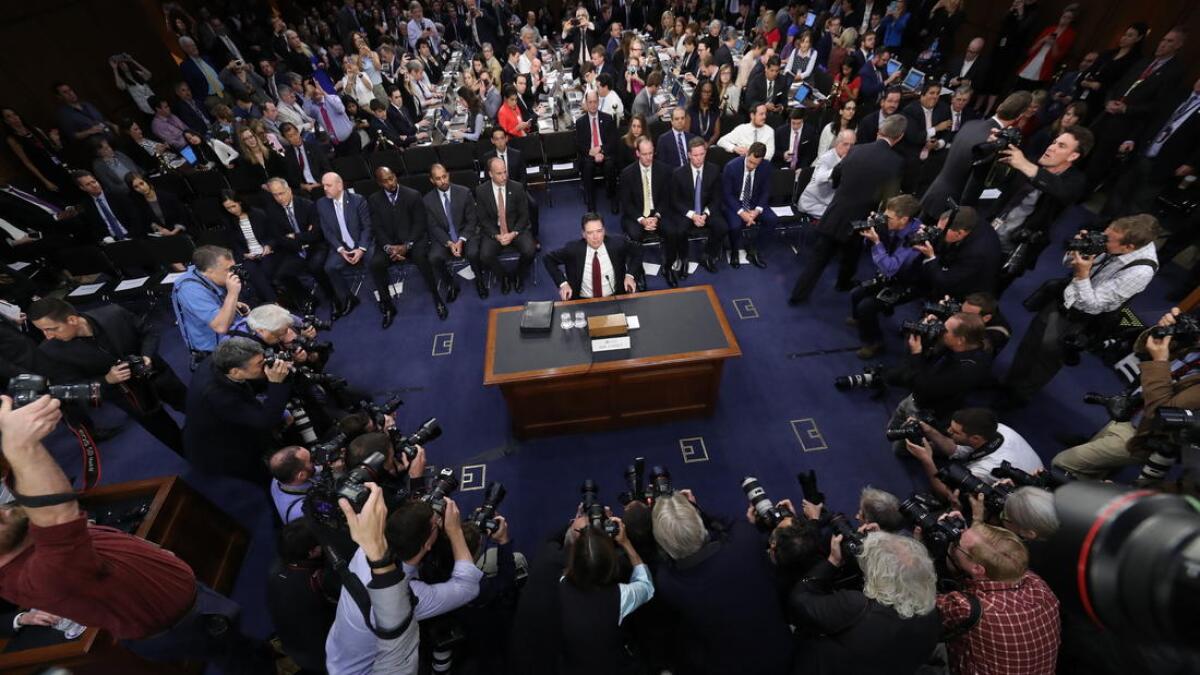
Former FBI Director James Comey did not hold back at the Senate hearing on Thursday. Here are some key things he revealed:
- Comey felt President Trump was directing him to end the probe of retired Gen. Michael Flynn, the former national security advisor, even if Trump did not word his request as a direct order.
- Comey deliberately asked a friend to tell reporters about the existence of memos he wrote recounting his conversations with Trump. He hoped the news would trigger the appointment of a special counsel, which it did.
- Trump’s tweet suggesting there were tapes of his White House conversations with Comey are what moved the former FBI director to reveal the conversations in which he said Trump pressured him to back off a criminal investigation.
- Comey believes he was fired because of the Russia investigation, and he accused the White House of defaming him and the FBI -- and of lying “plain and simple” in its explanations about why he was fired.
- Comey wrote down meticulous notes after his conversations with Trump because he worried Trump would lie about the interactions. He said he felt no need to do that with other presidents.
- Flynn has been under criminal investigation for possibly making false statements to investigators. The fact that Flynn was under investigation had previously been known, but Comey’s statement was the first public confirmation that possible false statements were part of case.
At the White House, it’s just a ‘regular Thursday’ despite Comey testimony
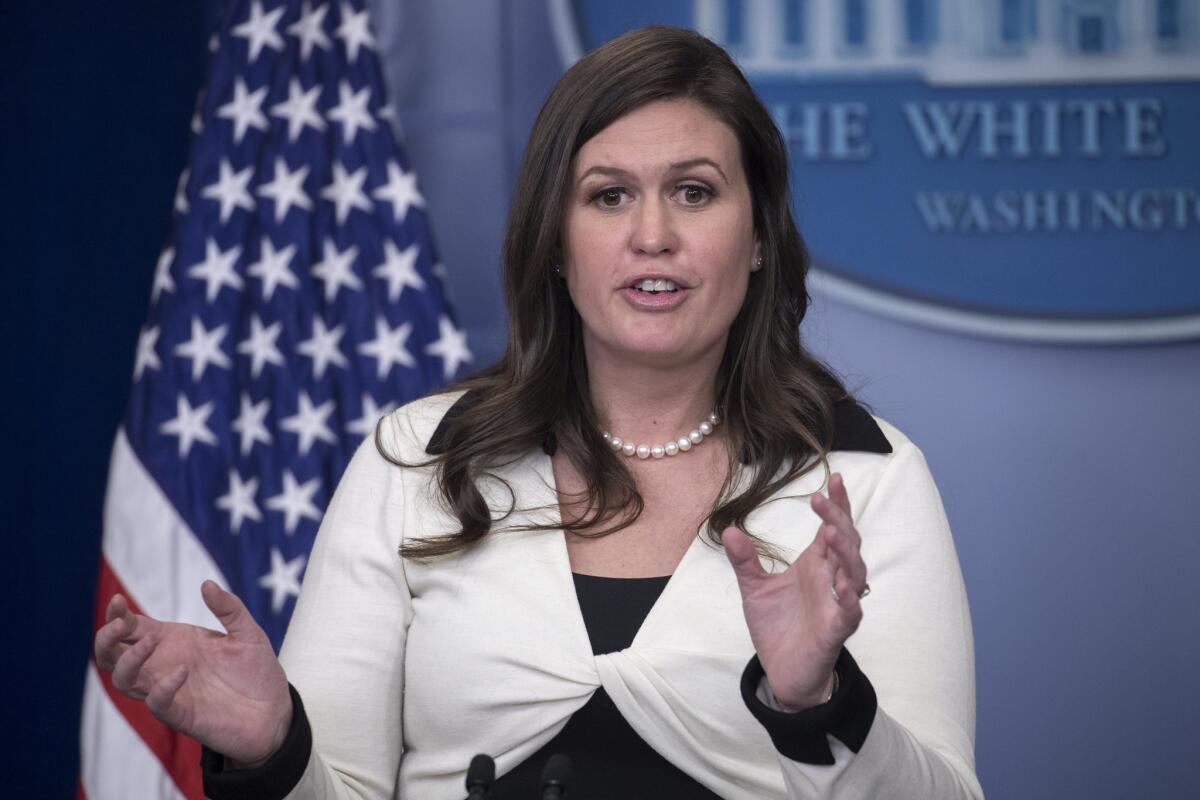
“It’s a regular Thursday at the White House.”
It’s not clear there’s ever been such a thing during the Trump administration, but that’s the assessment Deputy Press Secretary Sarah Huckabee Sanders offered in response to multiple questions from reporters about how the White House is grappling with the blockbuster testimony on Capitol Hill by fired FBI Director James Comey.
Sanders, during an off-camera briefing, said she wasn’t sure just how much of the three-hour Senate intelligence committee hearing President Trump actually watched on one of the White House TVs.
He spent most of the morning in meetings with Secretary of State Rex Tillerson, Defense Secretary James Mattis and national security advisor H. R. McMaster discussing North Korea and “Gulf region issues,” referring to an escalating crisis spurred by a Saudi-led effort to isolate Qatar, a U.S. ally that hosts America’s largest military air base in the Middle East.
Trump stayed off of Twitter, his preferred form of communication, all morning.
Sanders did not rule out that Trump ultimately may comment on the hearing and said he had read some of Comey’s seven-page opening statement, which the committee released Wednesday. But she referred most questions about Comey’s testimony to the president’s personal attorney.
She made an exception when a reporter asked about Comey’s statement that he began writing memos about his conversations with Trump because he was “honestly concerned [the president] might lie” about them.
“No, I can definitively say the president is not a liar, and I think it’s frankly insulting that that question would be asked,” Sanders said.
Sanders also could not answer questions about whether there is a recording system in place at the White House to capture presidential conversations.
“I have no idea,” Sanders said, referring the question to the Secret Service.
Trump last month tweeted that Comey had better hope there were no tapes of their private discussions. But at the hearing Thursday, Comey said that he actually hoped there were tapes — and urged the White House to release them if they exist.
Otherwise, Sanders insisted the hearing carried live on every major TV network was not affecting the mood of White House staffers.
“We have the news on like we do every single day. That’s not new,” she said. “We’re carrying on, focused on the things the president was elected to do.”
How Comey’s story stacks up to Trump’s: a timeline
It’s the president’s word against his former FBI director’s.
How do James Comey’s detailed memos -- which he did not read aloud during today’s hearing -- to top intelligence officials stack up to President Trump’s early morning tweets? Now that we have both sides of the story, take a look at what was happening during the sometimes “uneasy” and “awkward” meetings between the fired FBI director and the president.
Kamala Harris raises political profile at Comey hearing, but gets few answers
Sen. Kamala Harris of California pressed James B. Comey on Thursday to reveal whether Atty. Gen. Jeff Sessions played any inappropriate role in the FBI’s investigation into Russian meddling in the U.S. presidential election.
But her interrogation yielded scant details from the agency’s former director.
“I don’t know,” Comey told the freshman Democrat when she asked whether Sessions had reviewed any FBI or Justice Department documents on the Russia probe before recusing himself from any role in the case in early March.
Harris, a former California attorney general and San Francisco district attorney, was equally unsuccessful in her quest for new revelations on Russians’ contacts with President Trump’s advisors during the presidential campaign.
“Are you aware of any meetings between the Trump administration officials and Russian officials during the campaign that have not been acknowledged by those officials in the White House?” she asked.
“Even if I remembered clearly,” Comey responded, “that’s not a question I can answer in an open setting.”
She had a more successful moment in trying to undercut Republican colleagues who sought to defend Trump by stressing that the president told Comey that he “hoped” the FBI chief would drop the agency’s investigation of former national security advisor Michael Flynn rather than explicitly ordering him to stop the probe.
“In my experience of prosecuting cases,” Harris said, “when a robber held a gun to somebody’s head and said ‘I hope you will give me your wallet,’ the word hope was not the most operative word.”
Senate hearings on Trump and Russia have given Harris an ideal setting to establish herself as a high-profile figure in national politics in her opening months in the Senate.
In an appearance on NBC’s “Today” show on Thursday, Harris told viewers of her background as a prosecutor. She raised concerns about Trump’s attempts to shut down the criminal investigation of Flynn, as well as reports of Trump’s request for a loyalty pledge from Comey.
“I’ve taken the oath [of office] many times,” she said. “The oath was to the Constitution of the United States, not an individual. It’s inappropriate.”
What did Trump mean by ‘that thing’ ?
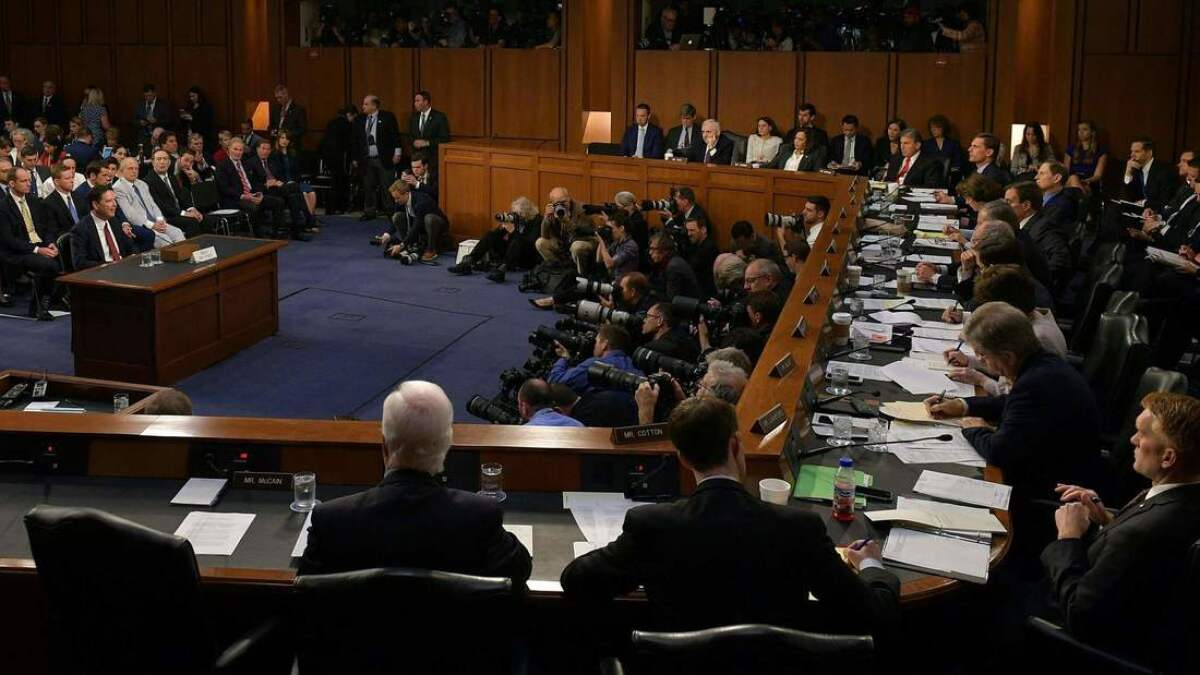
When his turn came to question former FBI Director James B. Comey, Republican Sen. John McCain of Arizona homed in on an unusual remark that President Trump made, according to Comey, during a telephone conversation in April.
Trump was reminding Comey that he wanted the FBI to make public that Trump himself was not a target of the bureau’s Russia investigation.
During the course of the conversation, according to Comey, Trump said: “I have been very loyal to you, very loyal; we had that thing you know.”
McCain expressed bewilderment that Comey never followed up with the president about what he meant by “that thing.”
“I think it would intensely arouse my curiosity if the president of the United States said, ‘that thing,’” McCain said. “I’d like to know what the hell ‘that thing’ is, particularly if I am the head of the FBI.’”
Comey said he had assumed Trump was referring to a thing that actually didn’t exist – a loyalty oath Trump had tried to secure from Comey, but never got.
“What I concluded at the time is that in his memory he was searching back to our encounter at the dinner and was preparing himself to say: ‘I offered loyalty to you,’” Comey said. “’You promised loyalty to me.’”
“And all of a sudden his memory showed him that did not happen, and I think he pulled up short. That’s just a guess.”
Speaker Ryan on Trump’s interactions with Comey: ‘The president’s new at this’
House Speaker Paul D. Ryan gave President Trump a pass on his questionable interactions with fired FBI Director James B. Comey, saying he’s simply new to the job.
Ryan refused to comment more fully Thursday as Comey’s testimony was unfolding in a high-drama hearing at the Senate Intelligence Committee, stunning Washington with disclosures about the president’s demand for “loyalty” and other behavior amid the investigation into Russian interference in the 2016 election.
“Of course there needs to be a degree of independence between the DOJ, FBI and the White House,” Ryan told reporters at the Capitol.
“The president’s new at this. He’s new to government,” Ryan said. “So he probably wasn’t steeped in the long-running protocols that establish the relationships between DOJ, FBI and White House. He’s just new to this.”
Republican leaders have been reluctant to criticize Trump, who has shown a willingness to attack and sideline dissenters, especially from his own party.
Most Republicans in Congress have instead chosen to pick their battles with the White House -- distancing themselves from the president on some issues, but standing by him overall.
Several key GOP lawmakers, led by a stream of missives from the Republican National Committee, are turning their fire instead on Comey, questioning why the former director did not make his concerns about Trump known sooner.
Republicans also seized on Comey’s testimony that Trump was not personally under investigation over Russia meddling in the election as proof the president had done nothing wrong.
“I think people now realize why the president is so frustrated,” Ryan said.
“When the FBI director tells him on three different occasions he’s not under investigation, yet the speculation swirls around the political system that he is, that’s frustrating. Of course the president’s frustrated and I think the American people now know why he was so frustrated.”
Ryan declined to engage in specific questions raised during Comey’s testimony, including that Trump asked the FBI director to let go of the bureau’s investigation into former national security advisor Michael Flynn’s interactions with Russian officials.
The House speaker also refused to discuss Comey’s testimony that Trump has lied about Comey and the bureau.
“There’s going to be a he-said, he-said thing on this,” Ryan said, “and I don’t have any comment on this.”
Donald Trump: ‘We are winners and we are going to fight’
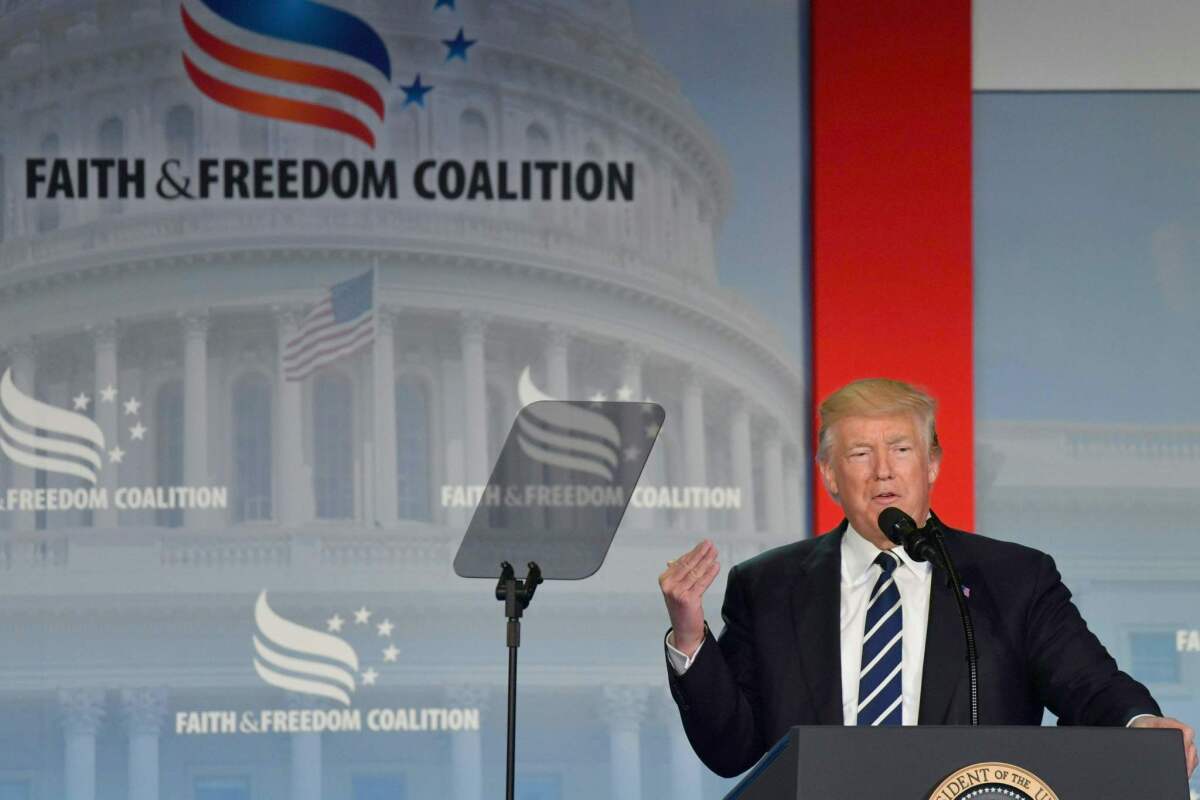
President Trump sounded a defiant note during public comments Thursday, a speech that overlapped with former FBI Director James B. Comey’s testimony.
Trump, speaking to the Faith and Freedom Coalition at a gathering at a Washington hotel, did not directly mention Comey in his speech, or the FBI’s investigation into Russian meddling into the 2016 campaign.
“As you know, we’re under siege, you know that, but we will come out bigger, better and stronger than ever,” he said.
The crowd of evangelical conservatives gave him an ovation and clapped loudly when he spoke about his commitment to religious freedom measures and the successful appointment of Neil M. Gorsuch to the Supreme Court.
Trump cast his political enemies as “entrenched interests” trying to thwart the agenda he promised during the campaign.
“They will lie, they will obstruct, they will spread their hatred and their prejudice, but we will not back down from doing what is right,” he said.
“We know that the truth will prevail,” he said. “That the good decent people of this country will get the change they voted for and that they so richly deserve.”
“Nothing worth doing ever came easy,” he added.”We know how to fight better than anybody and we never give up. We are winners and we are going to fight.”
America watches: See scenes from across the country as viewers watch the Comey hearing
Top left, a patron at San Francisco’s Ace’s Bar watches a broadcast of James Comey’s testimony; top right, Leah Thrum joins patrons at Shaw’s Tavern in Washington; bottom left, Digger Mesch watches while doing yoga in Los Feliz; bottom right, patrons watch at Shaw’s Tavern.
Watching Comey at the Tattle Tale Room in Culver City: ‘There are political nerds in L.A.’
The Tattle Tale Room in Culver City was almost silent shortly after 7 a.m., as early bar-goers watched former FBI Director James B. Comey’s testimony before a U.S. Senate committee.
Nine people sat at the bar and at a table nearby, focused intently on the screen as the bartender poured drinks.
Harper Thomson, 22, had decided to stop by before walking over to work a couple blocks away.
“I was kind of curious to see what kind of people would come to the bar at 6 in the morning,” said Thompson, sitting on a barstool and drinking a mimosa. “Also, I wanted to watch this.”
Her co-worker, Jorge Varon, 22, sat next to her.
“I believe he’s [Comey] going to give more proof to the obstruction of justice,” he said.
Farther down the bar, Michael Trujillo, a political consultant, had taken an Uber from downtown after learning the Tattle Tale would be inviting patrons to watch the testimony.
“I just want to hear the truth,” he said. “We’re not D.C., we’re not New York, we’re not San Francisco, but there are political nerds in L.A.”
Key moments from Comey’s testimony: Lies, leaks, hopes and tapes
Former FBI Director James Comey’s congressional testimony was a minute-by-minute news dump. Here are some of the key moments.
Comey said the White House lied about why it fired him.
The start of Comey’s testimony was tense when he accused the Trump administration of lying about its reasons for firing him.
“Those were lies,” he said, “plain and simple. I am so sorry the FBI workforce had to hear them. And I am so sorry the American public was told them.”
Comey wrote memos after his conversations with President Trump because he was worried the president would lie.
Comey said he started documenting his private conversations with Trump in January, in large part because of the “nature of the person.”
“I was honestly concerned that he might lie about the nature of our meetings,” he said.
Comey orchestrated his own leak about the memos.
Comey said he gave a “good friend of mine who’s a professor at Columbia Law School” the contents of his memos to share with a reporter.
Comey said he won’t speak publicly about the Trump dossier.
Comey said he would only answer questions in closed session about a salacious dossier about Trump that was posted online in January. The dossier, written by former British intelligence officer Christopher Steele, alleged that Russian officials had incriminating information on Trump that they would use as future blackmail. The allegations have not been confirmed.
Former President Clinton’s Arizona airport meeting with then-Atty. Gen. Loretta Lynch was crucial to Comey’s decision to publicly announce the results of the FBI’s investigation into Hillary Clinton’s email practices.
The meeting between the former president and Lynch prompted Comey to announce the investigation into Hillary Clinton’s use of a private email server while she was secretary of State. Comey said he was concerned because Lynch told him to refer to the criminal investigation as a “matter,” as Hillary Clinton’s presidential campaign had described it. He agreed to do so but said the media immediately understood it was an investigation.
Comey took Trump’s “hope” as a directive.
Comey’s opening statement details a conversation he had with the president in February, when Trump said he hoped Comey would back off an the investigation on former national security advisor Michael Flynn.
“I hope you’ll let this go,” he said Trump told him.
Comey said he took that “hope” as a directive because it was the president speaking. He said he decided to ignore it.
Comey said there’s no doubt that Russia meddled in the U.S. election.
The former FBI firector said there’s “no fuzz” that Russian intelligence agencies deliberately and repeatedly interfered with the 2016 U.S. presidential election.
If Trump has tapes, Comey wants them released.
In May, after news accounts reported Comey’s memos, Trump suggested that he had secretly recorded his conversations with Comey.
“James Comey better hope there are no ‘tapes’,” Trump tweeted.
“Lordy, I hope there are tapes,” Comey said Thursday.
Comey repeatedly gave his consent to release any White House recordings of his conversations with Trump, if they exist.
“The president surely knows if he taped me.”
Comey won’t publicly discuss the FBI investigation of Flynn, or possible coordination between the Trump campaign and Russia during the election.
He said he could only discuss the ongoing investigations in the committee’s closed session this afternoon.
Trump feels ‘vindicated’ that Comey publicly said he wasn’t under investigation
It was a quiet morning on Twitter for President Trump. He wasn’t tweeting, but according to media reports, he was watching, and otherwise proceeding with business as usual.
The president headed to the Omni Shoreham Hotel in Washington to give remarks at the Faith and Freedom Coalition’s Road to Majority Conference.
Trump’s attorney was expected to give a statement after the hearing, according to media reports.
L.A. watch party: Yoga, Comey on TV, and a loud call for ‘mmmmmiiiimmmmosssas!’

Just before 7 a.m. Thursday in the living room of his Los Feliz home, actor and yoga instructor Kelly Perine led a small group of friends through yoga before breaking for mimosas and snacks and three hours of testimony by former FBI Director James C
Kelly Perine uncorked the first bottle of champagne at his house at 6:30 a.m. The yoga came not long after.
“Let go of whatever tensions we may have at 7 a.m. on a Thursday,” Perine, 48, of Los Angeles, told five people doing yoga poses in his living room, as the group faced two televisions tuned to MSNBC and Fox News covering former FBI Director James Comey’s arrival before a U.S. Senate committee.
Comey’s testimony on President Trump and Russian interference in the 2016 election was one of the most widely anticipated congressional appearances in recent memory, and liberal-leaning watch parties sprouted up across the nation.
But it posed a problem for the West Coast, where Comey’s testimony was scheduled for 7 a.m. — a little on the early side for most Angelenos.
Not for Perine, an actor-writer-producer who appeared on shows including “The Drew Carey Show” and “One on One.” He invited friends over to his home for an officially bipartisan, quintessentially Los Angeles gathering for some yoga, mimosas and Comey-watching.
Before Comey’s testimony, Perine, who got up at 4:30 a.m. and was wearing a sleeveless yoga shirt, had gathered three bottles of champagne and three jugs of orange juice in an ice-filled cooler in the kitchen. There was a box of doughnuts and a pot of coffee warmed up and waiting for the visitors. A Pennsylvania native who described his views as left-leaning — but who hopes for more political unity in the country — he opened the doors to his home near the Greek Theater at 5 a.m.
One of his first guests was Krissy Harris, 47, a Democrat, who was wearing a pink “pussy” hat that she had learned how to knit for the Women’s March after Trump’s inauguration. When asked why they wanted to have a watch party, the pair began completing each other’s sentences with a jokey levity.
Perine said, “Every time someone is fired from the FBI —”
Harris said, “Every time the president is accused of treason—”
“It’s must-see TV,” said Perine, who would know.
Much later, Harris said, “It’s history, how do you not watch it?”
Half an hour before Comey’s testimony was set to begin, more than half a dozen friends arrived and arranged yoga mats in Perine’s living room in front of the two televisions and a shelf holding six glowing lava lamps.
Perine began guiding his guests through various poses as they watched Comey arriving for his testimony. True to his word, Perine kept his instructions bipartisan.
“Keep breathing,” Perine said, telling his guests to focus. “Whatever intentions you want — impeachment...” Or, Perine said, if you’re hoping for Trump to be cleared of wrongdoing?
One of Perine’s guests interrupted with an om-like hum indicating an entirely different desire:
“Miiimmmmoooossaaaaasss.”
As Comey sat and prepared to speak to the world, Perine’s guests held their palms together, and Perine concluded the exercises with a “namaste.”
The champagne and orange juice flowed soon after. And when Comey finally spoke, they sat and watched, totally focused.
Manchin: Does Comey think he’d have been fired if Hillary Clinton had won?
I might’ve been. As I’ve said before, that was an extraordinarily difficult and painful time. I think I did what I had to do. I knew it was going to be really bad for me personally.
— Comey, on whether he thinks he would have been fired had Clinton won the presidency
What did Comey mean when he said he didn’t want a J. Edgar Hoover ‘situation’ when talking to Trump?
It was a blemish for the FBI and James B. Comey did not want to see it repeated.
During his tenure, former FBI Director J. Edgar Hoover secretly investigated the private and personal lives of many political figures, making him one of Washington’s most feared government officials. Comey and others have openly condemned Hoover’s behavior as an abuse of his power.
On Thursday, Comey said during testimony that he did not want similar concerns to arise from his interactions with President Trump about a salacious dossier that had surfaced in January.
“He [Trump] had a strong and defensive reaction about that not being true, and my reading of it was, it was important for me to assure him we were not personally investigating him, and so the context then was actually narrower, focused on what I just talked to him about,” Comey said of a January meeting at Trump Tower in New York.
“That was very important,” Comey said in his assurance to Trump. “Because it was, first, true, and second, I was worried very much of being in kind of a — kind of a J. Edgar Hoover-type situation.”
In Russia, Comey hearing is making no waves
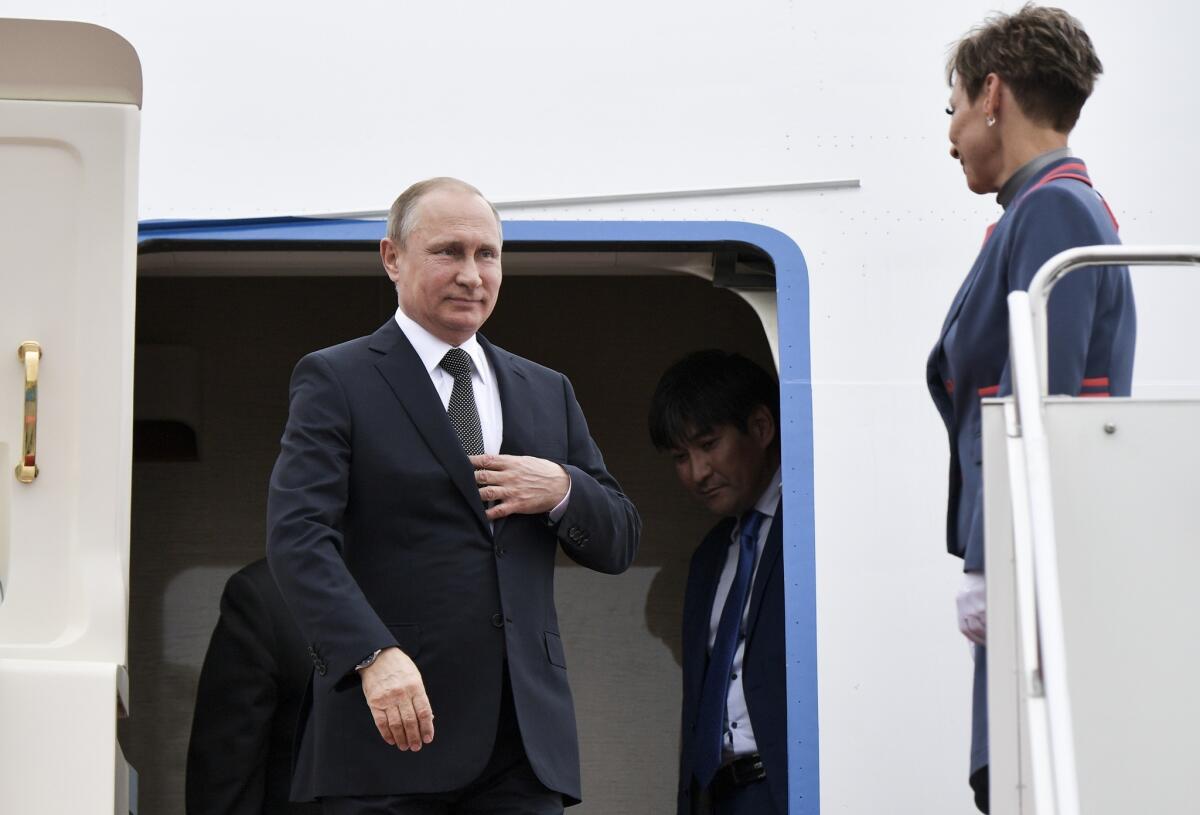
While many Americans are glued to their screens listening to former FBI Director James B. Comey’s testimony before the Senate Intelligence Committee, Russians are largely ignoring the hearings.
Even the Kremlin isn’t tuning in, said government spokesman Dmitry Peskov.
Russian President Vladimir Putin has vehemently denied allegations that Russia interfered with the U.S. elections in favor of President Trump, and blamed the “hysteria” on Russophobia.
And Russian Sen. Alexei Pushkov today likened the Comey hearings to a witch hunt with parallels to McCarthyism. Trump’s enemies, he said, are out for blood.
The ongoing investigations into allegations of Russian interference in the 2016 U.S. election hasn’t lit much of a spark in the Russian public.
“Most Russians don’t care or simply don’t believe that Russia could have influenced the U.S. elections,” said Oleg Kozlovsky, an opposition activist. “For many Russians, they just don’t believe that Russia is that influential in other countries’ politics.”
U.S. intelligence agencies have said there is clear evidence of Russian interference.
But nearly 72% of Russians polled by the Levada Center, an independent polling agency, shortly after Trump’s inauguration in January said Russia probably or definitely did not interfere with the U.S. election. Only 18% said they were following the issue closely.
“We are much more interested in the summit of the [Shanghai Cooperation Organization], which takes place today and tomorrow in Astana,” Peskov told Russian journalists today.
The Shanghai Cooperation Organization is an economic, political and military group that includes Russia, China and most of the former Soviet Central Asian republics. The meeting is being held this week in Kazakhstan’s capital.
‘We remain that shining city on a hill,’ and Russia doesn’t like it, says Comey
We remain that shining city on a hill, and they don’t like it.
— James B. Comey, on Russia’s continuing efforts to interfere in U.S. elections
Republicans target Comey’s delay in reporting Trump meetings
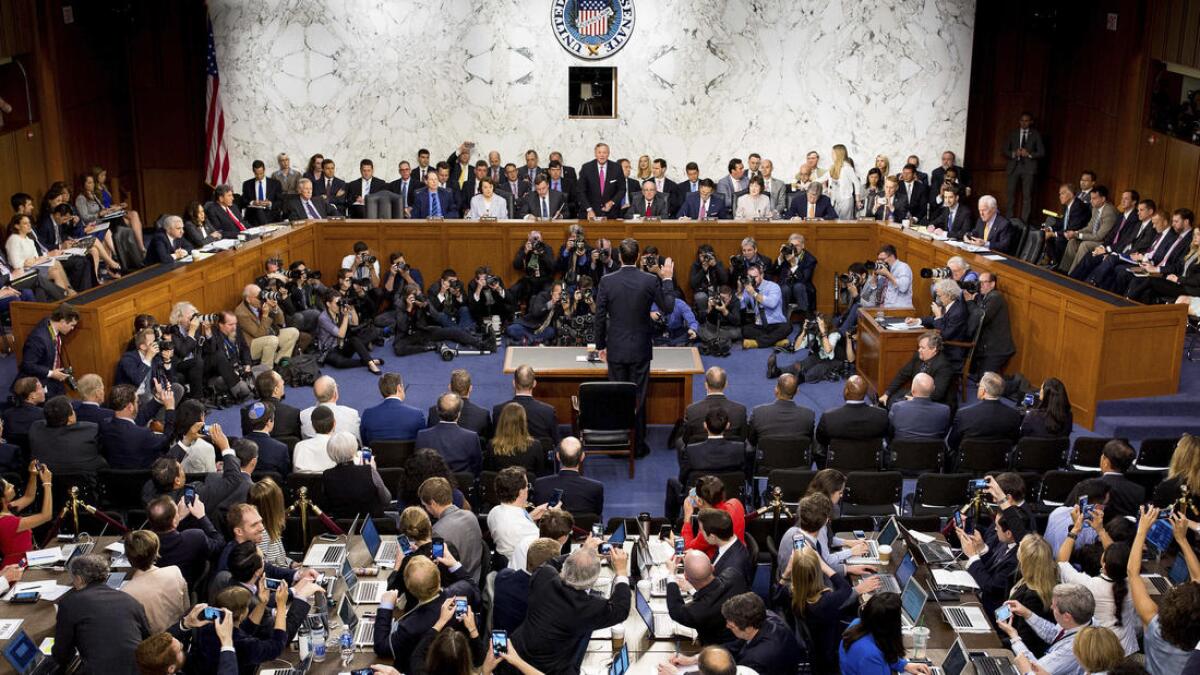
Republicans in today’s hearing with former FBI Director James B. Comey keep returning to his failure to immediately report what he felt were inappropriate requests from the president or to tell the president they were inappropriate.
“At the time, did you say anything to the president? That it is not an appropriate request?” Sen. Marco Rubio asked, referring to Comey’s testimony that Trump requested that the FBI back off its investigation of Michael Flynn, the former National Security Adviser.
Comey responded that he was too surprised.
“Circumstances were such that I was a bit stunned, and I didn’t have the presence of mind,” Comey said. “I don’t know even if I had the presence of mind I would have said to the president, ‘Sir, that is wrong’ … What came to my mind, is be careful what you say.”
Comey said he chose to document the conversations, but not report them because it was his word against the president’s. Nobody else was in the room.
But when the president suggested over Twitter that the White House might have taped the meetings, Comey’s thinking changed.
“We decided the best move was to hold it, keep it in a box,” Comey said. “It was your view against the president, no way to corroborate this. …My view of that changed when prospects of tapes emerged.”
“I‘ve seen the tweet about tapes,” Comey said. “Lordy, I hope there are tapes.”
Clinton’s attention isn’t on Comey today
A year ago yesterday, Hillary Clinton won the Democratic primary.
Feinstein asks Comey: Why didn’t you stop and say, ‘Mr. President, this is wrong’?
Sen. Dianne Feinstein of California sparked one of the most memorable exchanges of the James Comey hearing Thursday by asking the former FBI director about President Trump’s request to drop the criminal investigation of former national security adviser Michael Flynn.
“You’re big, you’re strong,” the veteran Democratic senator told Comey. “I know the Oval Office, and I know what happens to people when they walk in. There is a certain amount of intimidation. But why didn’t you stop and say, ‘Mr. President, this is wrong – I cannot discuss that with you’?”
“Maybe if I were stronger, I would have,” Comey replied. “I was so stunned by the conversation that I just took it in.”
Comey recalled choosing his words carefully in the private Oval Office meeting that Trump had initiated by calling on others to leave the two alone in the room.
“Look, I’ve seen the tweet about tapes,” Comey said, referring to Trump’s tweet -- just after firing Comey -- warning the former FBI chief not to leak anything to the press. “Lordy, I hope there were tapes.”
Comey said he simply agreed with the president that Flynn was “a good guy,” but only “as a way of saying I’m not agreeing with what he just asked me to do.”
“Maybe other people would be stronger in that circumstance,” he said. “But that’s how I conducted myself. I hope I’ll never have another opportunity. Maybe if I did it again, I would do it better.”
Watch: Comey asked a friend to give Trump memos to a reporter in hopes it would prompt special counsel appointment
Former FBI Director James Comey said he asked a friend to alert the press that he had documented his interactions with President Trump, believing such a disclosure would force the appointment of a special prosecutor.
He told lawmakers it was “important” to get the information out.
Comey only described the friend as a professor at Columbia Law School, but the person is believed to be Daniel Richman, a former federal prosecutor and consultant to the Department of Justice and the Department of the Treasury on federal criminal matters.
“I asked him to because I thought that might prompt the appointment of a special prosecutor,” Comey said.
It did. The day after the first media reports about the memos surfaced, a special prosecutor was appointed by the Department of Justice.
From Burr to Blunt and Warner to Wyden, meet the Senate Intelligence Committee members questioning Comey
Former FBI Director James Comey might be the one under the spotlight, but each of the 15 members of the Senate Intelligence Committee also are being introduced to the nation during the high-profile hearing.
There are senators who have run for president. Both of California’s senators. Members of the Republican leadership. Someone Trump considered hiring to replace Comey. They all will get time to question the witness.
Comey: I took Trump’s Flynn request as an order
A key question emerging from former FBI Director James B. Comey’s testimony about his talks with President Trump: Did the president’s requests to lay off an investigation amount to obstruction of justice?
Comey would not make a conclusion, saying that was a decision for Robert Mueller III, the special counsel now overseeing the investigation into possible collusion by Trump associates in the Russian scheme to influence the election.
Under questioning by Sen. James Risch (R-Idaho), Comey conceded that Trump asked him to let go the FBI’s probe into former national security advisor Michael Flynn – and did not give a direct order. Comey also allowed that he did not know of anyone convicted of a crime for wishing for something to happen.
But Comey was careful to point out that he was only reporting Trump’s words, and not what he understood as the thrust of his statements.
“I took it as a direction,” he said. “This is the president and me alone, and he says, this is what I want you to do.”
Comey also said that he believed that Trump regretted telling Comey that he wanted him to stay “without getting anything for it” – and so pressured him to swear his loyalty at a private dinner.
“My common sense told he, what’s going on here, he’s looking to get something in exchange for granting my request to stay in the job.”
He said the request was disturbing. The FBI director is given a 10-year term to preserve the agency’s independence from politics, he said.
“The statue of justice has a blindfold on because you’re not supposed to be peeking out to see if your patron is pleased with what you’re doing,” he said.
Donald Trump may not be live tweeting, but his son is
Donald Trump’s Twitter feed has presently gone dark. But his son, Donald Trump Jr., is lighting up Twitter. The younger Trump is live-tweeting former FBI Director James Comey’s hearing.
Watch: Trump was not ‘under investigation’

Testifying before the Senate Intelligence Committee on June 8, 2017, fired FBI Director James Comey says President Trump wasn’t under investigation.
Expect to see this clip again.
Sen. Jim Risch (R-Idaho) gets at one of the key questions during James Comey’s testimony.
Risch: “The president of the United States was not under investigation?”
Comey: “That’s correct.”
Comey: Then-Atty. Gen. Lynch urged that the Hillary Clinton email probe be called a ‘matter,’ not ‘investigation’
Former FBI Director James Comey said Thursday that then-Atty. Gen. Loretta Lynch urged him to refer to the investigation into Hillary Clinton’s emails a “matter” instead of an “investigation.”
Comey said in his Senate Intelligence Committee hearing that he was confused by the request and that it was one of the reasons he felt the need to publicly announce his findings in the Clinton email case.
Comey said the other major factor was Lynch’s meeting with former President Clinton on the tarmac of an Arizona airport. Comey said he had to announce his findings to protect the credibility of the FBI and the Justice Department.
‘Lordy, I hope there are tapes,’ Comey says of his chats with Trump
Lordy, I hope there are tapes.
— Comey, on Trump’s tweet about potential recordings of their conversation
Comey worried Trump would lie about their meetings
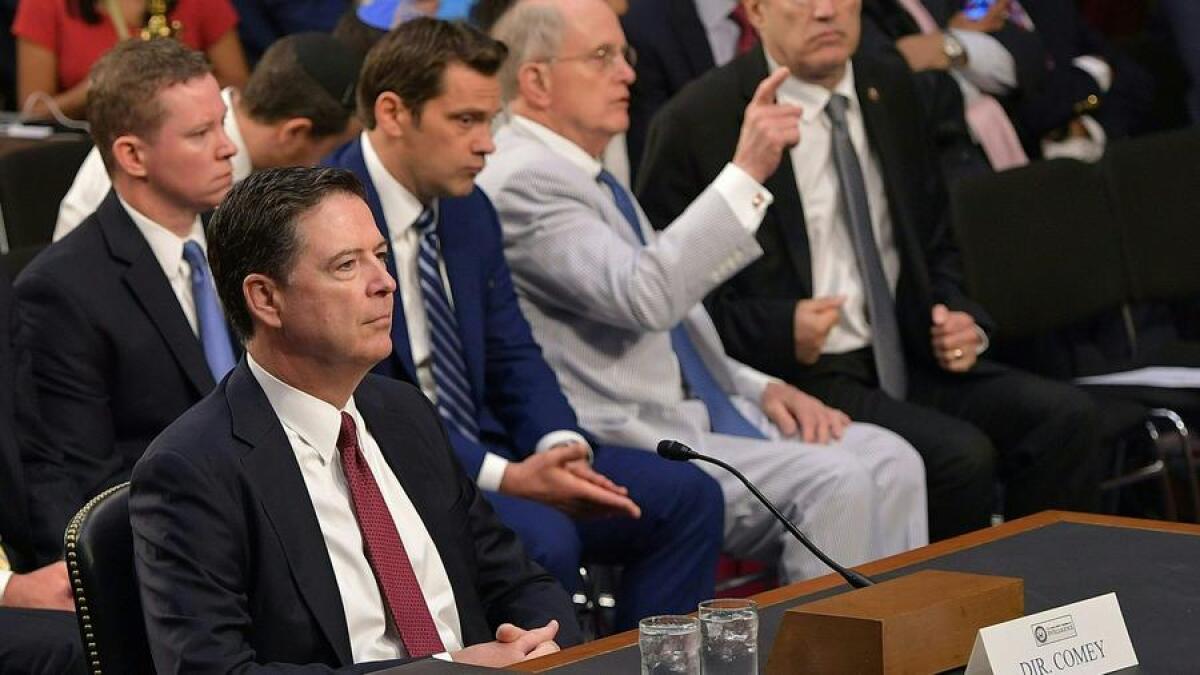
Former FBI Director James Comey said he felt a need to meticulously document every interaction with President Trump – something he did not do with other presidents – because he feared Trump would lie about their conversations.
Speaking of the “nature” of Trump, he said meeting with him created concerns Comey did not have with Presidents Obama or George W. Bush.
“I was honestly concerned he might lie about the nature of our meeting,” Comey said. “It led me to believe I’ve got to write it down….I knew there might come a day when I would need a record of what would happen, not just to defend myself but to defend the FBI.”
Comey offers goodbye to FBI: ‘It was the honor of my life to serve beside you’
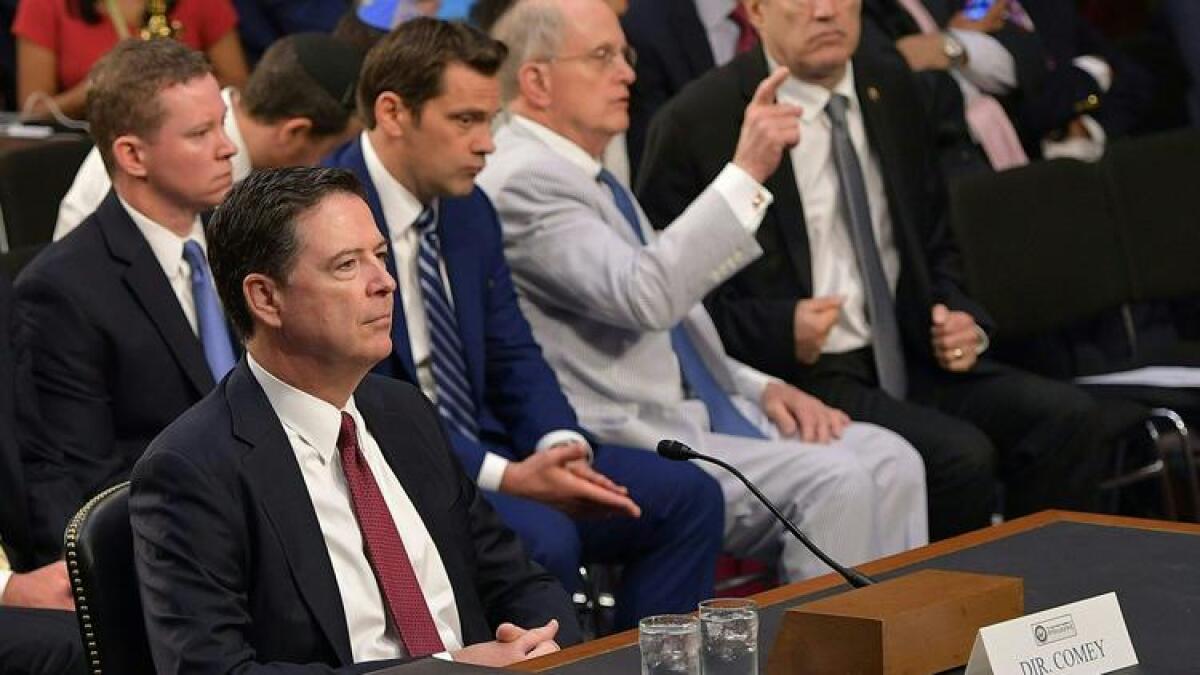
Former FBI Director James B. Comey never had an opportunity to say goodbye to his colleagues.
That changed on Thursday at the outset of his testimony before the Senate Intelligence Committee.
“I am so sorry that I didn’t get the chance to say goodbye to you properly,” he said. “It was the honor of my life to serve beside you, to be part of the FBI family and I will miss it for the rest of my life. Thank you for standing watch. Thank you for doing so much good for this country.”
Last month, President Trump’s abrupt firing of Comey stunned the FBI and the intelligence community. The move blindsided Comey, who learned about his dismissal from television reports that were playing in the background at an event in Los Angeles.
On Wednesday, Trump tapped Christopher A. Wray, who led the Justice Department’s criminal division from 2003 to 2005, to become the new FBI director.
Comey opens by accusing White House of lying
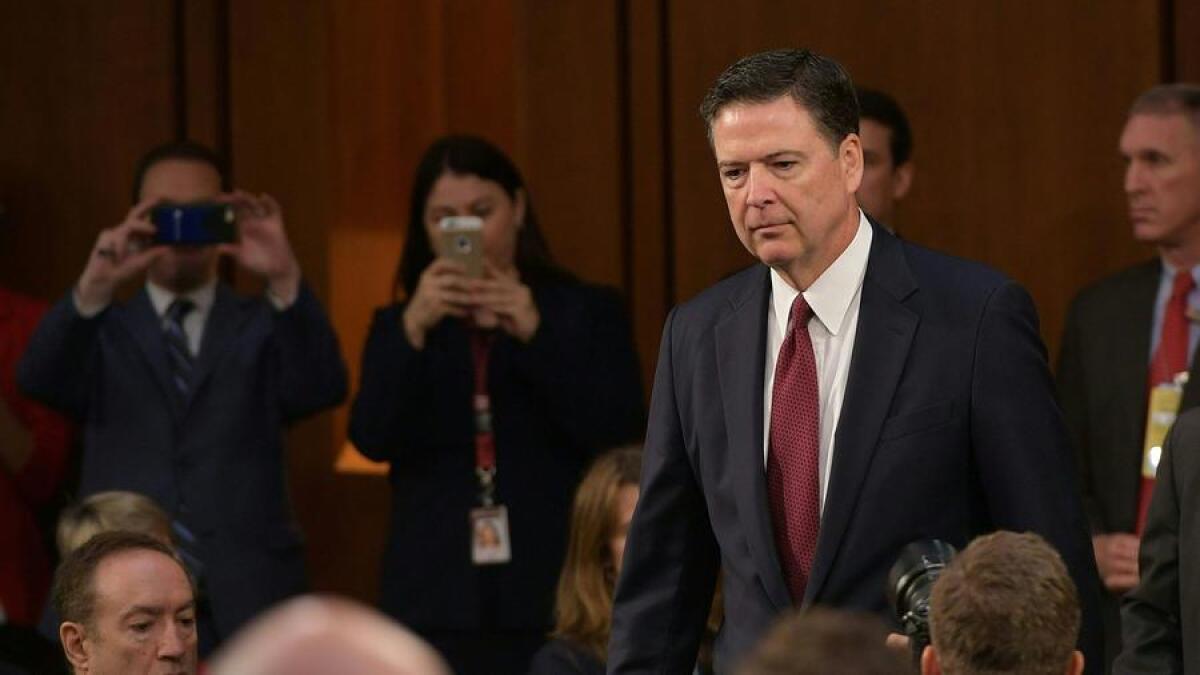
Former FBI Director James Comey launched into his testimony with a combative tone, accusing the administration of lying about its reasons for firing him and damaging the agency in the process.
Comey’s remarks were even more aggressively critical and accusatory of the White House than his written testimony, which already charged the president repeatedly and inappropriately pressured Comey to back off in the FBI’s investigation of Michael Flynn.
“The shifting explanations confused me and concerned me,” he said about President Trump’s comments following Comey’s firing. “Although the law required no reason at all to fire an FBI director, the administration chose to defame me and the FBI.”
“Those were lies,” Comey said, “plain and simple. I am so sorry the FBI workforce had to hear them. And I am so sorry the American public was told them.”
Watch the dramatic Comey hearing opening: Trump administration ‘defamed me’ using ‘lies’

Former FBI Director James B. Comey testified before the Senate Intelligence Committee on Thursday. He addressed his firing in his opening statement and said goodbye to co-workers.
For Comey hearing viewers, it’s standing room only
Comey won’t repeat his written testimony. Read it here.
In his opening statement, former FBI Director James Comey said he won’t repeat what he already said in the written statement released yesterday by the Senate Intelligence Committee. In case you missed it, here’s a copy:
James Comey’s opening statement for the Senate intelligence panel
What’s helpful and hurtful for Trump in Comey’s written statement, which he won’t read today
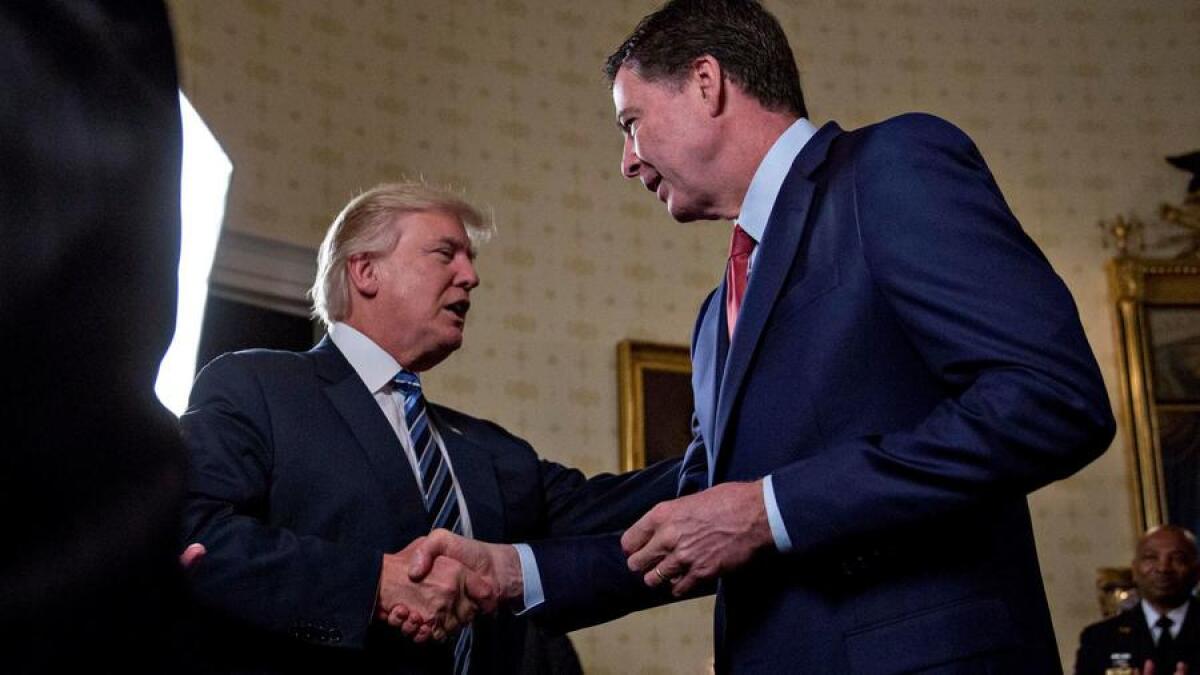
Former FBI Director James B. Comey’s opening statement for Thursday’s hearing at the Senate Intelligence Committee deepens President Trump’s problems in at least three areas. One thing Comey said potentially helps Trump.
Any working woman could have told James Comey what would happen when he spurned President Trump
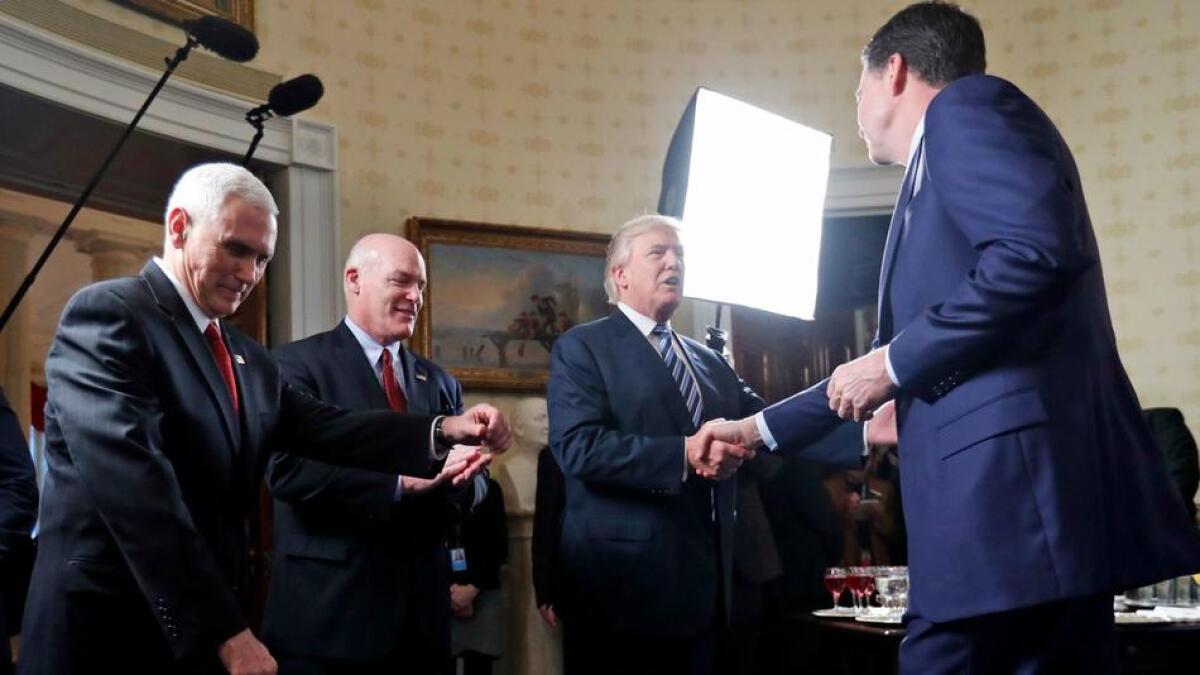
Is there a working woman alive who cannot identify with poor James Comey right now?
The former FBI director’s boss tried to seduce him. When the seduction failed, his boss fired him.
And then called him “crazy, a real nut job.”
Hell hath no fury like a scorned President Trump.
When you are the kingpin of a family business, used to a world in which no one questions or challenges you, where you can grab anyone in the … well, you know, it’s no wonder you see the world as divided into two sorts of people: you, and the subordinates who are here to meet your every need.
Inside the hearing room: Anticipation builds
Politicos line up for Comey testimony as Washington prepares for historic hearing
Grab the chips and dip, crack open a beer and settle in, it’s almost time for kickoff. On Capitol Hill this morning, former FBI Director James B. Comey and the Senate Intelligence Committee are preparing for their own kind of game.
And as they straighten their ties and gather their notes for Comey’s public testimony, residents of Washington are eagerly awaiting what many are calling the Capitol Hill equivalent of a Super Bowl.
Comey’s testimony regarding his interactions with President Trump in the weeks leading up to his dismissal was publicly released Wednesday afternoon, but that didn’t stop people from lining up outside the hearing room early Thursday morning to get a seat to hear his comments in person.
It’s the most anticipated public hearings since Hillary Clinton testified in 2015 about the Benghazi attacks.
Inside the Hart Senate Office Building, where the hearing is scheduled to take place at 10 a.m. EDT, excitement for the event was apparent. A line of people snaked along the length of the second-floor balcony, turning the corner and stretching its way to the hallways of the Dirksen Senate Office Building.
With a sea of black blazers and dark shoes lining the wall, Capitol police made sure the crowd didn’t overflow the walkway. People weaved in and out of the crowd, carrying bagels and muffins to those waiting in line.
Samantha Sharkoff, a Senate intern, roused herself from bed at 3 a.m., sending a text to fellow interns asking if anyone was having second thoughts about waiting in the line. Sharkoff, along with two other interns from her office, arrived at the Capitol at 4 a.m. wearing two pairs of pantyhose to ward off the cold.
Finally reaching the front of the line around 8:45 a.m., Sharkoff said the experience was one she couldn’t pass up because it was a “window” into what was going on with the administration. Ben Higgs, another intern, said he considered the event his generation’s “biggest political story.”
For Patrick Wells, who attended 35 Trump rallies throughout the campaign season, the hearing was another chance to show his support for the president.
Proudly wearing his “Make America Great Again” hat, Wells, 49, from Massachusetts, said this was a “call to arms” for supporters to stand by their president.
“This is a big witch hunt. ... All around there are so many different forces trying to take the president down any way they can,” Wells said.
Lamenting that he didn’t camp out overnight, Wells said he planned to watch from an overflow room, where large television screens were set up.
Around the city, bars and restaurants opened their doors early for customers hoping to watch on big-screen TVs. Shaw’s Tavern, which opened at 9:30 a.m., offered customers discounted Russian vodka flavors and “FBI” sandwiches while the Partisan boasted a “Comey themed happy hour guide.” Union Pub, on Capitol Hill, offered to buy a round of drinks each time Trump tweeted about the hearing.
D.C. residents weren’t surprised by the extensive viewing options, tweeting about how they expected the capital to turn a historic political event into a social one.
Tony LaFalce, who watched the hearing from the Partisan, said the whole experience was “very Washington.”
“The group setting gave everyone an excuse to laugh at certain moments that you may have passed over in your living room,” LaFalce, 28, of Alexandria, said, referring to the cheering, applause and laughter that filled the room several times throughout the hearing.
Molly Hippolitus, communication director for Neighborhood Restaurant Group, which operates the Partisan, said she had never seen such a crowded bar remain so quiet. Hippolitus estimated about 100 people came to watch the hearing, and said some lined up outside before the restaurant opened at 8:30 a.m. While the large crowd was beyond her expectations, she knew D.C. residents would want to watch the proceedings because “it’s something that Washingtonians love to do.”
11:45 a.m.: This post was updated.
The Times’ front page focuses on Comey’s testimony
Your guide to watching Comey’s Senate Intelligence Committee testimony
Former FBI Director James B. Comey, who was abruptly fired by President Trump on May 9, will testify this morning in front of the Senate Intelligence Committee. Keep this guide open to keep up during one of the most highly anticipated moments in Trump’s presidency.
As Comey reveals his testimony, conservative media focus on one thing: Trump is not under investigation
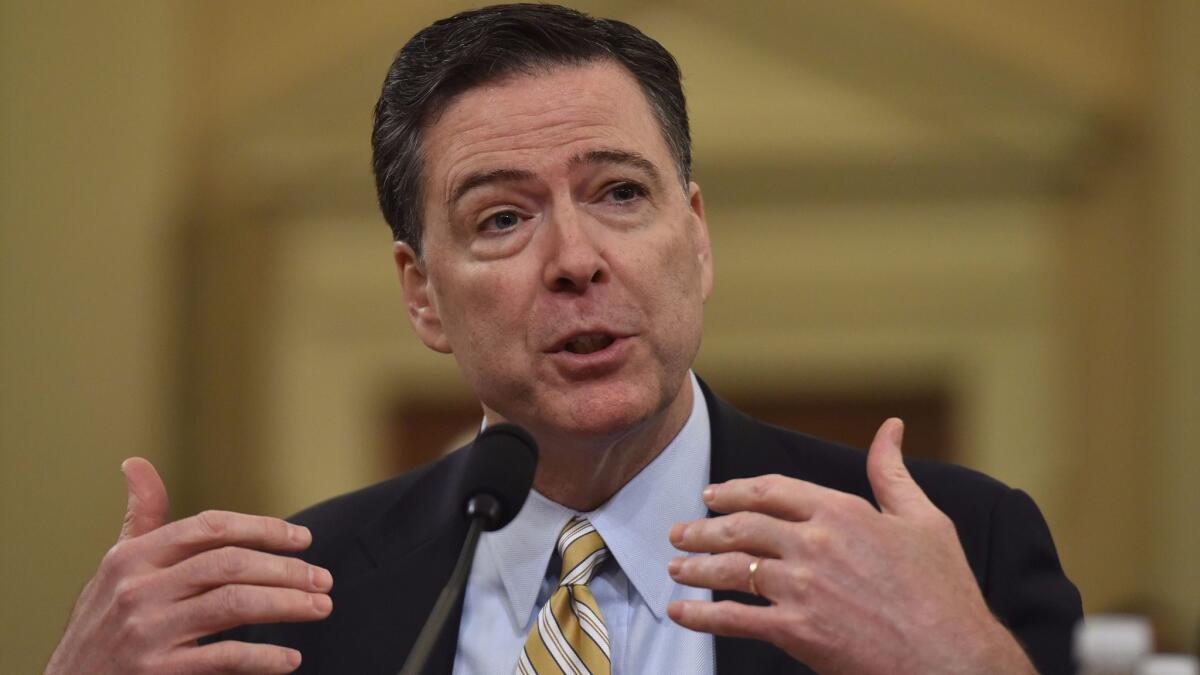
It’s a committee hearing that some in Washington are calling the Capitol Hill Super Bowl.
What more will former FBI Director James B. Comey say about his interactions with President Trump? If he felt pressured by Trump to end an investigation into Russia, then why didn’t he speak out?
These are some of the questions Comey will face Thursday when he appears before the Senate Intelligence Committee. It will be Comey’s first public appearance since Trump fired him last month. Since his dismissal, reports have surfaced that Comey felt Trump was interfering with his investigation into possible collusion between Trump’s campaign and Russia during the 2016 election.
On Wednesday afternoon, the public received a glimpse of some of what Comey will touch on when seven pages of his prepared written testimony were posted on the Senate Intelligence Committee website.
“I need loyalty, I expect loyalty,” Comey says the president told him during a one-on-one meeting in January.
Comey revealed that he told Trump — on several occasions — that the president was not personally under investigation. And it’s that point that conservative media are focusing on ahead of tomorrow’s hearing.
Here are some of this afternoon’s headlines:
Comey clears the air: Ex-FBI boss to say Trump demanded ‘loyalty’; was not under investigation (Fox News)
In the weeks since he fired Comey, Trump has insisted the former FBI director told him that he’s not under any sort of investigation when it comes to a Russian probe surrounding the 2016 election. Trump’s used this defense when pushing back against questions about his potential ties to Russia.
This piece from Fox News — which led its website much of the afternoon — focuses on the portion of Comey’s prepared testimony that notes he informed Trump that he personally is not under investigation.
“The prepared remarks for his opening statement, released by the Senate Intelligence Committee, also make clear that Comey repeatedly assured Trump he was not personally under investigation,” reports Fox News. The theme echoed through much of the afternoon on Fox News’ live broadcasts.
Dan Coats, intel chief: ‘Never felt pressure’ from Trump, White House on how to conduct Russia probe (Washington Times)
Ahead of Thursday’s much anticipated Comey hearing, Dan Coats, director of national intelligence, sat before lawmakers on Capitol Hill on Wednesday.
Among the topics of discussion: Did he ever feel pressure from Trump when it came to the Russia probe?
This piece plays up that Coats said he did not feel pressure. However, Coats, when asked, did not deny a recent news report that Trump once asked him to halt the probe.
A similar report from Breitbart News also focuses on Coats’ comments under the headline: Intel Chief Coats: ‘I’ve never felt pressure to intervene or interfere’ with an investigation
Good news: Trump nominates new set of federal judges, including three to influential circuit courts (TownHall)
Meanwhile, this conservative website doesn’t even play up the Comey news Wednesday afternoon.
Instead, Townhall focuses on Trump’s appointment of conservative judges to federal courts.
“With much of the media ... fixated on Russia, Comey, and potential obstruction, other goings-on inside the Beltway are getting relatively scant attention,” notes the website.
“The White House is ramping up its focus on rebuilding U.S. infrastructure (a common Trump campaign refrain), Republican Senators may be forging ahead with some progress on desperately-needed reforms to Obamacare’s failing status quo, and the president has unveiled another substantial roster of nominees to fill federal court vacancies.”
On Capitol Hill, reaction to Comey splits along familiar partisan lines
Congressional reaction to fired FBI Director James B. Comey’s frank written testimony about his private conversations with President Trump fell swiftly along partisan lines Wednesday as Democrats were startled and Republicans largely shrugged.
House Speaker Paul D. Ryan acknowledged it was not appropriate for Trump to ask for Comey’s “loyalty,” but said he was not ready to draw conclusions.
“We’ve always had investigations of various issues while we also simultaneously work on legislation,” Ryan said on MSNBC. “I’m not going to prejudge any of this.... Let these investigations go where the facts take them and then let’s make some judgments.”
Democrats, though, were blistering in their criticism over Trump’s actions in the White House.
“This whole thing is crazy,” tweeted Sen. Elizabeth Warren (D-Mass.).
Sen. Richard J. Durbin of Illinois, the No. 2 Democrat, said Comey’s remarks “confirmed our worst suspicions: This president was engaged in pressuring the head of the FBI when it came to a criminal investigation. That’s pretty serious.”
Republican leaders largely kept quiet after the Senate Intelligence Committee released Comey’s opening statement ahead of Thursday’s highly anticipated public hearing. Many have said there still is no evidence Trump colluded with the Russians to swing the 2016 election.
Leading Republicans are hesitant to criticize Trump because many of their constituents are sticking with him, as are some of the president’s biggest backers in Congress.
“One question I have is ... why didn’t Comey say something at the time, if it was that blatant?” said Rep. Kevin Cramer (R-N.D.), an early Trump endorser. “For North Dakota, he’s been a great president, so no I don’t have any reservation about that. But we’ll see what comes of all of this. I trust the system, I really do.”
According to Comey’s written testimony, Trump sought the FBI director’s loyalty and asked him to let go of the bureau’s investigation into former national security advisor Michael Flynn’s interactions with the Russians.
“The cloud is not the investigation. The cloud is what the Trump administration brought into the administration with them.... They brought their own cloud with them,” said Sen. Tim Kaine (D-Va.), who was Hillary Clinton’s vice presidential running mate.
Do Trump’s actions amount to obstruction of justice by the president?
“Ask me after tomorrow’s hearing,” Kaine said.
Trump condemns Iran attacks but says states who sponsor terrorism can fall victim to it
President Trump Wednesday condemned dual terrorist attacks in Iran but warned that state sponsors of terrorism “risk falling victim to the evil they promote.”
After remaining unusually silent about the kind of terrorism attack that he usually takes to Twitter to condemn, Trump issued a statement late in the afternoon.
“We grieve and pray for the innocent victims of the terrorist attacks in Iran, and for the Iranian people, who are going through such challenging times,” he said in the two-sentence statement.
But he suggested Iran shared in the blame: “We underscore that states that sponsor terrorism risk falling victim to the evil they promote.”
Gunmen using explosives stormed the Iranian parliament in Tehran and a venerated shrine earlier in the day, leaving 12 people dead and 42 injured.
Islamic State claimed responsibility for its first major attack in the Shiite-dominated country that has been relatively free of the kind of violence engulfing the region.
But the Trump administration has made Iran the focus of its anti-terrorism rhetoric and policies, apparently creating a quandary for how to respond.
The U.S. has long considered Iran to be a sponsor of terrorism outside its borders, although Tehran has been active in the fight against the Sunni-dominated Islamic State, another stated priority of President Trump.
The State Department also issued a brief statement. Although it usually expresses solidarity with and offers assistance to a government in a country where there has been a terrorism episode, it did not do so Wednesday.
“The depravity of terrorism has no place in a peaceful, civilized world,” the department said in a three-sentence statement.
“The United States condemns the terrorist attacks in Tehran today,” the statement said. “We express our condolences to the victims and their families, and send our thoughts and prayers to the people of Iran.”
Separately, the Senate voted overwhelmingly Wednesday to advance a bill that would impose new sanctions on Iran over its ballistic missile program and supply of weapons to militant groups.
Iran supports Houthi rebels in Yemen and groups that the U.S. considers terrorists, such as the Lebanon-based Hezbollah.
Several Democrats said they supported the bill, but would insist on adding another package of sanctions against Russia for its meddling in the U.S. election.
Sen. Dianne Feinstein (D-Calif.) said, however, that she thought the timing was inappropriate.
“The country has just suffered from two significant terrorist attacks after electing a moderate government with 57 percent of the vote—we need to give Iran the opportunity to recover and set a new course,” she said.
1:30p.m.: This post was updated with new information.
Trump demanded ‘loyalty,’ asked for end to Flynn investigation, Comey to testify
President Trump demanded “loyalty” from former FBI Director James B. Comey and asked him to drop at least part of the bureau’s investigation of former National Security Adviser Mike Flynn, Comey plans to testify to Congress Thursday.
In a prepared statement posted on the Senate Intelligence Committee website, Comey says that in a private dinner with Trump on Jan. 27, the president asked him if he wanted to remain as head of the FBI and told him “I need loyalty, I expect loyalty.”
“I didn’t move, speak, or change my facial expression in any way during the awkward silence that followed. We simply looked at each other in silence,” Comey says. He told Trump that he could promise “honesty,” he says.
When Trump responded “honest loyalty,” Comey said “you will get that from me.” The two men may have “understood the phrase ‘honest loyalty’ differently,” he said.
The testimony, largely confirms media reports about the content of memos that Comey wrote after his meetings with Trump.
But going beyond those previous accounts, the testimony, describing nine one-on-one conversations between Comey and Trump paints a picture of a president intensely focused on having the FBI publicly say that he, personally, was not under investigation.
Read the prepared statement >>
According to the testimony, Comey several times told Trump that he was not personally being investigated. But, he adds, he was reluctant to say so publicly because that would “create a duty to correct should that change.”
Just over two weeks after their dinner, Comey says, he had a second meeting with Trump in the Oval Office. After telling Atty. Gen. Jeff Sessions and several top White House officials to leave the office so that the two could talk privately, Trump told him that Flynn, who he had fired the day before “is a good guy and has been through a lot.”
Flynn had not done anything wrong in his conversations with Russian officials, Trump told Comey, according to the testimony.
“He then said, ‘I hope you can see your way clear to letting this go, to letting Flynn go. He is a good guy. I hope you can let this go,’” Comey recounted.
“I had understood the President to be requesting that we drop any investigation of Flynn in connection with false statements about his conversations with the Russian ambassador in December. I did not understand the President to be talking about the broader investigation into Russia or possible links to his campaign,” the testimony says.
In a subsequent telephone call, on March 30, Comey says, Trump told him that the investigation of Russian involvement in the 2016 election was “‘a cloud’ that was impairing his ability to act on behalf of the country.”
Trump said “he had nothing to do with Russia, had not been involved with hookers in Russia, and had always assumed he was being recorded when in Russia,” Comey recalled.
Your guide to the Comey hearing >>
The references to prostitutes refer to a dossier which circulated in Washington late last year containing accounts of purported Russian intelligence material about Trump. The contents of the dossier have never been confirmed and are not believed to be the center of the FBI’s investigation, but were clearly on Trump’s mind in several conversations with Comey, the testimony indicates.
In that conversation, Trump asked Comey “what we could do to ‘lift the cloud.’”
“I responded that we were investigating the matter as quickly as we could, and that there would be great benefit, if we didn’t find anything, to our having done the work well.”
Trump “agreed, but then re-emphasized the problems this was causing him,” Comey said.
Comey says that after consulting with top FBI officials, he decided not to tell anyone at the Justice Department about Trump’s requests.
Trump fired Comey last month, revealing later that “this Russia thing” had been on his mind when he did so.
Trump also derided the FBI director as “crazy, a nut job” to Russia’s foreign minister and ambassador during a private meeting in the Oval Office, according to published reports that cited a leaked White House transcript. The White House has not denied that Trump made the comment.
The Justice Department has appointed a special counsel, Robert Mueller III, to oversee the widening investigation into whether associates of Trump or campaign officials coordinated with Russia. .
Trump and his aides have denied any wrongdoing, arguing that the leaks of classified material to the media have posed a greater threat to national security than Russian meddling in the election.
Selection of FBI director wasn’t simple in Trump’s chaotic White House
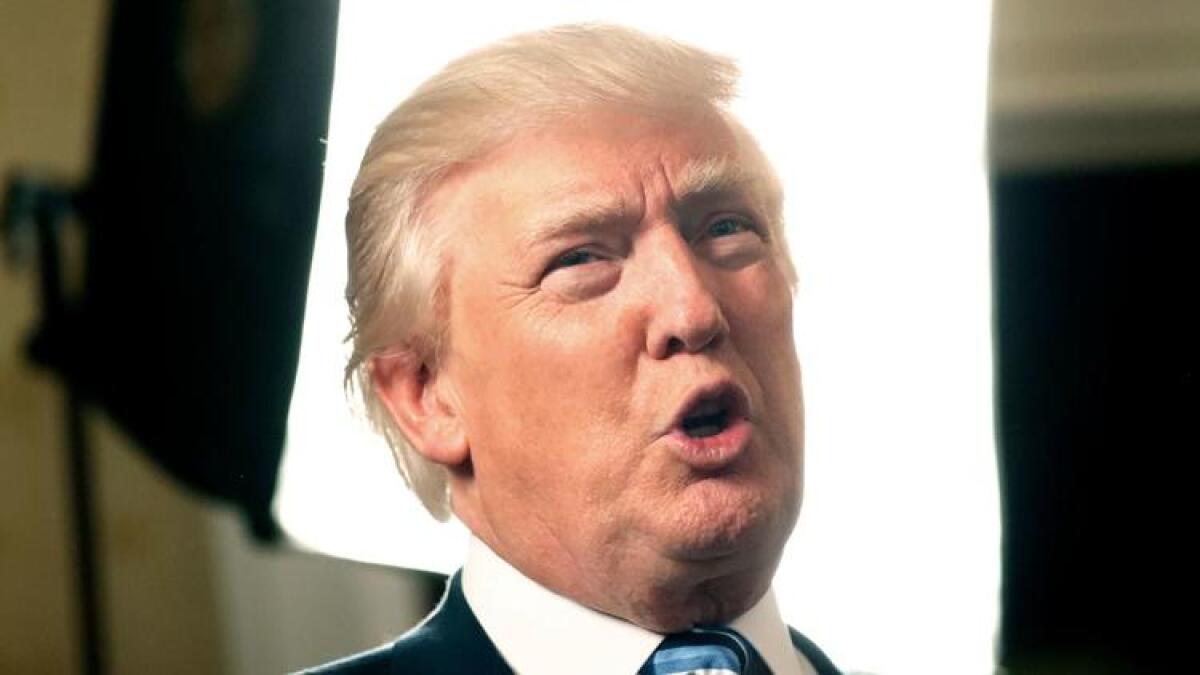
Before choosing former Justice Department official Christopher A. Wray to lead the FBI, President Trump spent a month working through a long list of politicians, former prosecutors and others, in a chaotic month for a White House still struggling to fill many key positions.
Trump abruptly fired James B. Comey on May 9, acknowledging that his frustration about the expanding probe into Russian election interference was on his mind. And he took the action without a strong notion of who he wanted to replace Comey.
In the weeks that followed, a parade of candidates trooped through the Justice Department and White House for interviews in an unusually public display. Several of the leading candidates came from Congress, including former Sen. Joe Lieberman of Connecticut, who at one point was considered the front-runner for the position. But after the Comey firing, some members of Congress were leery of the idea of having a political figure running the bureau.
Lieberman eventually withdrew his name from consideration, along with Sen. John Cornyn (R-Texas), and Rep. Trey Gowdy (R-S.C.). At least three other candidates also pulled their names from a shortlist for the job, including Michael J. Garcia, a New York judge and former U.S. attorney; former FBI official Richard McFeely; and Alice Fisher, a former assistant attorney general.
Aside from the job of FBI director, Trump has been having trouble finding people willing to join the administration – including key positions in agencies and even in the White House, where he is still searching for a new communications director.
Trump settled on Wray after interviewing him last week at the White House, along with former Transportation Security Administration Director John Pistole.
Wray has a long history at the Justice Department, starting in 1997 with a job as a federal prosecutor in Georgia. He came to Washington in 2001 and eventually rose to a job as head of the criminal division. Now in private practice, he represents clients in white collar investigations, notably New Jersey Gov. Chris Christie in the “Bridgegate” probe.
Watch: Former intelligence chief James Clapper says ‘Watergate pales’ to what U.S. is currently confronting
Intelligence officials refuse to say whether Trump asked them to influence FBI’s Russia inquiry
Two senior U.S. intelligence officials repeatedly refused to say Wednesday whether President Trump had asked them to intervene or to publicly downplay the FBI investigation into supposed ties between the Trump campaign and Russia.
Dan Coats, the director of national intelligence, and Adm. Michael S. Rogers, head of the National Security Agency, instead told a Senate committee that they didn’t feel pressured to do anything improper.
The carefully-worded denials appeared aimed at drawing a distinction between being asked by Trump to influence an ongoing investigation, and feeling pressured to do so.
“I have never felt pressure to intervene in any way in shaping intelligence or in an ongoing investigation,” Coats told the Senate Intelligence Committee.
The testimony came near the start of two days of hearings that will look, in part, at whether Trump sought to obstruct an FBI investigation. Former FBI Director James Comey, who Trump fired last month, will testify on Thursday.
>>> Read James Comey’s opening statement for the Senate intelligence panel
The Justice Department has appointed a special counsel, Robert Mueller III, to oversee the widening investigation into members of the Trump campaign and at least one of the president’s top aides for their dealings with Russia during the campaign and the transition.
Coats declined to address a Washington Post report Tuesday that said Trump had urged him to ask Comey to back off the FBI’s investigation of former White House national security advisor, Michael Flynn.
Coats offered to talk about his personal interactions with Trump in a closed committee hearing planed for Tuesday afternoon.
Rogers, who also declined to talk specifically about his dealings with Trump, said that in his three years at NSA, “I have never been directed to do anything I believed to be illegal, immoral, unethical, or inappropriate.”
Sen Mark Warner of Virginia, the ranking Democrat on the committee, said the two intelligence officials owed the public an account of their dealings with Trump and his aides.
“If any of this is true, it would be an appalling and improper use of our intelligence professionals – an act that could erode the public’s confidence in our intelligence institution,” Warner said.. “Any attempt by the White House or even the President himself to exploit this community as a tool for political purposes is deeply, deeply troubling.”
Eric Trump calls father’s critics ‘not even people’

Eric Trump says of his father’s critics: “to me they’re not even people.”
President Donald Trump’s son told Fox News host Sean Hannity on Tuesday that he’s “never seen hatred like this” and “morals have flown out the window” when it comes to attacks against his father.
Eric Trump took special aim at the Democratic Party, which he says is “imploding.” He calls Democratic National Committee Chairman Tom Perez “a total wackjob.” Trump says Democrats “have no message of their own” and are trying to obstruct “a great man” in his father and his family.
In a statement Wednesday, Perez responded: “Democrats are people. So are Muslims, immigrants, women, people with pre-existing conditions, and everyone else Trump is hurting.”
Eric Trump and his brother Donald Jr. are running the family company with their father in the White House.
Watch: Director of National Intelligence Dan Coats says he has ‘never felt pressure to intervene’ in Russia inquiry

Dan Coats, director of National Intelligence, comments on reports Trump asked him to intervene in the Russian investigation.
I don’t think this is the appropriate venue to do this in, given that this is an open hearing.
— Dan Coats
Crunch time as Senate Republicans race the clock on Obamacare repeal — and the rest of Trump’s agenda
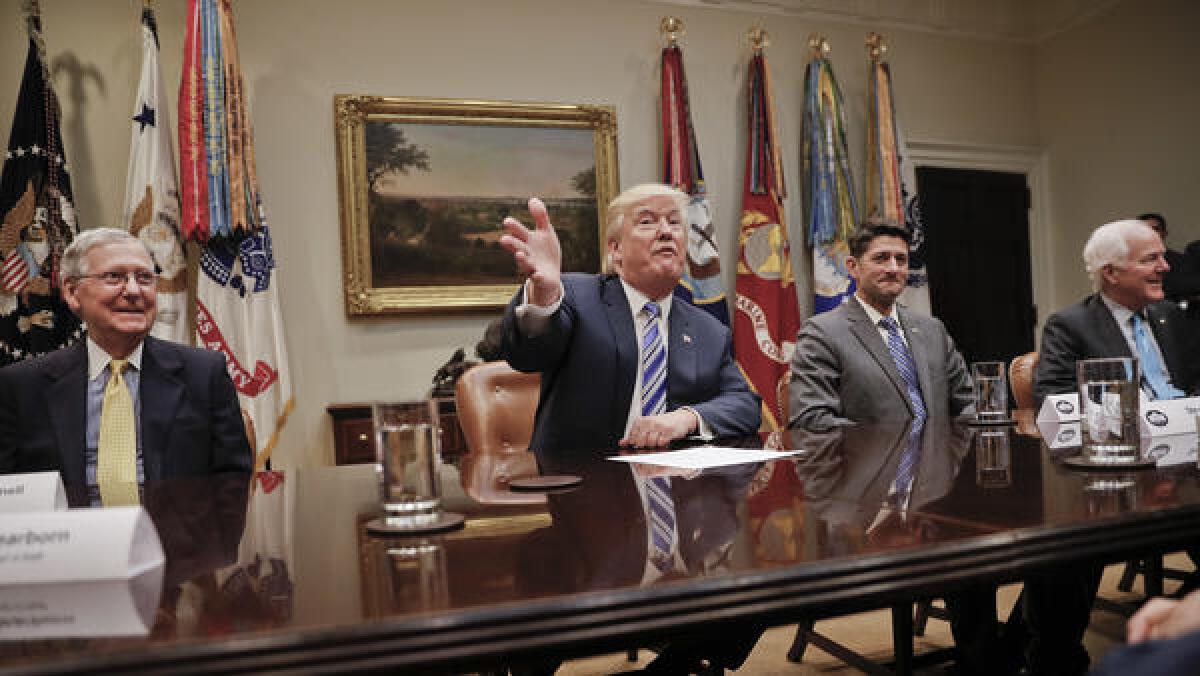
President Trump summoned Republican leaders to the White House on Tuesday to discuss his summer legislative agenda, but progress is being stalled by the GOP’s inability to fulfill its long promise to repeal and replace Obamacare.
Lacking a consensus over how to gut the Affordable Care Act without leaving millions more Americans uninsured — as the House GOP’s bill would do — Senate Republicans now face a legislative logjam that could imperil other priorities, such as tax reform and infrastructure.
This week was expected to be a pivotal one for the healthcare overhaul, which lawmakers hope to finish before the July 4 break in order to move to other pressing issues. Among them is raising the debt ceiling to avoid defaulting on the nation’s bills, always a thorny political lift.
But glum senators emerged from a series of closed-door meetings Tuesday no closer to an agreement than they have been after weeks of private talks.
“The areas we have consensus on? Let’s see, Obamacare sucks,” said Sen. John Kennedy, a first-term Republican from Louisiana. “We may be working on this for a while.”
Watch: NSA Director Michael Rogers tells lawmakers he was never directed to do anything illegal or inappropriate

NSA Director Michael Rogers comments on reports Trump asked him to downplay the Russian investigation.
I have never been directed to do anything I believe to be illegal, immoral, unethical or inappropriate.
— NSA Director Michael Rogers
Trump nominates former Justice Department official Christopher Wray to head the FBI
President Trump announced Wednesday that he would pick Christopher Wray, a former Justice Department official who also has represented New Jersey Gov. Chris Christie, to lead the FBI.
The announcement on Twitter, which caught many in Washington off guard, appeared to be an effort to seize attention ahead of what is expected to be blockbuster congressional testimony from former FBI director James Comey, who is scheduled to appear before the Senate Intelligence Committee onThursday.
Trump called Wray “a man of impeccable credentials” and promised that details of the announcement would follow.
The use of Twitter to make the high-profile announcement solidified the social media tool’s role as Trump’s primary mode of public communication, despite some concern from fellow Republicans. Trump insisted defiantly this week that Twitter remains his best tool to deliver unfiltered news to his supporters.
Wray, who earned undergraduate and law degrees from Yale University, first became a federal prosecutor in 1997, in the Northern District of Georgia, according to his Justice Department biography. He came to Washington in 2001 to become an associate deputy attorney general in the George W. Bush administration, rising to assistant attorney general in charge of the criminal division in 2003, a job he held for two years.
Now in private practice, he represented Christie amid the “Bridgegate” scandal in which two of the governor’s top aides were convicted of creating a massive traffic jam at the George Washington Bridge as political payback against a mayor who declined to endorse Christie in his presidential bid.
Trump interviewed several candidates for the FBI job. Some, including former Sen. Joe Lieberman, took themselves out of the running. The job became vacant after Trump fired Comey amid his investigation into Russian meddling in the 2016 campaign and potential collusion with the Trump campaign.
--
UPDATES
6:09 a.m.: This post was updated throughout with additional details and background.
5:07 a.m.: This post was updated with details on Wray’s background.
Obama says Paris accord will succeed even with the ‘temporary absence’ of U.S.
Former President Obama on Tuesday praised public and private entities for vowing to press ahead with the goals of the Paris accord on climate change, despite his successor’s decision to abandon the landmark global agreement.
Speaking at an event in Montreal, one of the few public appearances he has made since leaving office in January, Obama said he “took great comfort” in watching as states, cities and corporations “made clear that they will keep pushing forward” despite President Trump’s decision last week to withdraw the United States from the 2016 agreement that Obama had considered one of his biggest achievements.
The deal, “even with the temporary absence of American leadership, will still give our children a fighting chance,” Obama said.
The former president made no direct reference to Trump in a wide-ranging speech that also covered income inequality, America’s international alliances, and the opportunities and challenges posed by fast-paced change around the world.
But while Obama’s takes on each topic were familiar ones, his reiteration of his positions only underscored the dramatic changes that Trump has brought in policy and posture on national and global issues.
Facing a Canadian audience, Obama touted the strong ties between the two countries, including their shared roles in multilateral institutions to enhance global security like NATO. That reference to the long-standing mutual-defense pact inevitably called to mind Trump’s failure last month, while at NATO headquarters in Brussels, to formally reaffirm the American commitment to the alliance charter’s Article V, holding that an attack on any one member would be considered an attack on all.
Obama seemed to offer an implied rebuke of Trump in remarks about the recent terrorist attacks in London. He applauded the British for responding “not with fear, but with resolve,” and not with “blame and division.” Trump sparked something of an international incident with tweets that criticized London’s mayor, Sadiq Khan, for remarks that Trump took out of context; other politicians, including the prime minister, rallied to the mayor’s defense.
Obama broke from his prepared text to lament the spread of “bad news, and sometimes fake news,” through social media platforms that, he said, test whether the center will hold.
Obama called for finding new ways to push against propaganda, “cultivate independent journalism, and listen to those with whom we disagree, and work hard to find common ground.”
“Democracy is hard,” Obama said. “Progress does not always move in a straight line. And its gains are often fragile if we as citizens are not tilling the soil and maintaining democracy.”
But, he added, he was confident that “the future does not belong to strongmen.”
During a question-and-answer session, Obama was asked whether any of the women in his family might succeed in shattering the “glass ceiling” to become president. “Michelle will not change her mind,” Obama said flatly, adding that his daughters also were unlikely to seek the presidency.
He did predict that a woman would be elected president in his lifetime, adding, “I don’t know who that will be.”
Sean Spicer returns to the podium, with a bit less confrontation and a few more demurrals
The White House shake-up predicted by some of President Trump’s close associates hasn’t happened. But Tuesday’s press briefing was evidence nonetheless of a few changes in the West Wing communications strategy.
Most relate to White House Press Secretary Sean Spicer, whose job is often the subject of speculation. Tuesday was Spicer’s first solo on-camera briefing in a week, a sign that his formerly near-daily presence on television has greatly diminished.
Other would-be changes have yet to happen, including the formation of a so-called war room run by former Trump campaign associates, to fend off the storm of controversies surrounding the president and his administration.
Spicer was notably less confrontational than usual, and cautious in speaking on behalf of Trump. He dodged several questions by saying he did not know the president’s position on some topics — including, notably, whether Trump retains confidence in Atty. Gen. Jeff Sessions — because, “I have not had that discussion with him.”
Spicer has been using a version of that answer more often to avoid tough questions. Perhaps more significantly, it also helps him avoid being contradicted later by his boss, who’s stepped on his aides’ message more than once.
Tuesday also saw the return of Skype questions from local reporters outside of Washington, a feature Spicer introduced early in Trump’s term that had faded in recent weeks.
It can lead to friendlier questions, but not always. Spicer did, however, turn to outlets he might have expected to be friendly.
Last week, Spicer gave a single full on-camera briefing on Tuesday, after a two-week absence during Trump’s overseas trip.
On Wednesday, he gave a shorter off-camera “gaggle,” leaving Veterans Affairs Secretary David Shulkin to take questions in his sphere. Spicer stayed off camera again on Thursday, the day Trump held a big Rose Garden event to publicly announce he was removing the U.S. from the Paris climate agreement. He returned Friday for a cameo while Scott Pruitt, administrator for the Environmental Protection Agency, took questions.
By this week, Spicer-watchers were wondering yet again about his future when Sarah Huckabee Sanders, his top deputy, led Monday’s briefing. Sanders even fielded a few questions about Spicer’s absence from April Ryan, a reporter for American Urban Radio Networks.
“I’m just filling in for the day, April,” Sanders said. “There are a lot of demands on his schedule, particularly given the fact that there’s not a communications director. And this is part of my job as well, and when I’m needed, I’ll step in.”
Communications Director Mike Dubke’s departure was announced last week. Dubke, who stuck around a few weeks after his mid-May resignation, until last Friday, was widely expected to be just the first from the communications team to go.
Stay tuned, though. The Trump administration likes surprises.
Trump says he helped Saudis make Qatar decision
President Trump on Tuesday appeared to be taking credit for spurring Saudi Arabia and four other Arab nations to break off diplomatic and economic ties with neighboring Qatar -- a development that creates complications for U.S. policy.
“So good to see the Saudi Arabia visit with the King and 50 countries already paying off,” Trump boasted in a morning tweet. “Perhaps this will be the beginning of the end to the horror of terrorism.”
Trump suggested that during his visit to Riyadh, the Saudi capital, last month, when King Salman lavished praise and hospitality on him, many of the Gulf Arab nations in attendance pointed to Qatar as a main financier of terrorism.
Qatar has long been one of the United States’ closest Persian Gulf allies, and is host to the massive army and Air Force bases that form the bedrock of U.S. military action in that part of the Middle East.
“They said they would take a hard line on funding extremism,” Trump tweeted, “and all reference was pointing to Qatar.”
This left State Department officials struggling to make sense of the diplomatic break.
“We recognize that Qatar has made great efforts to stop the financing of terrorism,” State Department spokeswoman Heather Nauert said Tuesday. “But they still have a lot of work to do.”
She acknowledged that the United States was informed of the action by Saudi Arabia, Egypt, United Arab Emirates, Bahrain and Yemen only shortly before it was announced.
Qatar has done business in the past with Saudi Arabia’s archenemy Iran and tolerated some militant Islamist groups. But it is also base for the Al Jazeera television network, respected in much of the Arab world.
The Pentagon, meanwhile, said operations at the Al Udeid Air Base, 20 miles southwest of the Qatari capital of Doha, were not affected. It is home to 10,000 U.S. troops and serves as a launching base for many of the U.S. actions against Islamic State.
Secretary of State Rex Tillerson, traveling in Australia and New Zealand, sought to downplay the rift, saying his government would be willing to work to mend ties.
Asked if Trump’s tweets are good for U.S. foreign policy, Nauert quoted Tillerson, who said Trump had his “own unique way” of communicating and that it seemed to serve him “well.”
President Trump wants a travel ban, and conservative media agree
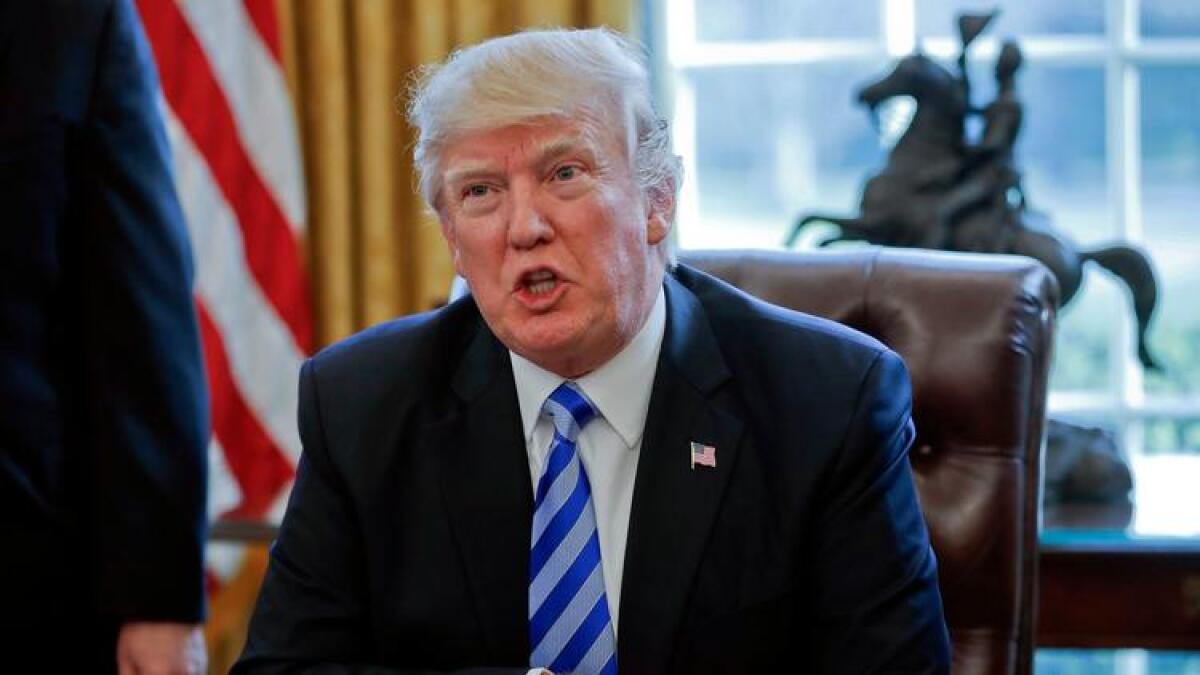
For President Trump, the recent terrorist attacks in London have created new rationale for a travel ban.
In the wake of Saturday’s attack, in which seven people were killed by three assailants who used a van to ram pedestrians on London Bridge and then slashed patrons in nearby Borough Market, Trump has sent a barrage of tweets insisting a travel ban is necessary to keep Americans safe. So far, Trump’s proposed ban has been stalled in federal courts.
Throughout the campaign and into his fledgling administration, conservative media have backed Trump’s calls for a travel ban. The latest attack has only amplified that support.
Here are some of today’s headlines:
16 states ask Supreme Court to revive Trump travel ban (Washington Times)
It’s possible Trump’s proposed travel ban, which bars temporary travel to the United States from six majority-Muslim countries, is headed to the Supreme Court. The Supreme Court is expected to decide in a few weeks whether to hear the government’s appeal of a 4th Circuit ruling against the travel ban.
This piece, displayed prominently on the Washington Times website much of the morning, notes that Republican officials from more than a dozen states – all conservative-leaning -- have called on the Supreme Court to allow Trump’s travel ban to be implemented.
“The states said Mr. Trump has broad powers under the law to decide whom to admit, and said U.S. law is replete with examples of the government singling out groups for different treatment in immigration contexts,” the conservative newspaper reports.
The states include Texas, Alabama, Arizona, Arkansas, Florida, Kansas, Louisiana, Montana, North Dakota, Ohio, Oklahoma, South Carolina, South Dakota, Tennessee, West Virginia, and Mississippi.
Breitbart editor fired for anti-Muslim tweets after London attack (Newsweek)
An editor from this right-wing website seems to have gone too far.
In the wake of the London attack, as Trump used Twitter to call for a travel ban and assailed London Mayor Sadiq Khan, Breitbart editor Katie McHugh was also on social media.
“There would be no deadly terror attacks in the U.K. if Muslims didn’t live there. #LondonBridge,” she tweeted over the weekend.
Those comments got her fired. McHugh used Twitter to announce her dismissal on Monday.
“Breitbart News fired me for telling the truth about Islam and Muslim immigration,” she tweeted.
Britain pays the price for complacency (American Spectator)
The London terrorist attack on Saturday was the third such attack in Britain in a three-month span.
Like Trump, who has questioned the willingness of Britain – and Europe – to combat terrorism, this piece argues that complacency has plagued the country.
“Several thousand British Muslim men and women joined the ranks of the Islamic State, according to British Muslim MP Khali Mahmood, including the infamous ‘Jihadi John’ Mohammed Emwazi, who was responsible for the beheading of Western hostages, including journalist James Foley,” writes Peter G. Riddell.
He adds, “British political leadership has let the threat to Britain from radical Islamist extremists drift for a generation. Time will tell whether the British government about to be chosen in the national elections of June 8 will grasp the nettle and take the courageous decisions needed to extricate Britain from its present dire predicament.”
Acting U.S. ambassador in China quits over climate deal withdrawal
The acting U.S. ambassador in China has resigned after saying he could not support President Trump’s decision to withdraw from the Paris climate accord.
State Department officials confirmed Tuesday that David Rank, a highly-regarded diplomat with nearly three decades of service at the State Department, had resigned his post in what they described as a “personal” decision.
But Rank told embassy staffers that he refused to inform China of Trump’s withdrawal last week from the historic accord and, as a consequence, felt obliged to step down, a State Department official said, speaking anonymously to discuss internal matters.
Rank reportedly told his staff that “as a father and as a Christian” he could not go along with Trump on leaving the vital environmental pact, which aims to limit global warming, according to the official.
China and the United States are the largest emitters of carbon dioxide and other greenhouse gases, which the accord seeks to reduce so that global temperatures will not rise by more than 2 degrees Celsius compared with pre-industrial levels.
Almost every country in the world signed the agreement, with China and the Obama administration leading the way. Only Syria, Nicaragua and now the United States have rejected it.
In announcing his plans to withdraw last week, Trump said the accord would undermine the U.S. economy and “weaken our sovereignty.”
Ranks’ resignation comes as the State Department and numerous other government agencies are struggling to fill key positions.
Just eight of 120 State Department posts, including ambassadorships, that require Senate confirmation have been filled, the Partnership for Public Service said last week.
It often falls to less experienced diplomats and other officers to handle delicate policy with so many senior positions still unfilled by Secretary of State Rex Tillerson and the White House.
The Senate last month confirmed Terry Branstad to be U.S. ambassador to China, but the former Iowa governor has not yet taken up his post in Beijing.
Eric Pelofsky, a former Middle East advisor to Obama, described Rank on Twitter as “an amicable, dedicated, hardworking, apolitical @StateDept public servant/FSO.”
Trump opens ‘infrastructure week’ without a plan, and calls for privatizing air traffic control
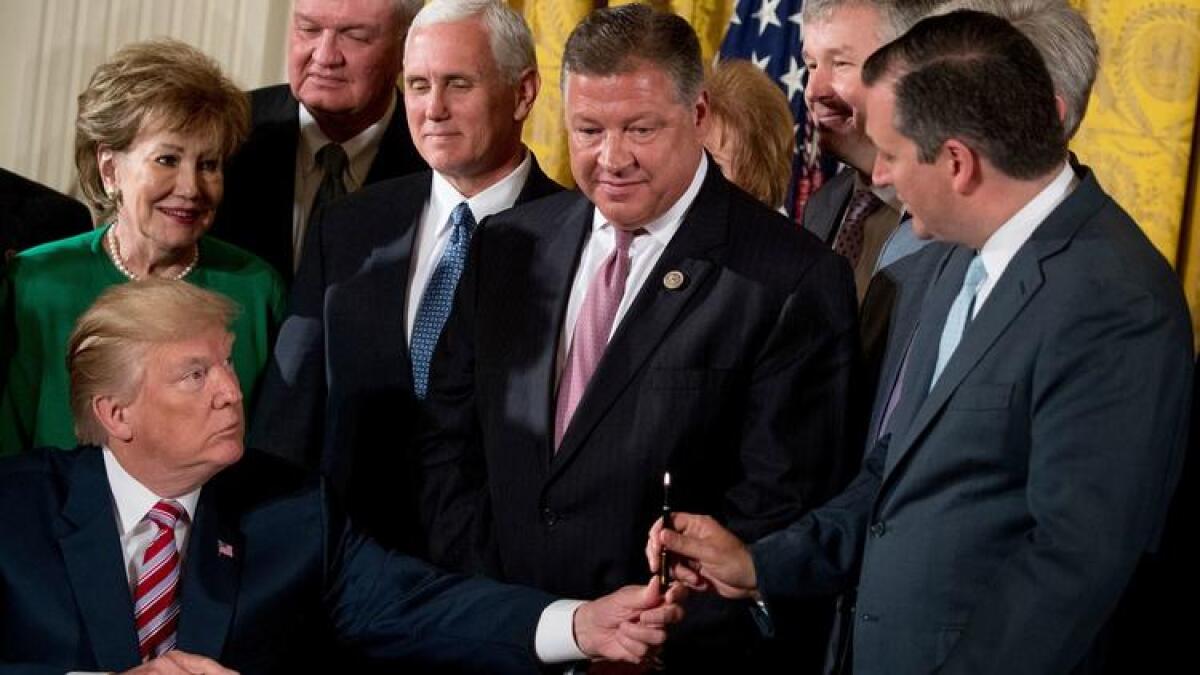
President Trump employed all the trappings traditionally reserved for signing major bills into law as he kicked off “infrastructure week” at the White House on Monday: the stately East Room full of dignitaries, a four-piece military band to serenade, celebratory handshakes and souvenir presidential pens for lawmakers, promises of “a great new era” and a “revolution” in technology.
Yet the documents Trump signed amid all the pomp were not new laws or even executive orders. They were routine letters to Congress, relaying support for a minimally detailed plan in Trump’s budget to transfer control of the nation’s air traffic control system to a private nonprofit group.
This was the ceremonial opening to Trump’s full week of infrastructure promotion, which is scheduled to include a speech along the Ohio River on Wednesday and a White House meeting with mayors and governors on Thursday.
But it was also the latest example of a pattern of the administration claiming to have sent Congress fully constructed policies when it has provided only facades — creating the appearance of substantive heft and legislative action even in cases where there is next to none.
Trump to nominate Joseph Otting, former OneWest Bank CEO and Mnuchin ally, to key financial regulatory post

President Trump intends to nominate Joseph Otting, the former chief executive of Pasadena’s OneWest Bank and an ally of Treasury Secretary Steven Mnuchin, to a key financial regulatory position.
Otting is being tapped to be the comptroller of the currency, a powerful regulator who oversees federally chartered banks, the White House announced Monday night.
Those include the banking arms of some of the largest financial institutions in the country, including JP Morgan Chase & Co. and Wells Fargo & Co.
The Office of the Comptroller of the Currency, which is an independent bureau of the Treasury Department, was a pivotal player in the $185-million settlement Wells Fargo agreed to pay last year over its creation of unauthorized customer accounts.
Contractor is charged with leaking top-secret document about Russian hacking
A woman who worked as a records contractor for the federal government has been arrested on charges of turning over a secret document to a news organization, the first arrest of an alleged leaker by the Trump administration.
The woman, Reality Leigh Winner, 25, of Augusta, Ga., was arrested over the weekend, the Justice Department said Monday.
According to an affidavit, Winner admitted providing the document to a news organization. Although the document and the media company were not identified in the affidavit, the announcement of the arrest came just hours after the Intercept published a National Security Agency analysis that concluded that Russian hackers were able to penetrate an American technology company that works with voter data.
The FBI said Winner went to work in February at a government facility in Georgia as an employee of Pluribus International, a firm based in Alexandria, Va., that does work for a number of intelligence and military agencies, according to its website.
The document, classified as top secret, was dated May 5; four days later, Winner printed it, the FBI said. An audit showed that just six people printed the document, including Winner, and that her work computer showed she emailed the news organization, the FBI said.
When agents showed up at her home, Winner admitted taking the report to her home and mailing it to the news organization, FBI Agent Justin Garrick wrote in the affidavit. She was charged with one count of violating the Espionage Act.
In its report, the Intercept said it received the NSA report anonymously and independently verified its authenticity. The NSA document was dated May 5, the same day as the one Winner was charged with copying.
The document says a cyberattack by Russian military intelligence penetrated one U.S. elections supplier and targeted more than 100 local election officials just weeks before last year’s election.
Winner’s attorney, Titus Thomas Nichols, in an interview with the Associated Press declined to confirm that she was accused of leaking the NSA report received by the Intercept. He also declined to name the federal agency for which Winner worked.
“My client has no [criminal] history, so it’s not as if she has a pattern of having done anything like this before,” Nichols said. “She is a very good person. All this craziness has happened all of a sudden.”
Russian President Vladimir Putin last week denied that his government led an attack targeting U.S. elections, though he said the effort might have been led by “patriotic” Russian freelancers.
President Trump, meanwhile, has fumed about leaks related to Russian hacking and the investigation into whether anyone in his campaign colluded with the effort.
“The FBI is totally unable to stop the national security ‘leakers’ that have permeated our government for a long time,” he tweeted in February. “Classified information is being given to media that could have a devastating effect on U.S. FIND NOW.”
The Associated Press contributed to this report.
Supreme Court will decide whether police can use cellphone data to track suspects
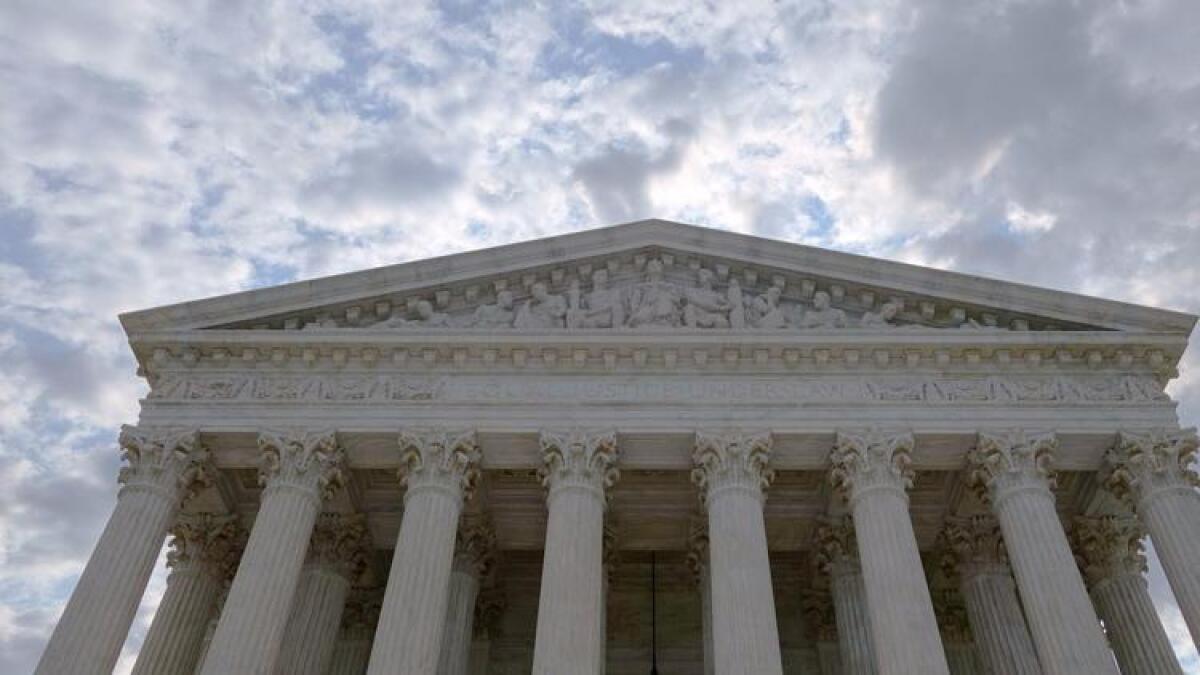
The Supreme Court has agreed to decide whether police need to provide evidence of a crime before they may obtain data from cellphone towers that show where a suspect has traveled.
Although it revolves around the right to privacy, the case does not involve intercepting private conversations over a cellphone or seizing the personal data that are stored in the phone.
Three years ago, in Riley vs. California, the court said police need a search warrant and evidence of “probable cause” before they may download the contents of a phone.
But most courts have said people do not have the same right to privacy for data kept by others, including the logs of calls that are maintained by telephone companies.
Trump attacks London mayor for a second day
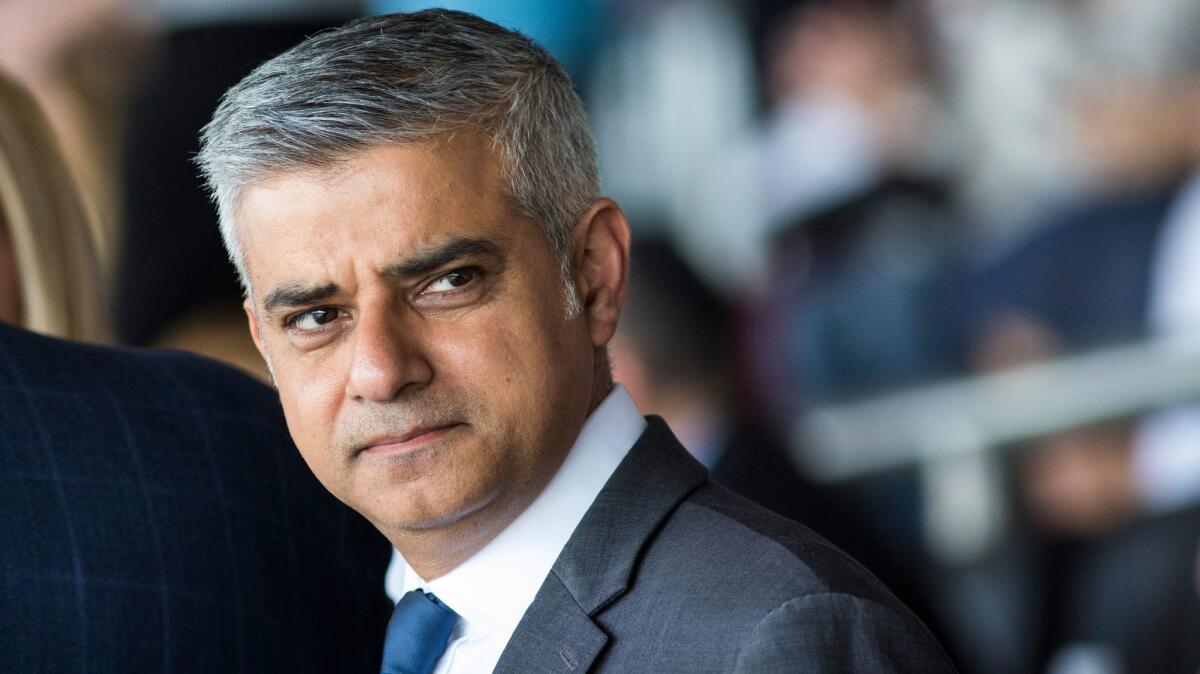
President Trump continued for a second day to attack London’s mayor, Sadiq Khan, as that city dealt with a weekend terror strike, prompting Britain’s prime minister among others to come to Khan’s defense.
On Monday morning Trump took to his preferred medium, Twitter, just as he had the day before, to criticize Khan for telling Londoners -- in Trump’s words-- that they had “no reason to be alarmed.” But Trump took Khan’s remarks out of context, suggesting the mayor -- a Muslim -- was being dismissive of terrorism when in fact Khan was reassuring his constituents about the expanded police presence in London.
Khan declined to engage Trump, yet the president wrote this on Monday, hitting the “MSM”-- mainstream media -- as well:
For all the chatter in the media about Trump’s uncharitable response to the terrorist attack, what spoke loudest was the blowback against Trump from British politicians of both parties -- and the acting American ambassador.
Prime Minister Theresa May, asked about the president’s barbs, said, “I think Sadiq Khan is doing a good job and it’s wrong to say anything else - he’s doing a good job.”
May, who is campaigning for Conservative Party candidates for British elections Thursday, is of a different party than Khan.
In a remarkable counter to Trump’s tweets, the acting United States ambassador to the United Kingdom, Lewis Lukens, tweeted praise for Khan on behalf of the embassy in London:
Trump’s criticism of the mayor revived a spat with Khan from the 2016 campaign, when Khan responded to questions about candidate Trump’s proposed ban on Muslim visitors to the United States. Later on Monday, Trump aides admonished reporters to quit focusing on the president’s tweets.
White House says it won’t try to block Comey’s testimony

President Trump won’t try to use executive privilege to block former FBI chief James Comey from testifying this week, the White House said today, ruling out an option that legal experts said would have been nearly impossible to carry out.
For several days, White House aides had kept alive speculation that Trump might try to invoke executive privilege to block Comey’s scheduled appearance before a Senate panel this week.
But White House spokesperson Sarah Sanders officially called a halt to the talk on Monday, declaring that “the president will not invoke executive privilege.”
Despite the widespread speculation about executive privilege, many legal experts said the idea bordered on absurdity.
The doctrine of executive privilege holds that under certain circumstances, the president can order government officials not to talk to Congress about confidential advice they have given. The executive branch can use the privilege as a shield to prevent officials from being forced to testify against their will.
But Comey is no longer a government official, since Trump fired him, and is testifying voluntarily. To invoke executive privilege to block him, the White House would have had to go to federal court and convince a judge to issue an order forbidding Comey from talking.
An order of that sort almost certainly would have been challenged as a violation of Comey’s right to free speech as well as Congress’ right to hear testimony about public policy. It also would have been politically unfeasible.
Watch live: White House news briefing with Sarah Sanders, principal deputy press secretary
Watch live: President Trump announces plan embracing privatization of air traffic control system
President Trump plans to lay out his vision for overhauling the nation’s air traffic control system on Monday, outlining his goals to privatize the system in a White House speech.
Trump will push for the separation of air traffic control operations from the Federal Aviation Administration, embracing an approach long championed by U.S. airlines, according to White House officials. Joined by airline industry executives, Trump is expected to point to the changes as a way of accelerating a more modern air traffic control system.
“We’re really moving into the modern decade of technology in air traffic control. It’s a system where everyone benefits from this,” White House economic adviser Gary Cohn said in a conference call with reporters. Trump’s budget plan released this year called for the changes, placing air traffic operations under an “independent, non-governmental organization.”
There are about 50,000 airline and other aircraft flights a day in the United States. Both sides of the privatization debate say the system is one of the most complex and safest in the world.
U.S. airlines have been campaigning for more than two decades to separate air traffic control operations from the FAA. That effort picked up steam last year when the union that represents air traffic controllers agreed to support a proposal by House Transportation and Infrastructure Committee Chairman Bill Shuster (R-Pa.) to spin off air traffic operations into a private, nonprofit corporation in exchange for guarantees that controllers would retain their benefits, salaries and union representation.
Airlines have been lobbying vigorously for the change, saying the FAA’s NextGen program to modernize the air traffic system is taking too long and has produced too few benefits. The changes would involve moving from the current system based on radar and voice communications to one based on satellite navigation and digital communications.
Airlines and the controllers union say that the FAA’s effort to modernize the air traffic system has been slowed down by the agency’s dependence on inconsistent funding from Congress and occasional government shutdowns and controller furloughs. As a result, the FAA has had difficulty making long-term commitments with contractors.
Union officials have complained that the FAA has been unable to resolve chronic controller understaffing at some of the nation’s busiest facilities and pointed to the modernization effort’s slow progress.
But FAA Administrator Michael Huerta has said the agency has made progress during the past decade in updating its computers and other equipment in order to move from a radar-based to a satellite-based control system.
Winning congressional approval would still be an uphill battle for Trump. Democrats have largely opposed the changes, warning that the proposed board overseeing the estimated 300 air traffic facilities and about 30,000 employees would be dominated by airline interests.
They have also pointed to the unprecedented safety under the current system and noted repeated computer system failures in recent years by U.S. airlines, questioning whether they are ready to handle complex technology modernizations.
Trump’s plan would also eliminate taxes on airline passengers in favor of a system of user fees. Key members of tax-writing committees have questioned whether corporations can legally impose fees, which can be viewed as taxes, on air traffic system users.
Business aircraft operators, private pilots and nonhub airports have also expressed concerns they may need to pay more and get less service under a private corporation even though airlines have promised that won’t happen.
President Trump not saying ‘You’re hired!’ often, as White House leaves many top slots vacant
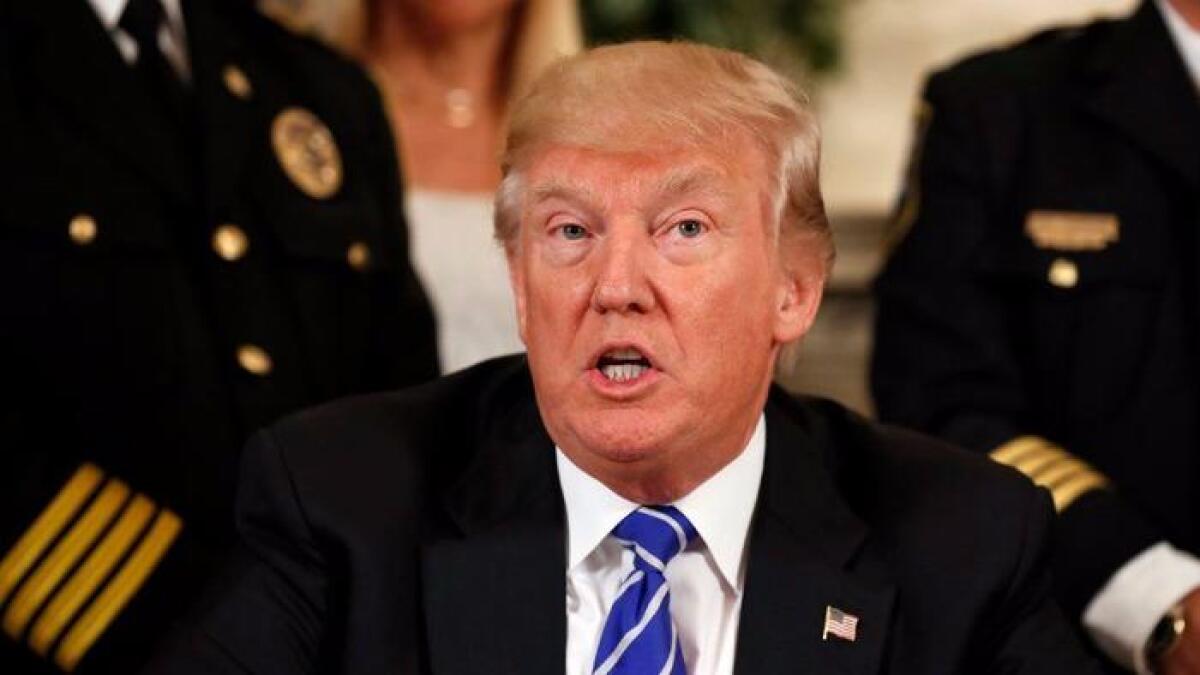
Many of the office suites reserved for top civilian officials at the Pentagon sit empty or have temporary fill-ins while Secretary of Defense James N. Mattis worries about North Korea and Iran.
Treasury Secretary Steven Mnuchin lacks appointed loyalists in any of the 17 top spots below him as he rewrites the nation’s byzantine tax code. Secretary of State Rex Tillerson similarly relies on a skeleton staff to conduct global diplomacy, with dozens of jobs open.
And in the White House, President Trump still depends on a communications director who resigned last month — because he hasn’t found a replacement.
More than four months after taking office, the president who built his brand telling people “You’re fired!” is having a hard time staffing up.
Trump assails Justice Department court strategy on travel ban
President Trump’s lawyers found themselves undercut by their client Monday when the chief executive tweeted that he wanted a “travel ban” and “not the watered down, politically correct version they submitted” to the Supreme Court.
Last week, the Justice Department filed a lengthy appeal at the high court that sought to minimize the impact of Trump’s travel order. They said it called for a limited and “temporary pause” for certain travelers from six countries, not a travel ban.
But in his tweets on Monday, Trump said he did not agree with his Justice Department or with how they characterized what he planned to do.
NATO chief calls London assault an attack on open societies
NATO Secretary-general Jens Stoltenberg, who was Norway’s prime minister during a mass shooting there in 2011, said Sunday that the terrorist attack in London was an assault on open, free societies.
“The terrorists, they want to change the way we live,” he said on CBS’ “Face the Nation.” “They want to attack our open, free societies.”
He urged people to “continue to live the lives we want to live, because then the terrorists will lose.”
Stoltenberg said the London attack underscored the importance of using many tools against terrorism: fighting the ideology of extremism, taking political and diplomatic steps, and using the military, as is occurring in Afghanistan, Iraq and elsewhere.
Trump’s tweets on London terrorist attack strike a combative tone
President Trump struck a discordant note Sunday in his response to the terrorist attack in central London that killed seven people and injured scores more.
In a series of tweets Sunday morning, Trump disdained the gun debate in the United States, slammed London Mayor Sadiq Khan and lambasted “politically correct” attitudes as an impediment to security.
Most world leaders had confined their messages to solemn expressions of sympathy and support for the victims, the British people and the government of Prime Minister Theresa May.
As the attack was unfolding Saturday night, the president tweeted an unconfirmed account of events and renewed his call for his travel ban – rejected by lower courts and now under appeal to the Supreme Court – to be reinstated.
Trump’s initial tweet Sunday implied that safety considerations were being overridden by too-careful sensitivities for issues like ethnicity and religion – although May responded to the attack with a call Sunday for tougher measures to fight Islamic extremism.
The president next took aim at Sadiq Khan, the mayor of London, a Briton of Pakistani descent. Khan, who like Trump often uses Twitter to communicate with constituents, had told Londoners and visitors not to be alarmed by the heavy and visible police and security presence, saying it was necessary for public safety.
Trump took that as a false reassurance.
That drew a riposte from “Harry Potter” author J.K. Rowling, who has emerged as one of Trump’s harshest online critics. (She had also posted the video of him appearing to shove the prime minister of Montenegro out of the way at last month’s NATO summit, tweeting then: “You tiny, tiny, tiny little man.”)
On Sunday, she defended Khan:
The president also conflated the London attack with debate that flares up periodically in the United States when guns – sometimes military-grade weapons – are used in mass shootings. Trump and many of his supporters adamantly reject any efforts to restrict access to weaponry through tighter registration requirements.
Trump on Sunday visited his golf club in Virginia for the second day in a row.
Nikki Haley says Trump believes in climate change caused by pollution
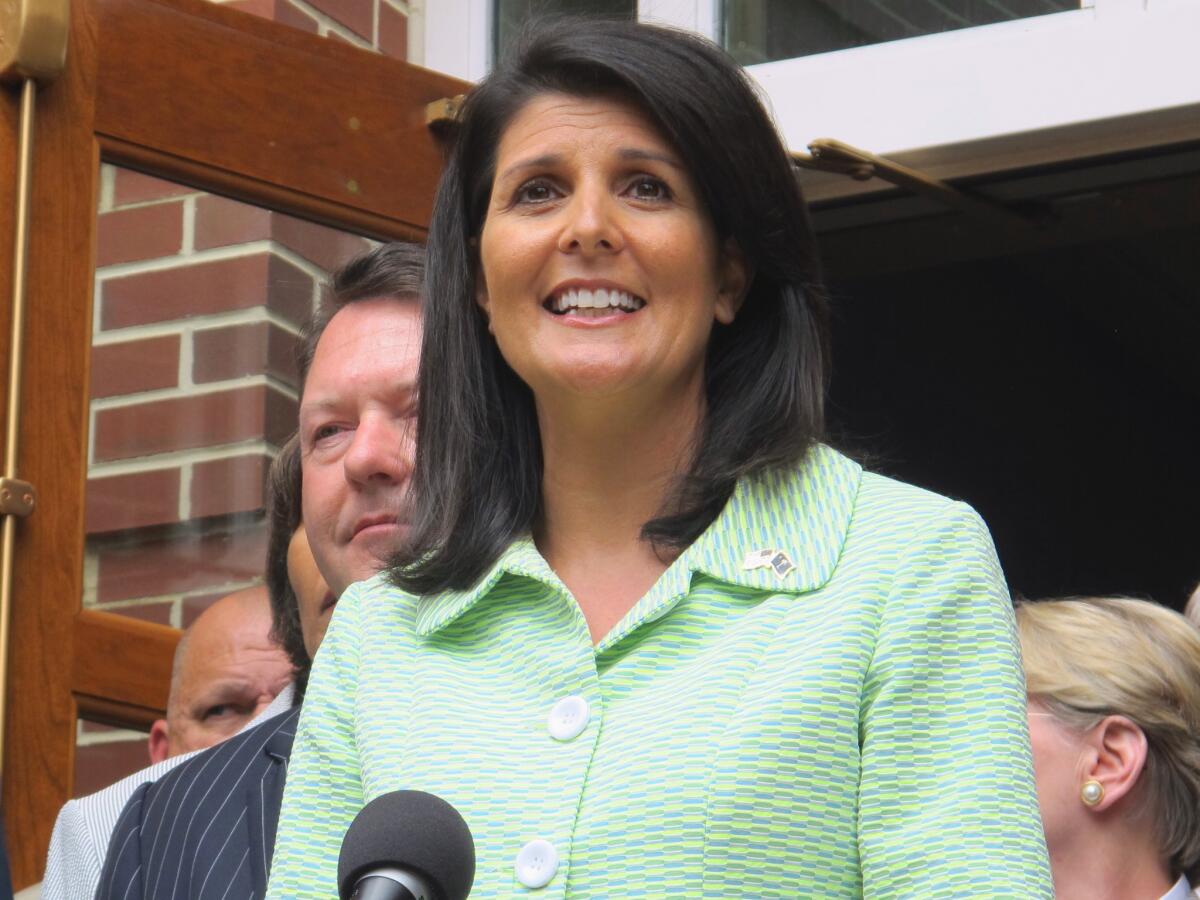
When President Trump announced Thursday that he was withdrawing from the Paris climate agreement, he never said whether he believed in the science of global warming or if he still considers it a hoax, as he has said in the past.
At least one of his aides, Nikki Haley, the U.S. ambassador to the United Nations, insists that Trump has accepted that the climate is changing and carbon emissions are partly to blame.
“President Trump believes the climate is changing,” she said on CNN’s “State of the Union,” which airs Sunday. “And he does know that pollutants are a part of that equation.”
The Paris agreement sets nonbinding targets for greenhouse gas emissions for the 194 countries that signed it. The U.S. joined only Syria and Nicaragua in rejecting it.
“Just because we got out of a club doesn’t mean that we don’t care about the environment,” Haley said.
Haley didn’t say how she knows Trump’s views. She previously has voiced positions at the U.N. that were at odds with what Trump had publicly stated or tweeted.
Haley, the former Republican governor of South Carolina, restated Trump’s argument that the Paris agreement was disadvantageous to some U.S. companies.
“I knew that as a governor,” she said. “We know that now. The jobs were not attainable as long as we had to live under those regulations. It wasn’t possible to meet the conditions under the Paris agreement had we even attempted to do that.”
She added: “We’ve got a president who is going to watch out for the environment. It’s what we do. It’s who we are. We’re going to continue to be a leader in the environment.”
Administration officials have been unable to say with confidence since Thursday’s announcement whether Trump believes in the science of global warming or still considers it a hoax.
White House spokesman Sean Spicer, asked at Friday’s press briefing whether Trump thought climate change was a hoax, said: “I have not had an opportunity to have that discussion.”
Special counsel investigation includes Manafort case, may expand to attorney general
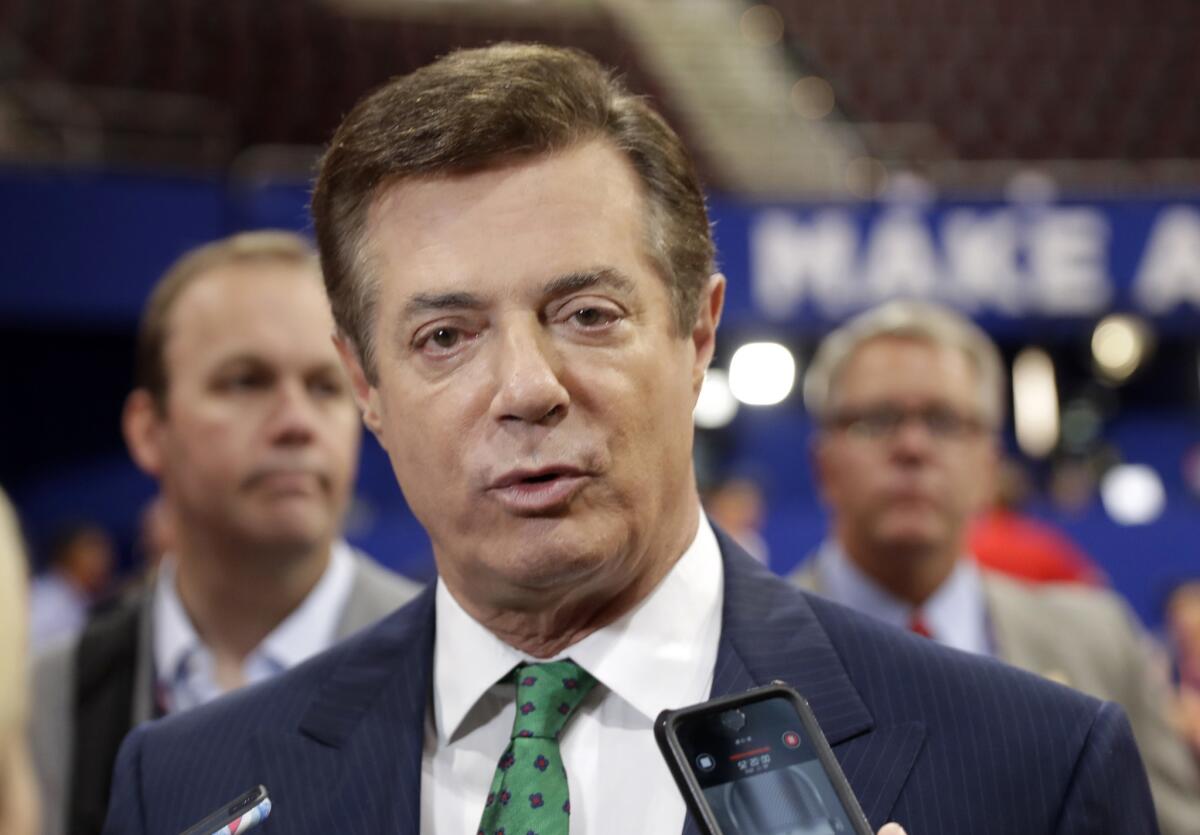
The Associated Press has learned that the special counsel running the U.S. investigation into possible ties between President Trump’s campaign and Russia’s government has assumed oversight of an ongoing investigation involving former Trump campaign chairman Paul Manafort.
The investigation by special counsel Robert Mueller may also expand to look into the roles of Atty. Gen. Jeff Sessions and Deputy Atty. Gen. Rod Rosenstein in the firing of FBI Director James B. Comey.
The Justice Department’s criminal investigation into Manafort, who was forced to resign in August amid questions over his past business dealings in Ukraine, predated the election and the counterintelligence probe investigating possible collusion between Moscow and associates of Trump.
The move to consolidate the matters indicates that Mueller is assuming a broad mandate in his new role.
Putin says claims of Russian meddling in U.S. election are ‘just some kind of hysteria’
Russian President Vladimir Putin sparred with NBC’s Megyn Kelly during a wide-ranging panel discussion Friday that at times turned intense and fiery as Putin once again denied that Russia tried to interfere in last year’s U.S. presidential election.
“It’s just some kind of hysteria, and just doesn’t stop! Someone needs to give you a pill or something!” Putin said in response to Kelly’s question about new allegations that President Trump’s election campaign tried to create back channels of communication with the Kremlin. “Does someone have a pill? Seriously.”
Putin’s comments drew laughs from the audience, which had gathered in St. Petersburg, Russia, for an annual economic forum held over three days. Kelly moderated Friday’s panel, which also included Austrian Chancellor Christian Kern and Indian Prime Minister Narendra Modi.
Earlier during Friday’s event, Putin called on a group of senior American business executives to help reverse the worsening of relations between the two countries.
“Help us restore normal political dialogue,” Putin said.
Kelly directed most of her questions at Putin, asking him to respond to allegations in the ongoing U.S. investigations of possible collusion between the Kremlin and the Trump campaign to influence to presidential election.
Kelly said the U.S. intelligence community and “even some of your defenders” believe that Russia was behind the hacking of Democratic National Committee emails. “Are they all wrong?” she asked.
Putin said that evidence presented so far was “nothing concrete, only assumptions.” When asked about the meetings between Russian Ambassador Sergey Kislyak and members of Trump’s campaign team, Putin appeared frustrated and defensively laughed off the allegations.
“It’s his job, he gets paid for this,” Putin said about Kislyak’s meetings with Trump’s team. “He must meet, discuss current affairs, negotiate. That’s what he’s there to do!”
Putin’s intense responses were unusual for the Russian president, who is typically calm and steady in his speech. The event comes two days before a scheduled airing of Kelly’s one-on-one interview with Putin on Sunday.
After fielding several questions about Russian involvement in U.S. elections, Putin fired back and accused the U.S. of conducting active meddling in Russia’s domestic politics.
“You should see what your colleagues have been doing here,” he said. “They poke their nose into our domestic affairs trying to get a foothold in them, and they fuss around and never hesitate to walk over you.”
“We’ve had enough,” Putin added.
U.S. job growth stumbles in May, possibly clouding Fed’s interest rate decision

Job growth slowed sharply in May to just 138,000, the Labor Department said Friday, an unexpectedly lackluster figure that could give Federal Reserve officials concern about enacting another interest rate hike this month.
The unemployment rate ticked down a tenth of a percentage point to 4.3%, the lowest since 2001. But that was largely for the wrong reason: About 429,000 people dropped out of the labor force.
The percentage of working-age Americans in the labor force declined last month to 62.7%, the third-straight monthly decline and near a four-decade low.
Trump’s decision to withdraw from Paris climate change accord splits Congress — and serves up a campaign issue
Energy issues often create rare bipartisan alliances on Capitol Hill, but reaction to President Trump’s decision Thursday to withdraw from the Paris climate change accord broke swiftly along partisan lines and ensured campaign battles to come.
Republicans are gambling that sticking with Trump will appeal to voters who hope for a resurgence of coal and oil industry jobs, as well as the GOP’s traditional deep-pocketed allies, including the billionaire Koch brothers’ network, who have railed against former President Obama’s signature environmental accomplishment.
Senate Majority Leader Mitch McConnell of Kentucky applauded Trump “for dealing yet another significant blow to the Obama administration’s assault on domestic energy production and jobs.”
Coal-state lawmakers, including Rep. Alex Mooney (R-W.Va.), were thrilled to attend the White House announcement at the Rose Garden.
“President Trump is right to withdraw from this bad deal,” said Nathan Nascimento, a vice president at Freedom Partners, a Koch-backed pro-business group.
But Democrats lambasted the withdrawal as a retreat from the world stage that will have reverberations in economic and foreign policy beyond the immediate climate change debate.
Sen. Ben Cardin of Maryland, the top Democrat on the Foreign Relations Committee, called the decision a “shocking reversal of American global leadership and transparently political, the clearest sign yet he will do whatever he can to dismantle President Obama’s legacy purely for the sake of it.”
Democrats often relied on Trump’s own bombastic vocabulary to criticize his move.
“‘Sad, very sad,’” said. Rep. John Garamendi (D-Walnut Grove), a former deputy secretary of the Interior.
Since the Obama administration negotiated the global accord, some have suggested it should have been handled as a treaty and submitted to the Senate for ratification.
Voting to stop the deal could have helped Republicans, who have the majority in Congress, score a political win at a time when they have racked up few major accomplishments, while also pressuring Democrats in red states where Trump remains popular.
But the White House decided against that approach, and the strategy might not have produced such clear results.
One red-state Democrat, Sen. Heidi Heitkamp of North Dakota, dismissed Trump’s decision as “reckless.” Wind energy is a rapidly growing industry alongside oil and gas development in her state.
“The United States can’t remain an energy leader if we aren’t even at the negotiating table,” Heitkamp said. “No agreement is perfect.... But abandoning this agreement altogether is a reckless decision that forfeits an opportunity to guarantee a viable future for North Dakota coal, oil and natural gas on the global level.”
And several Republicans, including Rep. Carlos Curbelo, who represents a swing district in south Florida, and Sen. Susan Collins, the centrist from Maine, opposed Trump’s decision.
“Climate change requires a global approach,” Collins said. “I’m disappointed.”
One certain outcome is that the decision will be debated into the next election, especially as sought-after younger voters take more interest in the climate change issue.
“We are appalled and disappointed, but we are not deterred,” said Sen. Brian Schatz (D-Hawaii.). “Entering a formal withdrawal would take nearly four years to complete which means climate change is on the ballot for every election until we reverse this immoral action.”
Reaction to President Trump’s decision to pull the U.S. out of the Paris agreement
President Trump has announced that he is pulling the United States out of the Paris agreement to combat global climate change. Here are some reactions from politicians and others.
The nations that remain in the Paris agreement will be the nations that reap the benefits in jobs and industries created. I believe the United States of America should be at the front of the pack. But even in the absence of American leadership; even as this administration joins a small handful of nations that reject the future; I’m confident that our states, cities, and businesses will step up and do even more to lead the way, and help protect for future generations the one planet we’ve got.
— Former President Obama
In making the announcement, Trump said: “It is time to put Youngstown, Ohio; Detroit, Mich.; and Pittsburgh, Pa. … ahead of Paris, France.”
That prompted a response from the mayors of Pittsburgh and Paris.
Removing the United States from the Paris agreement is a reckless and indefensible action. It undermines America’s standing in the world and threatens to damage humanity’s ability to solve the climate crisis in time.
— Former Vice President Al Gore
California Gov. Jerry Brown did not mince words, and Tesla’s Elon Musk quit White House advisory panels in protest. The L.A. Times editorial board said Trump is “making the United States a force for bad and for wrong in the world.”
European leaders, meanwhile, issued a joint statement saying the accord cannot be renegotiated.
But there were supporters of the decision, including Sen. Rand Paul of Kentucky and the leader of the EPA.
2:40 p.m.: This article was updated with reaction from the mayors of Pittsburgh and Paris.
This article was originally published at 1:23 p.m.
Watch live: President Trump’s statement on the Paris accord
U.S. hits North Korea military and suppliers with economic sanctions
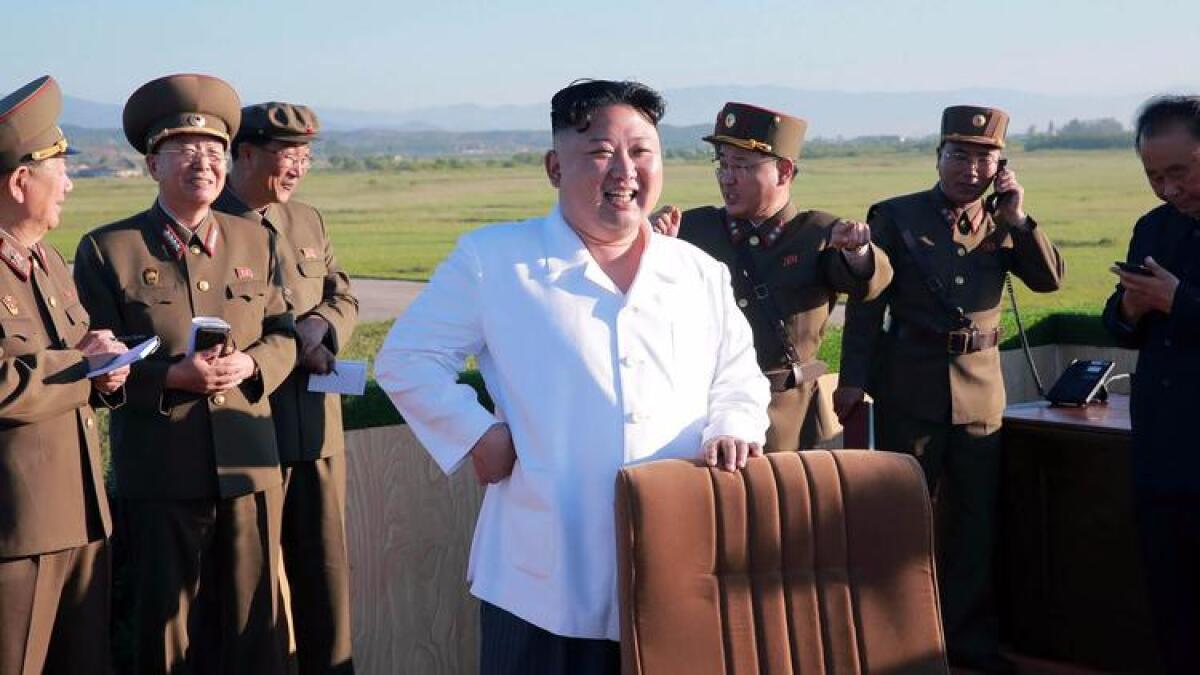
As it struggles for ways to thwart North Korea’s nuclear ambitions, the Trump administration Thursday slapped additional economic sanctions on Pyonyang’s military, coal suppliers and financial interests.
The Department of Treasury said it was blacklisting six companies and three individuals for contributing to North Korea’s “development of weapons of mass destruction” and its continued violations of United Nations Security Council resolutions.
The sanctions bar the companies and individuals from doing business with American citizens, and any assets they have in the United States or under U.S. control would be frozen.
The sanctions are mostly symbolic since it’s unlikely that the targeted companies or individuals have any such business dealings or U.S. assets. Previous sanctions have had little apparent effect.
The penalties come as the Trump administration seeks to block North Korea’s ability to build a nuclear weapon small enough to put atop a missile, and a ballistic missile powerful enough to deliver it to U.S. shores.
North Korea also has test-fired at least nine ballistic missiles so far this year, most recently on Monday. That missile flew 280 miles toward Japan before falling in the ocean.
The U.S. on Tuesday conducted its own test of a missile defense system, launching a rocket from California that officials said successfully hit and destroyed a target warhead fired from an atoll in the mid-Pacific.
The latest sanctions target North Korea’s army and Ministry of the People’s Armed Forces, its revenue from mining coal and minerals, and several overseas financial operations, according to the Treasury statement.
Among the companies is Moscow-based Ardis-Bearings LLC and its director, Igor Aleksandrovich Michurin. It allegedly works with a North Korean trading company, Tangun, which the U.S. accuses of securing supplies for the nuclear program.
The order also blacklisted Korea Computer Center, a state-run technology research and development company that generates income for the government of Kim Jong Un, with reported overseas locations in Germany, China, India and the Middle East, Treasury said.
Other sanctions target North Korea’s revenue from mining as well as its energy and financial services industries.
North Korea has conducted five nuclear tests since 2006, including two last year. A sixth test was widely expected in April, but did not occur.
The Trump administration has labeled Pyonyang’s growing nuclear arsenal an “imminent threat” to the region and the United States.
President Trump has called on China, North Korea’s main ally, to do more to stop its nuclear tests. China has blocked coal shipments and called for talks, but it is unclear how much influence Beijing has been able to exert on Pyongyang.
As Trump prepares to announce Paris agreement decision, conservatives laud an expected exit
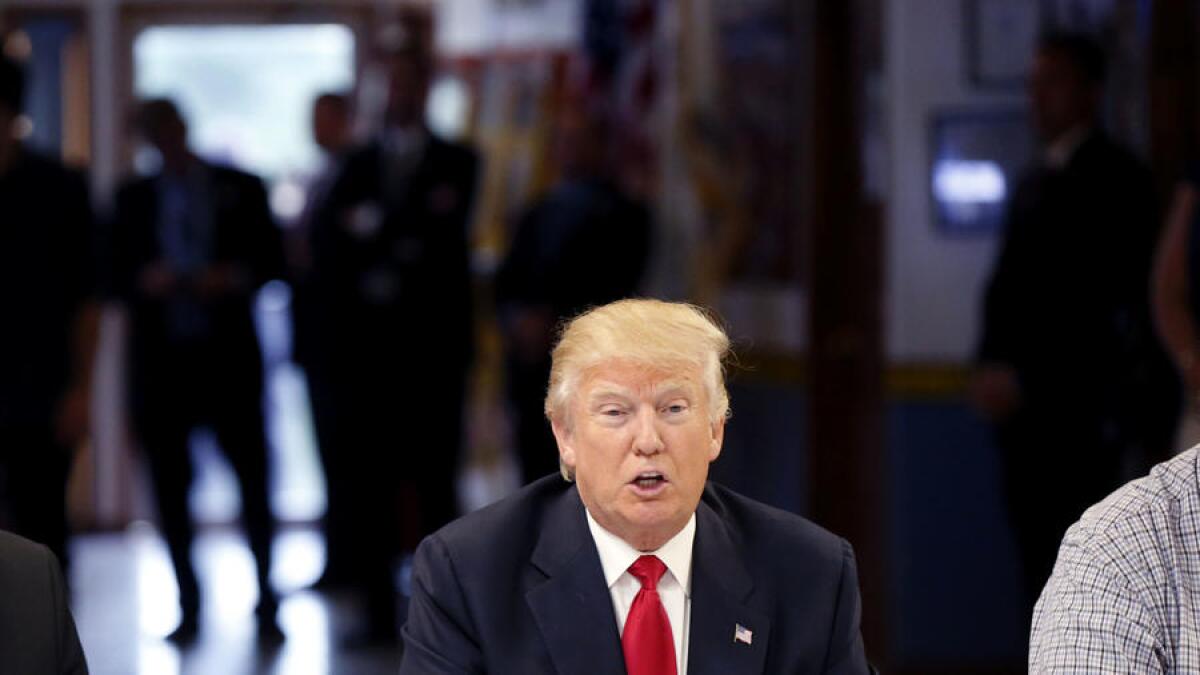
The decision looms.
President Trump is set to announce on Thursday whether the United States will withdraw from the Paris climate agreement, an international deal forged among 195 countries to, among other things, gradually reduce emissions that cause climate change.
Should the United States exit the agreement -- signed under the Obama administration -- it would join Syria, which is entering its sixth year of a civil war, and Nicaragua as the only countries not signed onto the climate accord.
For Trump, he could boast about upholding a campaign promise. Throughout 2016, he assailed the agreement and vowed to cancel it should he win the presidency.
While members of the European Union have urged the president to reconsider, some Republicans have called for Trump to make the exit swift.
At least some in conservative media seem to agree.
Here are some of today’s headlines:
How Trump is smashing Obama’s legacy with decision to exit Paris climate deal (Washington Times)
Last year, shortly before the accord took effect, then-President Obama lauded it as “historic … in the fight to protect our planet for future generations.”
Well, that could change soon as Trump indicates he’s prepared to exit the agreement (and plans an announcement at noon Pacific on Thursday).
This piece notes that Trump’s exit from the accord is “poised to become another Obama executive action unwound by his successor.”
“The deal’s defenders in the U.S. were searching desperately for an option short of withdrawal, fearful that an American opt-out would derail the global accord. They said withdrawal will harm U.S. leadership on the issue, and wondered whether Mr. Trump could instead negotiate an easier emissions target that would allow the country to remain part of the accord. But the Obama State Department had ruled that option out, saying the targets in the deal were a minimum and could only be negotiated upward.”
Wall can’t wait: 36 killed in month-long cartel war near Texas (Breitbart)
Is Trump’s base growing upset? Building a wall along the U.S.-Mexico border was Trump’s No. 1 campaign promise and so far it’s gained little traction.
This Breitbart piece highlights violence on the Mexican side of the border, and calls on the administration to act.
“Raging violence that continues to take hold of this border city as rival factions of the Gulf Cartel fight for control claimed 36 deaths – including a bystander and one police officer,” the right-wing website reports from Reynosa, Tamaulipas, which is near the border with McAllen, Texas.
The report by Breitbart, which has staunchly defended Trump but at times has been critical of his progress on immigration since he’s entered the White House, is part of series called the “Cartel Chronicles” the outlet is reporting to highlight violence in Mexico.
Kathy Griffin is just the tip of the liberal violence iceberg (The Hill)
Some free advice to actors and comedians: Do not pose with what appears to be the decapitated, bloody head of the president.
Kathy Griffin learned that lesson as CNN and others this week severed (no pun intended) ties with the comedian after an image of her surfaced holding a fake head that looked like Trump’s. As expected, conservatives are homing in on her.
In this piece, Kristin Tate, an opinion contributor for The Hill, questions “why Griffin thought that such an odious action was acceptable in the first place.”
“It’s not funny. It’s not edgy. It’s just wrong,” she writes. “Where does the atmosphere of delegitimizing an elected government and brushing violence under the rug get you?”
Former FBI Director James Comey set to testify June 8 on Russia

Former FBI Director James B. Comey is set to testify June 8 before the Senate Intelligence Committee investigating Russian activities during last year’s election.
The committee said Thursday that Comey would testify in an open session, which would be followed by a closed session.
The committee’s Republican chairman and senior Democrat have said members want to hear from Comey on his role in the development of the U.S. intelligence agencies’ assessment that Russia interfered in last year’s election.
They say they also hope Comey’s testimony will answer questions that have arisen since Comey’s sudden firing by President Trump.
He helped bring down President Nixon. He thinks President Trump is even worse.
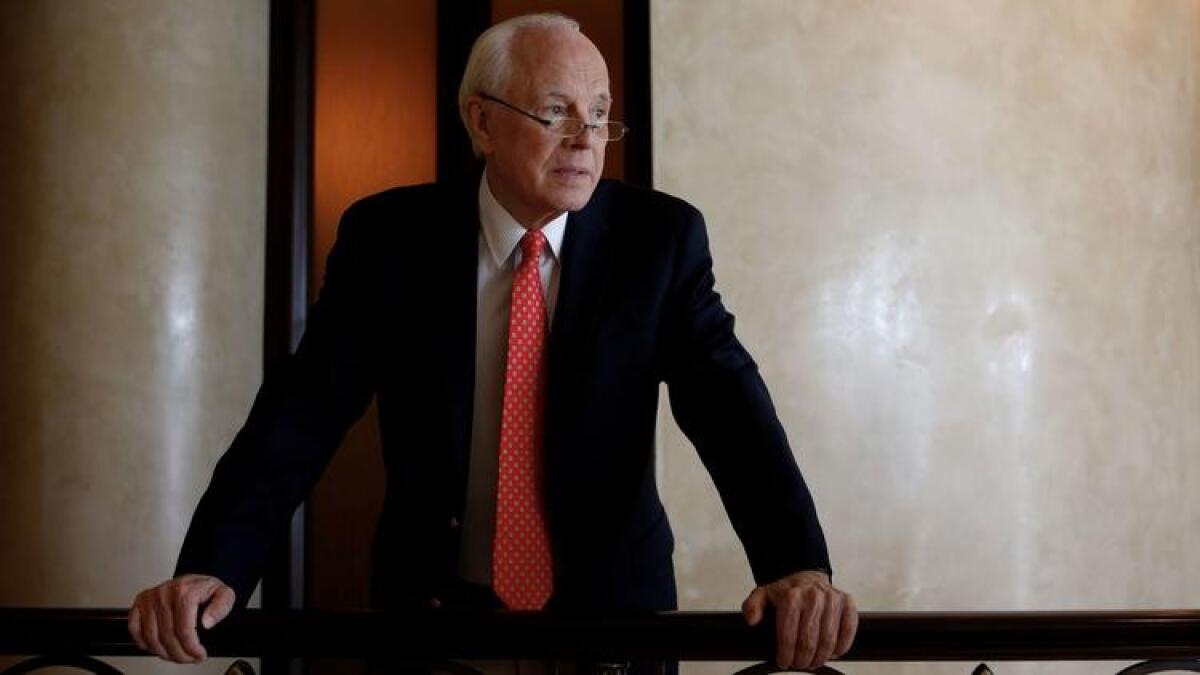
John Dean is a connoisseur of coverups, a savant of scandal, so he can more than imagine what it’s like inside the Trump White House right now.
“It’s a nightmare,” he said, presiding in a high-backed leather wing chair off the lobby of the Beverly Hills Hotel. Not just for those in the headlines — political strategist Steve Bannon, jack-of-many-duties Jared Kushner — but for their unsung assistants and secretaries as well.
“They don’t know what their jeopardy is. They don’t know what they’re looking at. They don’t know if they’re a part of a conspiracy that might unfold. They don’t know whether to hire lawyers or not, how they’re going to pay for them if they do,” Dean said in a crisp law-counsel cadence. “It’s an unpleasant place.”
Dean was a central figure in Watergate, the 1970s political scandal against which all others are measured, serving at the tender age of 32 as President Nixon’s White House attorney. In that capacity Dean worked to thwart investigators after the clumsy break-in at Democratic Party headquarters, then flipped and helped sink Nixon by revealing the president’s involvement in the coverup.
White House discloses 14 ethics waivers; Bannon can call Breitbart and Conway can contact polling company clients

Michael Catanzaro, a former oil and gas lobbyist, can help shape the Trump administration’s energy policies. Shahira Knight can weigh in on retirement matters even though she previously worked for Fidelity, a financial company specializing in retirement services.
The White House late Wednesday posted on its website ethics waivers granted to four ex-lobbyists and numerous others who have joined government. In all, the White House has granted 14 ethics waivers.
The disclosures come after a tussle between the Office of Government Ethics and White House lawyers. Other executive branch agencies and departments, such as Treasury, State and Defense, are expected to share similar information with OGE by Thursday. The Office of Management and Budget responded to the OGE’s request for data last week by saying it had issued zero waivers.
As part of his pledge to “drain the swamp” of Washington, President Donald Trump prohibits senior officials hired into the executive branch from working on “particular” government matters that involve their former clients or employers for two years. But he has waived that prohibition for some. President Obama placed similar restrictions on his employees and granted ethics waivers. His White House posted those exceptions on its website.
The Trump administration waivers include four for former registered lobbyists. The rest are for other employees whose new government duties may overlap with their previous private jobs. Several are “blanket” waivers for groups of employees.
The White House waivers were vetted by White House counsel Don McGahn and Stefan Passantino, the chief ethics officer. The White House says it only grants waivers if those lawyers find it’s too impractical for the person to recuse from the ethics issues triggered by their past work.
“To the furthest extent possible, counsel worked with each staffer to recuse from conflicting conduct rather than being granted waivers, which has led to the limited number of waivers being issued,” White House spokeswoman Lindsay Walters said.
Some waivers cover the highest-profile White House employees.
For example, there’s a “blanket” waiver saying all presidential appointees “may participate in communications and meetings with news organizations regarding broad policy matters.” That clears the way for Steve Bannon, Breitbart’s former chief executive and now Trump’s chief strategist, to ring up reporters at the news site.
That’s important because Citizens for Responsibility and Ethics in Washington — a liberal-funded pro-transparency group that has lodged many complaints against the Trump administration — had argued in a complaint that Bannon was violating the ethics pledge by speaking with his former employees.
Another waiver explicitly allows Kellyanne Conway, a senior advisor to Trump, to contact and interact with clients of her political polling company.
Joshua Pitcock, who had been Indiana’s sole lobbyist in Washington and now serves as Vice President Mike Pence’s chief of staff, is permitted under a waiver to stay in the room when matters involving Indiana arise.
“It is important that you be able to communicate and meet with the State of Indiana, and disqualification from such meetings or communications would limit the ability of the Office of the Vice President to effectively carry out Administration priorities,” his waiver says.
Catanzaro and Knight have drawn some of the most intense scrutiny of government watchdogs because their new jobs seem to closely align with their private-sector lobbying. That raised questions about how they were able to circumvent Trump’s ethics rules.
The answer is spelled out in the new documents: They obtained waivers.
As a lobbyist for CGCN Group, Catanzaro’s clients included Devon Energy, an oil and gas company based in Oklahoma, and other energy providers. In the Trump administration, he’s a special assistant to the president, focusing on energy policies.
Catanzaro’s duties can include “broad policy matters and particular matters of general applicability relating to energy and environmental policy issues,” according to his waiver. “The Administration has an interest in you working on covered matters due to your experience and expertise on these issues.”
Companies accelerate hiring in May, adding a robust 253,000 net new jobs, ADP says
Companies accelerated their hiring last month, adding a robust 253,000 net new jobs in a sign the labor market remains healthy and the economy is strengthening after a weak winter.
The private-sector job creation figures reported Thursday by payroll firm Automatic Data Processing far exceeded analyst expectations and was well above the downwardly revised 174,000 net new positions added in April.
“Job growth is rip-roaring,” declared Mark Zandi, chief economist at Moody’s Analytics, which assists ADP in preparing its report.
Trump waives law requiring U.S. move its embassy to Jerusalem
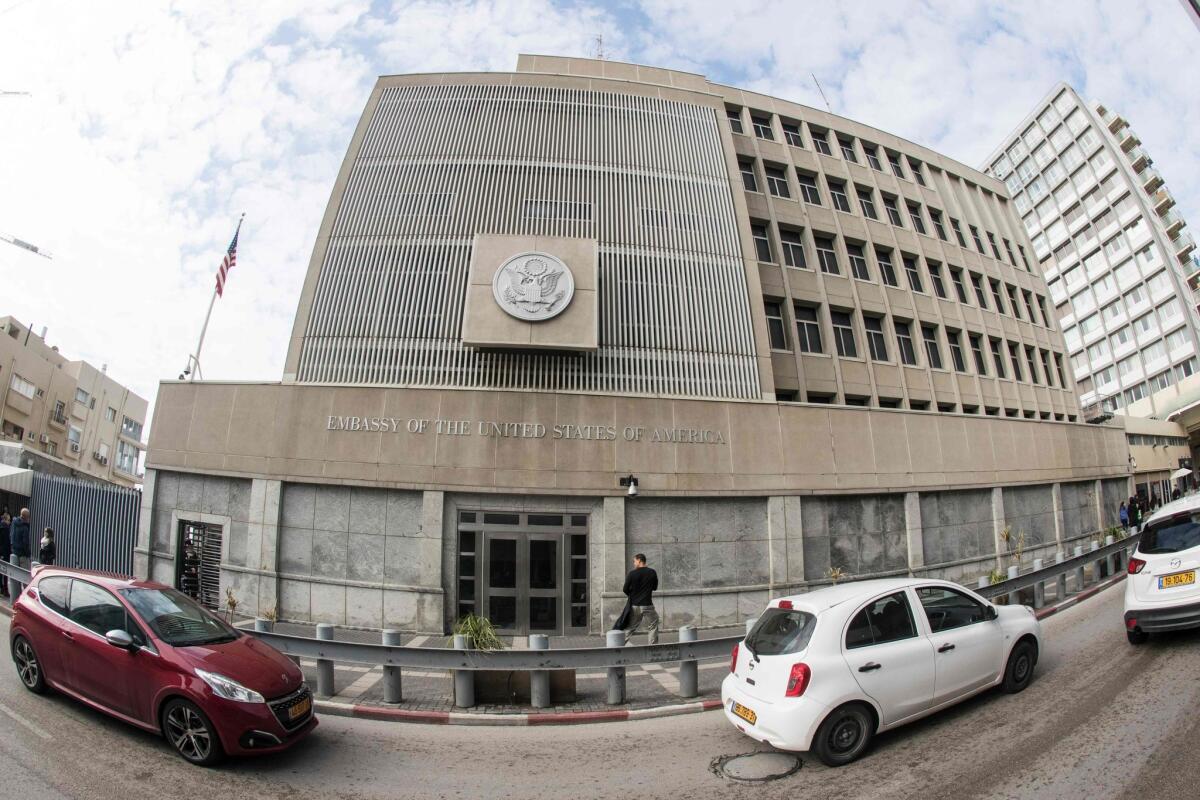
With an eye toward a potential peace deal, President Trump issued a wavier Thursday that delays moving the U.S. Embassy in Israel to Jerusalem for at least six months, a decision in keeping with previous administrations.
During the presidential campaign, Trump had vowed to swiftly move the embassy from Tel Aviv, where it has always been located, to Jerusalem. Other candidates have made the same promise, but no president has ever followed through.
Israel considers Jerusalem its capital but the Palestinians claim East Jerusalem for their capital in a future state. No country keeps its embassy in Jerusalem because of the dispute.
In a statement, the White House said Trump made this decision “to maximize the chances of successfully negotiating a deal between Israel and the Palestinians.”
It added, “But as he has repeatedly stated his intention to move the embassy, the question is not if that move happens, but only when.”
After Trump took office, Jordan’s King Abdullah and other Arab leaders warned the White House that moving the embassy would enrage Arab communities, especially the Palestinians, and severely complicate any potential peace talks.
Since then, Trump has stopped talking about it publicly. During his visit to the Middle East last month, he met with both Israeli and Palestinian leaders and called for a resumption of negotiations.
Under a law passed by Congress in 1995, Trump was facing a Thursday deadline to renew the waiver or see the State Department lose half its funding for its overseas facilities. Presidents of both parties have renewed the waiver every six months since the law was passed.
U.S. foreign policy traditionally has said the status of Jerusalem should be settled in negotiations between Israel and the Palestinians. Moving the U.S. Embassy would signal a rejection of that policy.
Trump’s new ambassador to Israel, his former bankruptcy lawyer David Friedman, had vowed to live in Jerusalem, about 30 miles from Tel Aviv.
Trump said China is ‘trying hard’ to handle North Korea. Here’s why that may be overly optimistic
The narrative is becoming familiar. North Korea test-fires a missile; the White House issues a vaguely worded threat; and the cycle of tensions continues unabated.
On Monday morning, North Korea test-fired a ballistic missile, its third in as many weeks.
The projectile flew for six minutes, then landed in the waters near Japan.
Then President Trump took to Twitter.
With so much else in the American political news cycle — deadly stabbings in Portland, Ore., Trump’s meetings in Europe, the FBI’s inquiry into Trump’s possible Russia ties — the tweet has gotten lost in the mix. Yet if the president’s words are to be taken at face value, they may suggest a misreading of the rapidly evolving situation in Northeast Asia.
Here’s what’s been happening, and why Trump’s response may have been overly optimistic.
Trump to announce decision today on climate pact

President Trump plans to bring weeks of indecision over climate change policy to a close this afternoon, announcing if he will withdraw the U.S. from the international agreement on climate change reached in Paris in 2015.
Read our coverage of the debate leading up to today’s announcement:
The choice for Trump appears to be whether to quit the treaty entirely or stay with it but significantly scale back the U.S. commitment to combat global warming.
The debate has split Trump’s advisors for months. He has also been heavily lobbied by other leaders, from the pope to California Gov. Jerry Brown, who weighed in Wednesday in an interview.
U.S. diplomats have been making clear to their foreign counterparts that the Trump administration believes that economic growth at home is a higher priority than fighting climate change.
But a large number of business leaders believe that the climate change agreement is good for the economy. They and their allies in the Republican Party have been making that case to the White House.
Regardless of what Trump decides, California and other states with Democratic majorities have made clear that they intend to continue state policies to combat climate change.
California leaders, in particular, have been taking the lead in building international support for efforts to convert to renewable energy and reduce use of coal and other fossil fuels.
Michael Flynn and Trump’s personal lawyer among seven subpoenaed in Russia investigation
The House Intelligence Committee issued seven subpoenas Wednesday, ramping up its investigations into Russian interference in the 2016 election and into whether names of President Trump’s associates were improperly revealed in classified intelligence reports.
Subpoenas went to Trump’s former national security advisor, Michael Flynn, and to the president’s longtime personal attorney, Michael Cohen. The Senate Intelligence Committee and a federal grand jury in Virginia also have issued subpoenas for Flynn’s business records.
In a statement, the House committee said it had issued subpoenas seeking “testimony, personal documents and business records” from Flynn and Cohen. It also approved subpoenas for the Flynn Intel Group LLC and for Michael D. Cohen & Associates PC.
“We hope and expect that anyone called to testify or provide documents will comply with that request, so that we may gain all the information within the scope of our investigation. We will continue to pursue this investigation wherever the facts may lead,” Rep. K. Michael Conaway (R-Texas), the committee chairman, and Rep. Adam B. Schiff (D-Burbank), the ranking member, said in a statement.
